Assembly and Executive Review Committee
Second Report on the
Arrangements for the Devolution
of Policing and Justice Matters
Volume One
Together with the Minutes of Proceedings of the Committee Relating
to the Report, the Minutes of Evidence and Other Relevant Documents
Ordered by the Assembly and Executive Review Committee to be printed 25 February 2010
Report: NIA 42/09/10R (Assembly and Executive Review Committee)
Session 2009/2010
Powers and Membership
Powers
The Assembly and Executive Review Committee is a Standing Committee established in accordance with section 29A and 29B of the Northern Ireland Act 1998 and Standing Order 59 which provide for the Committee to:
- Consider the operation of Sections 16A to 16C of the Northern Ireland Act 1998 and, in particular, whether to recommend that the Secretary of State should make an order amending that Act and any other enactment so far as may be necessary to ensure that they have effect, as from the date of the election of the 2011 Assembly, as if the executive selection amendments had not been made;
- Make a report to the Secretary of State, the Assembly, and the Executive Committee, no later than 1 May 2015, on the operation of parts III and IV of the Northern Ireland Act 1998; and
- Consider such other matters relating to the functioning of the Assembly or the Executive as may be referred to it by the Assembly.
Membership
The Committee has eleven members including a Chairperson and Deputy Chairperson with a quorum of five. The membership of the Committee is as follows:
Mr Jimmy Spratt (Chairperson) *
Mr Raymond McCartney (Deputy Chairperson)
Mr Alex Attwood Mr Nigel Dodds ****
Mr Simon Hamilton *** Mr Danny Kennedy
Mr Alex Maskey ** Mr Alan McFarland
Mr John O’Dowd Mr Declan O’Loan *****
Mr Ian Paisley Jnr ***
* Mr Jeffrey Donaldson resigned from the Committee with effect from Tuesday,
26 February 2008 and was replaced by Mr Jimmy Spratt on 4 March 2008.
** With effect from 20 May 2008, Mr Alex Maskey replaced Ms Caral Ni Chuilin.
*** With effect from 15 September 2008, Mr Simon Hamilton replaced Mr Ian McCrea and Mr Ian Paisley Jnr replaced Mr George Robinson.
**** With effect from 15 September 2009, Mr Nigel Dodds replaced Mr Nelson McCausland.
***** With effect from 26 January 2010, Mr Declan O’Loan replaced Mrs Carmel Hanna.
Declaration of Interests
In any proceedings of the Committee when devolution of policing and justice matters were being discussed, Members declared the following interests:
- Mr Jimmy Spratt, Member of the Policing Board for Northern Ireland
- Mr Alex Attwood, Member of the Policing Board for Northern Ireland
- Mr Alex Maskey, Member of the Policing Board for Northern Ireland
- Mr Nelson McCausland, Belfast District Policing Partnership
- Mr Ian McCrea, Cookstown District Policing Partnership
- Mr Declan O’Loan, Ballymena District Policing Partnership
- Mr Ian Paisley Junior, Member of the Policing Board for Northern Ireland
Observer Status
On 27 January 2009, the Committee agreed to re-extend observer status to those political parties represented in the Assembly, but not represented on the Committee, when the devolution of policing and justice matters were being discussed.
Table of Contents
Volume 1
Executive Summary and Conclusions
The Financial Implications of the Devolution of Policing and Justice Matters
Appendices
Appendix 1
Appendix 2
Minutes of Proceedings relating to the report
Appendix 3
Papers relating to the financial implications of the devolution of policing and
justice matters
- Specialist Adviser
- Correspondence from the Prime Minister
Appendix 4
- Agreement Between the Government of the United Kingdom of
Great Britain and Northern Ireland and The Government of Ireland on
Co-Operation on Criminal Justice Matters - Concordat Between Her Majesty’s Government and the Northern Ireland
Executive on the Independence of the Judiciary in Northern Ireland - Protocol on the Policing Architecture
- Agreement Between the Government of the United Kingdom of
Great Britain and Northern Ireland and the Government of Ireland on
Police Co-Operation - Concordat between Her Majesty’s Government and the Northern Ireland
Executive on the Independence of the Public Prosecution Service for Northern Ireland
(Including a Protocol between the Attorney General and the Prosecuting Departments) - Memoranda of Understanding on Sex Offenders
- Handling Arrangements for National Security Related Matters after
Devolution of Policing and Justice to the Northern Ireland Executive - Agreement at Hillsborough Castle
Appendix 5
Correspondence to, and from, OFMDFM
Appendix 6
Correspondence to, and from, NIO
Appendix 7
Appendix 8
Appendix 9
Volume 2
Appendix 10
Appendix 11
Appendix 12
Appendix 13
List of Abbreviations
AG Attorney General
AME Annually Managed Expenditure
CICAPNI Criminal Injuries Compensation Appeals Panel Northern Ireland
CJINI Criminal Justice Inspection Northern Ireland
CSR Comprehensive Spending Review
DEL Departmental Expenditure Limits
DFP Department for Finance and Personnel
DPP District Policing Partnership
ERINI Economic Research Institute for Northern Ireland
FMDFM First Minister and deputy First Minister
FSNI Forensic Science Northern Ireland
HMT Her Majesty’s Treasury
NICtS Northern Ireland Court Service
NIJAC Northern Ireland Judicial Appointments Commission
NIJAO Northern Ireland Judicial Appointments Ombudsman
NILSC Northern Ireland Legal Services Commission
NIO Northern Ireland Office
NIPB Northern Ireland Policing Board
NIPF Northern Ireland Police Fund
NIPS Northern Ireland Prison Service
OFMDFM Office of the First Minister and deputy First Minister
PBNI Probation Board Northern Ireland
PPS Public Prosecution Service
PRRT Police Rehabilitation and Retraining Trust
PSNI Police Service Northern Ireland
RUCGC Royal Ulster Constabulary George Cross Foundation
SoS Secretary of State
SOCA Serious Organised Crime Agency
YJA Youth Justice Agency
Executive Summary and Conclusions
The Agreement at Hillsborough Castle on 5 February 2010 set out, among other things, a proposed timetable for the devolution of policing and justice matters. In accordance with Section 4 of the Northern Ireland Act 1998, the first stage of the process would be the tabling, jointly by the First Minister and the deputy First Minister, of a resolution requesting devolution.
The Assembly and Executive Review Committee decided to publish its Second Report on the Arrangements for the Devolution of Policing and Justice Matters in time to inform Members of its consideration of relevant matters, and in advance of the debate on the resolution and cross-community vote which is expected to take place in the Assembly on 9 March 2010.
This report considers a number of matters including the financial implications of the devolution of policing and justice matters; the role of the Attorney General; the arrangements for the appointment, and removal, of judicial office holders; North/South policing and justice agreements; parading; the Public Prosecution Service; and the Justice Minister’s position in the Northern Ireland Executive.
Whilst the principal purpose of the report is to inform the debate which is expected to take place on 9 March 2010, it contains the following conclusions:
Conclusions
The Committee concludes that there is merit in the sum of £1.328 billion being ‘ring-fenced’ for policing and justice services within the Northern Ireland Executive’s overall budget for 2010/2011. (Paragraph 38)
The Committee concludes that, in the interests of the good and proper regulation of the way in which the Assembly conducts its business, it is important to have an early resolution of matters relating to the role of the Attorney General. (Paragraph 48)
The Committee concludes that it will be necessary to have appropriate arrangements in place to enable the Assembly to fulfil its scrutiny role in relation to prosecutorial policy, spending and administration in the Public Prosecution Service. (Paragraph 60)
The Committee concludes that the independence of the Public Prosecution Service should be maintained and that the matter of the accountability of the PPS should be examined by the Justice Committee, once established. (Paragraph 61)
The Committee concludes that the procedures and protocols between the Justice Minister, the Justice Committee and the Department and its agencies should be the same as those applying for other Ministers in the Northern Ireland Executive, subject to compliance with all appropriate policing and justice legislation. (Paragraph 64)
Introduction
1. This, the Second Report on the Arrangements for the Devolution of Policing and Justice Matters, follows on from two related Reports namely, the Report on the Inquiry into the Devolution of Policing and Justice Matters – 22/07/08R[1]; and the First Report on the Arrangements for the Devolution of Policing and Justice Matters – 22/08/09R[2]. The Process Paper published by the First Minister and the deputy First Minister on 18 November 2008 (which can be found in Appendix 5 of this report) also provides some context for this report.
2. On 13 May 2008, the Assembly and Executive Review Committee (hereinafter referred to as the Committee) wrote to the Speaker of the Assembly to suggest that it would monitor progress on the implementation of twenty-eight of the forty-one recommendations contained in the Committee’s original report (22/07/08R).
3. When the Committee met on 9 September 2008 it considered a reply from the Speaker, dated 8 September 2008, in which he acknowledged the significance of the Committee’s work to date on policing and justice issues. The Committee also considered a letter from the First Minister and the deputy First Minister, dated 28 July 2008, asking if the Committee could undertake further work in relation to the devolution of policing and justice matters. At this meeting, the Committee agreed to seek a fresh mandate from the Assembly to involve itself further in matters relating to the devolution of policing and justice and to invite the First Minister and the deputy First Minister to appear before the Committee so that the terms of their letter of 28 July 2008 could be explored in more detail.
4. The Chairperson and Deputy Chairperson of the Committee met with the First Minister and the deputy First Minister on 15 September 2008, when the First Minister and the deputy First Minister indicated that they had a list of issues which needed consideration prior to the devolution of policing and justice matters. They pointed out that they were working through this list and that they would submit papers to the Committee on these as they progressed and would make themselves available to appear before the Committee to provide briefing.
5. On 16 September 2008, the Committee agreed the terms of a motion to the Assembly seeking a mandate to further consider issues relating to the devolution of policing and justice matters.
6. On 23 September 2008, the Assembly resolved:
That, in accordance with Standing Order 59(4)(b), this Assembly refers the following matters to the Assembly and Executive Review Committee:
a review of progress on the implementation of the recommendations of, and the resolution of outstanding issues identified in, the Report on the Inquiry into the Devolution of Policing and Justice Matters (22/07/08R); and
consideration of any other matter relating to the devolution of policing and justice matters.
7. The Committee invited the First Minister and Deputy First Minister and the leaders of all the political parties represented in the Assembly to submit their views on the matters that the Committee should consider. On 14 October 2008 the Committee had decided upon a list of twenty six issues, each of which it allocated to one of three categories as follows:
- Category One Issues - to be resolved, within the Committee, pre-devolution.
- Category Two Issues - to be resolved by the Committee, pre-devolution but which might require wider consultation and consideration.
- Category Three Issues - to be resolved, post-devolution.
8. At its meeting on 18 November 2008, and in light of the Process Paper published that day by the First Minister and the deputy First Minister, the Committee agreed that it would publish its findings in two stages. The First Report on the Arrangements for the Devolution of Policing and Justice Matters was published on 6 January 2009. That report dealt with some of the Category One List of Issues and was debated in the Assembly on 20 January 2009 when it was resolved:[3]
That this Assembly approves the First Report of the Assembly and Executive Review Committee on the arrangements for the devolution of policing and justice matters.
9. The Agreement at Hillsborough Castle on 5 February 2010 set out, among other things, a proposed timetable for the devolution of matters relating to policing and justice. In accordance with Section 4 of the Northern Ireland Act 1998, the first stage of the process would be the tabling, jointly by the First Minister and the deputy First Minister, of a resolution requesting devolution.
10. The Assembly and Executive Review Committee decided to publish its Second Report on the Arrangements for the Devolution of Policing and Justice Matters in time to inform Members of its consideration of relevant matters, and in advance of the debate on the resolution and cross-community vote, which is expected to take place in the Assembly on 9 March 2010.
11. This report considers a number of matters including:
- the financial implications of the devolution of policing and justice powers;
- the role of the Attorney General;
- the arrangements for the appointment, and removal, of judicial office holders;
- North/South policing and justice agreements;
- parading;
- the Public Prosecution Service;
- the Justice Minister’s relationship with the Assembly; and
- the Justice Minister’s position in the Northern Ireland Executive.
The Committee’s Approach
12. In its First Report on the Arrangements for the Devolution of Policing and Justice Matters (22/07/08R), the Committee identified the importance of ensuring an adequate budget for a Department of Justice, and at paragraph 46 of that report, the Committee signalled its intention to examine the financial implications of devolving a range of policing and justice matters as part of its detailed consideration of the Category Two Issues:[4]
46. The Committee considers that it will be vitally important to ensure that there is an adequate budget for the department which will become responsible for the range of policing and justice functions. In this regard, it intends to cooperate with the First Minister and deputy First Minister, and the Minister for Finance and Personnel, as necessary, as part of a complementary process, to examine the financial implications of devolving policing and justice. For that reason, the Committee sought clarification from the First Minister and deputy First Minister, on the respective roles of the First Minister and deputy First Minister, the Minister for Finance and Personnel and the Assembly and Executive Review Committee in terms of work required on finance matters. The Committee will return to this issue in January 2009 as part of its detailed consideration of the Category Two List of Issues, more about which can be found elsewhere in this report.
13. At its meeting on 10 December 2008, the Committee agreed to appoint a Specialist Adviser to assist in its consideration of the financial aspects of the Category Two List and to allow it to make progress on the other Category Two Issues.
14. On 27 January 2009, the Specialist Adviser, Mr. Victor Hewitt, Director of the Economic Research Institute for Northern Ireland (ERINI), briefed the Committee on his role as Specialist Adviser and gave an initial assessment of the financial implications of devolving policing and justice matters.
15. The Committee issued a standing invitation to the First Minister and deputy First Minister for them to appear before the Committee during its consideration of the Category Two Issues. The Committee also agreed to consult with relevant individuals and organisations involved in aspects of policing and justice.
16. On 27 January 2009, the Committee also agreed to re-extend “observer status" to those political parties represented in the Assembly, but not represented on the Committee, when the devolution of policing and justice matters was being considered. The Committee also agreed to request information from the range of organisations providing policing and justice services in Northern Ireland.
17. On 3 February 2009, the Committee agreed that it would concentrate on the financial implications of devolving policing and justice matters and that the detailed consideration of the wider Category Two Issues would resume in March 2009.
18. Twenty-four organisations providing a range of policing and justice services in Northern Ireland made written submissions to the Committee (see Appendix 12) and these were referred to the Specialist Adviser for analysis.
19. The Committee subsequently agreed to call on the following organisations to give oral evidence:
- Northern Ireland Prison Service
- Youth Justice Agency
- Probation Board for Northern Ireland
- Northern Ireland Legal Services Commission
- Northern Ireland Court Service
- Public Prosecution Service
- Compensation Agency
- Forensic Science Northern Ireland
- Northern Ireland Policing Board
- The Chief Constable, PSNI
- Police Rehabilitation and Retraining Trust
- The Secretary of State for Northern Ireland
20. The Committee also wrote to the Clerk/Director General of the Northern Ireland Assembly requesting information about possible arrangements the Assembly would be making for the devolution of policing and justice matters. The Director of Clerking and Reporting subsequently provided a briefing to the Committee.
21. In order to gain a wider perspective on the devolution of policing and justice matters, the Committee visited London, Edinburgh and Dublin for a series of meetings. On 16 and 17 June 2009 at Westminster, the Committee met with the Justice Secretary and the Justice Committee. On 18 June 2009, at the Scottish Parliament, the Committee met with the Justice Committee, Officials from the Lord Advocate’s office, the Solicitor General and the Justice Minister. On 25 June 2009, at the Oireachtas, the Committee met with the deputy to the Attorney General, the Justice Committee, the Justice Minister and the Garda Commissioner.
22. To further inform its deliberations, the Committee made repeated requests to the Secretary of State for Northern Ireland to have sight of the range of documents which he had advised the Committee would underpin the devolution of policing and justice matters (see correspondence in Appendix 6).
23. The following documents were provided to the Committee, eventually, and can be found at Appendix 4:
1. Agreement between the Government of the United Kingdom of Great Britain and Northern Ireland and the Government of Ireland on Co-operation on Criminal Justice Matters
2. Concordat between Her Majesty’s Government and the Northern Ireland Executive on the Independence of the Judiciary in Northern Ireland
3. Protocol on the Policing Architecture
4. Protocol on National Security
5. Agreement between the Government of the United Kingdom of Great Britain and Northern Ireland and the Government of Ireland on Police Co-operation
6. Concordat between Her Majesty’s Government and the Northern Ireland Executive on the Independence of the Public Prosecution Service for Northern Ireland
7. Memorandum of Understanding between the Government of Ireland and the Government of the United Kingdom of Great Britain and Northern Ireland on information sharing relating to sex offenders.
24. The Agreement at Hillsborough Castle was published on 5 February 2010 and is also included in Appendix 4.
25. In light of the devolution timetable set out in Section 1.1 of the Agreement at Hillsborough Castle, the Committee decided to seek to publish this report in time to inform the debate on the resolution which is expected to be tabled, jointly by the First Minister and deputy First Minister, in the Assembly on 9 March 2010.
The Financial Implications of the Devolution of Policing and Justice Matters
26. This section of the report deals with Issue E of the Category Two List which relates to financial matters. The Committee had a focus on three main questions, as follows:
- What is the extent of the financial provisions for a department which would exercise the range of policing and justice functions?
- How, and when, should the financial negotiations with the NIO be conducted, and by whom?
- Should any budget be ‘ring-fenced’?
27. The other Issues on the Category Two List are dealt with in a separate section of this report.
28. In its First Report on the Arrangements for the Devolution of Policing and Justice Matters (22/08/09R), the Committee identified the financial implications of the devolution of policing and justice to be of central importance.
29. The Committee acknowledged that in order to inform its deliberations on these issues it would be necessary to consult with the various agencies, bodies and organisations which provide the full range of policing and justice services. These organisations were then invited to provide detailed financial information. In addition, the Secretary of State was invited to ‘refresh’ the financial information provided during the Committee’s original Inquiry (22/07/08R) and he was also asked to ensure that the relevant organisations co-operated, fully, with the Committee’s investigations.
30. The Committee also identified a need to have specialist advice on the financial requirements for any future department which would have responsibility for policing and justice matters. The Committee decided it wished to draw on the services of someone with expertise in the field of public sector finance and budgeting and embarked on a tendering exercise to enlist the services of a Specialist Adviser to provide expert advice.
31. On 13 January 2009, and after a competitive tendering exercise, the Committee agreed to appoint Mr Victor Hewitt, Director of the Economic Research Institute of Northern Ireland (ERINI) as the Specialist Adviser to the Committee.
32. The Specialist Adviser made a number of appearances before the Committee from 27 January 2009 onwards and presented a series of working papers.
33. On 17 February 2009, the Specialist Adviser presented a paper to the Committee on his initial analysis of the written submissions provided by the policing and justice organisations. In examining identified pressures in the remaining two years of the Comprehensive Spending Review 2007 period (CSR 07), the Specialist Adviser drew particular attention to pressures on Legal Aid, Inquiries, Hearing Loss Claims and Equal Pay Claims.
34. A series of oral evidence sessions was conducted during February and March 2009. On 28 April 2009, the Specialist Adviser presented a further analysis in which he provided an outline of the resource budgets together with an assessment of the budget pressures.
35. On 29 June 2009, the Specialist Adviser presented a further detailed analysis to the Committee at a meeting which was also attended by the First Minister and the deputy First Minister.
36. The First Minister and deputy First Minister welcomed the detailed analysis provided by the Committee’s Specialist Adviser. They undertook to use the information in negotiations with the Prime Minister for the purpose of securing a suitable financial settlement in addition to the existing budget held by the Northern Ireland Office and the Lord Chancellor’s Department.
37. The outcome of these financial negotiations was published in a letter from the Prime Minister on 21 October 2009. A second letter from the Prime Minister, also dated 21 October 2009, was provided to the Committee, “in confidence". The Committee subsequently sought permission to publish this letter in its report and that permission was granted. Both letters can be found in Appendix 3. On 10 November 2009, the First Minister and deputy First Minister appeared before the Committee to discuss the correspondence from the Prime Minister and they declared that they regarded the additional financial package to be acceptable.
38. At a meeting of the Committee on 18 February 2010, the Secretary of State confirmed that, if there was a request for the transfer of policing and justice powers, a baseline figure of £1.328 billion would be provided to cover policing and justice costs in 2010/2011. A breakdown of the baseline figure was provided to the Committee by the NIO in a letter dated 19 February 2010; it can be found in Appendix 6. That baseline figure excludes the additional financial package, which is considered to amount to some £800 million. A sum of £26 million will remain with the future NIO to cover its costs in 2010/2011.
The Committee concludes that there is merit in the sum of £1.328 billion being ‘ring-fenced’ for policing and justice services within the Northern Ireland Executive’s overall budget for 2010/2011.
The Category Two List of Issues, to be resolved by the Committee, pre-devolution, but which might require wider consultation and consideration (excluding the financial implications of the devolution of policing and justice matters)
39. This section of the report deals with the Committee’s consideration of the remaining Category Two Issues.
40. In the context of its consideration of Issues A, B, C, D, G, H, I and J, below, the Committee examined the seven Agreements, Concordats, Protocols and Memoranda of Understanding which can be found at Appendix 4. Each of the political parties represented on the Committee hold contrasting views on at least some of these documents, in their current form. Furthermore, when they were presented to the Committee, a number of the documents were considered, by some, to be defective. In this regard, the Committee offered suggestions on how the documents might be improved, and some revisions were made, or may be made (see Annex A of the letter from the NIO, dated 19 February 2010, in Appendix 6). The Committee accepts that each of the documents is subject to review, and revision, in the run-up to, and beyond any request there might be for policing and justice powers to be devolved, and that individual political parties were likely to make separate representations in relation to these documents.
Issue A: The Role of the Attorney General
41. The post of an Attorney General for Northern Ireland was first raised in the Report on the Inquiry into the Devolution of Policing and Justice Matters (22/07/08R). It was acknowledged that the appointment of an Attorney General was a matter for the First Minister and deputy First Minister. Furthermore, when the issue was raised originally with the First Minister and deputy First Minister, the Committee was advised that “no preparatory work had been done in this regard; indeed the Committee was told that it was a matter for political resolution."[5] The Committee recommended that the First Minister and deputy First Minister should make the necessary preparations for the appointment of an Attorney General before the devolution of policing and justice (recommendation 21) and that the Attorney General post should, initially at least, be a full time role (recommendation 22). The Report also identified a number of governance issues associated with the post of Attorney General including his/her relationship with the Northern Ireland Assembly and recommended that the Assembly should develop its Standing Orders to allow the Attorney General to report to the Assembly (recommendation 25).
42. The Committee draws attention to the Justice (Northern Ireland) Act 2002 and the provisions at Section 25 relating to the participation of the Attorney General in Assembly proceedings:
Justice (Northern Ireland) Act 2002
25 Participation by Attorney General in Assembly proceedings
(1) The Attorney General for Northern Ireland may participate in the proceedings of the Assembly to the extent permitted by its standing orders but he may not vote in the Assembly.
(2) The Assembly’s standing orders may in other respects provide that they are to apply to the Attorney General of Northern Ireland as if he were a member of the Assembly.
(3) The Attorney General for Northern Ireland may, in any proceedings of the Assembly, decline to answer any question or produce any document relating to the operation of the system of prosecution of offences in any particular case if he considers that answering the question or producing the document—
(a) might prejudice criminal proceedings in that case, or
(b) would be otherwise against the public interest.
(4) Section 43 of the Northern Ireland Act 1998 (c. 47) (interests of members of Assembly) applies to the Attorney General for Northern Ireland as if he were a member of the Assembly.
43. In its consideration of the Category Two List, the Committee revisited the question of the role of the Attorney General and commissioned a research paper from the Assembly Research and Library Services; this details the role and functions of the Attorney General (see Appendix 13).
44. In a letter to the Committee, dated 18 November 2008, the First Minister and deputy First Minister stated that they were minded to invite Mr John Larkin QC to become the Attorney General for Northern Ireland.
45. During the course of the Committee’s meeting on 15 September 2009, mention was made of a paper submitted by Mr Larkin QC to the First Minister and deputy First Minister on issues relating to the role of the Attorney General. The Committee requested sight of the paper. In response, the First Minister and deputy First Minister confirmed they had asked Mr Larkin to submit a paper to assist with preparations for establishing the Attorney General’s Office. They pointed out that they were continuing to consider the paper. The Committee made a number of subsequent requests for sight of the paper and also invited Mr Larkin to appear before the Committee, an invitation which he declined.
46. In an oral evidence session on 18 February 2010, the First Minister and deputy First Minister were again asked about Mr Larkin’s paper at which time the Committee was advised that the paper remained under consideration and that it would be at least two weeks before the paper and any response to it might be provided to the Committee. However, it emerged during the oral evidence session that the Attorney General will act as the Chief Legal Adviser to the Northern Ireland Executive. In light of this, the Committee subsequently wrote to the First Minister and deputy First Minister and invited them to consider publishing Mr Larkin’s paper and their response to it.
47. At a meeting on 23 February 2010, the Committee considered a response from the First Minister and the deputy First Minister. The Committee decided to write a further letter to the First Minister and the deputy First Minister to stress the Committee’s continued interest in this matter. This correspondence can be found in Appendix 5.
48. The Committee plans to continue its interest in the role of the Attorney General, including the arrangements which will need to be made to provide for the Attorney General to report appropriately to the Assembly - taking account of the provisions in the Justice (Northern Ireland) Act 2002, and the need for suitable Standing Orders. The Committee also considered the question of whether the Attorney General should have ‘speaking rights’ in the Assembly. The Committee had intended to give direction to the Committee of Procedures in this regard but has been unable to do so. The Committee acknowledges the role of the Committee on Procedures on such matters and recognises that, if there were to be a request for the devolution of policing and justice powers, the Justice Committee, once established, would also have an interest in the matter.
The Committee concludes that, in the interests of the good and proper regulation of the way in which the Assembly conducts its business, it is important to have an early resolution of matters relating to the role of the Attorney General.
Issue B: Appointments to the judiciary
49. The Committee acknowledges that its original consideration of this issue has been overtaken by developments given that the Northern Ireland Act 2009 provides for initial arrangements for the appointment, and removal, of judicial office holders. The Committee draws attention to the fact that these arrangements are subject to review by the Assembly, by 1 May 2012.
50. In consideration of this issue the Committee also reviewed the Concordat on the Independence of the Judiciary, which is one of the seven documents underpinning the devolution of policing and justice (see Appendix 4) and offered suggestions on how the document might be improved (see also the general commentary at the beginning of this section of the report).
Issue C: Relationships between SOCA and the Security Services and the Minister and the Assembly
51. Although this matter was discussed by the Committee on a number of occasions, there was no consensus on what the relationship should be between SOCA and the Security Services, and the Justice Minister and the Assembly.
Issue D: North/South policing and justice agreements and requirements for a Justice Sector of the North South Ministerial Council
52. The earlier commentary at the beginning of this section of the report deals with the general issue of North/South policing and justice arrangements.
53. Although the matter was discussed by the Committee on a number of occasions, there was no consensus on the requirement for a Justice Sector of the North South Ministerial Council.
Issue E: Financial matters
54. This issue is dealt with in the previous section of this report.
Issue F: The Ashdown Review of Parading
55. The Committee had intended to address in this report what, if any, consideration should given to the Ashdown Report on Parading, including whether there was a need for further clarity on any associated powers which might be devolved.
56. Lord Ashdown was invited to appear before the Committee but he declined to do so for reasons set out in correspondence which can be found in Appendix 7.
57. The Committee acknowledges that the matter of Parading is addressed in Section 2 of the Agreement at Hillsborough Castle.
58. Although this matter was discussed by the Committee on a number of occasions, there was no consensus on whether the Committee should give further consideration to this matter.
Issue G: Sponsorship, funding and scrutiny arrangements for the Public Prosecution Service (PPS).
59. The Assembly agreed previously that the PPS should be a Non Ministerial Department. In a letter from the NIO, dated 15 February 2010 (see Appendix 6), the funding arrangements for the PPS are described. In effect, the PPS will be funded by monies appropriated to its own vote by the Assembly, routed through DFP Supply.
60. Although the matter of the funding stream for the PPS was discussed by the Committee on a number of occasions, there was no consensus on an alternative to the arrangements described above. Nevertheless, the Committee is concerned to ensure that the PPS is subject to proper scrutiny by the Assembly, in terms of matters relating to prosecutorial policy, spending and administration.
The Committee concludes that it will be necessary to have appropriate arrangements in place to enable the Assembly to fulfil its scrutiny role in relation to prosecutorial policy, spending and administration in the Public Prosecution Service.
Issue H: The independence and accountability of the Public Prosecution Service (PPS)
61. The Committee notes the references in Section 1 of the Agreement at Hillsborough Castle about the independence of the judiciary and the Chief Constable, and the absence of similar references about the Public Prosecution Service.
The Committee concludes that the independence of the Public Prosecution Service should be maintained and that the matter of the accountability of the PPS should be examined by the Justice Committee, once established.
Issue I: The advisory role in relation to the appointment of the Police Ombudsman
62. The Committee notes the existing arrangements which provide for the First Minister and the deputy First Minister to have an advisory role in relation to the appointment of the Police Ombudsman.
63. Although this matter was discussed by the Committee on a number of occasions, there was no consensus on any variation to the existing arrangements.
Issue J: The procedures and protocols between the Minister, an Assembly Committee and any newly established department and its associated agencies
64. The Committee discussed this matter on a number of occasions and also commented on the Protocol on Policing Architecture (which can be found at Appendix 4).
The Committee concludes that the procedures and protocols between the Justice Minister, the Justice Committee and the Department and its agencies should be the same as those applying for other Ministers in the Northern Ireland Executive, subject to compliance with all appropriate policing and justice legislation.
Issue K: The Minister’s position in, and relationship with,
the Executive Committee
65. The Committee notes, and draws attention to, the following references in Section 1. 8 – 1.10 of the Agreement at Hillsborough Castle about the relationship between the Justice Minister and the Northern Ireland Executive:[6]
1.8. The Justice Minister will have the same status in the Executive as other Ministers – the Justice Minister will have the same standing in terms of attending and voting at the Executive and as with other Ministers the operation of the Department would be subject to his/her direction and control. In this context as with other Ministers the Justice Minister would have responsibility for operational matters within the Department.
1.9. Having regard to the particular responsibilities of the Justice Minister we have agreed that quasi-judicial decisions shall be made by the Justice Minister without recourse to the Executive.
1.10. The Justice Minister will bring any proposals he/she believes necessary to the Executive detailing how the Ministerial Code or Procedural Guidance should be amended to ensure effective decision-making in relation to urgent, confidential or other matters in his/her Department which would normally require consideration by the Executive. Pending the implementation of any agreed amendments to the Ministerial code or procedural guidance, the Executive would normally grant retrospective approval to any decisions in which the Minister had acted reasonably. However, the First Minister and deputy First Minister, acting jointly may require any matter to be brought to the Executive for consideration or agree jointly that retrospective approval would not be granted. Notwithstanding the above all issues which cut across the responsibility of two or more ministers, legislative proposals and financial allocations to the Department of Justice would require Executive consideration. It is expected that any new arrangements would be in place by the summer recess.
General
66. In its First Report on the Arrangements for the Devolution of Policing and Justice Matters (22/08/09R), the Committee made two related recommendations about a Standing Order which would have the effect of preventing members of the Northern Ireland Policing Board, or any District Policing Partnership, from serving, simultaneously, on the Assembly’s Justice Committee. The Committee on Procedures was asked to consider Recommendations 14 and 15 of that report and that Committee has since developed a draft Standing Order (49A) which will be considered by the Assembly. The Assembly and Executive Review Committee has considered the matter further and has requested that, for completeness, the Committee on Procedures should consider extending the provisions of draft Standing Order 49A to also prevent members of the Belfast District Policing Partnership Sub-Groups from serving, simultaneously, on the Assembly’s Justice Committee.
67. The Committee intends to monitor developments in relation to the devolution of policing and justice matters, at least until the point of devolution.
[1] http://archive.niassembly.gov.uk/assem_exec/2007mandate/reports/report22_07_08R.htm
[2] http://archive.niassembly.gov.uk/assem_exec/2007mandate/reports/report22_08_09R.htm
[3] http://archive.niassembly.gov.uk/record/reports2008/090120.htm#7
[4] http://archive.niassembly.gov.uk/assem_exec/2007mandate/reports/report22_08_09R.htm
[5] P.19 Report on the Inquiry into the Devolution of Policing and Justice Matters – 22/07/08R.
[6] Agreement at Hillsborough Castle, 5 February 2010
Appendix 1
The Category Two List of Issues, to be resolved by the Committee, pre-devolution, but which might require wider consultation and consideration
The Category Two List of Issues
A. Is there a need to endorse Recommendation 22 of the Committee’s original report (that the post of Attorney General should be a full time role, at least initially)?
B. Who might be responsible for appointments to the judiciary?
C. What should be the relationship between SOCA and the Security Services and the Minister/ Department/Assembly? (See also Category One List N - What needs to be done to ensure that attention is given to having appropriate measures in place to address issues such as the role of the security services?)
D. What needs to be done to ensure the maintenance of existing North/South policing and justice agreements, and is there a requirement for a Justice Sector of the North South Ministerial Council?
E. What is the extent of the financial provisions for a department which would exercise the range of policing and justice functions? (See also Category One List Issue I - How, and when, should the financial negotiations with the NIO be conducted, and by whom? See also Category One List Issue J - Should any budget be ‘ring-fenced’?)
F. What, if any, consideration should there be of the Ashdown Report on Parading, and is there a need for further clarity of the powers to be devolved, and, if so, should they include matters relating to the Public Processions (Northern Ireland) Act 1989, flags and symbols and recruitment to the PSNI?
G. In the context of Recommendation 26 of the Committee’s original report, to which Department should the Public Prosecution Service be attached? (See also Category One List Issue G)
H. In the context of Recommendation 27 of the Committee’s original report, about examining the independence and accountability of the Public Prosecution Service, before, and following devolution, what consideration should be given to this matter, pre-devolution?
I. In relation to Recommendation 30 of the Committee’s original report, who should undertake the advisory role in relation to the appointment of the Police Ombudsman? (See also Category One List Issue G)
J. What procedures and protocols will there need to be between the Minister, an Assembly Committee and any newly established department and its associated agencies? (Additional question introduced to Category Two List, following a decision, on 25 November, to re-locate it from Category One List Issue O)
K. What would be the status of the Minister’s position in, and relationship with, the Executive Committee; and would the Minister be required to bring significant, or controversial, matters to the Executive Committee?
Appendix 2
Minutes of Proceedings
of the Committee
relating to the Report
Tuesday, 13 January 2009
Room 21, Parliament Buildings
Present: Mr Jimmy Spratt (Chairperson)
Mr Raymond McCartney (Deputy Chairperson)
Mr Alex Attwood
Mr Simon Hamilton
Mrs Carmel Hanna
Mr Nelson McCausland
Mr Alan McFarland
Mr Alex Maskey
Mr Ian Paisley Jnr
In Attendance: Mr Stephen Graham (Assembly Clerk)
Mr Oliver Bellew (Assistant Assembly Clerk)
Ms Lynn Gray (Clerical Supervisor)
Miss Paula McManus (Clerical Officer)
Miss Annette Page (Clerical Officer)
Apologies: Mr John O’Dowd
Mr Danny Kennedy
11.03 am The meeting opened at in public session.
1. Apologies
Apologies are detailed above.
2. Devolution of Policing and Justice Matters
In relation to the issue of the devolution of policing and justice matters, the Chairperson declared the following interests:
- Member of the Northern Ireland Policing Board
The Chairperson invited Members to declare their relevant interests.
Members declared the following interests:
Nelson McCausland
- Member of Belfast District Policing Partnership
Alex Maskey
- Member of the Northern Ireland Policing Board
Ian Paisley Jnr
- Member of the Northern Ireland Policing Board
Agreed: Members agreed to continue the practice of extending ‘observer status’ to those parties represented in the Assembly, but not currently sitting on the Assembly and Executive Review Committee.
4.1 Committee Briefing Paper 22/08/09 – Draft Forward Work Programme
Agreed: Members considered, and agreed, a draft forward work programme, but acknowledged that it was subject to refinement.
There was some discussion on the issue of the First Minister and deputy First Minister appearing before the Committee.
On a proposal from Mr Attwood that:
“This Committee suggests that the First Minister and deputy First Minister appear before the Committee on either 27 January or 3 February."
Question put: That this Committee suggests that the First Minister and deputy First Minister appear before the Committee on either 27 January or 3 February.
The Committee divided, Ayes 3; Noes 6.
| Ayes | Noes |
| Alex Attwood Carmel Hanna Alan McFarland | Jimmy Spratt RaymondMcCartney Simon Hamilton Nelson McCausland Alex Maskey Ian Paisley Jnr |
The proposal accordingly fell.
On a proposal from Mr Paisley Jnr that:
“That this Committee writes to the First Minister and deputy First Minister to advise them that it intends to invite them to appear before the Committee, once it is ready to discuss the Category Two List of Issues."
Question put: That this Committee writes to the First Minister and deputy First Minister to advise them that it intends to invite them to appear before the Committee, once it is ready to discuss the Category Two List of Issues.
The Committee divided, Ayes 7; Noes 0; Abstentions 2.
| Ayes | Abstentions |
| Jimmy Spratt Raymond McCartney Simon Hamilton Nelson McCausland Alan McFarland Alex Maskey Ian Paisley Jnr | Alex Attwood Carmel Hanna |
Agreed: Members agreed not to commence consideration of the Category Two List of Issues until the next meeting of the Committee.
4.2 Appointment of a Specialist Adviser
Agreed: On a recommendation from the Chairperson, Members agreed to suspend the meeting, following discussions on the substantive items on the agenda, in order to facilitate a meeting of the Sub-Committee.
5. Correspondence
5.1 Members noted a response from the Chairperson to the Secretary of State’s letter of the 14 December 2008.
5.2 Members noted draft letters to the NIO and other organisations, currently providing the range of policing and justice services in Northern Ireland.
Agreed: Members agreed the terms of the letters.
Agreed: Members agreed that the Specialist Adviser should be given an opportunity to comment on the draft letters.
Agreed: Members agreed that any amendments to the draft letters should be relayed to Members and that the deadline for receipt of responses should be 6 February 2009.
7. Any other business
7.1 There was some discussion on the merits of writing to the Security Minister, Mr Paul Goggins, M.P, to ask him:
- When does he anticipate legislation will be tabled in the House of Commons, arising from the Committee’s Report?
- Are there any matters, in the view of the NIO, which require to be concluded in order to be included as part of the legislation?
Agreed: Members agreed to return to the issue.
7.2 There was some discussion on the issue of how long the debate on the Committee’s First Report on the Arrangements for the Devolution of Policing and Justice Matters, should last but there was no consensus within the Committee on the preferred duration of the debate.
11.55 am The Chairperson suspended the meeting.
2.04 pm The Chairperson resumed the meeting, in public session, with the following Members also present:
Mr Raymond McCartney (Deputy Chairperson) Mr Simon Hamilton Mrs Carmel Hanna Mr Alex Maskey Mr Nelson McCausland Mr Alan McFarland Mr Ian Paisley Jnr
8. Appointment of a Specialist Adviser
The Chairperson reported the outcomes from the Sub-Committee meeting.
Agreed: Members agreed the recommendation of the Sub-Committee on the appointment of a Specialist Adviser.
Agreed: Members agreed that the Committee Clerk would inform the successful candidate and provide feedback to the unsuccessful candidate.
Agreed: Members agreed that Hansard would cover future meetings of the Committee which would deal with the Category Two List of Issues.
Agreed: Members agreed to meet for as long as necessary each week to consider the Category Two List of Issues.
10. Any other business
There was some further discussion on the merits of writing to the Security Minister (Item 7 above refers).
Agreed: Members agreed that there was no need, at this stage, to correspond with the Security Minister other than to supply him with a copy of the Committee’s Report, under embargo.
2.17 pm The Chairperson adjourned the meeting.
[EXTRACT]
Tuesday, 27 January 2009
Room 21, Parliament Buildings
Present: Mr Jimmy Spratt (Chairperson)
Mr Raymond McCartney (Deputy Chairperson)
Mr Alex Attwood
Mr Simon Hamilton
Mrs Carmel Hanna
Mr Nelson McCausland
Mr Alan McFarland
Mr Alex Maskey
Mr John O’Dowd
Mr Ian Paisley Jnr
In Attendance: Mrs Nuala Dunwoody (Clerk Assistant)
Mr Stephen Graham (Assembly Clerk)
Mr Oliver Bellew (Assistant Assembly Clerk)
Ms Lynn Gray (Clerical Supervisor)
Miss Paula McManus (Clerical Officer)
Mr Victor Hewitt (Specialist Adviser)
Apologies: Mr Danny Kennedy
11.06 am The meeting opened in public session.
1. Apologies
Apologies are detailed above.
11.11 am Mr O’Dowd joined the meeting.
5. Correspondence
5.1 The Chairperson advised Members of correspondence from the Northern Ireland Policing Board; the Northern Ireland Court Service; and An Garda Siochana, which acknowledged receipt of the Committee’s report
5.2 Members noted a letter from the Chairperson to the First Minister and deputy First Minister, reminding them of the standing invitation for them to appear before the Committee during its consideration of the Category Two List of Issues.
5.3 Members noted letters which re-extended ‘observer status’ to those parties represented in the Assembly but not, presently, represented on the Committee, when the devolution of policing and justice is under consideration.
5.5 Members noted correspondence to the Secretary of State, and to those organisations currently providing the range of policing and justice services in Northern Ireland, requesting financial information.
5.6 A letter from the Northern Ireland Court Service was tabled for the attention of Members.
Agreed: Members agreed to deal with the letter during its consideration of the Category Two List of Issues.
11.17 am Mr Hamilton left the meeting.
6. Devolution of Policing and Justice Matters
In relation to the issue of the devolution of policing and justice matters, the Chairperson declared the following interests:
- Member of the Northern Ireland Policing Board
The Chairperson invited Members to declare their relevant interests.
Members declared the following interests:
Nelson McCausland
- Member of Belfast District Policing Partnership
Alex Maskey
- Member of the Northern Ireland Policing Board
Ian Paisley Jnr
- Member of the Northern Ireland Policing Board
11.17 am Mr Hamilton rejoined the meeting.
6.1 Briefing Paper 23/08/09 – Specialist Adviser
Members noted a Committee briefing paper on the proposed work plan of the Specialist Adviser.
11.20 am Mr Hewitt joined the meeting.
The Chairperson welcomed the Specialist Adviser, Mr Victor Hewitt, to the meeting, and invited him to brief the Committee.
The Specialist Adviser briefed the Committee on:
- His role as a Specialist Adviser to the Committee;
- His initial assessment of the financial implications of devolving policing and justice into the Northern Ireland public expenditure block in the context of the Barnett Formula; and
- the impact of proposed efficiency cuts.
This was followed by a question and answer session.
Agreed: Members agreed that all correspondence relating to the financial implications of devolving policing and justice should be sent to the Specialist Adviser as a matter of course.
11.26 am Mr Hamilton left the meeting.
11.29 am Mrs Hanna joined the meeting.
There was further discussion with the Specialist Adviser.
The Chairman thanked the Specialist Adviser for his presentation to the Committee.
11.37 am Mr Hewitt left the meeting.
11.37 am Mr McCartney left the meeting.
11.38 am Mrs Hanna left the meeting.
6.2 Committee Briefing Paper 11/08/09 – Fifth Revision – Initial Consideration of the Category Two List of Issues
Members then turned their attention to, and considered, the following issues on the Category 2 List.
6.2 A. Is there a need to endorse Recommendation 22 of the Committee’s original report (that the post of Attorney General should be a full time role, at least initially)?
There was some discussion on Issue A.
Agreed: Members agreed the post of Attorney General should be a full time post, at least initially.
11.39 am Mr McCartney rejoined the meeting.
6.2 B. Who might be responsible for appointments to the judiciary?
There was some discussion on Issue B.
Agreed: Members agreed to return to the issue at a future meeting.
6.2 C. What should be the relationship between SOCA and the Security Services and the Minister/Department/Assembly?
There was some discussion on Issue C.
11.47 am Mr Hamilton rejoined the meeting.
11.51 am Mr Attwood joined the meeting.
Agreed: Members agreed to return to the issue at a future meeting.
6.2 D. What needs to be done to ensure the maintenance of existing North/South policing and justice arrangements?
There was some discussion on Issue D.
Agreed: Members agreed that Issue D should be merged with Issue E.
6.2 E. Is there a requirement for a Justice Sector of the North South Ministerial Council?
There was some discussion on Issues D and E.
Agreed: Members agreed to return to the issue at a future meeting.
Agreed: Members agreed, in principle, to invite the NIO to give oral evidence on a range of memoranda of understanding and protocols in late February 2009.
Agreed: Members agreed that the NIO should provide information on a range of memoranda of understanding and protocols in advance of the proposed oral evidence session.
Agreed: The Clerk was asked to explore the possibility of officials from the Department of Justice, Equality, Defence and Women’s Rights giving oral evidence to the Committee.
6.2 F. What is the extent of the financial provisions for a department which would exercise the range of policing and justice functions?
There was some discussion on Issue F.
Agreed: Members agreed to return the issue once all written responses were received from the Secretary of State and those organisations currently providing the range of policing and justice services in Northern Ireland, and the Specialist Adviser had made a further presentation to the Committee.
6.2.G What, if any, consideration should there be of the Ashdown Report on Parading?
There was some discussion on Issue G.
Agreed: Members agreed that Issue G should be merged with Issue L.
12.12 pm Mr Hamilton left the meeting.
Agreed: Members agreed that the Chairperson should write to Lord Ashdown, seeking an indication on when his report was likely to be published.
Agreed: Members agreed that the Clerk should write to the Chief Constable of the PSNI, seeking an estimate on the costs of ‘policing’ parading in Northern Ireland in the last five years, up to 2007/2008.
6.2.H In the context of Recommendation 26 of the Committee’s original report, to which Department should the Public Prosecution Service be attached?
There was some discussion on Issue H.
Agreed: Members agreed to return to the issue at a future meeting.
6.2.I In the context of Recommendation 27 of the Committee’s original report, about examining the independence and accountability of the Public Prosecution Service, before, and following devolution, what consideration should be given to this matter, pre-devolution?
There was some discussion on Issue I.
Agreed: Members agreed to return to the issue at a future meeting.
Agreed: Members agreed to address Issues J, K and M at the next meeting of the Committee.
12.38 pm The Chairperson adjourned the meeting.
[EXTRACT]
Tuesday, 3 February 2009
Room 21, Parliament Buildings
Present: Mr Jimmy Spratt (Chairperson)
Mr Raymond McCartney (Deputy Chairperson)
Mr Alex Attwood
Mr Simon Hamilton
Mr Nelson McCausland
Mr Alan McFarland
Mr Alex Maskey
Mr John O’Dowd
Mr Ian Paisley Jnr
In Attendance: Mr Stephen Graham (Assembly Clerk)
Mr Oliver Bellew (Assistant Assembly Clerk)
Ms Lynn Gray (Clerical Supervisor)
Miss Paula McManus (Clerical Officer)
Apologies: Mrs Carmel Hanna Mr Danny Kennedy
11.03 am The meeting opened at in public session.
1. Apologies
Apologies are detailed above.
2. Minutes of Proceedings of meeting held on 27 January 2009
Members agreed the Minutes of Proceedings of the meeting held on 27 January 2009.
6. Devolution of Policing and Justice Matters
In relation to the issue of the devolution of policing and justice matters, the Chairperson declared the following interests:
- Member of the Northern Ireland Policing Board
On behalf of Nelson McCausland, the Chairperson declared the following interest:
- Member of Belfast District Policing Partnership
The Chairperson invited Members to declare their relevant interests.
Members declared the following interests:
Alex Maskey
- Member of the Northern Ireland Policing Board
Ian Paisley Jnr
- Member of the Northern Ireland Policing Board
6.1 Briefing Paper 25/08/09 – Draft Forward Work Programme
Members considered a draft forward work programme.
There was some discussion on the merits of visiting other jurisdictions to get a better understanding of the practical arrangements and impacts that those jurisdictions have experienced in their respective governments.
Agreed: Members agreed to re-consider the draft forward work programme after the Specialist Adviser had made a presentation to the Committee on 17 February 2009.
Agreed: Members agreed that, in the meantime, the Committee would concentrate on the financial implications of devolving policing and justice, and that the detailed consideration of the other issues in the Category Two List of Issues would resume in March 2009.
Agreed: Members agreed that the oral evidence sessions should be held, ordinarily, in public session, in the Senate Chamber.
Agreed: Members agreed that the presentation by the Specialist Adviser on 17 February 2009, should be held in closed session.
There was some discussion about inviting the Minister for Finance and Personnel to appear before the Committee, at the same time as the First Minister and deputy First Minister.
Agreed: Members agreed to keep the matter under review.
11.18 am Mr Attwood left the meeting.
6.2 Committee Briefing Paper 11/08/09 – Sixth Revision – Initial Consideration of the Category Two List of Issues
Members then turned their attention to, and considered, the following issues on the Category 2 List.
6.2 I. In relation to Recommendation 30 of the Committee’s original report, who should undertake the advisory role in relation to the appointment of the Police Ombudsman?
There was some discussion on Issue I.
Agreed: Members agreed to return to the issue at a future meeting.
6.2.J What procedures and protocols will there need to be between the Minister, an Assembly Committee and any newly established department and its associated agencies?
There was some discussion on Issue J, particularly in relation to the sensitivity attached to some matters relating to policing and justice.
Agreed: Members agreed, in principle, that the procedures and protocols between the Minister, an Assembly Committee and any newly established department and its associated agencies should be the same as those which currently exist for other Ministers in the Northern Ireland Executive.
6.2 K. What would be the status of the Minister’s position in, and relationship with, the Executive Committee; and would the Minister be required to bring significant, or controversial, matters to the Executive Committee?
There was some discussion on Issue K.
Agreed: Members agreed to return to the issue at a future meeting.
11.45 am The Chairperson adjourned the meeting.
[EXTRACT]
Tuesday, 10 February 2009
Room 21, Parliament Buildings
Present: Mr Jimmy Spratt (Chairperson)
Mr Raymond McCartney (Deputy Chairperson)
Mr Alex Attwood
Mr Simon Hamilton
Mr Danny Kennedy
Mr Nelson McCausland
Mr Alan McFarland
Mr Alex Maskey
Mr John O’Dowd
Mr Ian Paisley Jnr
In Attendance: Mrs Nuala Dunwoody (Clerk Assistant)
Mr Stephen Graham (Assembly Clerk)
Mr Oliver Bellew (Assistant Assembly Clerk)
Ms Lynn Gray (Clerical Supervisor)
Miss Paula McManus (Clerical Officer)
Apologies: Mrs Carmel Hanna
11.07 am The meeting opened in public session.
1. Apologies
Apologies are detailed above.
2. Chairperson’s Business
2.1 The Chairperson advised Members that the Committee had received responses from twenty four of the twenty six organisations approached for financial information relating to the devolution of policing and justice matters.
The Chairperson advised Members that the responses had been forwarded to the Specialist Adviser for analysis.
Members noted that responses were still outstanding from the State Pathologist, who had an estimated budget of £2.2million, and the Judicial Appointments Ombudsman, who had an estimated budget of £125,000.
Agreed: Members agreed that the Clerk should write to the State Pathologist to re-iterate the importance, and urgency, of responding to the Committee’s request.
11.10 am Mr John O’Dowd joined the meeting.
The Chairperson advised Members that a response had been received from the Medical Appeals Tribunal, which asked the Committee to refer its inquiry to the Department for Social Development.
Agreed: The Committee agreed that the Clerk should seek clarification on whether any budget for the Medical Appeals Tribunal would be transferred from the Department of Social Development to the Courts Service.
The Chairperson advised Members that a pack containing all the responses, and a paper from the Specialist Adviser, would be provided to Members on Thursday, 12 February 2009.
Members noted that the Specialist Adviser would make a presentation on his findings, in closed session, on Tuesday, 17 February 2009.
Agreed: Members agreed that the session should be covered by Hansard.
2.2 The Chairperson reported on a telephone conversation held with Lord Ashdown in relation to his report on the Strategic Review of Parading, during which Lord Ashdown indicated that a publication date could not be confirmed due to additional evidence sessions taking place.
2.3 The Chairperson reminded Members of an earlier agreement by the Committee, for the Chairperson and Deputy Chairperson, in conjunction with the Chairperson and Deputy Chairperson of the Committee of the Environment, to meet the Minister for the Environment to discuss matters relating to dual mandates. Members noted that the meeting would take place on 2 March 2009.
3. Minutes of Proceedings of meeting held on 3 February 2009
Members agreed the Minutes of Proceedings of the meeting held on 3 February 2009.
4. Matters Arising
4.2 Members noted that a paper on potential Committee visits to London, Edinburgh and Dublin was being prepared by the Clerk.
5. Correspondence
Members noted a memo from the Clerk to the Committee on Procedures.
Agreed: The Committee agreed that the Clerk should respond to indicate that the issues raised would be dealt with in the Committee’s second report on the arrangements for the devolution of policing and justice matters.
11.22 am Mr Paisley Jnr joined the meeting.
6. Devolution of Policing and Justice Matters
In relation to the issue of the devolution of policing and justice matters, the Chairperson declared the following interests:
- Member of the Northern Ireland Policing Board
Members declared the following interests:
Alex Maskey
- Member of the Northern Ireland Policing Board
Ian Paisley Jnr
- Member of the Northern Ireland Policing Board
Nelson McCausland
- Member of Belfast District Policing Board
6.1 Briefing Paper 26/08/09 – Judicial Appointments Commission
Members considered a briefing paper on the Judicial Appointments Commission.
Agreed: Members agreed that the Chairperson should write to the Secretary of State to seek clarification on potential legislation which may be introduced in Westminster, and to enquire if that legislation dealt with the future role of the First Minister and deputy First Minister in making judicial appointments.
11.25 am Mr McCausland left the meeting.
6.2 Briefing Paper 27/08/09 – Appointment of the Police Ombudsman
Members noted a briefing paper on the Appointment of the Police Ombudsman.
6.3 Briefing paper 28/08/09 –Public Prosecution Service
The Chairperson advised Members that a briefing paper on the Public Prosecution Service would be circulated to Members on Thursday 12 February.
7. Any Other Business
11.31 am Mr McCausland re-joined the meeting
There was some discussion about the arrangements the Assembly Secretariat might be making for devolution of policing and justice powers.
Agreed: Members agreed that the Clerk should write to the Director General to request a report.
11.34 am The Chairperson adjourned the meeting.
[EXTRACT]
Tuesday, 17 February 2009
Room 21, Parliament Buildings
Present: Mr Jimmy Spratt (Chairperson)
Mr Raymond McCartney (Deputy Chairperson)
Mr Alex Attwood
Mr Simon Hamilton
Mrs Carmel Hanna
Mr Nelson McCausland
Mr Alan McFarland
Mr Alex Maskey
Mr John O’Dowd
Mr Ian Paisley Jnr
In Attendance: Mrs Nuala Dunwoody (Clerk Assistant)
Mr Stephen Graham (Assembly Clerk)
Mr Oliver Bellew (Assistant Assembly Clerk)
Ms Lynn Gray (Clerical Supervisor)
Miss Paula McManus (Clerical Officer)
Mr Victor Hewitt (Specialist Adviser)
Mr Stephen Pearson (Specialist Adviser)
Apologies: Mr Danny Kennedy
11.04 am The meeting opened in public session.
1. Apologies
Apologies are detailed above.
11.06 am Mr McCausland joined the meeting.
11.07 am Mr O’Dowd joined the meeting.
3. Minutes of Proceedings of meeting held on 10 February 2009
Members agreed the Minutes of Proceedings of the meeting held on 10 February 2009.
4. Matters Arising
4.1 Medical Appeals Tribunal.
The Clerk advised Members that the budget for the Medical Appeals Tribunal was ‘de minimis’.
11.08 am Mr Paisley Jnr. joined the meeting.
5. Correspondence
5.1 Members noted a letter from the Chairperson to the Secretary of State, which requested details of legislation relating to the devolution of policing and justice, which may be introduced in Westminster.
11.11 am Mr Alex Attwood joined the meeting.
5.2 Members noted a letter to the Director General, Mr Trevor Reaney, inquiring about possible arrangements, which the Assembly Secretariat may be making, in preparation for any request for devolution.
5.3 Members noted a letter to the State Pathologist requesting an urgent response to the Committee’s request for financial information.
11.14 am Mrs Carmel Hanna left the meeting.
11.14 am Meeting moved into closed session.
6. Devolution of Policing and Justice Matters
In relation to the issue of the devolution of policing and justice matters, the Chairperson declared the following interests:
- Member of the Northern Ireland Policing Board
Members declared the following interests:
Alex Maskey
- Member of the Northern Ireland Policing Board
Ian Paisley Jnr
- Member of the Northern Ireland Policing Board
Nelson McCausland
- Member of Belfast District Policing Board
6.1 Presentation by the Specialist Advisers, Mr. Victor Hewitt and Mr. Stephen Pearson.
Members noted a pack which contained information relating to written responses received from the organisations currently providing the range of policing and justice services in Northern Ireland.
11.16 am Mr Hewitt and Mr Pearson joined the meeting.
The Chairperson welcomed Mr Hewitt and Mr Pearson to the meeting and invited Mr Hewitt to brief the Committee.
This was followed by a question and answer session.
11.35 am Mr Simon Hamilton left the meeting.
6.2 There was some discussion in relation to the selection of witnesses who should be invited to give oral evidence before the Committee.
Agreed: The Committee agreed to invite:
- Legal Services Commission,;
- NI Court Service;
- The Secretary of State for Northern Ireland;
- The Chief Constable, PSNI;
- NI Prison Service;
- Public Prosecution Service;
- Youth Justice Agency;
- Probation Board for NI;
- Forensic Science;
- Compensation Agency;
- NI Policing Board;
- Police Rehabilitation and Retraining Trust.
6.3 There was discussion in relation to the scheduling of Oral Evidence Sessions.
Agreed: Members agreed that the Committee Clerk should prepare, and circulate, a schedule of oral evidence sessions.
6.4 Briefing Paper 28/8/09 – Public Prosecution Service
Members noted a briefing paper relating to the Public Prosecution Service.
12.20 pm The Chairperson adjourned the meeting.
[EXTRACT]
Tuesday, 24 February 2009
Senate Chamber, Parliament Buildings
Present: Mr Jimmy Spratt (Chairperson)
Mr Raymond McCartney (Deputy Chairperson)
Mr Alex Attwood Mr Simon Hamilton
Mrs Carmel Hanna Mr Danny Kennedy
Mr Nelson McCausland
Mr Alan McFarland
Mr Alex Maskey
Mr John O’Dowd
Mr Ian Paisley Jnr
In Attendance: Mr Stephen Graham (Assembly Clerk)
Mr Oliver Bellew (Assistant Assembly Clerk)
Ms Lynn Gray (Clerical Supervisor)
Miss Paula McManus (Clerical Officer)
Mr Victor Hewitt (Specialist Adviser)
Apologies: None
11.05 am The meeting opened in public session.
1. Apologies
Apologies are detailed above.
2. Chairperson’s Business
The Chairperson advised Members of an acknowledgement from the Secretary of State’s Private Office, in relation to the Committee’s invitation to the Secretary of State to give oral evidence.
3. Minutes of Proceedings of meeting held on 17 February 2009
Members agreed the Minutes of Proceedings of the meeting held on 17 February 2009.
4. Matters Arising
4.1 State Pathologist.
The Chairperson advised Members that a response had been received from the State Pathologist, in relation to the Committee’s letter regarding the financial implications of devolving policing and justice matters.
5. Correspondence
5.1 Members noted a letter from the Chairperson to the Secretary of State, inviting him to give evidence before the Committee in relation to the Committee’s consideration of the financial implications of devolving policing and justice matters.
5.2 Members noted a letter to the various organisations selected to give oral evidence before the Committee in relation to its consideration of the financial implications of devolving policing and justice matters.
5.3 Members considered a response from Mr Trevor Reaney, Director General, in relation to the arrangements which the Assembly Secretariat is making in preparation for the devolution of policing and justice matters.
Agreed: Members agreed to invite the Director General of the Assembly to appear before the Committee to provide an update on the arrangements within the Secretariat for the possible devolution of policing and justice matters.
6. Devolution of Policing and Justice Matters
6.1 Prison Service – Oral Evidence Session
In relation to the issue of the devolution of policing and justice matters, the Chairperson declared the following interests:
- Member of the Northern Ireland Policing Board
Members declared the following interests:
Alex Maskey
- Member of the Northern Ireland Policing Board
Ian Paisley Jnr
- Member of the Northern Ireland Policing Board
Nelson McCausland
- Member of Belfast District Policing Board
11.14 am Mr Hamilton joined the meeting
Members heard evidence from the following representatives of the Prison Service:
Mr Robin Masefield
Mr Mark McGuckin
Mr Max Murray
Ms Anne McCleary
This was followed by a question and answer session.
The session was recorded by Hansard.
12.01 pm Mr Hamilton and Mr Maskey left the meeting
12.02 pm Mrs Hanna and Mr Spratt left the meeting
12.02 pm The Deputy Chairperson (Mr Raymond McCartney) took the Chair
The Deputy Chairperson thanked the representatives for the briefing
12.18 pm The Prison Service representatives left the meeting
12.18 pm Mr Paisley Jnr left the meeting
6.2 Youth Justice Agency – Oral Evidence Session
In relation to the issue of the devolution of policing and justice matters, Members declared the following interests:
Nelson McCausland
- Member of Belfast District Policing Board
Members heard evidence from the following representatives of the Youth Justice Agency:
Mr Davie Weir
Mr Phil Tooze
Mr Gareth Bell
12.26 pm Mr Spratt rejoined the meeting and took the Chair.
In relation to the issue of the devolution of policing and justice matters, the Chairperson declared the following interest:
- Member of the Northern Ireland Policing Board
12.28 pm Mr Kennedy left the meeting
12.32 pm Mr Paisley Jnr rejoined the meeting
12.38 pm Mr Maskey rejoined the meeting
In relation to the issue of the devolution of policing and justice matters, Members declared the following interests:
Alex Maskey
- Member of the Northern Ireland Policing Board
Ian Paisley Jnr
- Member of the Northern Ireland Policing Board
This was followed by a question and answer session.
The session was recorded by Hansard.
The Chairperson thanked the representatives for the briefing
12.48 pm The Youth Justice Agency representatives left the meeting.
12.51 pm The Chairperson suspended the meeting.
1.42 pm The Chairperson resumed the meeting with the following Members also present:
Mr Raymond McCartney (Deputy Chairperson)
Mr Alex Attwood
Mr Simon Hamilton
Mr Alex Maskey
Mr Alan McFarland
Mr Ian Paisley Jnr
6.4 Probation Board NI – Oral Evidence Session
In relation to the issue of the devolution of policing and justice matters, the Chairperson declared the following interests:
- Member of the Northern Ireland Policing Board
Members declared the following interests:
Alex Maskey
- Member of the Northern Ireland Policing Board
Ian Paisley Jnr
- Member of the Northern Ireland Policing Board
Members heard evidence from the following representatives of the Probation Board NI:
Mr Brian McCaughey
Mr David van Der Merwe
Ms Cheryl Lamont
Ms Maura Canavan
This was followed by a question and answer session.
The session was recorded by Hansard.
1.56 pm Mr Spratt left the meeting
1.56 pm The Deputy Chairperson (Mr Raymond McCartney) took the Chair
1.57 pm Mr Maskey left the meeting
2.14 pm Mr Spratt returned and took the Chair
2.15 pm Mr Paisley Jnr left the meeting
The Chairperson thanked the representatives for the briefing
2.23 pm The Probation Board representatives left the meeting.
2.25 pm The Chairperson adjourned the meeting.
[EXTRACT]
Tuesday, 3 March 2009
Senate Chamber, Parliament Buildings
Present: Mr Jimmy Spratt (Chairperson)
Mr Raymond McCartney (Deputy Chairperson)
Mr Alex Attwood Mr Simon Hamilton
Mrs Carmel Hanna
Mr Nelson McCausland
Mr Alan McFarland
Mr John O’Dowd
Mr Ian Paisley Jnr
In Attendance: Mr Stephen Graham (Assembly Clerk)
Mr Oliver Bellew (Assistant Assembly Clerk)
Ms Lynn Gray (Clerical Supervisor)
Miss Paula McManus (Clerical Officer)
Mr Victor Hewitt (Specialist Adviser)
Apologies: Mr Alex Maskey
11.06 am The meeting opened in closed session.
1. Apologies
Apologies are detailed above.
2. Specialist Adviser
The Specialist Adviser briefed Members on a joint supplementary paper by the Legal Services Commission and the Northern Ireland Court Service.
11.15 am The meeting moved to public session.
4. Minutes of Proceedings of meeting held on 24 February 2009
Members agreed the Minutes of Proceedings of the meeting held on 24 February 2009, as amended.
11.20 am Mr Attwood joined the meeting.
5.2 Letters of thanks
Agreed: Members agreed that letters of thanks would be sent to those organisations who provided oral evidence to the Committee.
11.23 am Mr Attwood left the meeting.
6. Devolution of Policing and Justice
6.1 Legal Services Commission – Oral Evidence Session
In relation to the issue of the devolution of policing and justice matters, the Chairperson declared the following interests:
- Member of the Northern Ireland Policing Board
Members heard evidence from the following representatives of the Legal Services Commission:
Mr Jim Daniell
Mr Gerry Crossan
11.34 am Mr Paisley Jnr joined the meeting.
In relation to the issue of the devolution of policing and justice matters, Mr Paisley Jnr declared the following interest:
- Member of the Northern Ireland Policing Board
This was followed by a question and answer session.
The session was recorded by Hansard.
11.44 am Mr Attwood re-joined the meeting.
11.52 am Mr Hamilton left the meeting.
12.18 pm Mr Attwood left the meeting.
The Chairperson thanked the representatives for the briefing.
12.28 pm The Legal Services Commission representatives left the meeting.
6.2 NI Court Service – Oral Evidence Session
In relation to the issue of the devolution of policing and justice matters, the Chairperson declared the following interests:
- Member of the Northern Ireland Policing Board
Members declared the following interests:
Ian Paisley Jnr
- Member of the Northern Ireland Policing Board
Members heard evidence from the following representatives of the NI Court Service:
Mr David Lavery
Ms Jacqui Durkin
Mr David Thompson
Mr Paul Andrews
12.39 pm Mr Attwood returned.
12.42 pm Mr Hamilton returned.
1.00 pm Mr McCausland joined the meeting.
In relation to the issue of the devolution of policing and justice matters, Mr McCausland declared the following interest:
- Member of Belfast District Policing Board
This was followed by a question and answer session.
The session was recorded by Hansard.
1.14 pm Mr Hamilton left the meeting.
The Chairperson thanked the representatives for the briefing
1.51 pm The NI Court Service representatives left the meeting
1.51 pm Mr Attwood left the meeting.
7. Correspondence
7.1 Members noted a letter to the Director General inviting him, or the Director of Clerking, to appear before the Committee to update Members on the arrangements within the Secretariat for the possible devolution of policing and justice matters.
Agreed: Members agreed, in principle, to invite the Director General, or the Director of Clerking, to update the Committee at the meeting on 31 March 2009.
7.3 Members noted a copy of the Northern Ireland Bill, which had been sent by the Secretary of State.
8. Visits to other legislatures
Members noted information relating to proposed visits by the Committee to other legislatures.
Members noted that the Oireachtas Committee on Justice, Equality, Defence and Women’s Rights might be undertaking a visit to Belfast on 30 and 31 March, and that a joint meeting of the two Committees might be possible on the evening of 30 March 2009.
Agreed: Members agreed that the Committee Clerk should prepare an alternative paper based on one day visits to Westminster, Edinburgh and Dublin to assist the Committee with its consideration of matters relating to the devolution of policing and justice.
2.02 pm The Chairperson adjourned the meeting.
[EXTRACT]
Tuesday, 10 March 2009 Senate Chamber, Parliament Buildings
Present: Mr Raymond McCartney (Deputy Chairperson)
Mr Alex Attwood
Mr Simon Hamilton
Mrs Carmel Hanna
Mr Nelson McCausland
Mr Alan McFarland
Mr John O’Dowd
Mr Ian Paisley Jnr
In Attendance: Mr Stephen Graham (Assembly Clerk)
Mr Oliver Bellew (Assistant Assembly Clerk)
Ms Lynn Gray (Clerical Supervisor)
Miss Paula McManus (Clerical Officer)
Mr Victor Hewitt (Specialist Adviser)
Apologies: Mr Jimmy Spratt (Chairperson)
Mr Danny Kennedy
Mr Alex Maskey
11.25 am The meeting opened in closed session.
1. Apologies
Apologies are detailed above.
2. Specialist Adviser
The Specialist Adviser briefed Members on an amended submission by Forensic Science NI.
11.27 am The meeting moved to public session.
3. Devolution of Policing and Justice
3.1 Public Prosecution Service – Oral Evidence Session
Members heard evidence from the following representatives of the Public Prosecution Service:
Sir Alasdair Fraser
Mr Jimmy Scholes
Mr Ian Hearst
This was followed by a question and answer session.
The session was recorded by Hansard.
The Deputy Chairperson thanked the representatives for the briefing.
12.25 pm The Public Prosecution Service representatives left the meeting.
12.26 pm Mr Hamilton left the meeting.
12.31 pm Mr McCausland joined the meeting.
12.34 pm Mr O’Dowd joined the meeting.
3.2 Compensation Agency – Oral Evidence Session
In relation to the issue of the devolution of policing and justice matters, Mr McCausland declared the following interest:
- Member of Belfast District Policing Board
Members heard evidence from the following representatives of the Compensation Agency:
Mr Robert Crawford
Mr Ray Jones
Mr David Whitcroft
12.39 pm Mr Attwood left the meeting.
This was followed by a question and answer session.
The session was recorded by Hansard.
The Deputy Chairperson thanked the representatives for the briefing
1.02 pm The Compensation Agency representatives left the meeting
1.04 pm The Deputy Chairperson suspended the meeting.
2.03 pm The Deputy Chairperson resumed the meeting with the following Members also present:
Mr Alex Attwood
Mr Nelson McCausland
Mr Alan McFarland
Mr John O’Dowd
3.3 Forensic Science NI – Oral Evidence Session
In relation to the issue of the devolution of policing and justice matters, Mr McCausland declared the following interest:
- Member of Belfast District Policing Board
Members heard evidence from the following representatives of Forensic Science NI:
Mr Stan Brown
Mr Peter Connan
Mrs Janet Kirkwood
Mr David Brooks
2.14 pm Mr Paisley Jnr joined the meeting.
In relation to the issue of the devolution of policing and justice matters, Mr Paisley Jnr declared the following interest:
- Member of the Northern Ireland Policing Board
This was followed by a question and answer session.
The session was recorded by Hansard.
2.20 pm Mr McCausland left the meeting.
The Deputy Chairperson thanked the representatives for the briefing.
12.31 pm The Forensic Science NI representatives left the meeting.
5. Minutes of Proceedings of meeting held on 3 March 2009
Members agreed the Minutes of Proceedings of the meeting held on 3 March 2009.
2.32 pm The Deputy Chairperson adjourned the meeting.
[EXTRACT]
Tuesday, 24 March 2009
Senate Chamber, Parliament Buildings
Present: Mr Jimmy Spratt (Chairperson)
Mr Raymond McCartney (Deputy Chairperson)
Mr Alex Attwood
Mr Simon Hamilton
Mr Danny Kennedy
Mr Alan McFarland
Mr John O’Dowd
Mr Ian Paisley Jnr
In Attendance: Mr Stephen Graham (Assembly Clerk)
Mr Oliver Bellew (Assistant Assembly Clerk)
Ms Lynn Gray (Clerical Supervisor)
Mr Chris McCreery (Clerical Officer)
Miss Paula McManus (Clerical Officer)
Mr Victor Hewitt (Specialist Adviser)
Apologies: Mrs Carmel Hanna
Mr Nelson McCausland
Mr Alex Maskey
11.07 am The meeting opened in public session.
1. Apologies
Apologies are detailed above.
2. Chairperson’s business
2.2 Transcripts of Evidence.
Agreed: Members agreed that the corrected transcripts of oral evidence should be placed on the Committee’s website as a matter of routine.
11.12 am Mr Kennedy joined the meeting.
3. Minutes of Proceedings of meeting held on 10 March 2009
Members agreed the Minutes of Proceedings of the meeting held on 10 March 2009.
4. Matters arising
4.1 Oral Evidence session with the Secretary of State
The Chairperson advised Members that the Secretary of State would give evidence before the Committee on Tuesday 31 March 2009, at the revised time of 2.30 pm.
5. Devolution of Policing and Justice
5.1 Policing Board – Oral Evidence Session
In relation to the issue of the devolution of policing and justice matters, the Chairperson declared the following interests:
- Member of the Northern Ireland Policing Board
Members declared the following interests:
Ian Paisley Jnr
- Member of the Northern Ireland Policing Board
Members heard evidence from the following representatives of the Policing Board:
Professor Sir Desmond Rea
Mr Barry Gilligan
Mr Adrian Donaldson
Mr Sam Hagen
This was followed by a question and answer session.
The session was recorded by Hansard.
12.20 pm Mr Kennedy left the meeting.
The Chairperson thanked the representatives for the briefing.
12.21 pm The Policing Board representatives left the meeting.
5.2 PSNI – Oral Evidence Session
In relation to the issue of the devolution of policing and justice matters, the Chairperson declared the following interests:
- Member of the Northern Ireland Policing Board
Members declared the following interests:
Ian Paisley Jnr
- Member of the Northern Ireland Policing Board
Members heard evidence from the following representatives of the PSNI:
Sir Hugh Orde, Chief Constable
Mr David Best
Mr Mark McNaughten
This was followed by a question and answer session.
The session was recorded by Hansard.
12.50 pm The Chairperson suspended the meeting due to a division in the Chamber.
1.03 pm The Chairperson resumed the meeting with the following Members present:
Mr Raymond McCartney (Deputy Chairperson)
Mr Alex Attwood
Mr Simon Hamilton
Mr Alan McFarland
Mr Ian Paisley Jnr
The Committee resumed the question and answer session with representatives of the PSNI.
The session was recorded by Hansard.
1.12 pm Mr O’Dowd rejoined the meeting.
1.32 pm Mr Paisley Jnr left the meeting.
1.32 pm Mr Kennedy rejoined the meeting.
The Chairperson thanked the representatives for the briefing
1.43 pm The PSNI representatives left the meeting
1.44 pm The Chairperson suspended the meeting.
2.17 pm The Chairperson resumed the meeting with the following Members also present:
Mr Raymond McCartney
Mr Alex Attwood
Mr Simon Hamilton
Mr Alan McFarland
5.3 Police Rehabilitation and Retraining Trust – Oral Evidence Session
In relation to the issue of the devolution of policing and justice matters, the Chairperson declared the following interests:
- Member of the Northern Ireland Policing Board
Members heard evidence from the following representatives of Forensic Science NI:
Mr Eddie Gaw
Mr Sheamus Hamill
This was followed by a question and answer session.
The session was recorded by Hansard.
2.47 pm Mr McCausland left the meeting.
The Chairperson thanked the representatives for the briefing.
3.03 pm The Police Retraining and Rehabilitation Trust representatives left the meeting.
3.04 pm The Chairperson adjourned the meeting.
[EXTRACT]
Tuesday, 31 March 2009
Senate Chamber, Parliament Buildings
Present: Mr Jimmy Spratt (Chairperson)
Mr Raymond McCartney (Deputy Chairperson)
Mr Simon Hamilton
Mrs Carmel Hanna
Mr Nelson McCausland
Mr Alan McFarland
Mr Alex Maskey
Mr John O’Dowd
Mr Ian Paisley Jnr
In Attendance: Mr Stephen Graham (Assembly Clerk)
Mr Oliver Bellew (Assistant Assembly Clerk)
Ms Lynn Gray (Clerical Supervisor)
Miss Annette Page (Clerical Officer)
Miss Paula McManus (Clerical Officer)
Mr Victor Hewitt (Specialist Adviser)
Apologies: Mr Alex Attwood Mr Danny Kennedy
2.07 pm The meeting opened in closed session.
1. Apologies
Apologies are detailed above.
2. Presentation by the Specialist Adviser
The Specialist Adviser briefed Members on the financial pressures relating to policing and justice.
4. Minutes of Proceedings of meeting held on 24 March 2009
Members agreed the Minutes of Proceedings of the meeting held on 24 March 2009.
2.30 pm The meeting moved to public session.
5. Assembly Secretariat – Arrangements for the Devolution of Policing and Justice Matters
Members considered correspondence from the Director General, and Director of Clerking, in relation to arrangements within the Secretariat for any request for devolution.
Agreed: Following discussion, Members agreed that the proposed meeting with the Director of Clerking should be held in closed session.
2.32 pm Mr McCartney joined the meeting.
2.34 pm The meeting moved to public session.
7. Devolution of Policing and Justice
7.1 Secretary of State – Oral Evidence Session
In relation to the issue of the devolution of policing and justice matters, the Chairperson declared the following interests:
- Member of the Northern Ireland Policing Board
Members declared the following interests:
Alex Maskey
- Member of the Northern Ireland Policing Board
Ian Paisley Jnr
- Member of the Northern Ireland Policing Board
Nelson McCausland
- Member of Belfast District Policing Board
Members heard evidence from the Secretary of State and the following Northern Ireland Office representatives:
Ms Hilary Jackson Mr Anthony Harbinson
This was followed by a question and answer session.
The session was recorded by Hansard.
The Chairperson thanked the representatives for the briefing.
3.32 pm The Secretary of State and NIO representatives left the meeting.
8. Correspondence
8.1 Members noted letters to the PSNI and the NI Policing Board, which contained additional questions about the financial implications of devolving a range of policing and justice matters.
8.2 Members noted responses from:
- The Compensation Agency
- NI Court Service
- Legal Services Commission
- Probation Board NI
- Forensic Science
- PSNI
- Public Prosecution Service
- Policing Board.
3.34 pm The Chairperson adjourned the meeting.
[EXTRACT]
Tuesday, 21 April 2009
Room 21, Parliament Buildings
Present: Mr Raymond McCartney (Deputy Chairperson)
Mr Alex Attwood
Mr Simon Hamilton
Mrs Carmel Hanna
Mr Nelson McCausland
Mr Alan McFarland
Mr Alex Maskey
Mr John O’Dowd
Mr Ian Paisley Jnr
In Attendance: Mr Stephen Graham (Assembly Clerk)
Mr Oliver Bellew (Assistant Assembly Clerk)
Ms Lynn Gray (Clerical Supervisor)
Miss Tara McKee (Clerical Supervisor)
Miss Paula McManus (Clerical Officer)
Apologies: Mr Jimmy Spratt (Chairperson)
11.07 pm The meeting opened in public session.
1. Apologies
Apologies are detailed above.
2. Minutes of Proceedings of meeting held on 31 March 2009
Members agreed the Minutes of Proceedings of the meeting held on 31 March 2009.
4. Correspondence
Members noted that a letter from the Director of Finance and Support Services, PSNI, advising of severance costs for the PSNI in years 2009/10 and 2010/11, had been referred to the Specialist Adviser.
11.18 am Mr Attwood joined the meeting.
11.18 am Mr O’Dowd left the meeting.
7. Devolution of Policing and Justice
7.1 Committee Briefing Paper 11/08/09 – Seventh Revision – Initial Consideration of the Category Two List of Issues
In relation to the issue of the devolution of policing and justice matters, Members declared the following interests:
Alex Maskey
- Member of the Northern Ireland Policing Board
Ian Paisley Jnr
- Member of the Northern Ireland Policing Board
Nelson McCausland
- Member of Belfast District Policing Board
Members then turned their attention to, and considered, the following issues on the Category 2 List.
7.2 B. Who might be responsible for appointments to the judiciary?
There was some discussion on Issue B.
Agreed: Members agreed that appointments to the judiciary would continue to be dealt with through the current legislation.
7.2.C What should be the relationship between SOCA and the Security Services and the Minister/ Department/Assembly? (See also Category One List N - What needs to be done to ensure that attention is given to having appropriate measures in place to address issues such as the role of the security services?)
There was some discussion on Issue C.
Agreed: Members agreed that the Chairperson should write to the Secretary of State, requesting an update on the various Memoranda of Understanding and Protocols.
7.2.D What needs to be done to ensure the maintenance of existing North/South policing and justice agreements, and is there a requirement for a Justice Sector of the North South Ministerial Council?
There was some discussion on Issue D.
Agreed: The Committee agreed to write to the Secretary of State in relation to any North/ South justice arrangements which may be in place, at the point of devolution.
7.2.E What is the extent of the financial provisions for a department which would exercise the range of policing and justice functions? (See also Category One List Issue I - How, and when, should the financial negotiations with the NIO be conducted, and by whom?
There was some discussion on Issue E.
Agreed: Members agreed to consider this issue further following the planned presentation by the Specialist Adviser on 28 April 2009.
7.2.F What, if any, consideration should there be of the Ashdown Report on Parading, and is there a need for further clarities of the powers to be devolved, and, if so, should they include matters relating to the Public Processions (Northern Ireland) Act 1989, flags and symbols and recruitment to the PSNI?
There was some discussion on Issue F.
Agreed: Members agreed that the Chairperson should write to the Secretary of State to request an update on when the Ashdown Report might be published.
7.2.G In the context of Recommendation 26 of the Committee’s original report, to which Department should the Public Prosecution Service be attached? (See also Category One List Issue G)
There was some discussion on Issue G.
Agreed: Members agreed to return to the issue at a future meeting.
11.58 am Mrs Hanna left the meeting.
7.2.H In the context of Recommendation 27 of the Committee’s original report, about examining the independence and accountability of the Public Prosecution Service, before, and following devolution, what consideration should be given to this matter, pre-devolution?
There was some discussion on Issue H.
Agreed: Members agreed to return to the issue at a future meeting.
7.2.I In relation to Recommendation 30 of the Committee’s original report, who should undertake the advisory role in relation to the appointment of the Police Ombudsman? (See also Category One List Issue G)
There was some discussion on Issue I.
Agreed: Members agreed to return to the issue at a future meeting.
7.2.K What would be the status of the Minister’s position in, and relationship with, the Executive Committee; and would the Minister be required to bring significant, or controversial, matters to the Executive Committee?
There was some discussion on Issue K.
Agreed: Members agreed to return to the issue at a future meeting.
12.14 pm Mr O’Dowd rejoined the meeting.
12.17 pm The Chairperson adjourned the meeting.
[EXTRACT]
Tuesday, 28 April 2009
Room 144, Parliament Buildings
Present: Mr Jimmy Spratt (Chairperson)
Mr Raymond McCartney (Deputy Chairperson)
Mr Alex Attwood
Mr Simon Hamilton
Mrs Carmel Hanna
Mr Nelson McCausland
Mr Alan McFarland
Mr John O’Dowd
Mr Ian Paisley Jnr
In Attendance: Mr Stephen Graham (Assembly Clerk)
Mr Oliver Bellew (Assistant Assembly Clerk)
Miss Tara McKee (Clerical Supervisor)
Miss Paula McManus (Clerical Officer)
Mr Victor Hewitt (Specialist Adviser)
Apologies: Mr Danny Kennedy
Mr Alex Maskey
11.06 am The meeting opened at in closed session.
1. Apologies
Apologies are detailed above.
2. Minutes of Proceedings of meeting held on 21 April 2009
Members agreed the Minutes of Proceedings of the meeting held on 21 April 2009.
11.08 am Mr Attwood joined the meeting
11.12 am Mrs Hanna and Mr McFarland joined the meeting
4. Presentation by the Specialist Adviser
The session was recorded by Hansard
11.14 am Mr Hewitt joined the meeting
The Chairperson welcomed Mr Hewitt to the meeting and invited him to brief the Committee on the budgetary pressures of devolving policing and justice matters as represented in his draft report.
This was followed by a question and answer session.
The Chairperson thanked the Specialist Adviser for the briefing.
Agreed: The Committee agreed that the Specialist Adviser should do further work on the draft report.
Agreed: Members agreed, as a first step, to reflect on the draft paper by the Specialist Adviser within their respective political parties. The Committee further agreed to consider a revised draft report at a future meeting of the Committee, in closed session.
Agreed: Members agreed, as a second step, to advise the First Minister and deputy First Minister, and the Minister for Finance and Personnel, of how it planned to proceed with its consideration of the draft report and to invite the First Minister and deputy First Minister, and the Finance Minister, to attend a future meeting of the Committee, in closed session, at which the Specialist Adviser would make a presentation on his revised draft report.
12.01 pm Mr Hewitt left the meeting
12.03 pm The meeting opened in public session
12.03 pm Mr McCartney, Mr Hamilton and Mr Paisley Jnr left the meeting
5. Correspondence
5.1 Members noted a letter to the First Minister and deputy First Minister in relation to the Efficiency Review Panel.
5.2 Members noted a response to the leader of the Progressive Unionist Party, in relation to Multiple Mandates.
5.3 Members noted a letter to the Secretary of State in relation to Memoranda of Understanding and Protocols; the Ashdown Report; visits to other legislatures; and financial issues.
5.4 Visits to other legislatures
Agreed: The Committee agreed to write to the Minister for Justice, the Chairperson of the Justice, Equality, Defence and Women’s Rights Committee, and the Garda Commissioner in relation to a possible visit in late May, or early to mid June 2009.
12.05 pm Mr McCartney and Mr Hamilton rejoined the meeting
6. Devolution of Policing and Justice
6.1 Committee Briefing Paper 11/08/09 – Eighth Revision – Consideration of the Category Two List of Issues
In relation to the issue of the devolution of policing and justice matters, the Chairperson declared the following interests:
- Member of the Northern Ireland Policing Board
In relation to the issue of the devolution of policing and justice matters, Members declared the following interests:
Nelson McCausland
- Member of Belfast District Policing Board
Members then turned their attention to, and considered, the following issues on the Category 2 List.
7.2.C What should be the relationship between SOCA and the Security Services and the Minister/ Department/Assembly? (See also Category One List N - What needs to be done to ensure that attention is given to having appropriate measures in place to address issues such as the role of the security services?)
There was some discussion on Issue C.
Agreed: Members agreed to revisit the issue following an update from the Secretary of State, on the various Memoranda of Understanding and Protocols.
7.2.D What needs to be done to ensure the maintenance of existing North/South policing and justice agreements, and is there a requirement for a Justice Sector of the North/South Ministerial Council?
There was some discussion on Issue D.
Agreed: The Committee agreed to revisit the issue following a response from the Secretary of State in relation to any North/ South justice arrangements which may be in place, at the point of devolution.
7.2.E What is the extent of the financial provisions for a department which would exercise the range of policing and justice functions? (See also Category One List Issue I - How, and when, should the financial negotiations with the NIO be conducted, and by whom?
There was some discussion on Issue E.
Agreed: Members agreed to revisit the issue again following a further presentation by the Specialist Adviser.
7.2.F What, if any, consideration should there be of the Ashdown Report on Parading, and is there a need for further clarities of the powers to be devolved, and, if so, should they include matters relating to the Public Processions (Northern Ireland) Act 1989, flags and symbols and recruitment to the PSNI?
There was some discussion on Issue F.
Agreed: Members agreed to revisit the issue following an update from the Secretary of State on when the Ashdown Report might be published.
7.2.G In the context of Recommendation 26 of the Committee’s original report, to which Department should the Public Prosecution Service be attached? (See also Category One List Issue G)
There was some discussion on Issue G.
Agreed: Members agreed to consider the issue further, following visits to other legislatures.
7.2.H In the context of Recommendation 27 of the Committee’s original report, about examining the independence and accountability of the Public Prosecution Service, before, and following devolution, what consideration should be given to this matter, pre-devolution?
There was some discussion on Issue H.
Agreed: Members agreed to return to the issue at a future meeting.
7.2.I In relation to Recommendation 30 of the Committee’s original report, who should undertake the advisory role in relation to the appointment of the Police Ombudsman? (See also Category One List Issue G)
There was some discussion on Issue I.
Agreed: Members agreed to return to the issue at a future meeting.
7.2.J What procedures and protocols will there need to be between the Minister, an Assembly Committee and any newly established department and its associated agencies? (Additional question introduced to Category Two List, following a decision, on 25 November, to re-locate it from Category One List Issue O)
There was some discussion on Issue J.
Agreed: Members agreed to revisit the issue at a future meeting, and following visits to other legislatures.
7.2.K What would be the status of the Minister’s position in, and relationship with, the Executive Committee; and would the Minister be required to bring significant, or controversial, matters to the Executive Committee?
There was some discussion on Issue K.
Agreed: Members agreed to return to the issue at a future meeting.
12.27 pm Mrs Hanna left the meeting
12.40 pm The Chairperson adjourned the meeting.
[EXTRACT]
Tuesday, 5 May 2009
Room 21, Parliament Buildings
Present: Mr Jimmy Spratt (Chairperson)
Mr Raymond McCartney (Deputy Chairperson)
Mr Alex Attwood
Mr Simon Hamilton
Mrs Carmel Hanna
Mr Danny Kennedy
Mr Nelson McCausland
Mr Alan McFarland
Mr Alex Maskey
Mr John O’Dowd
In Attendance: Mr John Stewart (Director of Clerking and Reporting)
Mrs Nuala Dunwoody (Clerk Assistant)
Mr Stephen Graham (Assembly Clerk)
Mr Oliver Bellew (Assistant Assembly Clerk)
Miss Tara McKee (Clerical Supervisor)
Miss Paula McManus (Clerical Officer)
Apologies: Mr Ian Paisley Jnr
11.08 am The meeting opened in closed session.
1. Apologies
Apologies are detailed above.
2. Minutes of Proceedings of meeting held on 28 April 2009
Members agreed the Minutes of Proceedings of the meeting held on 28 April 2009, as amended.
3. Devolution of Policing and Justice Matters
3.1 Oral briefing by the Director of Clerking and Reporting
The Director of Clerking and Reporting, Mr John Stewart, and the Clerk Assistant, Mrs Nuala Dunwoody, briefed the Committee on the arrangements which the Assembly Secretariat was making in the context of the devolution of policing and justice.
This was followed by a question and answer session.
11.35 am Mrs Hanna joined the meeting.
The Chairperson thanked the representatives for the briefing.
11.37 am The Director of Clerking and Reporting, and the Clerk Assistant left the meeting.
11.37 am Mr Maskey left the meeting.
11.38 am The meeting opened in public session.
3.2 Committee Briefing Paper 11/08/09 – Ninth Revision – Consideration of the Category Two List of Issues
In relation to the issue of the devolution of policing and justice matters, the Chairperson declared the following interests:
- Member of the Northern Ireland Policing Board
In relation to the issue of the devolution of policing and justice matters, Members declared the following interests:
Nelson McCausland
- Member of Belfast District Policing Board
Members then turned their attention to, and considered, the following issues on the Category 2 List.
7.2.C What should be the relationship between SOCA and the Security Services and the Minister/ Department/Assembly? (See also Category One List N - What needs to be done to ensure that attention is given to having appropriate measures in place to address issues such as the role of the security services?)
There was some discussion on Issue C.
Agreed: Members agreed to revisit the issue following an update from the Secretary of State, on the various Memoranda of Understanding and Protocols.
7.2.D What needs to be done to ensure the maintenance of existing North/South policing and justice agreements, and is there a requirement for a Justice Sector of the North/South Ministerial Council?
There was some discussion on Issue D.
Agreed: The Committee agreed to revisit the issue following a response from the Secretary of State in relation to any North/ South justice arrangements which may be in place, at the point of devolution.
7.2.E What is the extent of the financial provisions for a department which would exercise the range of policing and justice functions? (See also Category One List Issue I - How, and when, should the financial negotiations with the NIO be conducted, and by whom?
There was some discussion on Issue E.
Agreed: Members agreed to revisit the issue again following a further presentation by the Specialist Adviser.
7.2.F What, if any, consideration should there be of the Ashdown Report on Parading, and is there a need for further clarities of the powers to be devolved, and, if so, should they include matters relating to the Public Processions (Northern Ireland) Act 1989, flags and symbols and recruitment to the PSNI?
There was some discussion on Issue F.
Agreed: Members agreed to revisit the issue following an update from the Secretary of State on when the Ashdown Report might be published.
11.45 am Mr Maskey rejoined the meeting.
7.2.G In the context of Recommendation 26 of the Committee’s original report, to which Department should the Public Prosecution Service be attached? (See also Category One List Issue G)
Members noted extracts from the Committee’s original report on the Inquiry into the Devolution of Policing and Justice Matters.
There was some discussion on Issue G.
Agreed: Members agreed to consider the issue further, following visits to other legislatures.
7.2.H In the context of Recommendation 27 of the Committee’s original report, about examining the independence and accountability of the Public Prosecution Service, before, and following devolution, what consideration should be given to this matter, pre-devolution?
There was some discussion on Issue H.
Agreed: Members agreed to include Issue H as a substantive item for discussion at a future meeting, before the end of May 2009.
7.2.I In relation to Recommendation 30 of the Committee’s original report, who should undertake the advisory role in relation to the appointment of the Police Ombudsman? (See also Category One List Issue G)
There was some discussion on Issue I.
Agreed: Members agreed to return to the issue at a future meeting.
7.2.J What procedures and protocols will there need to be between the Minister, an Assembly Committee and any newly established department and its associated agencies? (Additional question introduced to Category Two List, following a decision, on 25 November, to re-locate it from Category One List Issue O)
There was some discussion on Issue J.
Agreed: Members agreed to revisit the issue at a future meeting, and following visits to other legislatures, and, in the meantime, to write to the Director of Clerking and Reporting and the Secretary of State, in relation to the issue.
7.2.K What would be the status of the Minister’s position in, and relationship with, the Executive Committee; and would the Minister be required to bring significant, or controversial, matters to the Executive Committee?
There was some discussion on Issue K.
Agreed: Members agreed to return to the issue at a future meeting.
11.58 am Mr Kennedy joined the meeting.
6. Correspondence
6.1 Members noted correspondence to the Garda Commissioner, the Minister for Justice and the Chairperson of the Justice Committee at the Oireachtas in relation to a potential Committee visit to that legislature.
6.2 Members noted a letter from Sir Patrick Cormack, in relation to a proposed visit by the Northern Ireland Affairs Committee during the week commencing 8 June 2009.
Agreed: Members agreed to conduct visits to London and Edinburgh in either the week commencing 8 June 2009, or the week commencing 15th June 2009.
12.02 pm The Chairperson adjourned the meeting.
[EXTRACT]
Tuesday, 12 May 2009
Room 21, Parliament Buildings
Present: Mr Raymond McCartney (Deputy Chairperson)
Mr Alex Attwood
Mr Nelson McCausland
Mr Alan McFarland
Mr Alex Maskey
Mr John O’Dowd
Mr Ian Paisley Jnr
In Attendance: Mr Stephen Graham (Assembly Clerk)
Mr Oliver Bellew (Assistant Assembly Clerk)
Miss Tara McKee (Clerical Supervisor)
Mr Christopher McNickle (Clerical Officer)
Mr Tim Moore (Senior Researcher)
Ms Ruth Barry (Researcher)
Apologies: Mr Jimmy Spratt (Chairperson)
Mr Simon Hamilton
Mrs Carmel Hanna
Mr Danny Kennedy
11.04 am The meeting opened in closed session.
1. Apologies
Apologies are detailed above.
2. Chairperson’s business
Agreed: The Committee agreed that the Chairperson should write to the organisations currently providing the range of policing and justice services in Northern Ireland, to invite them to verify the financial information provided in the earlier written, and oral, evidence.
11.07 am Mr Maskey joined the meeting.
3. Matters arising
Members noted a response from the Secretary of State, to the Committee’s letter of 27th April 2009, in relation to Memoranda of Understanding and Protocols, the Ashdown Report, visits to other legislatures, and financial matters.
Agreed: Members agreed to forward a copy of the Secretary of State’s response to the Specialist Adviser, for comments.
Agreed: The Committee agreed that the Chairperson should write to the Secretary of State to request details of the indicative contents of the Justice Agreement, and to enquire about who was involved in developing the Memoranda of Understanding, Protocols, and ‘letters between the two Governments’.
4. Correspondence
Members noted a letter to the Director of Clerking and Reporting, following his presentation to the Committee on 5 May 2009.
Members noted a letter to the Secretary of State in relation to Memoranda of Understanding and Protocols.
Members noted a memo from the Clerk of the Committee for Finance and Personnel, relating to the financial implications of devolving policing and justice matters.
6. Devolution of Policing and Justice Matters
6.1 Research Paper – The Attorney General for Northern Ireland
The Deputy Chairperson welcomed Tim Moore and Ruth Barry, Assembly Research Services, and invited them to brief the Committee on a research paper on the Attorney General for Northern Ireland.
This was followed by a question and answer session.
Agreed: The Committee agreed to request a further research paper on the comparative roles, remits and relationships of the Attorney General in England, Scotland and the Republic of Ireland.
The Deputy Chairperson thanked Mr Moore and Ms Barry for the presentation.
11.45 am Tim Moore and Ruth Barry left the meeting.
7.1 Committee Briefing Paper 11/08/09 – Tenth Revision – Consideration of the Category Two List of Issues
In relation to the issue of the devolution of policing and justice matters, Members declared the following interests:
Nelson McCausland
- Member of Belfast District Policing Board
Alex Maskey
- Member of the Northern Ireland Policing Board
Members then turned their attention to, and considered, the following issues on the Category 2 List.
7.2.C What should be the relationship between SOCA and the Security Services and the Minister/ Department/Assembly? (See also Category One List N - What needs to be done to ensure that attention is given to having appropriate measures in place to address issues such as the role of the security services?)
There was some discussion on Issue C.
Agreed: Members agreed to revisit the issue following an update from the Secretary of State, on the various Memoranda of Understanding and Protocols.
7.2.D What needs to be done to ensure the maintenance of existing North/South policing and justice agreements, and is there a requirement for a Justice Sector of the North/South Ministerial Council?
There was some discussion on Issue D.
Agreed: The Committee agreed to revisit the issue following consideration of the response from the Secretary of State in relation to any North/ South justice arrangements which may be in place, at the point of devolution.
7.2.E What is the extent of the financial provisions for a department which would exercise the range of policing and justice functions? (See also Category One List Issue I - How, and when, should the financial negotiations with the NIO be conducted, and by whom?
There was some discussion on Issue E.
Agreed: Members agreed to revisit the issue again following a further presentation by the Specialist Adviser.
7.2.F What, if any, consideration should there be of the Ashdown Report on Parading, and is there a need for further clarities of the powers to be devolved, and, if so, should they include matters relating to the Public Processions (Northern Ireland) Act 1989, flags and symbols and recruitment to the PSNI?
There was some discussion on Issue F.
Agreed: Members agreed to revisit the issue following an update on when the Ashdown Report might be published.
7.2.G In the context of Recommendation 26 of the Committee’s original report, to which Department should the Public Prosecution Service be attached? (See also Category One List Issue G)
There was some discussion on Issue G.
Agreed: Members agreed to consider the issue further, following visits to other legislatures.
7.2.H In the context of Recommendation 27 of the Committee’s original report, about examining the independence and accountability of the Public Prosecution Service, before, and following devolution, what consideration should be given to this matter, pre-devolution?
There was some discussion on Issue H.
Agreed: Members agreed to include Issue H as a substantive item for discussion at the Committee meeting on 19 May 2009.
7.2.I In relation to Recommendation 30 of the Committee’s original report, who should undertake the advisory role in relation to the appointment of the Police Ombudsman? (See also Category One List Issue G)
There was some discussion on Issue I.
Agreed: Members agreed to return to the issue at a future meeting.
7.2.J What procedures and protocols will there need to be between the Minister, an Assembly Committee and any newly established department and its associated agencies? (Additional question introduced to Category Two List, following a decision, on 25 November, to re-locate it from Category One List Issue O)
There was some discussion on Issue J.
Agreed: Members agreed to revisit the issue at a future meeting, and following visits to other legislatures.
7.2.K What would be the status of the Minister’s position in, and relationship with, the Executive Committee; and would the Minister be required to bring significant, or controversial, matters to the Executive Committee?
There was some discussion on Issue K.
Agreed: Members agreed to return to the issue at a future meeting.
12.07 pm The Deputy Chairperson adjourned the meeting.
[EXTRACT]
Tuesday, 19 May 2009
Room 135, Parliament Buildings
Present: Mr Raymond McCartney (Deputy Chairperson)
Mr Alex Attwood
Mrs Carmel Hanna
Mr Nelson McCausland
Mr Alan McFarland
Mr Alex Maskey
Mr Ian Paisley Jnr
In Attendance: Mr Stephen Graham (Assembly Clerk)
Mr Oliver Bellew (Assistant Assembly Clerk)
Miss Tara McKee (Clerical Supervisor)
Miss Paula McManus (Clerical Officer)
Apologies: Mr Jimmy Spratt (Chairperson)
Mr Simon Hamilton
Mr Danny Kennedy
Mr John O’Dowd
11.03 am The meeting opened in public session.
1. Apologies
Apologies are detailed above.
2. Matters arising
2.1 Financial implications of devolving policing and justice matters.
The Deputy Chairperson advised Members that, in relation to the Committee’s letter to the organisations providing the range of policing and justice services, responses had been received from all of the organisations except:
- NI Judicial Appointments Commission
- NI State Pathologist
- PSNI Independent Assessor
Members noted that a copy of all responses had been forwarded to the Specialist Adviser.
Agreed: The Committee agreed that copies of the responses should be provided to Members, in advance of the meeting on 26 May 2009.
2.2 Visits to other legislatures
Members noted a tabled paper containing a draft itinerary for the Committee’s proposed visits to other legislatures.
11.07 am Mr Attwood left the meeting
Agreed: Members agreed that the Committee Clerk should seek to re-schedule the visit to Dublin, in the week commencing 22, or 29, June 2009, and to proceed with the visit programme for London and Edinburgh on 16, 17 and 18 June 2009.
3. Correspondence
Members noted a letter to the First and deputy First Minister, and which had been copied to the Minister for Finance and Personnel, indicating potential dates for them to attend a meeting of the Committee, for a presentation by the Specialist Adviser, in closed session.
Members noted a further letter to the Secretary of State in relation to Memoranda of Understanding and Protocols.
Members noted a response from the Minister for Finance and Personnel, to the Committee’s invitation to the presentation by the Specialist Adviser.
Members noted a response from the Correspondence Secretary at OFMDFM, advising that the Committee’s letter, in relation to the Efficiency Review Panel, was still under consideration.
4. Devolution of Policing and Justice Matters
4.1 Committee Briefing Paper 11/08/09 – Eleventh Revision – Consideration of the Category Two List of Issues
In relation to the issue of the devolution of policing and justice matters, Members declared the following interests:
Nelson McCausland
- Member of Belfast District Policing Board
Alex Maskey
- Member of the Northern Ireland Policing Board
Ian Paisley Jnr
- Member of the Northern Ireland Policing Board
Members indicated that they had nothing further to report in relation to the Category Two List of Issues.
Agreed: Members agreed to return to the Category Two List of Issues at the next meeting of the Committee.
5. Independence and Accountability of the Public Prosecution Service
There was a brief discussion about the independence and accountability of the Public Prosecution Service.
Agreed: Members agreed to defer consideration of the issue until after the Committee’s visits to other legislatures.
11.21 am The Deputy Chairperson adjourned the meeting.
[EXTRACT]
Tuesday, 26 May 2009
Room 144, Parliament Buildings
Present: Mr Jimmy Spratt (Chairperson)
Mr Raymond McCartney (Deputy Chairperson)
Mr Alex Attwood
Mr Simon Hamilton
Mrs Carmel Hanna
Mr Danny Kennedy
Mr Alan McFarland
Mr John O’Dowd
In Attendance: Mr Stephen Graham (Assembly Clerk)
Mr Oliver Bellew (Assistant Assembly Clerk)
Miss Tara McKee (Clerical Supervisor)
Miss Paula McManus (Clerical Officer)
Mr Victor Hewitt (Specialist Adviser)
Apologies: Mr Alex Maskey Mr Nelson McCausland
11.05 am The meeting opened in closed session.
1. Apologies
Apologies are detailed above.
3. Minutes of Proceedings of meeting held on 19 May 2009
Members agreed the Minutes of Proceedings of the meeting held on 19 May 2009.
11.03 am Mrs Hanna joined the meeting
5. Presentation by the Specialist Adviser
Members considered a separate pack containing a summary paper prepared by the Specialist Adviser, on ‘budgetary pressures’, based on the responses from the organisations providing the range of policing and justice services.
11.11 am Mr Hewitt joined the meeting
The Chairperson welcomed Mr Hewitt to the meeting, and invited him to brief the Committee on the summary paper.
11.13 am Mr Hamilton joined the meeting
11.15 Mr Attwood joined the meeting
This was followed by a question and answer session.
The session was recorded by Hansard.
Agreed: The Committee agreed that the Chairperson and Deputy Chairperson should seek an urgent meeting with the First Minister and the deputy First Minister to discuss, and agree, the terms of, and arrangements for, the proposed meeting, in closed session, on 9 June 2009, and the mutual sharing of information.
The Chairperson thanked the Specialist Adviser for the presentation.
12.03 pm Mr Hewitt left the meeting
12.06 pm The meeting opened in public session
6. Devolution of Policing and Justice Matters
Committee Briefing Paper 11/08/09 – Eleventh Revision – Consideration of the Category Two List of Issues
In relation to the issue of the devolution of policing and justice matters, the Chairperson declared the following interests:
- Member of the Northern Ireland Policing Board
Members indicated that they had nothing further to report in relation to the Category Two List of Issues.
Agreed: Members agreed to return to the Category Two List of Issues at the next meeting of the Committee.
7. Date, time and place of next meeting
The next meeting will be held on Tuesday, 9 June 2009 at 11.00 am, in Room 21, Parliament Buildings, initially in closed session.
12.09 pm The Chairperson adjourned the meeting.
[EXTRACT]
Tuesday, 9 June 2009
Room 21, Parliament Buildings
Present: Mr Jimmy Spratt (Chairperson)
Mr Raymond McCartney (Deputy Chairperson)
Mr Alex Attwood
Mr Simon Hamilton
Mrs Carmel Hanna
Mr Danny Kennedy
Mr Alan McFarland Mr John O’Dowd
Mr Alex Maskey
Mr Nelson McCausland
In Attendance: Mr Stephen Graham (Assembly Clerk)
Mr Oliver Bellew (Assistant Assembly Clerk)
Miss Tara McKee (Clerical Supervisor)
Miss Paula McManus (Clerical Officer)
Mr Tim Moore (Senior Researcher)
Ms Ruth Barry (Researcher)
11.05 am The meeting opened in closed session.
1. Apologies
There were no apologies
2. Minutes of Proceedings of meeting held on 26 May 2009
Members agreed the Minutes of Proceedings of the meeting held on 26 May 2009.
3. Chairperson’s Business
Report on the meeting with the First Minister and deputy First Minister, held on 2 June 2009.
11.10 am Mrs Hanna joined the meeting
11.12 am Mr Hamilton joined the meeting
11.13 am Mr Kennedy joined the meeting
11.14 am Mr O’Dowd left the meeting
The Chairperson reported on the recent meeting with the First Minister and deputy First Minister, in relation to the financial implications of devolving policing and justice matters.
11.18 am Mr McCausland left the meeting
Agreed: The Committee agreed to write to the First Minister and deputy First Minister to thank them for the meeting, and to offer to share the emerging findings from the Specialist Adviser and to invite the First Minister and deputy First Minister to a Committee meeting, and at which the Specialist Adviser will present a paper on 29 June 2009, in closed session.
Agreed: The Committee agreed that the Minister for Finance & Personnel should also be invited to attend the meeting on 29 June 2009.
Agreed: The Committee also agreed to write to the Secretary of State and ask him to comment on the Special Adviser’s emerging findings.
11.23 am The meeting opened in public session
4. Correspondence
4.1 Members noted a letter dated 27 May 2009, from the First Minister and the deputy First Minister in relation to the financial implications of devolving policing and justice matters.
4.2 Members noted a letter from the Secretary of State, dated 31 May 2009, in relation to the sharing of Protocols and Concordats.
Agreed: The Committee agreed that the Committee Clerk should obtain Annex A, referred to in the correspondence, but omitted from the letter.
11.28 am Mr Attwood joined the meeting
Agreed: The Committee agreed to write again, to the Secretary of State, to seek clarification on some of the points in the letter of 31 May 2009.
5. Research Papers – Public Prosecution Service
The Chairperson referred Members to a series of research papers on the Public Prosecution Service.
The Chairperson welcomed Tim Moore and Ruth Barry from Assembly Research Services, and invited them to brief the Committee on the three research papers.
This was followed by a question and answer session.
11.54 am Mr Kennedy left the meeting
11.57 am Mr McCausland left the meeting
Agreed: Members agreed that a representive of Assembly Legal Services should accompany the Committee on the proposed visits to London and Edinburgh.
The Chairperson thanked Tim Moore and Ruth Barry.
12.02 pm Tim Moore and Ruth Barry left the meeting
6. Devolution of Policing and Justice Matters
Committee Briefing Paper 11/08/09 – Twelfth Revision – Consideration of the Category Two List of Issues
In relation to the issue of the devolution of policing and justice matters, the Chairperson declared the following interests:
- Member of the Northern Ireland Policing Board
In relation to the issue of the devolution of policing and justice matters, Mr Maskey declare the following interests:
- Member of the Northern Ireland Policing Board
Members indicated that they had nothing further to report in relation to the Category Two List of Issues.
Agreed: Members agreed to return to the Category Two List of Issues at the next meeting of the Committee.
12.06 pm Mr O’Dowd rejoined the meeting.
12.10 pm The Chairperson adjourned the meeting.
[EXTRACT]
Tuesday, 23 June 2009
Room 21, Parliament Buildings
Present: Mr Jimmy Spratt (Chairperson)
Mr Raymond McCartney (Deputy Chairperson)
Mr Alex Attwood
Mr Simon Hamilton
Mr Danny Kennedy
Mr Alan McFarland
Mr John O’Dowd
Mr Alex Maskey
Mr Ian Paisley Jr
In Attendance: Mr Stephen Graham (Assembly Clerk)
Mr Vincent Gribbin (Assistant Assembly Clerk)
Miss Tara McKee (Clerical Supervisor)
Miss Paula McManus (Clerical Officer)
11.10 am The meeting opened.
1. Apologies
There were no apologies.
2. Minutes of Proceedings of meeting held on 9 June 2009
Members agreed the Minutes of Proceedings of the meeting held on 9 June 2009.
3. Matters Arising
There were no matters arising.
11.16 am Mr Hamilton joined the meeting
4. Chairperson’s Business
Committee Visits
The Chairperson reported on the Committee’s visits to London and Edinburgh on 16, 17 and 18 June 2009.
The session was recorded by Hansard.
The Committee Clerk briefed Members on the arrangements for the Committee’s visit to Dublin on Thursday 25 June 2009.
5. Devolution of Policing and Justice Matters
11.31 am Mr Maskey joined the meeting
Committee Briefing Paper 11/08/09 – Thirteenth Revision – Consideration of the Category Two List of Issues
In relation to the issue of the devolution of policing and justice matters, the Chairperson declared the following interests:
- Member of the Northern Ireland Policing Board
In relation to the issue of the devolution of policing and justice matters, Mr Paisley declared the following interests:
- Member of the Northern Ireland Policing Board
In relation to the issue of the devolution of policing and justice matters, Mr Maskey declared the following interests:
- Member of the Northern Ireland Policing Board
Members indicated that they had nothing further to report in relation to the Category Two List of Issues.
Agreed: Members agreed to return to the Category Two List of Issues at the next meeting of the Committee on 29 June 2009.
6. Financial Implications of the Devolution of Policing and Justice –
Arrangements for the meeting on 29 June
Members discussed the arrangements for the briefing session and the presentation by the Specialist Adviser and the attendance of the First Minister, Deputy First Minister and Minister for Finance and Personnel at the meeting on 29 June 2009.
There was some discussion about conducting part of the briefing session in public.
Agreed: The Committee agreed to have informal discussions with the Specialist Adviser, in closed session, prior to the arrival of the First Minister, deputy First Minister and Finance Minister.
The Committee reaffirmed its earlier decision to conduct its proceedings with the First Minister, deputy First Minister and Finance Minister in closed session commencing at 11:30 am.
The Committee agreed that Ministerial officials could be present at the meeting.
7. Correspondence – outgoing/incoming
Members noted the letter of 12 June 2009 providing the First Minister and deputy First Minister, and also the Minister for Finance with the emerging findings of the Specialist Adviser ahead of their attendance at the Committee on 29 June 2009.
Members noted the letter of 12 June 2009 to the Secretary of State notifying him of the meeting with the First Minister and deputy First Minister and asking him for his comments on the Specialist Adviser’s paper.
Members noted the letters of 31 May and 20 June 2009 from the Secretary of State about Concordats and Protocols.
8. Date, time and place of next meeting
The next meeting will be held on Tuesday, 29 June 2009 at 11.00 am, in Room 21, Parliament Buildings.
11.49 am The Chairperson adjourned the meeting.
Mr Jimmy Spratt
Chairperson, Assembly and Executive Review Committee
29 June 2009.
Monday, 29 June 2009
Room 21, Parliament Buildings
Present: Mr Jimmy Spratt (Chairperson)
Mr Raymond McCartney (Deputy Chairperson)
Mr Alex Attwood
Mr Simon Hamilton
Ms Carmel Hanna
Mr Danny Kennedy
Mr Nelson McCausland
Mr Alan McFarland
Mr John O’Dowd
Mr Alex Maskey
In Attendance: Mr Peter Robinson (First Minister)
Mr Martin McGuiness (deputy First Minister)
Mr Stephen Graham (Assembly Clerk)
Mr Vincent Gribbin (Assistant Assembly Clerk)
Miss Tara McKee (Clerical Supervisor)
Miss Paula McManus (Clerical Officer)
Apologies: Mr Ian Paisley Jnr
11.09 am The meeting opened in closed session.
1. Financial Implications of the Devolution of Policing and Justice –
The Chairperson advised Members that the Minister for Finance and Personnel would not be in attendance for the briefing by the Specialist Adviser.
A paper, by the Specialist Adviser, on the Financial Implications of the Devolution of Policing and Justice and a letter of 26 June 2009, from the First Minister and Deputy First Minister, were tabled for the attention of Members.
The Specialist Adviser briefed the Committee informally on his paper.
The Specialist Adviser stressed that it was his opinion that it would be beneficial for future discussions and negotiations between all involved if a single set of figures regarding the costs of devolving Policing and Justice were agreed.
The Chairperson reminded Members of the confidential nature of the discussions and the papers under consideration.
Agreed: That the paper by the Specialist Adviser on the Financial Implications of Devolving Policing and Justice and the letter of 22 June 2009 from the Secretary of State be provided to the First Minister and deputy First Minister at the beginning of the formal briefing session.
11:34 am The First Minister and the Deputy First Minister and their advisors joined the meeting in closed session.
Following a short presentation by the Specialist Adviser, there was a general discussion and a question and answer session.
The First Minister and deputy First Minister acknowledged the work of the Committee and made a number of points:
- That a single set of agreed figures would be beneficial and that it would be helpful if the Specialist Adviser would clarify his figures with officials in the Office of the First Minister and Deputy First Minister and the Department for Finance and Personnel.
- That discussions with the NIO and the Treasury would continue and would include the exploration of a suitable funding mechanism for funding Policing and Justice costs.
- That the process of appointing an Attorney General was progressing but that it was for the Assembly to develop procedures to allow the Attorney General to report, relate to, and speak in, the Assembly.
- That the First Minister and deputy First Minister undertook to report to, and meet, the Committee on a regular basis.
- That the Heywood Report had a narrow remit compared to the work of the Committee.
The Chairperson thanked the First Minister and deputy First Minister for their attendance.
12:25 pm The First Minister and Deputy First Minister left the meeting
12:29 pm Mr McCartney left the meeting
12:29 pm Ms Hanna left the meeting
12:30 pm the Committee went in to public session
2. Apologies
Apologies are detailed above.
3. Minutes of Proceedings of meeting held on 23 June 2009
Members agreed the Minutes of Proceedings of the meeting held on 23 June 2009.
5. Chairperson’s Business
Committee Visits
The Clerk reported on the Committee’s visit to Dublin on 25 June 2009.
The session was recorded by Hansard
12:35 pm Ms Hanna returned to the meeting
6. Devolution of Policing and Justice Matters
Committee Briefing Paper 11/08/09 – Fourteenth Revision – Consideration of the Category Two List of Issues
In relation to the issue of the devolution of policing and justice matters, the Chairperson declared the following interests:
- Member of the Northern Ireland Policing Board
In relation to the issue of the devolution of policing and justice matters, Mr McCausland declared the following interests:
- Member of the Belfast District Policing Partnership
In relation to the issue of the devolution of policing and justice matters, Mr Maskey declared the following interests:
- Member of the Northern Ireland Policing Board
Members indicated that they had nothing further to report in relation to the Category Two List of Issues.
Agreed: Members agreed to return to the Category Two List of Issues at the next meeting of the Committee, and to meet over the summer if necessary.
Agreed: That the Chairperson, in consultation with the deputy Chairperson should, if necessary, and depending on political developments, convene a meeting or meetings of the Committee during recess.
The session was recorded by Hansard
7. Correspondence – outgoing/incoming
Members noted letters of thanks to those who hosted the Committee’s recent visits to Edinburgh and London.
Members noted the letter of 22 June 2009 from the Secretary of State on the emerging findings of the Specialist Adviser.
11.49 am The Chairperson adjourned the meeting.
[EXTRACT]
Tuesday, 15 September 2009
Room 21, Parliament Buildings
Present: Mr Jimmy Spratt (Chairperson)
Mr Raymond McCartney (Deputy Chairperson)
Mr Alex Attwood
Mr Nigel Dodds
Mr Simon Hamilton
Ms Carmel Hanna Mr Danny Kennedy
Mr Alan McFarland
Mr Alex Maskey
Mr John O’Dowd
Mr Ian Paisley Jnr
In Attendance: Mr Stephen Graham (Assembly Clerk)
Mr Vincent Gribbin (Assistant Assembly Clerk)
Miss Tara McKee (Clerical Supervisor)
Miss Paula McManus (Clerical Officer)
Apologies:
11.10 am The meeting opened.
1. Apologies
There were no apologies.
6. Correspondence – outgoing/incoming
Members noted outgoing correspondence.
Members noted the letter of 20 August 2009 from the Minister of Justice, Equality and Law Reform in relation to their meeting with him on 25 June 2009. In particular, Members noted paragraph 4 of the letter explaining that Committees of the Oireachtas do not normally question the Garda Commissioner and the Minister of Justice, Equality and Law Reform on issues of National Security: that operational matters are the responsibility of the Garda Commissioner, and that policy is the responsibility of the Minister.
11:20 am Mr Dodds joined the meeting.
The Chairperson welcomed Mr Dodds to the meeting as a new Member of the Committee.
In relation to the remit of the Committee, Mr Dodds declared his interests.
- Member of Parliament for North Belfast
- Member of Belfast City Council
Agreed: The Committee agreed to write to Nelson McCausland, to thank him for his contribution to the Committee and to wish him well in his new role as the Minister for Culture, Arts and Leisure.
Members noted a letter from the First Minister and deputy First Minister about the Efficiency Review Panel.
Members noted a letter from the Northern Ireland Policing Board about efficiency savings.
Agreed: The Committee agreed to forward the letter from the Northern Ireland Policing Board to the Specialist Adviser.
7. Draft Department of Justice Bill
Members noted that the Second Stage of the Bill on 22 September 2009 coincided with the Committees next meeting.
Agreed: The Committee agreed to change the time of its next meeting 10:00 am on 22 September 2009 to enable members to participate in the Plenary debate.
11:31 am Mr Maskey joined the meeting.
8. Devolution of Policing and Justice
Committee Briefing Paper 11/08/09 – Sixteenth Revision – Consideration of the Category Two List of Issues
In relation to the issue of the devolution of policing and justice matters, the Chairperson declared the following interests:
- Member of the Northern Ireland Policing Board
The Chairperson invited Members to declare their relevant interests.
Members declared the following interests:
Alex Attwood
- Member of Belfast District Policing Partnership
Alex Maskey
- Member of the Northern Ireland Policing Board
Ian Paisley Jnr
- Member of the Northern Ireland Policing Board
There was a general discussion about the devolution of policing and justice matters.
Agreed: The Committee agreed to invite the Specialist Adviser to present his latest report to the Committee, in closed session, on 29 September 2009.
Agreed: The Committee agreed to write to the Secretary of State seeking an update on a number of issues:
- The Heywood Report
- The proportion of the Northern Ireland Office budget which would transfer at the point of devolution together with details of the amount required to fund the Northern Ireland Office.
- Update on the Ashdown Report
- The Memoranda of Understanding
Agreed: The Committee also agreed to write to OFMDFM seeking an update on a number of issues:
- The role of the Attorney General.
- An update on the negotiations to secure sufficient funding for the devolution of policing and justice powers.
Agreed: The Committee agreed to write to the Public Prosecution Service (PPS) to seek his view on item G of the Category Two list regarding what Department the PPS should be part of.
Members indicated that they had nothing further to report in relation to the Category Two List of Issues.
Agreed: The SDLP indicated that the Committee agreed to schedule a specific discussion on the Public Prosecution Service into a future meeting at which a paper from the SDLP would be discussed.
11:54 am Mr Paisley Jnr left the meeting.
The session was recorded by Hansard
12.44 pm The Chairperson adjourned the meeting.
Tuesday, 22 September 2009
Room 21, Parliament Buildings
Present: Mr Jimmy Spratt (Chairperson)
Mr Alex Attwood
Mr Simon Hamilton
Mr Danny Kennedy
Mr Alan McFarland
Mr Alex Maskey
Mr John O’Dowd
Mr Ian Paisley Jnr
In Attendance: Mr Stephen Graham (Assembly Clerk)
Mr Vincent Gribbin (Assistant Assembly Clerk)
Mr Gerard Rosato (Clerical Supervisor)
Miss Paula McManus (Clerical Officer)
10.12 am The meeting opened.
1. Apologies
Mr Raymond McCartney (Deputy Chairperson)
Ms Carmel Hanna
2. Minutes of Proceedings of meeting held on 15 September 2009
Agreed: Members agreed the Minutes of Proceedings of the meeting held on 15 September 2009.
3. Matters Arising
Members noted the briefing paper on the duration of meetings of the Committee.
Members noted the Declaration of Interests for Nigel Dodds.
5. Correspondence – outgoing/incoming
Members noted the outgoing and incoming correspondence including a letter, tabled, from the Chairman of the Committee of Procedures, requesting the Committee’s views on whether it would be willing to conduct a review, by 2012, of the new arrangements established by the Northern Ireland Act 2009 about judicial appointments and removals.
Agreed: Members agreed to reflect on the request and discuss it at the next Committee meeting of 29 September 2009.
6. Devolution of Policing and Justice
Committee Briefing Paper 11/08/09 – Sixteenth Revision – Consideration of the Category Two List of Issues
In relation to the issue of the devolution of policing and justice matters, the Chairperson declared the following interests:
- Member of the Northern Ireland Policing Board
The Chairperson invited Members to declare their relevant interests.
Members declared the following interests:
Alex Attwood
- Member of Belfast District Policing Partnership
Alex Maskey
- Member of the Northern Ireland Policing Board
Ian Paisley Jnr
- Member of the Northern Ireland Policing Board
The session was recorded by Hansard
7. Forward Work Programme
10:20 am Mr Kennedy joined the Meeting
Members considered the Committee’s Forward Work Programme.
Agreed: Members agreed that the Committee’s Forward Work Programme should be adjusted to reflect the key priorities for the 2009/2010 session.
Agreed: Members agreed that the Chairman should write to the Chairperson of the Committee on Procedures to request an update on progress on Standing Orders relating to the devolution of policing and justice matters.
10:30 am Mr Maskey left the Meeting
8. Chairperson’s Business
10:37 am Mr Kennedy left the Meeting
Members were asked to consider the draft Official Report of the meeting of 15 September 2009.
Agreed: Members agreed to review pages 1-9 of the Official Report of the meeting of 15 September 2009 and whether or not this section should be published as part of the Official Report and to inform Committee staff before the next meeting.
10:45 am Mr Attwood left the meeting.
10.47 pm The Chairperson adjourned the meeting.
[EXTRACT]
Tuesday, 29 September 2009
Room 21, Parliament Buildings
Present: Mr Jimmy Spratt (Chairperson)
Mr Nigel Dodds
Mr Simon Hamilton
Mrs Carmel Hanna
Mr Danny Kennedy
Mr Raymond McCartney
Mr Alan McFarland Mr Alex Maskey
Mr John O’Dowd
In Attendance: Mr Stephen Graham (Assembly Clerk)
Mr Vincent Gribbin (Assistant Assembly Clerk)
Miss Tara McKee (Clerical Supervisor)
Miss Paula McManus (Clerical Officer)
Mr Victor Hewitt (Specialist Adviser)
11.06 am The meeting opened in closed session.
1. Apologies
Mr Alex Attwood
Mr Ian Paisley Jnr
11:10 am Mr Dodds joined the Meeting
2. Financial Implications of Policing and Justice Matters
In relation to the issue of the devolution of policing and justice matters, the Chairperson declared the following interests:
- Member of the Northern Ireland Policing Board
The Chairperson invited Members to declare their relevant interests.
Members declared the following interests:
Alex Maskey
- Member of the Northern Ireland Policing Board
A paper, by the Specialist Adviser, on the Financial Implications of the Devolution of Policing and Justice was tabled for the attention of Members.
The Specialist Adviser briefed the Committee on his paper.
11:31 am Mr McCartney left the meeting
11:34 am Mr McCartney joined the meeting
Members of the Committee sought clarification on a number of issues contained within the report.
Agreed: Members agreed to request clarification on a number of matters from the Policing Board and the Northern Ireland Office.
11:40 am The Specialist Adviser left the Meeting
11:44 am The Committee went in to public session
3. Minutes of Proceedings of meeting held on 22 September 2009
Members agreed the Minutes of Proceedings of the meeting held on 22 September 2009.
4. Matters Arising
Members considered the letter of 21 September 2009, from the Committee on Procedures requesting that the Assembly and Executive Review Committee agree to review the arrangements for judicial appointments and removals.
Agreed: Members agreed to include the review of arrangements for judicial appointments and removals into the Committee’s Forward Work Programme, and to write to the Committee on Procedures to that effect.
Members considered pages 1-9 of the draft Official Report of proceedings on
22 September 2009.
Agreed: Members agreed to the inclusion of pages 1-9 of the draft Official Report for publication in a future report.
5. Forward Work Programme
Members considered the latest version of the Forward Work Programme and a letter to the Committee on Procedures about progress on Standing Orders relating to the devolution of policing and justice matters.
Agreed: Members agreed the Forward Work Programme, as amended.
6. Department of Justice Bill
Members considered a letter dated 17 September 2009, from the Committee for the Office of the First Minister and Deputy First Minister, inviting the Committee to comment on the Department of Justice Bill.
Members considered a Committee Office briefing paper detailing the issues contained in the Department of Justice Bill that have been previously considered by the Committee.
Agreed: Members agreed that the Chairman should write to the Committee for the Office of the First Minister and Deputy First Minister enclosing a copy of the table included in the briefing paper.
7. Correspondence – outgoing/incoming
Members noted a letter to the Northern Ireland Legal Services Commission, responding to their request for comments on the Commission’s draft Funding Code.
Members noted a letter dated 29 September 2009, from the Office of the First Minister and Deputy First Minister on the devolution of policing and justice matters.
11:56 am Mr Kennedy joined the meeting
8. Devolution of Policing and Justice matters
Committee Briefing Paper 11/08/09 – Seventeenth Revision – Consideration of the Category Two List of Issues
In relation to the issue of the devolution of policing and justice matters, the Chairperson declared the following interests:
- Member of the Northern Ireland Policing Board
The Chairperson invited Members to declare their relevant interests.
Members declared the following interests:
Alex Maskey
- Member of the Northern Ireland Policing Board
Members indicated that they had nothing further to report in relation to the Category Two List of Issues
The session was recorded by Hansard.
12.00 pm The Chairperson adjourned the meeting.
[EXTRACT]
Tuesday, 6 October 2009
Room 21, Parliament Buildings
Present: Mr Jimmy Spratt (Chairperson)
Mr Alex Attwood
Mr Nigel Dodds
Mr Simon Hamilton
Mr Raymond McCartney
Mr Alan McFarland
Mr Alex Maskey
Mr John O’Dowd
In Attendance: Mr Stephen Graham (Assembly Clerk)
Mr Vincent Gribbin (Assistant Assembly Clerk)
Miss Tara McKee (Clerical Supervisor)
Miss Paula McManus (Clerical Officer)
11.09 am The meeting opened.
1. Apologies
Mr Danny Kennedy
Mr Ian Paisley Junior
2. Minutes of Proceedings of meeting held on 29 September 2009
Members agreed the Minutes of Proceedings of the meeting held on 29 September 2009.
4. Correspondence – outgoing/incoming
Members noted a letter to the Committee on Procedures about a review of the arrangements for judicial appointments and removals.
Members noted a response to the OFMDFM Committee’s request for comments on the Department of Justice Bill.
Members also noted a letter to the Northern Ireland Policing Board and the Secretary of State about the financial implications of devolution of policing and justice powers.
Members considered a letter from the Prisoner Ombudsman for Northern Ireland requesting a meeting to brief the Committee.
Agreed: Members agreed to reply to the Prisoner Ombudsman for Northern Ireland declining her request to brief the Committee at this time.
5. Devolution of Policing and Justice matters
Committee Briefing Paper 11/08/09 – Eighteenth Revision – Consideration of the Category Two List of Issues
In relation to the issue of the devolution of policing and justice matters, the Chairperson declared the following interests:
- Member of the Northern Ireland Policing Board
The Chairperson invited Members to declare their relevant interests.
Members declared the following interests:
Alex Attwood
- Member of the Northern Ireland Policing Board
Alex Maskey
- Member of the Northern Ireland Policing Board
11:14 am Mr Hamilton joined the Meeting.
Members considered the Category Two List of Issues and reported no change to previously stated issues.
Agreed: Members agreed to write to the Secretary of State for Northern Ireland and the First Minister and deputy First Minister to request updates on developments in relation to the devolution of policing and justice powers.
Agreed: Members agreed to issue a reminder to the Policing Board for Northern Ireland, requesting a response to earlier correspondence.
Agreed: Mr Alex Attwood agreed to provide a paper on the Public Prosecution Service for consideration by the Committee at the meeting on 13 October 2009.
11.30 am The Chairperson adjourned the meeting.
[EXTRACT]
Tuesday, 13 October 2009
Room 21, Parliament Buildings
Present: Mr Jimmy Spratt (Chairperson)
Mr Alex Attwood
Mr Nigel Dodds
Mr Simon Hamilton
Mrs Carmel Hanna
Mr Danny Kennedy
Mr Raymond McCartney
Mr Alan McFarland
Mr Alex Maskey
Mr John O’Dowd
In Attendance: Mr Stephen Graham (Assembly Clerk)
Mr Vincent Gribbin (Assistant Assembly Clerk)
Miss Tara McKee (Clerical Supervisor)
Miss Paula McManus (Clerical Officer)
11.02 am The meeting opened.
1. Apologies
Mr Ian Paisley Junior
4. Correspondence – outgoing/incoming
Members noted letters to the Northern Ireland Policing Board, the Secretary of State and the First Minister and deputy First Minister requesting updates on outstanding issues. The letters also invite the Secretary of State (or his officials) and the First Minister and deputy First Minister to appear before the Committee.
Members noted a letter to the Prisoner Ombudsman declining her request to appear before the Committee.
Members also noted a letter to the Director of the Public Prosecution Service acknowledging information which he provided to the Committee.
Members noted a letter from Mr Jim Allister QC of the Traditional Unionist Voice in response to the consultation by the Committee for the Office of the First Minister and Deputy First Minister on the Department of Justice Bill.
11.07 am Mr Dodds joined the meeting.
In the context of the Chairman’s most recent letters to the First Minister and deputy First Minister, Members discussed media reports of a letter from the Prime Minister to the First Minister and deputy First Minister about the financial aspects of the devolution of policing and justice matters.
This session was recorded by Hansard.
11.11 am Mrs Hanna joined the meeting.
On a proposal from Mr Attwood that:
“ This Committee writes to the First Minister and deputy First Minister to request that the information shared to you by the Prime Minister be released to the Committee without delay."
Question put: That this Committee writes to the First Minister and deputy First Minister to request that the information shared to you by the Prime Minister be released to the Committee without delay.
The Committee divided. Ayes 6; Noes 3; Abstentions 1.
| Ayes | Noes | Abstentions |
| Alex Attwood | Raymond McCartney | Jimmy Spratt |
| Nigel Dodds | Alex Maskey | |
| Simon Hamilton | John O’Dowd | |
| Carmel Hanna | ||
| Danny Kennedy | ||
| Alan McFarland |
The proposal accordingly agreed.
Agreed: Members agreed to write to the First Minister and deputy First Minister accordingly.
5. Devolution of Policing and Justice matters
Committee Briefing Paper 11/08/09 – Nineteenth Revision – Consideration of the Category Two List of Issues
In relation to the issue of the devolution of policing and justice matters, the Chairperson declared the following interests:
- Member of the Northern Ireland Policing Board
The Chairperson invited Members to declare their relevant interests.
Members declared the following interests:
Alex Attwood
- Member of the Northern Ireland Policing Board
Alex Maskey
- Member of the Northern Ireland Policing Board
Members considered the Category Two List of Issues and reported no change to previously stated issues.
6. Consideration of SDLP Paper on the Public Prosecution Service
Mr Attwood provided an overview of the SDLP’s paper on the Public Prosecution Service.
Members noted that there were areas of the SDLP’s paper that may fall outside of the remit of the Committee.
Agreed: Members agreed that Mr Attwood and the Committee Clerk would meet to identify the aspects of the SDLP’s paper which were within the Committee’s remit.
Agreed: Members agreed to examine the paper in order to consider it further at the Committee’s next meeting on 20 October 2009.
11.40 am The Chairperson adjourned the meeting.
[EXTRACT]
Tuesday, 20 October 2009
Room 144, Parliament Buildings
Present: Mr Jimmy Spratt (Chairperson)
Mr Raymond McCartney (Deputy Chairperson)
Mr Alex Attwood
Mr Nigel Dodds
Mr Simon Hamilton
Mr Danny Kennedy
Mr Alan McFarland
Mr Ian Paisley Jnr
Mr John O’Dowd
In Attendance: Mr Stephen Graham (Assembly Clerk)
Mr Vincent Gribbin (Assistant Assembly Clerk)
Miss Tara McKee (Clerical Supervisor)
Miss Paula McManus (Clerical Officer)
11.12 am The meeting opened in closed session.
Members discussed a letter from the Northern Ireland Policing Board regarding the financial implications of the devolution of policing and justice matters.
Agreed: Members agreed to refer the Northern Ireland Policing Board letter to the First Minister and deputy First Minister, and to the Specialist Adviser.
11.20 am The Committee went into public session.
1. Apologies
2. Minutes of Proceedings of meeting held on 13 October 2009
Members agreed the Minutes of Proceedings of the meeting held on 13 October 2009.
11.22 am Mr Paisley Jnr joined the meeting.
4. Correspondence – outgoing/incoming
Members noted a letter to the First Minister and deputy First Minister requesting to see a copy of a letter which they had received from the Prime Minister.
Members noted a letter from the Bar Council requesting a meeting with the Committee.
Agreed: Members agreed to write to the Bar Council declining the request for a meeting.
Members noted a letter from the Secretary of State responding to a request by the Committee for information in relation to the devolution of policing and justice matters.
Agreed: Members agreed to forward the Secretary of State’s letter to the First Minister and deputy First Minister for information.
Members noted a letter from the Committee on Procedures updating the Committee on progress on Standing Orders in preparation for the devolution of policing and justice matters.
Members noted a letter from the Prisoner Ombudsman acknowledging the Committee’s decision not to meet with the Ombudsman at this time.
This session was recorded by Hansard.
5. Devolution of Policing and Justice matters
Committee Briefing Paper 11/08/09 – Twentieth Revision – Consideration of the Category Two List of Issues
In relation to the issue of the devolution of policing and justice matters, the Chairperson declared the following interests:
- Member of the Northern Ireland Policing Board
The Chairperson invited Members to declare their relevant interests.
Members declared the following interests:
Alex Attwood
- Member of the Northern Ireland Policing Board
Ian Paisley Jnr
- Member of the Northern Ireland Policing Board
Members considered the Category Two List of Issues and reported no change to previously stated positions.
Members discussed Issue K regarding a Minister for Justice’s relationship with the Northern Ireland Executive Committee.
On a proposal from Mr Attwood that:
“The Justice Minister’s status within the Northern Ireland Executive should be as described in the Northern Ireland Act 1998."
Question put: The Justice Minister’s status within the Northern Ireland Executive should be as described in the Northern Ireland Act 1998.
The Committee divided. Ayes 3; Noes 3; Abstentions 2.
| Ayes | Noes | Abstentions |
| Alex Attwood | Simon Hamilton | Raymond McCartney |
| Danny Kennedy | Ian Paisley Jnr | John O’Dowd |
| Alan McFarland | Jimmy Spratt |
The proposal accordingly fell.
On a proposal from Mr Attwood that:
“The Assembly and Executive Review Committee agrees that there should be no additional requirements on the Justice Minister to bring significant or controversial matters to the Executive Committee."
On a proposal from Mr Paisley that:
“The Assembly and Executive Review Committee notes Mr Attwood’s proposal."
Question put: The Assembly and Executive Review Committee agrees that there should be no additional requirements on the Justice Minister to bring significant or controversial matters to the Executive Committee.
The Committee divided. Ayes 3; Noes 3; Abstentions 2.
| Ayes | Noes | Abstentions |
| Alex Attwood | Simon Hamilton | Raymond McCartney |
| Danny Kennedy | Ian Paisley Jnr | John O’Dowd |
| Alan McFarland | Jimmy Spratt |
The proposal accordingly fell.
Mr Paisley Jnr subsequently withdrew his proposal.
6. Consideration of SDLP Paper on the Public Prosecution Service
Members discussed a SDLP paper, provided to the Committee by Alex Attwood.
On a proposal from Mr Attwood that:
“The Assembly and Executive Review Committee should call the Chief Inspector of the Criminal Justice Inspectorate and the Director of the Public Prosecution Service to appear before the Committee."
Question put: The Assembly and Executive Review Committee should call the Chief Inspector of the Criminal Justice Inspectorate and the Director of the Public Prosecution Service to appear before the Committee.
The Committee divided. Ayes 1; Noes 7; Abstentions 0.
| Ayes | Noes | Abstentions |
| Alex Attwood | Simon Hamilton | |
| Danny Kennedy | ||
| Raymond McCartney | ||
| Alan McFarland | ||
| John O’Dowd | ||
| Ian Paisley Jnr | ||
| Jimmy Spratt |
The proposal accordingly fell
On a proposal from Mr Attwood that:
“The Assembly and Executive Review Committee should call the Head of the Northern Ireland Civil Service to appear before the Committee."
Question put: The Assembly and Executive Review Committee should call the Head of the Northern Ireland Civil Service to appear before the Committee.
The Committee divided. Ayes 1; Noes 7; Abstentions 0.
| Ayes | Noes | Abstentions |
| Alex Attwood | Simon Hamilton | |
| Danny Kennedy | ||
| Raymond McCartney | ||
| Alan McFarland | ||
| John O’Dowd | ||
| Ian Paisley Jnr | ||
| Jimmy Spratt |
The proposal accordingly fell
On an amendment from Mr McCartney that:
“The Assembly and Executive Review Committee should call the Chief Inspector of the Criminal Justice Inspectorate and the Director of the Public Prosecution Service to appear before the Committee after the conclusion of the Committee’s Second Report."
Question put: The Assembly and Executive Review Committee should call the Chief Inspector of the Criminal Justice Inspectorate and the Director of the Public Prosecution Service to appear before the Committee, after the conclusion of the Committee’s Second Report.
The Committee divided. Ayes 3; Noes 3; Abstentions 2.
| Ayes | Noes | Abstentions |
| Alex Attwood | Simon Hamilton | Danny Kennedy |
| Raymond McCartney | Ian Paisley Jnr | Alan McFarland |
| John O’Dowd | Jimmy Spratt |
The proposal accordingly fell.
12.22 pm The Chairperson adjourned the meeting.
[EXTRACT]
Tuesday, 3 November 2009
Room 21, Parliament Buildings
Present: Mr Jimmy Spratt (Chairperson)
Mr Raymond McCartney (Deputy Chairperson)
Mr Alex Attwood
Mr Nigel Dodds
Mr Simon Hamilton
Mrs Carmel Hanna
Mr Danny Kennedy
Mr Alan McFarland
Mr Alex Maskey
Mr John O’Dowd
In Attendance: Mr Stephen Graham (Assembly Clerk)
Mr Vincent Gribbin (Assistant Assembly Clerk)
Miss Tara McKee (Clerical Supervisor)
Miss Paula McManus (Clerical Officer)
11.04 am The meeting opened in closed session.
1. Apologies
Mr Ian Paisley Jnr.
11.06 am Mrs Carmel Hanna joined the meeting.
This session was recorded by Hansard.
2. Correspondence – outgoing/incoming
Members noted outgoing correspondence:
- An acknowledgement to Chairperson of the Committee on Procedures.
- A reply to the Bar Council.
- A letter to the First Minister and deputy First Minister sharing, to them, information provided by the Northern Ireland Policing Board.
- A letter to the First Minister and deputy First Minister asking for a further update on the Efficiency Review Panel.
- A letter to the First Minister and deputy First Minister sharing, to them, information provided by the Secretary of State.
- A letter of thanks to the Northern Ireland Policing Board.
- A letter to the Specialist Adviser sharing the information from the Northern Ireland Policing Board.
Members discussed incoming correspondence:
- A letter from the Prime Minister to the First Minister and deputy First Minister providing details of the financial settlement for the devolution of policing and justice.
- An associated letter from the Policing Board, to the First Minister and the deputy First Minister, arising from a special meeting of the Board on 23 October 2009.
- A letter from the Secretary of State, in reply to the Committee’s letter of 7 October 2009, about the costs of the Training College and the destruction of DNA.
- A paper from the Specialist Adviser containing his analysis of the Prime Minister’s letter of 21 October 2009.
- A letter from the First Minister and the deputy First Minister dated 2 November 2009 in response to the Committee’s letter of 7 October 2009.
11.25 am The Chairman suspended the meeting.
The Chairman resumed the meeting in closed session at 11.45 am with the following members also present:
Mr Jimmy Spratt (Chairperson)
Mr Alex Attwood
Mr Nigel Dodds
Mr Simon Hamilton
Mrs Carmel Hanna
Mr Danny Kennedy
Mr Alan McFarland
Mr Alex Maskey
Mr John O’Dowd
Agreed: Members agreed that copies of the Specialist Adviser’s paper should be provided to the First Minister and the deputy First Minister, the Minister for Finance and Personnel and the Secretary of State for Northern Ireland.
11.47 am The Committee moved into public session..
5. Devolution of Policing and Justice matters
Committee Briefing Paper 11/08/09 – Twenty First Revision – Consideration of the Category Two List of Issues
In relation to the issue of the devolution of policing and justice matters, the Chairperson declared the following interests:
- Member of the Northern Ireland Policing Board
The Chairperson invited Members to declare their relevant interests.
Members declared the following interests:
Alex Attwood
- Member of the Northern Ireland Policing Board
Alex Maskey
- Member of the Northern Ireland Policing Board
Members considered the Category Two List of Issues.
Members discussed issue A of the Category Two List, regarding the appointment of an Attorney General.
On a proposal from Mr Attwood that:
“At a suitable date within the next four weeks, the Attorney General designate be invited to attend a meeting of the Committee in order to discuss issues in respect of his future office."
Question put: At a suitable date within the next four weeks, the Attorney General designate be invited to attend a meeting of the Committee in order to discuss issues in respect of his future office.
The Committee divided. Ayes 4; Noes 3; Abstentions 2.
| Ayes | Noes | Abstentions |
| Alex Attwood | Alex Maskey | Nigel Dodds |
| Carmel Hanna | John O’Dowd | Simon Hamilton |
| Danny Kennedy | Jimmy Spratt | |
| Alan McFarland |
The proposal accordingly passed.
Members discussed issue New F on the Category Two List, regarding the Ashdown Report on Parading.
On a proposal from Mr Attwood that:
“The Committee writes to Lord Ashdown to invite him to appear before the Committee to discuss his report."
Question put: The Committee writes to Lord Ashdown to invite him to appear before the Committee to discuss his report.
The Committee divided. Ayes 7; Noes 2; Abstentions 0.
| Ayes | Noes | Abstentions |
| Alex Attwood | Alex Maskey | |
| Carmel Hanna | John O’Dowd | |
| Danny Kennedy | ||
| Alan McFarland | ||
| Nigel Dodds | ||
| Simon Hamilton | ||
| Jimmy Spratt |
The proposal accordingly passed.
Agreed: Members agreed to send a letter to the Secretary of State; asking him to clarify his up to date position on the Report on the Strategic Review of Parading in Northern Ireland.
12.09 am Mr Nigel Dodds left the meeting.
Members discussed issue New D of the Category Two List, regarding the maintenance of North/South policing and justice agreements.
On a proposal from Mr Attwood that:
“The Committee endorses that there should be a Justice Sector of the North South Ministerial Council."
Question put: The Committee endorses that there should be a Justice Sector of the North South Ministerial Council.
The Committee divided. Ayes 4; Noes 4; Abstentions 0.
| Ayes | Noes | Abstentions |
| Alex Attwood | Danny Kennedy | |
| Carmel Hanna | Alan McFarland | |
| Alex Maskey | Simon Hamilton | |
| John O’Dowd | Jimmy Spratt |
The proposal accordingly fell
Members discussed the matter of outstanding Memoranda of Understanding and Protocols requested by the Committee and considered a paper tabled by the Committee Clerk.
Agreed: On a proposal from Mr Attwood, Members agreed to table a Committee motion
“That this Assembly calls on the Secretary of State for Northern Ireland to provide, to the Northern Ireland Assembly, all the Memoranda of Understanding, Protocols and Concordats which will apply, at the point of devolution of policing and justice matters, forthwith."
11.24 am The Committee moved back into closed session.
12.26 am Mr Raymond McCartney rejoined the meeting.
12.30 am Mr Nigel Dodds rejoined the meeting.
Members discussed the arrangements for the meeting with the First Minister and deputy First Minister on 10 November 2009.
Agreed: Members agreed to convene a meeting of the Committee in closed session, at 3:30 pm on Monday 9 November 2009, to be briefed by officials from the Northern Ireland Office and the Department of Finance and Personnel and thereafter by the Specialist Adviser.
Agreed: Members agreed to convene a meeting of the Committee in closed session at 10:30 am on Tuesday 10 November 2009, to be briefed by the First Minister and deputy First Minister.
12.35 pm The Chairperson adjourned the meeting.
[EXTRACT]
Monday, 9 November 2009
Room 21, Parliament Buildings
Present: Mr Jimmy Spratt (Chairperson)
Mr Raymond McCartney (Deputy Chairperson)
Mr Alex Attwood
Mr Simon Hamilton
Mr Danny Kennedy
Mr Alan McFarland
Mr Alex Maskey
Mr John O’Dowd
Mr Ian Paisley Jnr
In Attendance: Mr Stephen Graham (Assembly Clerk)
Mr Vincent Gribbin (Assistant Assembly Clerk)
Miss Tara McKee (Clerical Supervisor)
Miss Paula McManus (Clerical Officer)
3:33 pm The meeting opened in closed session.
3.35 pm Mr McCartney joined the meeting.
1. Apologies
2. Minutes of Proceedings of meeting held on 3 November 2009
Members agreed the Minutes of Proceedings of the meeting held on 3 November 2009.
3. Matters Arising
The Committee discussed how it planned to proceed with the Committee Motion, the terms of which had been agreed on 3 November 2009.
3.38 pm Mr Attwood joined the meeting.
3.40 pm In line with Standing Order 62, the Chairman suspended the meeting at to enable Members to vote.
3.54 pm The Chairman resumed the meeting in closed session with the following members also present:
Mr Jimmy Spratt (Chairperson)
Mr Alex Attwood
Mr Simon Hamilton
Mr Alex Maskey
Mr John O’Dowd
Agreed: Members agreed that any decision on the Committee Motion should be deferred until the Committee had established if the First Minister and deputy First Minister had received all of the Memoranda of Understanding, Protocols and Concordats which would apply at the point of devolution of policing and justice matters.
3.58 pm Mr McCartney joined the meeting.
4.00 pm Mr McFarland joined the meeting.
4.05 pm Mr Kennedy joined the meeting.
4. Correspondence – outgoing/incoming
Members noted outgoing correspondence:
- A letter to the First Minister and deputy First Minister confirming the meeting with the Ministers on 10 November 2009.
- A letter to the Minister for Finance and Personnel requesting that his officials appear before the Committee.
- A letter to the Secretary of State requesting that his officials appear before the Committee.
- A letter to Lord Ashdown requesting that he appear before the Committee to update the Committee on the Strategic Review of Parading.
- A letter to Mr John Larkin QC requesting that he appear before the Committee to discuss his potential future role as the Attorney General.
- A letter to the Secretary of State requesting an update on the Strategic Review of Parading and notifying him that the Committee has requested Lord Ashdown to appear before it.
Members noted incoming correspondence from the Secretary of State for Northern Ireland, confirming the names of NIO officials appearing before the Committee on 9 November 2009 and a similar letter from OFMDFM.
Agreed: Members agreed to the list of attendees who would accompany the First Minister and deputy First Minister on 10 November 2009.
5. Financial Implications of Devolution of Policing and Justice matters
4.13 pm Mr Maskey left the meeting.
In relation to the issue of the devolution of policing and justice matters, the Chairperson declared the following interests:
- Member of the Northern Ireland Policing Board
The Chairperson invited Members to declare their relevant interests.
Members declared the following interests:
Alex Attwood
- Member of the Northern Ireland Policing Board
Members noted the amended version of the Specialist Adviser’s paper.
Agreed: Members agreed to send the amended report by the Specialist Adviser to the First Minister and deputy First Minister, to the Secretary of State for Northern Ireland and to the Minister for Finance and Personnel.
Agreed: Members agreed to provide the Northern Ireland Office and Department of Finance and Personnel officials with the amended version of the Specialist Adviser’s paper.
4.15 pm The Specialist Adviser and the following officials from the Northern Ireland Office and the Department of Finance and Personnel joined the meeting:
Anthony Harbinson – Northern Ireland Office
Peter May - Northern Ireland Office
Richard Pengelly - Department of Finance and Personnel
There was a question and answer session with the officials.
4.42 pm Mr Hamilton left the meeting.
4.42 pm Mr Kennedy joined the meeting.
The Chairperson thanked the officials for the briefing.
5.16 pm The officials left the meeting.
5.16 pm Mr Paisley jnr. joined the meeting.
The Specialist Adviser briefed the Committee on his amended paper regarding the Prime Minister’s letter to the First Minister and deputy First Minister on the Financial Settlement for the Devolution of Policing and Justice matters. This was followed by a question and answer session.
The Chairperson thanked the Specialist Adviser for the briefing.
5.19 pm The Specialist Adviser left the meeting.
5.28 pm The Chairperson adjourned the meeting.
[EXTRACT]
Tuesday, 10 November 2009
Room 21, Parliament Buildings
Present: Mr Jimmy Spratt (Chairperson)
Mr Raymond McCartney (Deputy Chairperson)
Mr Alex Attwood
Mr Nigel Dodds
Mr Simon Hamilton
Mrs Carmel Hanna
Mr Danny Kennedy
Mr Alan McFarland
Mr Alex Maskey
Mr John O’Dowd
Mr Ian Paisley Jnr
In Attendance: Mr Stephen Graham (Assembly Clerk)
Mr Vincent Gribbin (Assistant Assembly Clerk)
Miss Tara McKee (Clerical Supervisor)
Miss Paula McManus (Clerical Officer)
10.21 am The meeting opened in closed session.
1. Apologies
2. Matters Arising
The Committee noted further confidential correspondence from the Prime Minister to the First Minister and deputy First Minister, dated 21 October 2009.
10.22 am Mr Maskey joined the meeting.
10.25 am Mr Dodds joined the meeting.
3. Financial Implications of the Devolution of Policing and Justice
10.30 am The First Minister and deputy First Minister and their officials joined the meeting.
The First Minister and deputy First Minister briefed the Committee on the negotiated Financial Settlement for the Devolution of Policing and Justice matters, including the confidential letter dated 21 October 2009. This was followed by a question and answer session.
The Chairperson thanked the First Minister and deputy First Minister for the briefing and for their commitment to reappear before the Committee to discuss the Category Two List of Issues and the role of the Attorney General.
11.36 am The First Minister and deputy First Minister left the meeting.
4. Chairperson’s Business
The Committee discussed, briefly, how it planned to proceed with the Committee Motion, the terms of which had been agreed on 3 November 2009.
Agreed: Members agreed to defer its consideration of the Committee Motion until 17 November 2009 in order that the meeting could be adjourned to allow everyone to attend the consideration stage of the Department of Justice Bill.
11.39 pm The Chairperson adjourned the meeting.
[EXTRACT]
Tuesday, 17 November 2009
Room 21, Parliament Buildings
Present: Mr Jimmy Spratt (Chairperson)
Mr Raymond McCartney (Deputy Chairperson)
Mr Alex Attwood
Mr Simon Hamilton
Mrs Carmel Hanna
Mr Alan McFarland
Mr John O’Dowd
Mr Ian Paisley Jnr
In Attendance: Mr Stephen Graham (Assembly Clerk)
Mr Vincent Gribbin (Assistant Assembly Clerk)
Miss Tara McKee (Clerical Supervisor)
Miss Paula McManus (Clerical Officer)
11.00 am The meeting opened at in closed session.
11.02 am The meeting opened in public session.
2. Apologies
Mr Nigel Dodds
Mr Danny Kennedy
Mr Alex Maskey
3. Minutes of Proceedings of meeting held on 9 and 10 November 2009
Members agreed the Minutes of Proceedings of the meetings held on 9 and 10 November 2009.
11.05 am Mr McCartney joined the meeting.
This session was recorded by Hansard.
4. Matters Arising
11.08 am Ms Hanna joined the meeting.
The Committee discussed the motion agreed on 3 November 2009 calling on the Secretary of State for Northern Ireland to provide, forthwith, all the memorandums of understanding and protocols that will apply at the point of devolution of policing and justice matters.
11.15 am Mr Paisley Jnr joined the meeting.
On a proposal from Mr Attwood that:
“That the Committee agree and sign the motion, and forward it, with recommendations on the scheduling and duration of the debate, to the Business Committee."
Question put: That the Committee agree and sign the motion, and forward it, with recommendations on the scheduling and duration of the debate, to the Business Committee.
The Committee divided. Ayes 2; Noes 6; Abstentions 0.
| Ayes | Noes | Abstentions |
| Alex Attwood | Simon Hamilton | |
| Carmel Hanna | Raymond McCartney | |
| Alan McFarland | ||
| John O’Dowd | ||
| Ian Paisley Jnr | ||
| Jimmy Spratt |
The proposal accordingly fell.
On a proposal from Mr O’Dowd that:
“The Committee should agree to bring a proposal to the Committee seeking to rescind the motion to the Assembly and write to the Secretary of State to say that the Committee had been informed by the First Minister and deputy First Minister that they had received the memorandums of understanding, protocols and concordats and to ask why they had not been provided to the Committee in line with the Secretary of State’s letter to the Committee of 31 May 2009."
Question put: The Committee should agree to bring a proposal to the Committee seeking to rescind the motion to the Assembly and write to the Secretary of State to say that the Committee had been informed by the First Minister and deputy First Minister that they had received the memorandums of understanding, protocols and concordats and to ask why they had not been provided to the Committee in line with the Secretary of State’s letter to the Committee of 31 May 2009.
The Committee divided. Ayes 6; Noes 0; Abstentions 0.
| Ayes | Noes | Abstentions |
| Simon Hamilton | ||
| Raymond McCartney | ||
| Alan McFarland | ||
| John O’Dowd | ||
| Ian Paisley Jnr | ||
| Jimmy Spratt |
The proposal accordingly passed.
Members discussed the Memorandums of Understanding, protocols and Concordats to apply at the point of the devolution of policing and justice matters.
Agreed: The Committee agreed that the Chairman should write to the First Minister and the deputy First Minister to seek clarity on disclosing to the Secretary of State that the Committee became aware that the First Minister and deputy First Minister had these documents, during a closed session.
5. Correspondence – outgoing/incoming
Members noted letters to the Secretary of State, the First Minister and deputy First Minister and to the Minister for Finance and Personnel, providing them with an update of the Specialist Adviser’s paper on the Prime Minister’s letter dated 21 October 2009 regarding the financial settlement for policing and justice matters.
Members noted a reply from the First Minister and deputy First Minister in response to the Committee’s request for an update on the Efficiency Review Panel.
Members noted a reply from Lord Ashdown in relation to the Committee’s request that he appear before the Committee.
6. Devolution of Policing and Justice Matters
Committee Briefing Paper 11/08/09 – Twenty Forth Revision – Consideration of the Category Two List of Issues
In relation to the issue of the devolution of policing and justice matters, the Chairperson declared the following interests:
- Member of the Northern Ireland Policing Board
The Chairperson invited Members to declare their relevant interests.
Members declared the following interests:
Alex Attwood
- Member of the Northern Ireland Policing Board
Ian Paisley jnr
- Member of the Northern Ireland Policing Board
Members discussed the further involvement of the Specialist Adviser in the Committee’s consideration of the financial implications of the devolution of policing and justice matters.
Agreed: The Committee agreed that the Clerk should prepare a paper on the costs associated with the contract with the Specialist Adviser.
Agreed: The Committee agreed that the involvement of the Specialist Adviser is complete, for the time being, and that he should be thanked for his work.
11.49 am Mr Paisley left the meeting.
Members considered the Category Two List of Issues.
On a proposal from Mr Attwood that;
“The Committee should write to OFMdFM to request that they share the Attorney General’s report with the Committee."
Question put: The Committee should write of OFMdFM to request that they share the Attorney General’s report with the Committee.
The Committee divided. Ayes 5; Noes 1; Abstentions 1.
| Ayes | Noes | Abstentions |
| Alex Attwood | Simon Hamilton | Jimmy Spratt |
| Carmel Hanna | ||
| Raymond McCartney | ||
| Alan McFarland | ||
| John O’Dowd |
The proposal accordingly passed.
The Committee discussed the matter of the Intergovernmental Agreement on Cooperation on Criminal Justice Matters.
Agreed: Members agreed that the Chairman should write to the Secretary of State to request that the amended version of the Agreement should be provided to the Committee.
11.56 am Mr Paisley rejoined the meeting.
Members discussed the letter of 12 November 2009 from Lord Ashdown.
Agreed: Members agreed to forward a copy of Lord Ashdown’s letter to the Secretary of State for information.
8. Any other business
There was some discussion about the preparation, and publication of the Committee’s Second Report on the Arrangements for the Devolution of Policing and Justice Matters.
12.15 pm Mr McCartney left the meeting.
12.20 pm The Chairperson adjourned the meeting.
[EXTRACT]
Tuesday, 24 November 2009
Room 144, Parliament Buildings
Present: Mr Jimmy Spratt (Chairperson)
Mr Raymond McCartney (Deputy Chairperson)
Mr Alex Attwood
Mr Simon Hamilton
Mr Alan McFarland
Mr Alex Maskey
Mr John O’Dowd
In Attendance: Mr Stephen Graham (Assembly Clerk)
Mr Vincent Gribbin (Assistant Assembly Clerk)
Miss Tara McKee (Clerical Supervisor)
Miss Paula McManus (Clerical Officer)
11.07 am The meeting opened in public session.
1. Apologies
Mrs Carmel Hanna
Mr Danny Kennedy
Mr Ian Paisley Jnr
2. Minutes of Proceedings of meeting held on 17 November 2009
Members agreed the Minutes of Proceedings of the meeting held on 17 November 2009.
4. Correspondence – outgoing/incoming
Outgoing correspondence
Members noted the following correspondence
- a letter to the First Minister and deputy First Minister, about the MoUs, Protocols and Concordats.
- a letter to the First Minister and deputy First Minister, about a paper submitted by John Larkin, QC.
- a letter to the Secretary of State enclosing Lord Ashdown’s letter of 12 November 2009, for information.
- a letter to the Secretary of State, requesting the amended North/South Justice Agreement.
Incoming correspondence
Members noted the following correspondence
- a letter from the First Minister and deputy First Minister acknowledging the Committee’s letter of 17 November 2009, about the MoUs, Protocols and Concordats.
- a letter from the Secretary of State about the paper from the Specialist Adviser.
The Committee discussed a letter from the Clerk of the Committee for Finance and Personnel, seeking clarification on the remit of the Assembly and Executive Review Committee in respect of financial matters relating to the devolution of policing and justice powers and requesting an update on that work.
Agreed: Members agreed that the Committee Clerk should prepare, for consideration at the next Committee meeting, a response to the Committee for Finance and Personnel’s request.
Agreed: Members further agreed that the Committee Clerk should begin drafting preparatory work on Issue E of the Category Two list of issues (matters relating to the financial aspects of the devolution of policing and justice powers) for inclusion in the Committee’s report.
Agreed: Members also agreed that the Committee Clerk should present an outline of the structure of the Committee’s report on the devolution of policing and justice matters, at a future meeting.
5. Committee Motion
The Chairperson declared the following interest:
- Member of the Northern Ireland Policing Board
The Chairperson invited Members to declare their relevant interests.
Members declared the following interests:
Alex Attwood
- Member of the Northern Ireland Policing Board
Alex Maskey
- Member of the Northern Ireland Policing Board
This session was recorded by Hansard.
The Committee discussed the decision taken at its meeting on 17 November 2009 to proceed to rescind the Committee motion.
On a proposal from Mr Attwood that:
“The Committee rescinds the decision taken on the 3 November 2009 to proceed with the following Committee Motion:
‘That this Assembly calls on the Secretary of State for Northern Ireland to provide, to the Northern Ireland Assembly, all the Memoranda of Understanding, Protocols and Concordats which will apply, at the point of devolution of policing and justice matters, forthwith.’"
Question put: The Committee rescinds the decision taken on the 3 November 2009 to proceed with the following Committee motion:
‘That this Assembly calls on the Secretary of State for Northern Ireland to provide, to the Northern Ireland Assembly, all the Memoranda of Understanding, Protocols and Concordats which will apply, at the point of devolution of policing and justice matters, forthwith.’"
Agreed: The Committee agreed not to proceed with the submission of a Committee Motion to the Business Committee.
6. Devolution of Policing and Justice matters – Category Two list of issues
Members discussed the absence of a response from the John Larkin QC to the invitation to appear before the Committee.
Agreed: Members agreed that the Committee Clerk should make contact with Mr Larkin.
In light of the decision to not proceed with the Committee Motion, Members considered the question of the outstanding MoUs, Concordats and Protocols.
Agreed: Members agreed that the Committee Clerk should contact NIO officials with a view to obtaining all the relevant documents. Members further agreed that it would be useful if NIO officials were to appear at a future meeting to brief the Committee on all the relevant documents.
Committee Briefing Paper 11/08/09 – Twenty-third Revision – Consideration of the Category Two List of Issues
Members considered the Category Two List of Issues and reported no change to previously stated positions.
11.36 am The Chairperson adjourned the meeting.
[EXTRACT]
Tuesday, 1 December 2009
Room 21, Parliament Buildings
Present: Mr Jimmy Spratt (Chairperson)
Mr Raymond McCartney (Deputy Chairperson)
Mr Alex Attwood
Mr Nigel Dodds
Mr Simon Hamilton
Mrs Carmel Hanna
Mr Alan McFarland
Mr Ian Paisley Jnr
In Attendance: Mr Stephen Graham (Assembly Clerk)
Mr Vincent Gribbin (Assistant Assembly Clerk)
Miss Tara McKee (Clerical Supervisor)
Miss Paula McManus (Clerical Officer)
10.21 am The meeting opened in public session.
1. Apologies
Mr Danny Kennedy
Mr Alex Maskey
Mr John O’Dowd
2. Minutes of Proceedings of meeting held on 24 November 2009
Members agreed the Minutes of Proceedings of the meeting held on 24 November 2009.
3. Matters Arising
Members noted the clarification on the use of certain terminology.
Members noted that the Committee Clerk will present a proposed structure for the Committee’s Report at the meeting next week.
Members noted that the Committee Clerk will present a first draft of the Finance Section of the Committee’s Report at the meeting next week.
Members noted that there had been no response from John Larkin QC regarding the invitation to appear before the Committee.
Agreed: Members agreed that the Committee Clerk should make further contact with John Larkin QC to invite him to meet, informally, with the Committee, or to meet with the Committee in closed session.
Members discussed a letter, tabled, from the Secretary of State that stated that it was his intention to share at least some of the MoUs, Protocols and Concordats with the Committee by 9 December 2009.
Agreed: Members agreed that the Committee Clerk should contact officials in the NIO to request that it would be more helpful if the documents were made available in time for intial consideration at the Committee’s meeting on 8 December 2009.
Agreed: Members agreed to consider the need for further Committee meetings prior to Christmas recess at the meeting next week.
10.29 am Mr McFarland joined the meeting.
4. Correspondence – outgoing/incoming
Outgoing correspondence
Members noted the following correspondence
- the original letter to John Larkin QC inviting him to appear before the Committee to discuss issues in respect of the role of the Attorney General.
10.31 am Mr Paisley Jnr left the meeting.
Incoming correspondence
Members noted the following correspondence
- an acknowledgement from the First Minister and deputy First Minister that the Committee’s letter about MoUs, Concordats and Protocols (and information provided in closed session) is under consideration.
10.32 am Mrs Hanna joined the meeting.
5. Contractual arrangements with the Specialist Adviser
Members discussed a paper presented by the Committee Clerk outlining the contractual arrangements with the Specialist Adviser.
Agreed: Members agreed to the payment of the outstanding cost of the contract on receipt of an appropriate invoice from the Specialist Adviser, up to a maximum total cost of £19,975.
6. Request from the Committee on Finance and Personnel.
Members considered a reply, drafted by the Committee Clerk, to the Committee for Finance and Personnel’s request for clarification on the remit of the Assembly and Executive Review Committee in respect of financial matters relating to the devolution of policing and justice matters and requesting an update on that work.
Agreed: Members agreed that reply should be sent, as drafted.
7. Devolution of Policing and Justice Matters – Category Two list of issues
10.41 am Mr Dodds joined the meeting
The Chairperson declared the following interest:
- Member of the Northern Ireland Policing Board
The Chairperson invited Members to declare their relevant interests.
Members declared the following interests:
Alex Attwood
- Member of the Northern Ireland Policing Board
This session was recorded by Hansard.
Committee Briefing Paper 11/08/09 – Twenty-fifth Revision – Consideration of the Category Two List of Issues
Members considered the Category Two List of Issues and reported no change to previously stated positions.
10.46 am The Chairperson adjourned the meeting.
[EXTRACT]
Tuesday, 8 December 2009
Room 21, Parliament Buildings
Present: Mr Jimmy Spratt (Chairperson)
Mr Raymond McCartney (Deputy Chairperson)
Mr Alex Attwood
Mr Nigel Dodds
Mr Simon Hamilton
Mr Danny Kennedy
Mr John O’Dowd
Mr Alan McFarland
Mr Alex Maskey
Mr Ian Paisley Jnr
In Attendance: Mr Stephen Graham (Assembly Clerk)
Mr Vincent Gribbin (Assistant Assembly Clerk)
Miss Tara McKee (Clerical Supervisor)
Miss Paula McManus (Clerical Officer)
11.04 am The meeting opened in public session.
1. Apologies
Mrs Carmel Hanna
2. Minutes of Proceedings of meeting held on 1 December 2009
Members agreed the Minutes of Proceedings of the meeting held on 1 December 2009.
11.06 am Mr McFarland joined the meeting.
4. Correspondence – outgoing/incoming
Outgoing correspondence
Members noted a letter to the First Minister and deputy First Minister regarding Mr John Larkin’s paper; his potential appearance before the Committee and the commitment given by the First Minister, and the deputy First Minister, to appear before the Committee.
11.07 am Mr Kennedy joined the meeting.
Incoming correspondence
This session was recorded by Hansard.
Members noted the following correspondence
- a letter from Mr John Larkin QC declining the Committee’s original invitation to appear before the Committee.
- a letter from Mr John Larkin QC in which he declines the further invitation to appear, informally, before the Committee.
- a letter from the First Minister and deputy First Minister to all MLAs requesting nominations for the position of Justice Minister.
- a letter from the Secretary of State, regarding Lord Ashdown’s Strategic Review of Parading.
- a letter from Mr Brendan Garland, Chief Executive of the Bar Council, asking for a meeting with the Committee.
Agreed: Members reaffirmed the reply sent to the Bar Council on 26 October 2009.
11.18 am Mr Hamilton left the meeting.
5. Devolution of Policing and Justice Matters – Category Two list of issues
The Chairperson declared the following interest:
- Member of the Northern Ireland Policing Board
The Chairperson invited Members to declare their relevant interests.
Members declared the following interests:
Alex Attwood
- Member of the Northern Ireland Policing Board.
Alex Maskey
- Member of the Northern Ireland Policing Board.
Committee Briefing Paper 11/08/09 – Twenty-sixth Revision – Consideration of the Category Two List of Issues
Members considered the Category Two List of Issues and reported no change to previously stated positions.
11.23 am The meeting went into closed session.
6. Chairperson’s Business
Members considered a request from the Northern Ireland Affairs Committee to have lunch on Monday, 25 January 2010.
Agreed: Members agreed, in principle, for a delegation from the Committee to have a meeting and a light lunch with the Northern Ireland Affairs Committee on Monday 25 January 2010, plenary business permitting.
7. Briefing on the Intergovernmental Agreement on Criminal Justice Cooperation
by NIO officials
11.25 am NIO officials joined the meeting.
11.28 am Mr Paisley Jnr joined the meeting.
11.29 am Mr McCartney left the meeting.
Officials from the NIO briefed the Committee on the changes in the Intergovernmental Agreement on Criminal Justice Cooperation, at the point of devolution.
There was a Question & Answer session.
Agreed: The NIO officials agreed to supply the Committee with a full list of the MoUs, Protocols and Concordats.
Agreed: The NIO officials agreed to supply the Committee with information on the outworking of the existing Intergovernmental Agreement and progress on the various work programmes.
8. Draft outline of the Committee’s Second Report
The Committee discussed the draft outline of the Committee’s Second Report on the Arrangements for the Devolution of Policing and Justice Matters.
Agreed: Members agreed the draft outline for the Committee’s Report.
11.45 am Mr McCartney rejoined the meeting.
11.46 am Mr O’Dowd left the meeting.
9. Draft Report – Finance Section
The Committee discussed how the financial implications of devolving a range of policing and justice matters should be addressed in the Report.
Agreed: Members agreed that there should be a dedicated finance section of the Report which deals with those matters.
11.56 am Mr Hamilton rejoined the meeting.
12.04 am The Chairperson adjourned the meeting.
Tuesday, 15 December 2009
Room 21, Parliament Buildings
Present: Mr Jimmy Spratt (Chairperson)
Mr Alex Attwood
Mr Simon Hamilton
Mr Alan McFarland
Mr Alex Maskey
In Attendance: Mr Stephen Graham (Assembly Clerk)
Mr Vincent Gribbin (Assistant Assembly Clerk)
Miss Tara McKee (Clerical Supervisor)
Miss Paula McManus (Clerical Officer)
11.07 am The meeting opened in closed session.
1. Apologies
Mrs Carmel Hanna
Mr Danny Kennedy
Mr Raymond McCartney (Deputy Chairperson)
Mr John O’Dowd
Mr Ian Paisley Jnr
2. Minutes of Proceedings of meeting held on 8 December 2009
Members agreed the Minutes of Proceedings of the meeting held on 8 December 2009.
4. Correspondence – outgoing/incoming
Incoming correspondence
Members noted a letter from Mr David Lennox of the NIO, in relation to the briefing he gave to the Committee on 8 December 2009.
5. Briefing by NIO Officials on the Intergovernmental Agreements, Memoranda of Understanding, Protocols and Concordats
11.09 am NIO and Northern Ireland Court Service Officials joined the meeting.
Peter May - Northern Ireland Office
Moira Doherty - Northern Ireland Office
Laurene McAlpine - Northern Ireland Court Service
Jane Maguire - Northern Ireland Court Service
Officials briefed the Committee on the:
- draft Concordat between Her Majesty’s Government and the Northern Ireland Executive on the Independence of the Judiciary in Northern Ireland, and
- The draft Protocol on the Policing Architecture.
There was a Question & Answer session.
Agreed: The Committee Clerk undertook to obtain a copy of the Memorandum of Understanding between Her Majesty’s Government and the devolved administrations, mentioned in the draft Concordat between Her Majesty’s Government and the Northern Ireland Executive on the Independence of the Judiciary in Northern Ireland.
Agreed: NIO and Court Service officials undertook to re-draft the documents and make further presentations to the Committee in due course.
12.11 am NIO Officials left the meeting
12.13 am The Chairperson adjourned the meeting.
Tuesday, 12 January 2010
Room 21, Parliament Buildings
Present: Mr Jimmy Spratt (Chairperson)
Mr Raymond McCartney (Deputy Chairperson)
Mr Alex Attwood
Mr Simon Hamilton
Mr Danny Kennedy
Mr Alan McFarland
Mr Alex Maskey
In Attendance: Mr Stephen Graham (Assembly Clerk)
Miss Tara McKee (Clerical Supervisor)
Miss Paula McManus (Clerical Officer)
11.05 am The meeting opened in public session.
4. Correspondence
Incoming correspondence
- Members considered a letter from Sir Patrick Cormack, Chairman of the Northern Ireland Affairs Committee, confirming an earlier request for an informal meeting with the Committee, on Monday 25 January 2010.
Agreed: The Committee agreed arrangements for the informal meeting with the Northern Ireland Affairs Committee.
- Members noted a letter, tabled, from the Minister of State for Northern Ireland, Paul Goggins MP, informing the Committee that the Secretary of State has reappointed the Chair and five members of the Parades Commission until December 2010.
5. Devolution of Policing and Justice Matters – Category Two list of issues
This session was recorded by Hansard.
The Chairperson declared the following interest:
- Member of the Northern Ireland Policing Board
The Chairperson invited Members to declare their relevant interests.
Members declared the following interests:
Alex Attwood
- Member of the Northern Ireland Policing Board.
Alex Maskey
- Member of the Northern Ireland Policing Board.
Committee Briefing Paper 11/08/09 – Twenty-seventh Revision – Consideration of the Category Two List of Issues
Members considered the Category Two List of Issues and reported no change to previously stated positions.
6. Chairperson’s Business
Members noted the absence of replies from the Secretary of State and OFMDFM on a number of matters relating to the devolution of policing and justice.
Agreed: Members agreed to await developments before taking any further action.
11.12 am The meeting went into closed session.
7. Briefing by NIO Officials on the Intergovernmental Agreements, Memoranda of Understanding, Protocols and Concordats
11.15 am NIO Officials joined the meeting.
Mr Gareth Johnston - Northern Ireland Office
Mr David Lennox - Northern Ireland Office
Officials briefed the Committee on:
- the draft Concordat between Her Majesty’s Government and the Northern Ireland Executive on the Independence of the Public Prosecution Service for Northern Ireland, and
- the outworking of the Intergovernmental Agreement on Criminal Justice Matters, following an earlier presentation.
11.35 am Mr Alex Attwood left the meeting.
There was a Question & Answer session.
Agreed: NIO officials undertook to re-draft the draft Concordat and make a further presentation to the Committee in due course.
11.43 am NIO Officials left the meeting.
11.44 am NIO Officials joined the meeting.
Mr David Hughes - Northern Ireland Office
Kathie Walker - Northern Ireland Office
Ronnie Armour- Northern Ireland Office
Officials briefed the Committee on the Agreement between the Government of the United Kingdom of Great Britain and Northern Ireland and the Government of Ireland on Police
Co-operation.
11.48 am Mr Alex Maskey left the meeting.
There was a Question & Answer session.
Members expressed grave concern that the agreement, as presented, took no account of the role of the Policing Board or Minister for Justice in matters of police co-operation in circumstances where policing and justice powers might be devolved.
Agreed: NIO officials agreed to consider this concern and return to the Committee in due course.
11.54 am NIO Officials left the meeting.
8. Forward Work Programme
The Committee Clerk highlighted the legal obligations placed on the Committee by the provisions of the St Andrew’s Agreement Act 2006 and Members discussed, briefly, the Committee’s proposed Forward Work Programme.
Agreed: Members agreed to consult their respective parties on how the Forward Work Programme might be progressed and report back.
Agreed: Members also agreed, in principle, to hold additional meetings to deal with outstanding issues on the Committee’s Forward Work Programme and the Committee Clerk was asked to develop proposals in light of reports from each of the political parties.
12.06 pm The Chairperson adjourned the meeting.
[EXTRACT]
Tuesday, 19 January 2010
Room 144, Parliament Buildings
Present: Mr Jimmy Spratt (Chairperson)
Mr Raymond McCartney (Deputy Chairperson)
Mr Simon Hamilton
Mr Danny Kennedy
Mr Alan McFarland
Mr John O’Dowd
In Attendance: Mr Stephen Graham (Assembly Clerk)
Miss Tara McKee (Clerical Supervisor)
Mr Christopher McNickle (Clerical Officer)
11.06 am The meeting opened in closed session.
5. Matters Arising
Members noted the arrangements for the informal meeting with the NI Affairs Committee on 25 January 2010.
Members discussed the outstanding drafts and redrafts - including the Handling Arrangements for National Security Related Matters – of the various memoranda of understanding, protocols and concordats relating to the devolution of policing and justice matters.
Agreed: Members agreed that the Secretary of State should be asked to provide all the outstanding drafts and re-drafts of the memoranda of understanding, protocols and concordats relating to the devolution of policing and justice matters, and to appear before the Committee to discuss these documents and other related matters.
11.15 am Mr Simon Hamilton left the meeting.
6. Correspondence
Outgoing correspondence
Members noted
- A letter to the First Minister and deputy First Minister about the Efficiency Review Panel; and
- A memo to the Clerk of the Committee on Procedures, enclosing a copy of the draft concordat between Her Majesty’s Government and the Northern Ireland Executive on the Independence of the Public Prosecution Service.
Incoming correspondence
Members noted a memo from the Clerk of the Committee on Procedures regarding the participation of the Attorney General for Northern Ireland in proceedings of the Assembly.
Agreed: Members agreed to update the Committee on Procedures in due course.
7. Devolution of Policing and Justice Matters – Category Two list of issues
This session was recorded by Hansard.
The Chairperson declared the following interest:
- Member of the Northern Ireland Policing Board
Committee Briefing Paper 11/08/09 – Twenty-eighth Revision – Consideration of the Category Two List of Issues
Members considered the Category Two List of Issues and reported no change to previously stated positions.
11.19 am The Chairperson adjourned the meeting.
[EXTRACT]
Tuesday, 26 January 2010
Room 21, Parliament Buildings
Present: Mr Jimmy Spratt (Chairperson)
Mr Raymond McCartney (Deputy Chairperson)
Mr Simon Hamilton
Mr Alan McFarland
Mr Alex Maskey
Mr John O’Dowd
Mr Declan O’ Loan
In Attendance: Mr Stephen Graham (Assembly Clerk)
Miss Tara McKee (Clerical Supervisor)
Miss Paula McManus (Clerical Officer)
11.07 am The meeting opened in public session.
1. Apologies
Mr Danny Kennedy
2. Minutes of Proceedings of meeting held on 19 January 2010
Members agreed the Minutes of Proceedings of the meeting held on 19 January 2010.
5. Correspondence
Incoming correspondence
Members noted an acknowledgement from the First Minister and deputy First Minister regarding correspondence on the Efficiency Review Panel.
Outgoing correspondence
Members noted:
- A letter to Mrs Carmel Hanna, thanking her for her contribution to the Committee and wishing her well for the future.
- A letter calling on the Secretary of State to provide the Committee with all outstanding drafts and redrafts of policing and justice related Memoranda of Understanding, Protocols and Concordats, and to invite him to appear before the Committee.
6. Devolution of Policing and Justice Matters – Category Two list of issues
This session was recorded by Hansard.
The Chairperson declared the following interest:
- Member of the Northern Ireland Policing Board.
Committee Briefing Paper 11/08/09 – Twenty-ninth Revision – Consideration of the Category Two List of Issues
Members considered the Category Two List of Issues and reported no change to previously stated positions.
7. Concordat between Her Majesty’s Government and the Northern Ireland Executive on the Independence of the Judiciary in Northern Ireland
11.12 am The meeting went into closed session.
11.12 am Mr Maskey joined the meeting.
11.14 am Mr O’ Loan joined the meeting.
Declan O’ Loan declared the following interests:
- Member of the Ballymena District Policing Partnership.
- Mr O’ Loan’s wife is a former Police Ombudsman.
Members considered the revised draft Concordat between Her Majesty’s Government and the NI Executive on the Independence of the Judiciary in Northern Ireland.
Agreed: Members agreed to discuss the draft, further, at the planned meeting with the Secretary of State for Northern Ireland.
11.15 am The Chairperson adjourned the meeting.
[EXTRACT]
Tuesday, 2 February 2010
Room 21, Parliament Buildings
Present: Mr Jimmy Spratt (Chairperson)
Mr Raymond McCartney (Deputy Chairperson)
Mr Alex Attwood
Mr Simon Hamilton
Mr Danny Kennedy
Mr Alan McFarland
Mr Alex Maskey
Mr John O’Dowd
Mr Ian Paisley Jnr
In Attendance: Mr Stephen Graham (Assembly Clerk)
Mr Vincent Gribbin (Assistant Assembly Clerk)
Miss Tara McKee (Clerical Supervisor)
Miss Paula McManus (Clerical Officer)
11.03 am The meeting opened in public session.
1. Apologies
Mr Declan O’Loan
2. Minutes of Proceedings of meeting held on 26 January 2010
Members agreed the Minutes of Proceedings of the meeting held on 26 January 2010, as amended.
6. Correspondence
Members noted a letter dated 28 January 2010, from Lord Ashdown, about the Strategic Review of Parading, and further declining an invitation to appear before the Committee.
7. Devolution of Policing and Justice Matters – Category Two list of issues
This session was recorded by Hansard.
The Chairperson declared the following interest:
- Member of the Northern Ireland Policing Board.
The Chairperson invited Members to declare their relevant interests.
Members declared the following interests:
Alex Attwood
- Member of the Northern Ireland Policing Board.
Alex Maskey
- Member of the Northern Ireland Policing Board.
Ian Paisley Jnr
- Member of the Northern Ireland Policing Board.
Committee Briefing Paper 11/08/09 – Thirtieth Revision – Consideration of the Category Two List of Issues
11.06 am Mr Danny Kennedy joined the meeting.
Members considered the Category Two List of Issues and reported no change to previously stated positions.
11.08 am The Chairperson adjourned the meeting.
[EXTRACT]
Tuesday, 9 February 2010
Room 21, Parliament Buildings
Present: Mr Jimmy Spratt (Chairperson)
Mr Raymond McCartney (Deputy Chairperson)
Mr Alex Attwood
Mr Danny Kennedy
Mr Simon Hamilton
Mr Alan McFarland
Mr Alex Maskey
Mr Declan O’Loan
Mr Ian Paisley Jnr
In Attendance: Mr Stephen Graham (Assembly Clerk)
Mr Vincent Gribbin (Assistant Assembly Clerk)
Miss Tara McKee (Clerical Supervisor)
Miss Paula McManus (Clerical Officer)
11.08 am The meeting opened in public session.
1. Apologies
Mr John O’Dowd
2. Minutes of Proceedings of meeting held on 2 February 2010
Members agreed the Minutes of Proceedings of the meeting held on 2 February 2010,
as amended.
4. Chairperson’s Business
Members noted the Ministerial Statement on the Agreement at Hillsborough Castle planned for 3.30 pm and the Chairperson confirmed that he would be called on by the Speaker, as Chair of the Committee, to put a question.
5. Correspondence
Incoming correspondence
Members noted:
- A letter of thanks, dated 28 January 2010, from Sir Patrick Cormack, Chairperson of the Northern Ireland Affairs Committee.
- An acknowledgement, dated 1 February 2010, from the First Minister and deputy First Minister about the Efficiency Review Panel.
11.13 am Mr O’Loan joined the meeting.
6. Devolution of Policing and Justice Matters – Category Two list of issues
This session was recorded by Hansard.
6.1 The Chairperson declared the following interest:
- Member of the Northern Ireland Policing Board.
The Chairperson invited Members to declare their relevant interests.
Members declared the following interests:
Alex Attwood
- Member of the Northern Ireland Policing Board.
Alex Maskey
- Member of the Northern Ireland Policing Board.
Declan O’Loan
- Member of the Ballymena District Policing Partnership.
Ian Paisley Jnr
- Member of the Northern Ireland Policing Board.
Committee Briefing Paper 11/08/09 – Thirty first Revision – Consideration of the Category Two List of Issues
6.2.A Is there a need to endorse Recommendation 22 of the Committee’s original report (that the post of Attorney General should be a full time role, at least initially)?
There was some discussion on Issue A.
Agreed: Members agreed to write to the First Minister and the deputy First Minister to re-extend the invitation for them to appear before the Committee, as soon as possible, to discuss the role of the Attorney General, and other matters.
11.16 am Mr Attwood joined the meeting.
6.3.B Who might be responsible for appointments to the judiciary?
There was some discussion on Issue B.
Agreed: Members reaffirmed their earlier decision that appointments to the judiciary would continue to be dealt with through the current legislation.
6.4.C What should be the relationship between SOCA and the Security Services and the Minister/ Department/Assembly? (See also Category One List N - What needs to be done to ensure that attention is given to having appropriate measures in place to address issues such as the role of the security services?).
There was some discussion on Issue C.
Agreed: Members agreed to write to the Secretary of State to invite him to appear, urgently, before the Committee, and to request the provision of all drafts, or redrafts, of agreements, concordats, protocols and MoUs associated with the devolution of policing and justice powers, to the Committee, in advance of his attendance.
6.5.D What needs to be done to ensure the maintenance of existing North/South policing and justice agreements, and is there a requirement for a Justice Sector of the North South Ministerial Council?
There was some discussion on New Issue D.
Agreed: Members could not reach consensus on the issue of a Justice Sector of the North South Ministerial Council.
Agreed: Members agreed to write to the Secretary of State to invite him to appear, urgently, before the Committee, and to request the provision of all drafts, or redrafts, of agreements, concordats, protocols and MoUs associated with the devolution of policing and justice powers, to the Committee, in advance of his attendance.
11.21 am Mr McFarland left the meeting.
6.6.E What is the extent of the financial provisions for a department which would exercise the range of policing and justice functions? (See also Category One List Issue I - How, and when, should the financial negotiations with the NIO be conducted, and by whom? See also Category One List Issue J - Should any budget be ‘ring-fenced’?).
There was some discussion on New Issue E.
Agreed: Given the calls for the First Minister and deputy First Minister and the Secretary of State to appear before the Committee, Members agreed to seek, from them, further clarification on financial issues during the planned evidence sessions.
11.24 am Mr McFarland rejoined the meeting.
11.26 am The Chairperson left the meeting and the Deputy Chairperson assumed the chair.
6.7.F What, if any, consideration should there be of the Ashdown Report on Parading, and is there a need for further clarity of the powers to be devolved, and, if so, should they include matters relating to the Public Processions (Northern Ireland) Act 1989, flags and symbols and recruitment to the PSNI?
There was some discussion New Issue F.
Agreed: Members could not reach consensus on this issue.
Agreed: Given the calls for the First Minister and deputy First Minister to appear before the Committee, Members agreed to seek, from them, further clarification on this issue.
11.31 am Mr Hamilton joined the meeting.
11.45 am The Chairperson rejoined the meeting and assumed the chair.
6.8.G In the context of Recommendation 26 of the Committee’s original report, to which Department should the Public Prosecution Service be attached? (See also Category One List Issue G).
There was some discussion on New Issue G.
Agreed: Members requested that the Committee Clerk prepare a briefing paper summarising the position of each party in time for consideration at the meeting on 16 February 2010.
6.9.H In the context of Recommendation 27 of the Committee’s original report, about examining the independence and accountability of the Public Prosecution Service, before, and following devolution, what consideration should be given to this matter, pre-devolution?
There was some discussion on New Issue H.
Agreed: Members considered that this issue was adequately dealt with in the Agreement at Hillsborough Castle on 5 February 2010.
6.10.I In relation to Recommendation 30 of the Committee’s original report, who should undertake the advisory role in relation to the appointment of the Police Ombudsman? (See also Category One List Issue G).
There was some discussion on New Issue I.
Agreed: Members agreed to consult their respective parties and revisit the issue at the Committee meeting on Tuesday 16 February 2010.
6.11.J What procedures and protocols will there need to be between the Minister, an Assembly Committee and any newly established department and its associated agencies? (Additional question introduced to Category Two List, following a decision, on 25 November, to re-locate it from Category One List Issue O).
There was some discussion on New Issue J.
Agreed: Members reaffirmed their earlier decision that the procedures and protocols between the Minister, an Assembly Committee and any newly established department and its associated agencies should be the same as those which currently exist for other Ministers in the Northern Ireland Executive.
6.12.K What would be the status of the Minister’s position in, and relationship with, the Executive Committee; and would the Minister be required to bring significant, or controversial, matters to the Executive Committee?
There was some discussion on New Issue K.
Agreed: Members considered that this issue was adequately dealt with in the Agreement at Hillsborough Castle on 5 February 2010.
12.00 pm Mr O’Loan left the meeting.
7. Forward Work Programme
Members discussed the Committee’s Forward Work Programme.
Agreed: Members agreed to seek to publish a report on the devolution of policing and justice matters in the week commencing 1 March 2010 and, in order to expedite matters, it may have to schedule additional meetings in order to complete its report on the devolution of policing and justice matters.
12.06 pm Mr Kennedy rejoined the meeting.
12.12 pm The Chairperson adjourned the meeting.
[EXTRACT]
Thursday, 18 February 2010
Room 21, Parliament Buildings
Present: Mr Jimmy Spratt (Chairperson)
Mr Raymond McCartney (Deputy Chairperson)
Mr Alex Attwood
Mr Nigel Dodds
Mr Danny Kennedy
Mr Simon Hamilton
Mr Alex Maskey
Mr Declan O’Loan
In Attendance: Mr Stephen Graham (Assembly Clerk)
Mr Vincent Gribbin (Assistant Assembly Clerk)
Miss Tara McKee (Clerical Supervisor)
Miss Paula McManus (Clerical Officer)
Mr Christopher McNickle (Clerical Officer)
10.46 am The meeting opened in public session.
1. Apologies
Mr Alan McFarland
2. Minutes of Proceedings of meeting held on 9 February 2010
Members agreed the Minutes of Proceedings of the meeting held on 9 February 2010.
5. Correspondence
Outgoing correspondence
Members noted:
- A letter to the First Minister and deputy First Minister, inviting them to appear before the Committee.
- A letter to the Secretary of State, inviting him to appear before the Committee.
Incoming correspondence
Members noted:
- A letter from the First Minister and deputy First Minister, informing the Committee that they are considering the invitation to appear.
- A letter from the Northern Ireland Office regarding the Agreements, Concordats, Protocols and MOUs with copies attached.
6. Oral Evidence Session – Rt. Hon Shaun Woodward, Secretary of State for Northern Ireland
This session was recorded by Hansard.
6.1 The Chairperson declared the following interest:
- Member of the Northern Ireland Policing Board.
The Chairperson invited Members to declare their relevant interests.
Members declared the following interests:
Alex Attwood
- Member of the Northern Ireland Policing Board.
Alex Maskey
- Member of the Northern Ireland Policing Board.
10.50 am The Secretary of State, the Rt. Hon Shaun Woodward MP, and NIO Officials joined the meeting.
- Rt. Hon Shaun Woodward MP
- Hilary Jackson – Northern Ireland Office
- Anthony Harbinson – Northern Ireland Office
- Gareth Johnston – Northern Ireland Office
The Secretary of State made a statement on the devolution of policing and justice powers.
There was a Q & A session.
Agreed: The Secretary of State agreed to provide to the Committee, by close of play on Friday 19 February, a detailed breakdown of the £1.328 billion to be transferred from the budgets of the NIO and the Lord Chancellor’s Department to the Department of Justice, if there was a request for devolution. He also agreed to re-examine, and provide clarity on the status of, each of the seven Agreements, Concordats, Protocols and Memoranda of Understanding.
11.47 am The Secretary of State and the NIO Officials left the meeting. The Chairperson suspended proceedings until 2.30 pm.
7. Oral Evidence Session – First Minister and deputy First Minister
This session was recorded by Hansard.
7.1 The Chairperson declared the following interest:
- Member of the Northern Ireland Policing Board.
The Chairperson invited Members to declare their relevant interests.
Members declared the following interests:
Alex Attwood
- Member of the Northern Ireland Policing Board.
Alex Maskey
- Member of the Northern Ireland Policing Board.
Declan O’Loan
- Member of the Ballymena District Policing Partnership.
2.34 pm The First Minister and deputy First Minister and their advisers joined the meeting.
- Rt. Hon Peter Robinson MP
- Rt. Hon Martin McGuinness MP
- Richard Bullick - Adviser to the First Minister
- Michelle Rouse – Adviser to the deputy First Minister
The First Minister and deputy First Minister made opening statements on the devolution of policing and justice powers.
There was a Q & A session.
2.37 pm Nigel Dodds joined the meeting
2.42 pm Declan O’Loan joined the meeting
3.02 pm Alex Attwood joined the meeting
3.39 pm First Minister and deputy First Minister and the OFMDFM officials left the meeting.
3.39 pm Alex Maskey left the meeting
8. Devolution of Policing and Justice Matters
This session was recorded by Hansard.
Committee Briefing Paper 11/08/09 – Thirty Second Revision – Consideration of the Category Two List of Issues
8.2.A Is there a need to endorse Recommendation 22 of the Committee’s original report (that the post of Attorney General should be a full time role, at least initially)?
Members reflected on comments made by the First Minister and deputy First Minister about the role of the Attorney General; the paper provided to them by Mr John Larkin QC and their intention to respond to that paper in the next two weeks, and their undertaking to provide the Committee with the paper and the response at that time. Members considered that the paper, and the response, would not arrive in sufficient time to be included in the Committee’s report.
Agreed: Members agreed that the Chairperson should write to the First Minister and the deputy First Minister requesting them to publish the paper and their response to it.
8.3.B Who might be responsible for appointments to the judiciary?
There was some discussion on Issue B.
Agreed: Members reaffirmed their earlier decision that appointments to the judiciary would continue to be dealt with through the current legislation.
8.4.C What should be the relationship between SOCA and the Security Services and the Minister/ Department/Assembly? (See also Category One List N - What needs to be done to ensure that attention is given to having appropriate measures in place to address issues such as the role of the security services?).
There was some discussion on Issue C.
Agreed: Members could not reach consensus on this issue and agreed to report to the Assembly accordingly.
8.5.D What needs to be done to ensure the maintenance of existing North/South policing and justice agreements, and is there a requirement for a Justice Sector of the North South Ministerial Council?
Members reflected on the comments made by the Secretary of State and his undertaking to review the documents and provide clarity on their status by Friday, 19 February 2010.
Agreed: The Committee agreed that the Committee Clerk should issue the Secretary of State’s letter to Members, by email, on receipt.
Agreed: Members agreed to defer further consideration of this issue until the next meeting of the Committee on Tuesday 23 February 2010.
8.6.E What is the extent of the financial provisions for a department which would exercise the range of policing and justice functions? (See also Category One List Issue I - How, and when, should the financial negotiations with the NIO be conducted, and by whom? See also Category One List Issue J - Should any budget be ‘ring-fenced’?).
Members reflected on comments made by the Secretary of State about the proportion of the existing budget for policing and justice which will be transferred to the Department of Justice if there is a request for powers to be devolved.
Members also recalled the Secretary of State’s undertaking to provide to the Committee, by Friday 19 February 2010, a detailed breakdown of the £1.328 billion which will be transferred.
Agreed: The Committee agreed that the Committee Clerk should issue the Secretary of State’s letter to members, by email, on receipt.
Agreed: Members agreed to include a recommendation in the Committee’s report about ‘ring fencing’ the policing and justice budget for the financial year 2010/11.
Agreed: Members agreed that once the Committee had ordered the report to be printed, the finance section of the report should be provided to the Committee for Finance and Personnel, for information.
Agreed: Members agreed to share the detailed breakdown of the £1.328 billion with the Committee for Finance and Personnel, on receipt.
8.7.F What, if any, consideration should there be of the Ashdown Report on Parading, and is there a need for further clarity of the powers to be devolved, and, if so, should they include matters relating to the Public Processions (Northern Ireland) Act 1989, flags and symbols and recruitment to the PSNI?
The Committee discussed the fact that, and the extent to which, this matter is dealt with in the agreement at Hillsborough Castle.
Agreed: Members could not reach consensus on the degree, if any, to which the Committee should give consideration to this matter and agreed to report to the Assembly accordingly.
8.8.G In the context of Recommendation 26 of the Committee’s original report, to which Department should the Public Prosecution Service be attached? (See also Category One List Issue G).
There was some discussion on New Issue G.
Agreed: Members could not reach consensus on this issue and agreed to report to the Assembly accordingly.
8.9.H In the context of Recommendation 27 of the Committee’s original report, about examining the independence and accountability of the Public Prosecution Service, before, and following devolution, what consideration should be given to this matter, pre-devolution?
There was some discussion on New Issue H.
Agreed: Members reaffirmed their earlier agreement that this issue was adequately dealt with in the Agreement at Hillsborough Castle on 5 February 2010.
8.10.I In relation to Recommendation 30 of the Committee’s original report, who should undertake the advisory role in relation to the appointment of the Police Ombudsman? (See also Category One List Issue G).
There was some discussion on New Issue I.
Agreed: Members agreed to defer further consideration of this issue until the next meeting of the Committee on Tuesday 23 February 2010.
8.11.J What procedures and protocols will there need to be between the Minister, an Assembly Committee and any newly established department and its associated agencies? (Additional question introduced to Category Two List, following a decision, on 25 November, to re-locate it from Category One List Issue O).
There was some discussion on New Issue J.
Agreed: Members reaffirmed their earlier decision that the procedures and protocols between the Minister, an Assembly Committee and any newly established department and its associated agencies should be the same as those which currently exist for other Ministers in the Northern Ireland Executive.
8.12.K What would be the status of the Minister’s position in, and relationship with, the Executive Committee; and would the Minister be required to bring significant, or controversial, matters to the Executive Committee?
There was some discussion on New Issue K.
Agreed: Members reaffirmed their earlier agreement that this issue was adequately dealt with in the Agreement at Hillsborough Castle on 5 February 2010.
4.13 pm Alex Maskey rejoined the meeting.
9. Forward Work Programme
The Committee Clerk briefed the Committee on the arrangements for meetings next week. The first on Tuesday 23 February at 11.00 am, in Room 21, and the second on Thursday 25 February at 11.00 am in a venue to be confirmed, to agree and sign off on the Committee’s report.
10. Any other business
Members agreed that the provisions of draft Standing Order 49A should be extended to prevent members of the Belfast District Policing Partnerships Sub-Groups from holding simultaneous membership of the Justice Committee.
4.16 pm The Chairperson adjourned the meeting.
[EXTRACT]
Tuesday, 23 February 2010
Room 21, Parliament Buildings
Present: Mr Jimmy Spratt (Chairperson)
Mr Raymond McCartney (Deputy Chairperson)
Mr Alex Attwood
Mr Nigel Dodds
Mr Simon Hamilton
Mr Ian Paisley Jnr
Mr Alan McFarland
Mr Alex Maskey
Mr Declan O’Loan
In Attendance: Mr Stephen Graham (Assembly Clerk)
Mr Vincent Gribbin (Assistant Assembly Clerk)
Miss Tara McKee (Clerical Supervisor)
Miss Paula McManus (Clerical Officer)
11.05 am The meeting opened in public session.
1. Apologies
Mr Danny Kennedy Mr John O’Dowd
2. Minutes of Proceedings of meeting held on 18 February 2010
Members agreed the Minutes of Proceedings of the meeting held on 18 February 2010,
as amended.
5. Correspondence
Outgoing correspondence
Members noted:
- A letter to the First Minister and deputy First Minister, regarding the paper by Mr John Larkin QC on the Office of the Attorney General.
- A letter to the Secretary of State, requesting a breakdown of the £1.328 billion to be transferred to the Department of Justice and clarity on the status of each of the seven Agreements, Concordats, Protocols and Memoranda of Understanding.
- A memo from the Committee Clerk to the Clerk of the Procedures Committee conveying the Committee’s decision that members of the Belfast District Policing Partnership Sub Groups should be precluded from membership of a Justice Committee.
Incoming correspondence
Members noted:
- A letter from the NIO, dated 19 February 2010, providing a breakdown of the £1.328 billion to be transferred to the Department of Justice and clarity on the status of each of the seven Agreements, Concordats, Protocols and Memoranda of Understanding.
- A letter from OFMDFM, dated 19 February 2010, committing to place the paper by Mr John Larkin QC on the Office of the Attorney General in the Assembly Library in approximately two weeks.
11.12 am Mr Nigel Dodds joined the meeting.
6. Devolution of Policing and Justice Matters
This session was recorded by Hansard.
Committee Briefing Paper 11/08/09 – Thirty-third Revision – Consideration of the Category Two List of Issues
6.1 The Chairperson declared the following interest:
- Member of the Northern Ireland Policing Board.
The Chairperson invited Members to declare their relevant interests.
Members declared the following interests:
Alex Attwood
- Member of the Northern Ireland Policing Board.
Alex Maskey
- Member of the Northern Ireland Policing Board.
Declan O’Loan
- Member of the Ballymena District Policing Partnership.
Ian Paisley Jnr
- Member of the Northern Ireland Policing Board.
6.2.A Is there a need to endorse Recommendation 22 of the Committee’s original report (that the post of Attorney General should be a full time role, at least initially)?
There was further discussion on Issue A and Members considered the letter, tabled, from OFMDFM regarding the placing of Mr John Larkin QC’s paper and their response to it in the Assembly Library.
Agreed: Members agreed to continue to maintain an interest in the issue of the Attorney General until the point of the devolution of policing and justice powers, at which time such responsibility might pass to a Justice Committee.
Agreed: Members agreed to send a letter to OFMDFM noting the correspondence received on 20 February 2010; requesting that the Committee be provided with a copy of Mr Larkin’s paper and their response to it as soon as possible; informing OFMDFM of the Committee’s intention to continue its interest in this issue up to the point of devolution of policing and justice matters; and asking for information relating to the size, budget, location and staffing of any future Attorney General’s office.
6.3.C What should be the relationship between SOCA and the Security Services and the Minister/ Department/Assembly? (See also Category One List N - What needs to be done to ensure that attention is given to having appropriate measures in place to address issues such as the role of the security services?).
Members discussed the relationship issue in the context of the Protocol on National Security.
Agreed: Members agreed there was no consensus on the relationship issue and agreed to report to the Assembly accordingly.
Agreed: Members agreed that there were contrasting views on the relevant Agreements, Concordats, Protocols and Memoranda of Understanding and agreed to report to the Assembly accordingly.
11.44 am Nigel Dodds left the meeting.
Agreed: Members could not reach consensus on this issue and agreed to report to the Assembly accordingly.
6.4.D What needs to be done to ensure the maintenance of existing North/South policing and justice agreements, and is there a requirement for a Justice Sector of the North South Ministerial Council?
There was some discussion on Issue D in the context of the relevant Agreements, Concordats, Protocols and Memoranda of Understanding.
Agreed: Members could not reach consensus on the issue of a Justice Sector of the North South Ministerial Council and agreed to report to the Assembly accordingly.
Agreed: Members agreed that there were contrasting views on the relevant Agreements, Concordats, Protocols and Memoranda of Understanding and agreed to report to the Assembly accordingly.
6.5.E What is the extent of the financial provisions for a department which would exercise the range of policing and justice functions? (See also Category One List Issue I - How, and when, should the financial negotiations with the NIO be conducted, and by whom? See also Category One List Issue J - Should any budget be ‘ring-fenced’?).
There was some discussion on Issue E.
Agreed: Members reaffirmed an earlier decision that its work on this issue was complete, and that the report should recommend that the policing and justice budget should be ‘ringfenced’ for 2010/11.
Agreed: Members also agreed to send a letter to the Secretary of State requesting clarity on the source of additional funding for the PSNI Part-time Reserve.
6.6.G In the context of Recommendation 26 of the Committee’s original report, to which Department should the Public Prosecution Service be attached? (See also Category One List Issue G).
There was some discussion on New Issue G in the context of the relevant Agreements, Concordats, Protocols and Memoranda of Understanding and other available information.
Agreed: Members could not reach consensus on this issue and agreed to report to the Assembly accordingly.
Agreed: Members agreed that there were contrasting views on the relevant Agreements, Concordats, Protocols and Memoranda of Understanding and agreed to report to the Assembly accordingly.
6.7.I In relation to Recommendation 30 of the Committee’s original report, who should undertake the advisory role in relation to the appointment of the Police Ombudsman? (See also Category One List Issue G).
There was some discussion on New Issue I.
Members noted the existing arrangements regarding the advisory role in appointing the Police Ombudsman.
Agreed: Members could not reach consensus on any variation to the existing arrangements and agreed to report to the Assembly accordingly.
7. Consideration of the draft Second Report on the Arrangements for the Devolution of Policing and Justice Matters
12.03 pm The meeting went into closed session.
Members considered an initial draft of the second report on the arrangements for the devolution of policing and justice matters.
Agreed: The Committee Clerk undertook to circulate a revised draft on Wednesday 24 February 2010 which takes account of decisions taken by the Committee and suggested amendments to the text.
12.15 pm Mr Nigel Dodds rejoined the meeting.
12.26 pm Mr Declan O’Loan left the meeting.
12.30 pm Mr Ian Paisley Jnr left the meeting.
Agreed: Members agreed to include in the report the transcripts of those sessions which were recorded in private session, but not previously published on the Committee’s website.
Agreed: Members agreed to embargo the general release of the report until the commencement of the debate on the resolution calling for the transfer of policing and justice powers, which is expected to take place on Tuesday, 9 March 2010.
Agreed: Members agreed that the report should be issued to members by 5 March 2010, under embargo.
1.00 pm The Chairperson adjourned the meeting.
[EXTRACT]
Thursday, 25 February 2010
Room 152, Parliament Buildings
Present: Mr Jimmy Spratt (Chairperson)
Mr Raymond McCartney (Deputy Chairperson)
Mr Simon Hamilton
Mr Alan McFarland
Mr Alex Maskey
Mr Ian Paisley Jnr
In Attendance: Mr Stephen Graham (Assembly Clerk)
Mr Vincent Gribbin (Assistant Assembly Clerk)
Miss Tara McKee (Clerical Supervisor)
Miss Paula McManus (Clerical Officer)
11.13 am The meeting opened in closed session.
1. Apologies
Alex Attwood Nigel Dodds Danny Kennedy John O’Dowd Declan O’Loan
2. Minutes of Proceedings of meeting held on 23 February 2010
Members agreed the Minutes of Proceedings of the meeting held on 23 February 2010,
as amended.
5. Correspondence
Outgoing correspondence
Members noted:
- A letter to the Secretary of State requesting information on the £22 million for the PSNI Part-time Reserve
- A letter to the First Minister and deputy First Minister requesting the paper by Mr Larkin and their response to it, as soon as possible together with details of the location, budget and number of staff of any future Attorney General’s office.
Incoming correspondence
Members noted:
- A reply dated 24 February 2010 from the Secretary of State about the PSNI Part-time Reserve.
6. Consideration of the draft Second Report on the Arrangements for the Devolution of Policing and Justice Matters
The Chairman proposed that the draft version of the second report on the arrangements for the devolution of policing and justice matters should be read paragraph by paragraph.
Members noted the absence of a representative from the SDLP during the paragraph by paragraph reading of the report.
Agreed: Page 2, Powers, read and agreed.
Page 2, Membership, read and agreed.
Agreed: Page 3, Declaration of Interests, read and agreed, as amended.
Page 3, Observer Status, read and agreed.
Agreed: Pages 8 – 21
- Paragraph 1, read and agreed, as amended.
- Paragraph 2, read and agreed, as amended.
- Paragraphs 3 - 20, read and agreed.
- Paragraph 21, read and agreed, as amended.
- Paragraph 22, read and agreed, as amended.
- Paragraphs 23 – 25, read and agreed.
- Paragraphs 26 - 35, read and agreed.
- Paragraph 36, read and agreed, as amended.
- Paragraph 37, read and agreed.
- Paragraph 38, read and agreed, as amended.
- Paragraph 39, read and agreed.
- Paragraph 40 read and agreed, as amended.
- Paragraphs 41 - 65, read and agreed.
- New Paragraph 66, proposed, inserted, read and agreed.
- Original Paragraph 66 renumbered as Paragraph 67, read and agreed.
Agreed: Executive Summary – Page 7, read and agreed, as amended.
Agreed: The inclusion of Appendices 1 to 13, as listed on pages 5 and 6, was agreed.
Agreed: Page 4, List of Abbreviations, read and agreed.
Agreed: The front cover was agreed.
Question put: That the Report be the Committee’s Second Report on the Arrangements for the Devolution of Policing and Justice Matters.
Agreed: Members ordered the report to be printed.
12.00 noon Mr Ian Paisley Jnr joined the meeting
Agreed: The Committee agreed to authorise the Chairperson to approve and sign the minutes of today’s meeting in order for an extract to be included in the report.
Members discussed the embargo and distribution arrangements for the report.
Agreed: Members agreed that the report should be subject to strict embargo until 9 March 2010.
Members noted that two copies of the Committee’s report would be placed in the Business Office on 25 February 2010, together with a note to confirm that the Committee had ordered the report to be printed and indicating that it was under embargo until 9 March 2010.
Agreed: Members agreed that advance copies of the report should be sent to MLAs and to specified organisations, under strict embargo, on 4 or 5 March 2010.
Agreed: Members agreed that the report should be released to the Media on Monday 8 March 2010, under strict embargo.
Agreed: Members agreed to consider media handling at the next meeting of the Committee on 2 March 2010.
12.07 pm The Chairperson adjourned the meeting.
[EXTRACT]
Appendix 3
Papers relating to
the financial implications of the devolution of policing and justice matters
Appendix 3
Papers relating to the financial implications of the devolution of policing and justice matters
- Specialist Adviser
- Correspondence from the Prime Minister
- Letter to First Minister and deputy First Minster from Prime Minister – 21 October 2009
- Letter to First Minister and deputy First Minister from Prime Minister – 21 October 2009
Specialist Adviser
Confidential
Update on Revised Financial Pressures for Transfer of
Policing and Justice Functions:
Reconciliation with DFP Figure Work
Revised as at 25 September 2009
Introduction
1. At the meeting between the Committee and the First and the deputy First Minister on the 29th June 2009 it was agreed that the Special Advisor to the Committee would liaise with officials from the Office of the First and the deputy First Minister and the Department of Finance and Personnel to reconcile any differences in the figure work on policing and justice expenditure pressures held by these departments and the evidence collected by the Committee. This paper updates the information on financial pressures for the transfer of policing and justice functions taking account of discussions with OFMdFM and DFP officials.
2. The Committee have afforded all of the bodies associated with the possible transfer of policing and justice matters to the NI Executive, two opportunities to provide information on identifiable financial pressures both for the remaining years of CSR07 and the period beyond which in the current context is 2011-12 to 2013-14. The presumption was that any pressures not identified to the Committee would be covered within existing budgets.
3. A comparison between the data collected by the Committee and that held on the DFP database revealed a very close match for the main pressures identified for the remaining years of the CSR07 period, that is, up to 2010-11. However, for the post CSR07 period, the DFP database contained many more pressures that the policing and justice bodies had identified than have been reported to the Committee. In some instances this is explained by the fact that in evidence the bodies mentioned the possibility that new expenditure would be incurred but put no figure on these items whereas in returns to DFP an effort had been made to quantify these pressures. In other instances the DFP data was entirely new. In the light of this discrepancy it was decided to adopt the DFP figures as giving the fullest picture of the totality of the costs associated with transferring policing and justice powers to the Executive. However, this does not mean that every item of expenditure identified in the exercise can be considered as having equal priority. As discussed below, the degree to which expenditures are inescapable vary greatly.
Inescapable Pressures and Discretionary Pressures
4. Since they have to be met, expenditure pressures that are, for whatever reason unavoidable or inescapable, are particularly important. The strictest definition of inescapable is where a body is legally or contractually bound to make the payment. This is the definition used in this paper. In practice some commitments may be difficult to avoid for other reasons but in this paper all such commitments are treated as discretionary. Expenditure pressures that are identified as inescapable should therefore be considered as the minimum unavoidable expenditure faced by the policing and justice body concerned.
5. Although making a sharp dichotomy between inescapable and discretionary pressures is a useful simplification it can also be misleading. In some instances expenditures become inescapable only as a consequence of a decision which may not need to be taken. This is the case, for example, if a decision is taken to alter the treatment of the Police pension scheme or if the procurement of a major capital project such as a prison is pursued in a conventional way as opposed to choosing an alternative route. In these cases and in others, the forecast expenditure is potentially unavoidable, conditional on decisions not yet taken, and this needs to be acknowledged in the analysis.
Basis of the Calculation
6. The figures used in this paper are drawn from the responses of the bodies to requests for information by DFP. In some instances estimates of future expenditure are made based on historical trends, an example is hearing loss claims against the PSNI which will clearly run on for several years. The Table below summarises the figure work on policing and justice pressures and highlights those pressures that ERINI estimate to be inescapable, those that are judged to be potentially inescapable and those that are discretionary for the remainder of the CSR07 period and beyond.
|
Nature of Expenditure |
Inescapable SR07 |
Potentially Inescapable SR07 |
Discretionary SR07 |
Post SR07 |
Comments | ||
| PSNI | Hearing Loss | 148 | 252 | Provision in 08/09 was £47.1 so these figures imply that all potential cases will crystallise. | |||
| Security Bid | 37.4 | 30 | Depends on threat level. | ||||
| Equal Pay | 50.3 | 14.7 | Tied to timetable for NICS settlement. Expenditure may fall in post SR 07 period. | ||||
| Pensions | Shift to Schedule ‘D’ | 64 | 96 | Conditional on reclassification of PSNI pension scheme but it is not clear that additional £32m per year as a hedge against adverse actuarial movements is good value for money. | |||
| Commutation | 22 | NIO believe they have existing cover for these costs. | |||||
| Commutation (Judicial Review) | 20 | ||||||
| PSNI | Receipts shortfall | 5.9 | |||||
| Historic Enquiries | 6.4 | 45 | Mostly Legacy Inquests. | ||||
| Other Current Spending | 57.4 | 39.3 | A range of operational costs including pay and overtime, helicopter running costs etc. These would normally be considered pressures to be managed within existing budgets. Also the figure of £15m for running costs of a new joint college post SR07 needs clarification. Is this additional to running costs of facilities to be replaced? | ||||
| Police Capital | New Helicopter (Capital) | 4.1 | Could be treated as discretionary. | ||||
| Training College | 72 | ||||||
| Receipts Shortfall | 8.4 | 7 | |||||
| Other Capital | 9.8 | Building work that might be re-phased? | |||||
| Destruction of DNA | 11 | 3 | Why is this so expensive? | ||||
| George Cross | New Museum Capital | 3 | 2.5 | All costs could possibly move to Post SR 07. | |||
| New Museum Running Costs | 0.2 | ||||||
| PRTT | Current | 0.5 | |||||
| Capital | 5.1 | Relocation costs depend on type of accommodation (upper estimate £8.5 million). | |||||
| Policing Board | Equal Pay | 0.6 | 0.2 | ||||
| Parades Commission | New parading arrangements | 2.4 | 1.2 | ||||
| Police Ombudsman | Historic Enquiries | 7.8 | 11.7 | ||||
| Probation Board | Current | 4.9 | 60.8 | Depends on adoption of new offender supervision ratios. | |||
| Capital | 4.4 | Depends on speed of implementation of new systems. | |||||
| Prisons | Protection | 2 | |||||
| Litigation | 1.8 | ||||||
| Current | Non Cash Costs | 13.1 | 27 | Under ‘Clear Line of Sight’ may not be needed post SR07. | |||
| Other Costs | 10.3 | 10.3 | Translation costs, energy, food etc. | ||||
| Capital | 271 | New Prison but not all options have been costed. | |||||
| Compensation Agency | 8.9 | Agency made no issue of this at AERC. | |||||
| Forensic Science | Current | 3.2 | 6.5 | Agency made no issue of this at AERC. | |||
| Capital | 1.3 | 51.4 | Agency quoted a figure of £27m for new lab at AERC. | ||||
| Criminal Justice Miscellany | 0.5 | 1.9 | New mortuary and lab. | ||||
| Public Prosecution Service | 4.3 | 7.2 | Mostly Counsel fees. | ||||
| NIO Efficiency Savings | 17 | Consequence of Budget 09. Now seems to have been shifted entirely to the PSNI budget. | |||||
| NIO Devolution of Justice | 11 | 6 | Assumes transfer in 09/10. | ||||
| Legal Aid | 54 | 49 | Legal aid spend has been consistently up to £30m more than baseline. Need explanation why this drops to half of this figure post SR07. | ||||
| Judicial Issues | 7.5 | 13.1 | Salaries, pensions etc. | ||||
| Historic Enquiries | 2 | 3.2 | |||||
| Other Current | 6.2 | 9.2 | |||||
| Courts Estate Capital | 15 | 22.5 | 63.5 | Inescapable relates to mandatory work on H&S and DDA grounds. | |||
| Other Capital | 0.4 | ||||||
| 372.1 | 167.2 | 117 | |||||
| SR07 Total | 656.3 | Post SR07 Total | 1,153 | ||||
Caveats
7. An examination of the pressures identified by the policing and justice bodies indicates that most of the major pressures are well founded and backed by evidence. In some instances the figure work is more speculative and lacks a fully articulated business case. The comments section of the Table draws attention to those items where questions have not been fully resolved.
8. The Secretary of State’s letter of 19 May confirmed that public inquiries will not be transferring so these costs are not included. However, so far, no explicit provision has been made for a new Department of Justice in the devolved administration and this is an additional pressure that will have to be quantified. Expenditures on items concerning victims are also outside the remit of this report.
Summary
9. The inescapable additional expenditure associated with the transfer of policing and justice functions is estimated to be of the order of £372.1 million for the remainder of CSR07. To this can be added a further potentially inescapable sum of £167.2 million and discretionary pressures amounting to £117 million. The total pressure for the remainder of the CSR07 period is therefore £656.3 million. In the post CSR07 period pressures amounting to £1,153 million have been identified.
Victor Hewitt
25 September 2009
Specialist Adviser
Confidential
Erini’s Analysis of the Prime Minister’s Proposals
for a Financial Settlement on Northern Ireland
Policing and Justice
(Amended)
November 2009
Introduction
In his letter to the First Minister and the Deputy First Minister which was published on 21 October, the Prime Minister set out the key elements of the financial settlement proposed for the transfer of policing and justice powers to the NI Executive. This paper attempts to explain these proposals and to put a value on the package. As in most such packages there is a degree of ambiguity in some of the proposals which reflects a need to secure consensus. There are also timing and other issues that can make reaching a definitive view on value difficult. Nevertheless, we believe that this paper presents the most complete analysis of the Prime Minister’s proposals available outside government.
The format of the paper is to set out the paragraphs of the Prime Minister’s letter and to provide analysis and comment on each of them in turn. A summary table is provided at the end to pull together the financial analysis.
Key Elements
The Northern Ireland Executive will have access to the reserve to meet any exceptional security pressures relating to policing and justice. On the same basis, HM Treasury will be prepared to make available up to an additional £37.4 million in 2010/11.
Comment: Following the attack on Massereene Barracks which killed two Sappers and the subsequent murder of police constable Carroll a bid for additional police resources was lodged with the Treasury. The £37.4 million is the second tranche of this bid and is for the last year of the 07 Spending Review period. The promise of access to the reserve during the period of the next Spending Review (thought to be 2011/12 to 2013/14) would imply that the law and order budget though devolved and thus part of the Northern Ireland public expenditure block would in practice be regarded as ring fenced. If this were not so then relatively small bids on top of a block of £10 billion or more would have less chance of succeeding since the principle is that all other sources of funding have to be exhausted before access to the reserve is granted. In the case of a major challenge to law and order requiring very large increases in spending access to the reserve would, of course, be more or less automatic.
Capital budgets in the next CSR period will be sufficient to enable the Executive to take forward routine, but necessary work, to maintain the operational capacity of existing assets, to complete the police training college and to come to its own view about the relative priorities for new capital expenditure including Magilligan Prison and other projects in the period ahead.
Comment: This paragraph is ambiguous. It could mean that the PM believes that capital budgets are already sufficient to meet the needs identified or alternatively that the capital baseline will be enhanced to enable additional pressures to be met. For the purposes of analysis we have taken the latter view. There is no direct quantification of this proposal but reference to specific projects where forecast costs are known allows for some rough estimates. The pledge to complete the new training college suggests that £72 million will be added to the capital baseline in the next Spending Review. There is no such pledge on the funding of a new prison. Equally there is no mention of upgrading the Courts estate. An overall uplift of around £150 million in the capital baseline would be compatible with taking the capital programme forward but with some projects phased beyond the next Spending Review period. More clarification on this aspect of the settlement is needed.
The legal aid allocation is a £20 million a year addition to baseline through to the end of 2012/13, after which efficiency savings will be expected to take effect, allowing the baseline increase to be reduced to £14 million a year. To meet additional pressures over the next two years, including other courts pressures, we agree the need on a one-off basis for a further £12 million. If, in the event, pressures turn out to be higher than this, HM Treasury will provide further money from the reserve up to a maximum of £39 million. Until the end of 2012/13 this access to the reserve will not be recouped from future EYF.
Comment: The legal aid budget has historically been short by about £30 million per year but future projections suggest a shortfall of around £20 million per year. The proposed baseline additions in the Prime Minister’s letter would broadly cover this item. The additional one-off £12 million next year plus access to a further £27 million from the reserve if necessary should cover the needs of this part of the justice system. The assurance that reserve claims up to 2012/13 will not be clawed back from end year flexibility (underspending) is a significant bonus.
HM Government will gift the four agreed former military bases to the Northern Ireland Executive. It would be anticipated that a portion of the land in Omagh will be used for an educational campus but it would be expected that disposal proceeds from the other sites would be used, on a basis agreed with HM Treasury, to meet exceptional resource pressures (including potentially equal pay claims). HM Treasury will work with the Northern Ireland Executive to help ensure that any timing issues, related to delays in securing these disposal proceeds as a consequence of market conditions, can be addressed on an agreed basis.
Comment: There are several elements in this quite complex proposal.
1. Costs associated with preparing gifted sites for disposal such as decontamination costs (which can be high for military sites) will be the responsibility of the NI Executive.
2. The Omagh site is in part earmarked for an educational campus but the sites vacated by those colleges that move will be available for disposal so in that sense Omagh still has value.
3. The market value of all of these sites has fallen dramatically. A 2007 valuation of around £120 million might be worth £60 million in current market conditions so a fire sale would represent poor value for money.
4. If market conditions make an early sale unattractive money can be drawn from the reserve but under terms dictated by the Treasury and will be repaid when market conditions improve.
5. Exceptionally the proceeds from the sale of capital assets will, in part, be used to meet current expenditure pressures, most notably equal pay claims in the civil service. Using capital receipts for current expenditure violates the normal public expenditure rules so the Treasury will have to agree to reclassify what would commonly be regarded as current expenditure to become capital expenditure in this particular case.
Until the sale of these sites is tested in the market it is impossible to know exactly what this proposal is worth. However, based on an access to the reserve on reasonable terms the value net of preparation costs might be in the region of £100 million.
On police pensions, previously identified pressures of £101 million can be fully addressed through technical changes which will include a public expenditure neutral DEL to AME reclassification.
Comment: The PSNI is unusual among UK police forces in having a pension scheme where the employer’s contribution scores in public expenditure terms as part of the Departmental Expenditure Limit (DEL) instead of Annually Managed Expenditure (AME). The PSNI operational budget is therefore at the mercy of actuarial revaluations. The proposal to shift to what is known as a schedule ‘D’ scheme involves a reclassification of existing DEL provision for pensions to AME. The NIO budget already has sufficient provision for this so there should not be an overall pressure created by this change. The benefit is that in future the PSNI can plan expenditure with greater certainty. If HM Treasury absorbs the greater employers contributions under the schedule ‘D’ schem this would be worth around £30 million per annum.
In principle this proposal makes sense but again it would be necessary to see the details of the reclassification.
There are potential pressures (the “long list") of around £15 million in 2010/11 on resources relating to policing, prisons and probation. This should fall to around £10 million a year in the next CSR period. Baselines will need to be sufficient to meet these pressures. In addition £30 million in unallocated EYF and underspends generated in future years will be available to meet pressures.
Comment: As part of the negotiations a very long list of potential expenditure pressures across the policing and justice bodies was tabled. Some of these were inescapable while others represented standard pressures that any public body would be expected to cope with in the normal course of its business. The Treasury seems to be offering a maximum of £45 million over the next four years to meet these pressures, though it doesn’t quite say that explicitly; “Baselines will need to be sufficient to meet these pressures." could simply mean that the Treasury thinks that baselines are in fact already sufficient to meet the identified pressures.
Access to the £30 million of future under-spends relates to the fact that the NIO has a baseline for legacy inquiries which will remain with the budget transferred to the NI Executive despite the fact that responsibility for these inquiries will not transfer.
Prior to devolution the Secretary of State for Northern Ireland and the head of the PSNI will agree on how front-line policing is protected while ensuring the greatest efficiency.
Comment: There is no indication what this means for the financial settlement.
Hearing Loss. The Northern Ireland Executive will meet the first £12m of claims in any one year. Any sums incurred above that will be met through access to the reserve, based on annual agreement between the Northern Ireland Executive and HM Treasury on the litigation strategy. To assist the Northern Ireland Executive to meet the expected £12m a year pressure, the Treasury will be prepared to acquire from the Northern Ireland Executive sellable assets worth up to £12 million a year for five years, or £60 million in total.
Comment: Although this proposal is again complex it is potentially worth a great deal to the NI Executive. On current trends for claims coming forward, hearing loss could cost over £400 million in the next five years. The NI Executive is being asked to cover £60 million with the rest coming from the reserve. However, the offer to facilitate the NI contribution by buying sellable assets of the same value turns on which party to the transaction dictates the value of the assets.
The table below attempts to summarise the value of the Prime Minister’s offer taking account of the range of uncertainties involved, particularly around the value of capital asset disposals.
SUMMARY OF PRIME MINISTER’S POLICING AND JUSTICE OFFER
£million
| 2010/11 | 2011/12 | 2012/13 | 2013/14 | |
| Exceptional security pressures | 37.4 | Reserve | Reserve | Reserve |
| Capital Budget | 150 (over all years to include training college)* | |||
| Legal Aid | 20 | 20 | 20 | 14 |
| Other Court Pressures | 12 | Up to £27* | ||
| Gifted Army assets | 60 total over all years (depending on market)* | |||
| Police pensions | 30? | 30? | 30? | 30? |
| Long list | 15 | 10 | 10 | 10 plus up to £30m EYF* |
| Hearing loss NI contribution | -12 | -12 | -12 | -12 |
| Hearing loss reserve access | 68 | 68 | 68 | 68 |
| HMT Acquired assets | 12 | 12 | 12 | 12 |
| Totals | 182.4 | 128 | 128 | 122 |
* Accounted for outside column totals
Identified cash addition £560.4
Reserve access (1) Courts £27
(2) Long list £30
Capital budget + Gifted assets £210 will depend on market value of assets
Total = £827.4 million
Letter from Prime Minister
21 October 2009
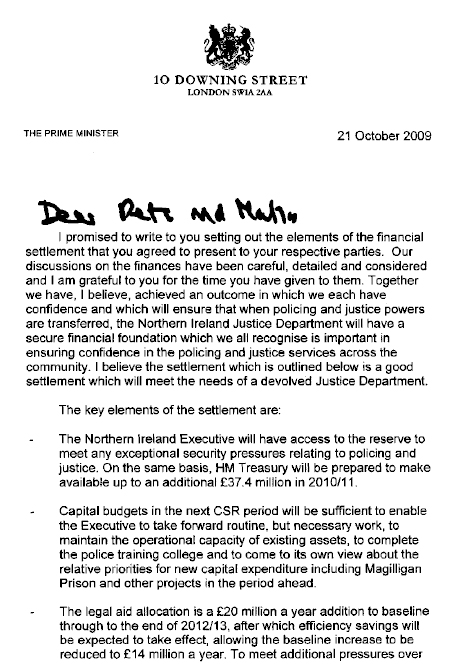
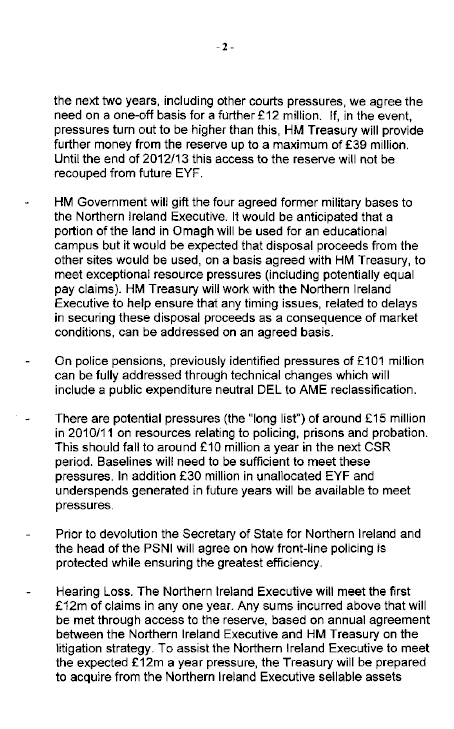

Covering Letter from
First Minister and Deputy First Minister
10 November 2009
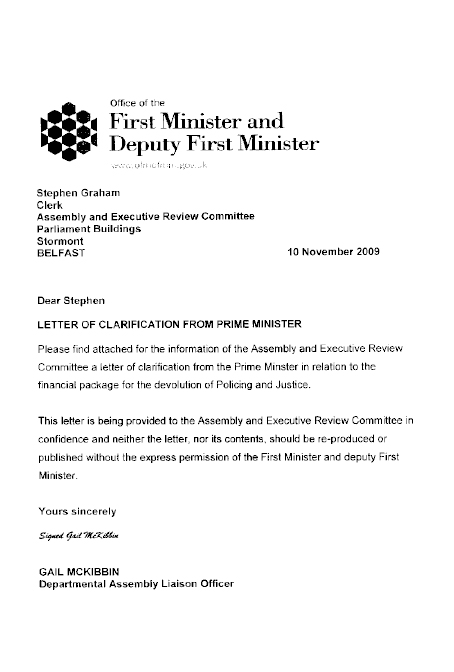
Letter from Prime Minister
21 October 2009
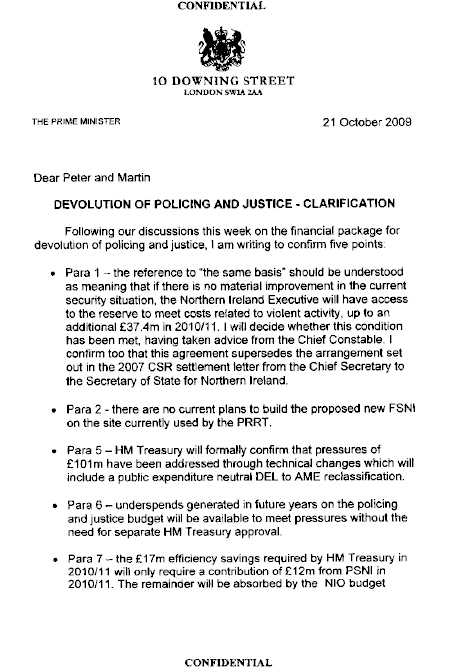
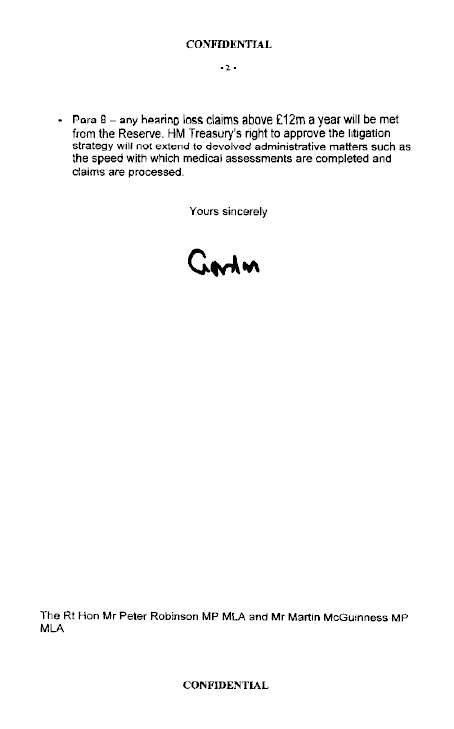
Appendix 4
Agreements, Concordats, Protocols and Memoranda of Understanding underpinning the Devolution of Policing and Justice Matters
Appendix 4
Agreements, Concordats, Protocols and Memoranda of Understanding underpinning the devolution of policing and justice matters
- Agreement Between the Government of the United Kingdom of Great Britain and Northern Ireland and The Government of Ireland on Co-Operation on Criminal Justice Matters
- Concordat Between Her Majesty’s Government and the Northern Ireland Executive on the Independence of the Judiciary in Northern Ireland
- Protocol on the Policing Architecture
- Agreement Between the Government of the United Kingdom of Great Britain and Northern Ireland and the Government of Ireland On Police Co-Operation
- Concordat between Her Majesty’s Government and the Northern Ireland Executive on the Independence of the Public Prosecution Service for Northern Ireland
(Including a Protocol between the Attorney General and the Prosecuting Departments) - Memoranda of Understanding on Sex Offenders
- Handling Arrangements for National Security Related Matters after Devolution of Policing and Justice to the Northern Ireland Executive
- Agreement at Hillsborough Castle
Agreement Between the Government of the
United Kingdom of Great Britain and
Northern Ireland and The Government of Ireland on Co-Operation on Criminal Justice Matters
The Government of the United Kingdom of Great Britain and Northern Ireland and the Government of Ireland:
Having regard to the Agreement between the Government of Ireland and the Government of the United Kingdom of Great Britain and Northern Ireland done at Belfast on 10 April 1998 (“the British-Irish Agreement") and to the Multi-Party Agreement reached at Belfast on 10 April 1998 annexed to the aforesaid Agreement;
Considering the report of the Review of the Criminal Justice System in Northern Ireland published in March 2000 (“the Criminal Justice Review"), the Justice (Northern Ireland) Act 2002, which enacts certain recommendations of the Criminal Justice Review, and the Criminal Justice Review Updated Implementation Plan published in June 2003;
Taking into account the progress made on co-operation between the relevant agencies in Ireland and in Northern Ireland (“the two jurisdictions") on policing and security matters;
Taking into account also developments within the European Union in respect of co-operation on criminal justice matters;
Recalling the discussions that took place between the two Governments and the political parties at Hillsborough Castle in March 2003 and the Joint Declaration published by the two Governments on 1st May 2003;
Have agreed as follows:
Article 1
Ministerial Meetings on Criminal Justice Cooperation
(1) The Ministers of the Northern Ireland Executive and Government of Ireland responsible for criminal justice matters in the two jurisdictions (hereinafter referred to as “the Ministers") shall meet at least annually for the purpose of facilitating more effective co-operation and coordination on criminal justice matters, including in combating criminal behaviour, working together in the prevention of crime and on community safety issues, and dealing with offenders after conviction. Such meetings shall be referred to hereinafter as Ministerial Meetings on Criminal Justice Cooperation.
(2) The Ministers shall provide periodic reports on the Ministerial Meetings on Criminal Justice Cooperation to their respective Ministerial colleagues in the Northern Ireland Executive and the Government of Ireland.
(3) The Ministerial Meetings on Criminal Justice Cooperation shall operate on the basis of the arrangements set out in the Annex, which shall constitute an integral part of this Agreement.
Article 2
Working Group on Criminal Justice Cooperation
(1) A Working Group on Criminal Justice Cooperation (hereinafter referred to as the “Working Group") comprising officials from Northern Ireland and Ireland shall meet regularly to support the Ministerial Meetings and to take forward work on progressing the relevant recommendations of the Criminal Justice Review, and to identify other areas in which co-operation on criminal justice matters could be enhanced or initiated, as appropriate.
(2) The Working Group shall prepare, seek the agreement of the Ministers to, and implement annual work programmes on co-operation and co-ordination on criminal justice matters. Such work programmes will be published, including in electronic format.
(3) The Working Group shall be accountable to the Ministers, and through the Ministers to the Northern Ireland Executive and Government of Ireland, and shall provide reports on progress to the Ministerial Meetings on Criminal Justice Cooperation.
(4) The Working Group shall meet at least twice each year and shall operate on the basis of the arrangements set out in the Annex, which shall constitute an integral part of this Agreement.
Article 3
Protocols
(1) Where appropriate, written Protocols may be drawn up between relevant criminal justice agencies in Northern Ireland and Ireland addressing detailed aspects of co-operation on criminal justice matters agreed between them.
(2) Any such protocols shall be submitted to the Ministers for approval and signature.
(3) Such protocols shall not constitute international agreements and shall not have binding effect.
Article 4
Relationship with other international agreements
This Agreement shall not affect the rights and obligations of the Parties under other international agreements.
Article 5
Operation and Review of Agreement
(1) This Agreement shall have effect in respect of criminal justice matters to the extent that they are devolved to the Northern Ireland Assembly and the Northern Ireland Departments and Ministers.
(2) The parties to this Agreement shall keep the Agreement under review.
Article 6
Entry into force
Each Government shall notify the other in writing of the completion, so far as it is concerned, of the requirements for entry into force of this Agreement. This Agreement shall enter into force on the date of receipt of the later of the two notifications.
In witness whereof the undersigned, being duly authorised thereto by the respective Governments, have signed this Agreement.
Done in two originals at on the day of 200[ ].
For the Government of the United For the Government of Ireland:
Kingdom of Great Britain and
Northern Ireland:
Annex
Arrangements for the Operation of the Ministerial Meetings and Working Group Meetings on Criminal Justice Co-Operation
Ministerial Meetings on Criminal Justice Cooperation
Terms of Reference
The Ministerial Meetings on Criminal Justice Cooperation shall serve as a forum for the Ministers to:
- discuss criminal justice matters of mutual interest or concern in the two jurisdictions.
- consider the scope for, and develop plans to achieve, more effective co-operation and co-ordination on criminal justice matters between the two jurisdictions.
- oversee and give direction to the work of the Working Group.
- approve and periodically review progress against the annual work programmes on criminal justice co-operation.
Attendance
The Ministers shall be supported at meetings by the Joint Chairmen of the Working Group or their nominated representatives and by such other officials and representatives from Northern Ireland and Ireland as the Ministers may determine. Both sides shall endeavour to maintain a balance in representation between the two jurisdictions and to keep overall numbers at a manageable level.
Secretariat
Officials from the Northern Ireland Department of Justice and officials from the Department of Justice, Equality and Law Reform shall provide administrative support for, and shall produce an agreed record of, all Ministerial Meetings on Criminal Justice Cooperation. Any disagreement about the record of a meeting that cannot be resolved through consultation between the two sides shall be referred to the Joint Chairmen and ultimately to the Ministers.
Working Group on Criminal Justice Cooperation
Terms of Reference
The Ministerial Meetings on Criminal Justice Cooperation shall be supported by a Working Group comprising officials from Northern Ireland and Ireland who shall meet at least twice a year in order to:
- exchange information and discuss criminal justice matters of mutual interest.
- identify and advise on the opportunities for co-operation on criminal justice matters between the devolved administration in Northern Ireland and the Government of Ireland and between the criminal justice agencies in the two jurisdictions, taking account also of the need for effective co-operation with other parts of these islands.
- prepare and submit annual work programmes on co-ordination and co-operation on criminal justice matters between the two jurisdictions for consideration at Ministerial Meetings on Criminal Justice Cooperation, and, where Ministers agree, to take forward the implementation of such programmes.
- take forward consideration of, and where appropriate implement, the recommendations on co-operation in relation to criminal justice matters in the Criminal Justice Review.
- establish and manage projects and initiatives to facilitate and enhance co-operation on criminal justice matters between the two jurisdictions.
- keep under review the effectiveness of the arrangements for facilitating and enhancing co-ordination and co-operation on criminal justice matters between the two jurisdictions, and make appropriate recommendations on these matters to Ministerial Meetings.
- prepare and agree periodic reports for the Ministers on progress in taking forward the Work Programme approved by Ministers.
- prepare and agree reports as appropriate for Ministers to provide to the Northern Ireland Executive and Government of Ireland.
Chairmanship
The Working Group shall be chaired jointly by the Justice Director of the Northern Ireland Department of Justice and the relevant Assistant Secretary from the Department of Justice, Equality and Law Reform, or their nominated representatives.
Meetings of the group shall alternate between Northern Ireland and Ireland. The chairmanship of meetings shall also alternate with their location. The Justice Director of the Northern Ireland Department of Justice shall take the chair when meetings take place in Northern Ireland. The relevant Assistant Secretary from the Department of Justice, Equality and Law Reform shall take the chair when meetings take place in Ireland.
Membership
Membership of the Working Group shall include such officials and representatives from Northern Ireland and Ireland as the Joint Chairmen may determine. Both sides shall strive to maintain a balance in representation between the two jurisdictions and to keep overall numbers at a manageable level.
Official support
The Working Group shall be supported by those officials from the Department of Justice, Equality and Law Reform and the Northern Ireland Department of Justice who provide administrative support to the Ministerial Meetings.
Records of meetings of the Working Group shall be agreed between the Joint Chairmen.
Concordat Between Her Majesty’s Government and the Northern Ireland Executive on the Independence of the Judiciary in Northern Ireland
Purpose
1. This concordat which will come into operation on 12th April 2010 sets out arrangements – agreed between Her Majesty’s Government and the Northern Ireland Executive – for underscoring the independence of the judiciary following the devolution of responsibility for criminal justice matters to the Northern Ireland Assembly and Executive.
2. In this Concordat “the 1978 Act" means the Judicature (Northern Ireland) Act 1978[1], “the 2002 Act" means the Justice (Northern Ireland) Act 2002[2]; “the 2004 Act" means the Justice (Northern Ireland) Act 2004[3]; “the 2005 Act" means the Constitutional Reform Act 2005[4]; and “the 2009 Act" means the Northern Ireland Act 2009[5].
Context
3. Her Majesty’s Government and the Northern Ireland Executive agree that the independence of the judiciary in Northern Ireland is essential in a democratic society which supports the rule of law. It is of paramount importance that the judicial function remains independent of Government and immune from any partisan or political interest. Public confidence requires that judicial decisions are taken in a fair, impartial, objective and consistent manner. This confidence can only be maintained if judges are able to act with independence.
4. It is also recognised that responsibility for setting the overall framework for the administration of justice, including the substantive civil and criminal law will be a matter for the Northern Ireland Executive. It is understood that the judiciary will not comment on substantive policy issues but may wish to comment on the operational implications of policy for the effective running of the courts.
Safeguarding Independence
5. Section 3 of the 2005 Act enacts a guarantee of judicial independence applicable to “the judiciary" throughout the United Kingdom, and imposes duties in that respect on the Lord Chancellor and other Ministers. Section 1(1) of the 2002 Act makes similar provision for Northern Ireland. The Government and the Northern Ireland Executive, agree that the other judicial office holders listed in Schedule 1 to the 2002 Act will continue to enjoy the same independence, as the judiciary to which these provisions expressly apply.
6. In order to underscore the independence of the judiciary in Northern Ireland, the following principles and arrangements have been agreed between Her Majesty’s Government and the Northern Ireland Executive:
6.1 The Lord Chancellor, Ministers of the Crown, the First Minister, the deputy First Minister, Northern Ireland Ministers and those with responsibility for matters relating to the judiciary or otherwise to the administration of justice must uphold the continued independence of the judiciary, in accordance with section 3 of the 2005 Act and section 1 of the 2002 Act (as substituted by section 4 of the 2005 Act) and the agreement set out in paragraph 5 above. This duty will operate whatever structures are put in place for administering justice matters.
6.2 Those listed in 6.1 shall not seek to influence particular judicial decisions through any special access to the judiciary or otherwise.
6.3 The responsible Northern Ireland Minister will ensure that there is an efficient and effective system to support the carrying on of the business of the courts and that appropriate services are provided for those courts.
6.4 The Lord Chief Justice shall exercise the role of the President of the Courts of Northern Ireland and head of the judiciary of Northern Ireland as provided for at section 12 of the 2002 Act (as amended by section 11 of the 2005 Act). In discharging this role he is responsible:
- for representing the views of the judiciary of Northern Ireland to Parliament, the Lord Chancellor and Ministers of the Crown generally;
- for representing the views of the judiciary of Northern Ireland to the Northern Ireland Assembly, the First Minister and deputy First Minister and Northern Ireland Minsters;
- for the maintenance of appropriate arrangements for the welfare, training and guidance of the judiciary of Northern Ireland within the resources made available by the responsible Northern Ireland Minister; and
- for the maintenance of appropriate arrangements for the deployment of the judiciary of Northern Ireland and the allocation of work within courts.
6.5 Under section 16 of the 2002 Act, the Lord Chief Justice is also responsible for the code of practice relating to complaints against the judiciary and for the referral of any serious complaints to a tribunal.
6.6 The Lord Chief Justice is also responsible for certain functions relating to the operation of the courts, which are set out at Schedule 5 to the 2005 Act.
6.7 These roles and responsibilities are fully acknowledged by Her Majesty’s Government and the Northern Ireland Executive who will act consistently with and in recognition of them.
6.8 The Lord Chief Justice may lay before Parliament written representations on matters which are the responsibility of Parliament and that appear to him to be matters of importance relating to the judiciary, or otherwise to the administration of justice, in Northern Ireland. Those matters do not include transferred matters within the legislative competence of the Northern Ireland Assembly, unless they are matters to which a Bill for an Act of Parliament relates.
6.9 The Lord Chief Justice may lay before the Northern Ireland Assembly written representations on matters which are the responsibility of the Assembly and that appear to him to be matters of importance relating to the judiciary, or otherwise to the administration of justice, in Northern Ireland. Those matters include transferred matters and excepted or reserved matters to which a Bill for an Act of the Assembly relates.
6.10 The responsibility of the Lord Chancellor shall be recognised in respect of the determination of judges’ remuneration, superannuation and other terms and conditions of service. Any determination which the Lord Chancellor makes in relation to the salaries, pensions, or other terms and conditions of the judiciary in Northern Ireland shall be accepted and given effect to by the Northern Ireland Executive.
Judicial Appointments
7. The appointment and tenure of judges is a determining factor in ensuring their independence. Appointment must be on merit alone. Judges should not be, and should not appear to be, beholden to any political office-holder or political doctrine for their appointment or preferment. Likewise, no political office-holder should be able to secure the appointment or determine the tenure of an individual judge. At the same time, and subject to the requirement that appointments and recommendations for appointment are made solely on the basis of merit, the legislation provides that the Judicial Appointments Commission should engage in a programme to ensure that judicial appointments should, so far as is reasonably practicable, be such that those holding listed judicial offices are reflective of the community in Northern Ireland. To further ensure the independence of the judiciary it is agreed between Her Majesty’s Government and the Northern Ireland Executive that:
7.1 There shall be transparency and openness in the administration of judicial appointments and removals, as provided for by the mechanisms set out in sections 12 to 12C of the 1978 Act (as inserted by section 2 of and Schedule 2 to the 2009 Act) and the 2002 Act (as amended by section 2 of and Schedule 3 to the 2009 Act).
7.2 There shall continue to be a Judicial Appointments Commission (“the Commission"), which shall –
- make recommendations to the Lord Chancellor for appointments to any judicial offices listed at Schedule 1 to the 2002 Act where the appointment is to be made by the Queen; and
- make appointments to any other judicial office listed at Schedule 1 to the 2002 Act.
7.3 Where a listed judicial office may be held by more than one person at any time, the Commission must, with the agreement of the justice department, determine the maximum number of persons who may hold the office. The Commission may from time to time, with the agreement of the justice department, revise the determination (paras 5(2) and (3) of Schedule 3 to the 2002 Act as substituted by section 2 of, and Schedule 3 to, the 2009 Act). Where the listed judicial office is that of a High Court judge then the maximum number shall be determined in accordance with section 2(3) of the 1978 Act.
7.4 The Commission shall make an appointment or recommendation for an appointment to fill any vacancy in a listed judicial office, unless the Lord Chief Justice has agreed that it may remain unfilled (paras 2(6), 2(7), 4(3) and 4(4) of Schedule 3 to the 2002 Act as substituted by section 2 of, and Schedule 3 to, the 2009 Act).
7.5 The Prime Minister shall make recommendations to Her Majesty The Queen for the appointment of the Lord Chief Justice and Lords Justices of Appeal unless, in relation to the latter, the Lord Chief Justice has agreed that the vacancy may remain unfilled (section 12(4) and (5) of the 1978 Act as substituted by section 2 of, and Schedule 2 to, the 2009 Act).
7.6 Before making a recommendation, the Prime Minister must consult –
- the Lord Chief Justice or, if that office is vacant or the Lord Chief Justice is not available, the senior Lord Justice of Appeal who is available; and
- the Commission.
(section 12(6) of the 1978 Act as substituted by section 2 of, and Schedule 2 to, the 2009 Act)
7.7 Appointments to listed judicial office and recommendations for appointment shall be made solely on the basis of merit, as required by paragraph 6(1) of Schedule 3 to the 2002 Act as substituted by section 2 of, and Schedule 3 to, the 2009 Act.
7.8 The Commission shall, subject to the principle of appointment on merit, engage in a programme of action designed to secure, so far as it is reasonably practicable to do so, that appointments to listed judicial offices are such that those holding such offices are reflective of the community, as set out in paragraphs 6(2) and (3) of Schedule 3 to the 2002 Act as substituted section 2 of, and Schedule 3 to, the 2009 Act.
7.9 The Lord Chief Justice shall hold office during good behaviour. He may be removed from office, in accordance with section 12B of the 1978 Act (as substituted by section 2 of, and Schedule 2 to, the 2009 Act), by an address presented to Her Majesty The Queen by both Houses of Parliament. No motion for the presentation of such an address may be made unless –
- the Prime Minister has, after consulting the Lord Chancellor, convened a removals tribunal;
- that tribunal has reported to the Prime Minister recommending that the office holder be removed on the ground of misbehaviour; and
- a copy of the report has been laid before both Houses of Parliament.
7.10 Lords Justices of Appeal and those High Court judges appointed before the commencement of section 7 of the 2002 Act shall hold office during good behaviour. They may be removed from office, in accordance with section 12C of the 1978 Act (as inserted by section 2 of, and Schedule 2 to, the 2009 Act), by Her Majesty following an address presented to Her by both Houses of Parliament. No motion for the presentation of such an address may be made unless –
- either the Lord Chief Justice or the Northern Ireland Judicial Appointments Ombudsman has (after consulting the other) convened a removals tribunal;
- that tribunal has reported to the Lord Chief Justice recommending that an office holder be removed on the ground of misbehaviour;
- either the Lord Chief Justice has advised the Prime Minister and the Lord Chancellor to accept the tribunal’s recommendation or, if the Lord Chief Justice does not so advise, the Prime Minister and the Lord Chancellor have consulted him about the recommendation;
- a copy of the tribunal’s report has been laid before both Houses of Parliament.
7.11 A person may be removed from a listed judicial office in accordance with section 7 of the 2002 Act (as amended by paragraph 6 of Schedule 3 to the 2009 Act), by the Lord Chief Justice, but only on the basis of a report of a removals tribunal convened by either the Lord Chief Justice or the Northern Ireland Judicial Appointments Ombudsman (after consulting the other) under section 8 of the 2002 Act (as substituted by paragraph 7 of Schedule 3 to the 2009 Act). A tribunal must consist of a Lord Justice of Appeal or a judge of the High Court, a person who holds an office within section 3(6)(a) to (e) of the 2002 Act (that is, a Lord Justice of Appeal, a judge of the High Court, a county court judge, a district judge (magistrates’ courts) or a lay magistrate) both of whom are selected by the Lord Chief Justice and must be judicial members of the Commission (unless the Commission agrees otherwise) and a lay member of the Commission selected by the Judicial Appointments Ombudsman.
7.12 If a removals tribunal is convened under any of the legislative provisions referred to in paragraphs 7.9 to 7.11, the person convening the tribunal will inform the Northern Ireland Minister for Justice.
Review Arrangements
8. Any difficulties experienced by the Northern Ireland Executive or Her Majesty’s Government in operating these arrangements will in the first instance be raised through normal administrative channels, either at official or Ministerial level. Where a dispute or difficulty cannot be resolved in this way, a resolution will be sought in accordance with the principles and arrangements set out in the Memorandum of Understanding between Her Majesty’s Government and the devolved administrations.
Secretary of state First Minister
HM Government Northern Ireland Executive
Lord CHANCELLOR Deputy First Minister
Northern Ireland Executive
[1] 1978 c.23.
[2] 2002 c.26.
[3] 2004 c.4.
[4] 2005 c.4.
[5] 2009 c.3.
Protocol on the Policing Architecture
1. Introduction
1.1 This protocol has been agreed by the Minister of Justice and the Assembly Statutory Committee. It sets out operating principles for the relationship between the Department, the Committee, PSNI and Policing Board.
1.2 The protocol seeks to ensure that arrangements provide for clarity of accountability and avoid duplication or overlap. It does not deal with those excepted matters which are the responsibility of the UK Government, such as national security and related issues.
2. Roles and Responsibilities
2.1 The roles and responsibilities of the key stakeholders are set out below.
2.2 The Minister of Justice has political responsibility for policing and justice and is accountable to the Assembly for policing and justice matters, including public policy on policing and the governance arrangements for the PSNI. The governance arrangements are captured in a Framework Document, in line with DFP requirements. The Minister is responsible for maintaining the legislative framework in relation to policing in Northern Ireland. The Minister of Justice is also responsible for setting long-term objectives for the police, in consultation with the Board, the Chief Constable and such other persons as he or she thinks appropriate. In doing so, the Minister will also consult with the Committee. Statutory Reference: Police (Northern Ireland) Act 1998, amended by Northern Ireland (Miscellaneous Provisions) Act 2006.
2.3 The Northern Ireland Policing Board is a Non Departmental Public Body sponsored by the Department of Justice. It is responsible for securing the maintenance of the police, the efficiency and effectiveness of the police and for holding the Chief Constable to account for the exercise of his functions and those of the police. It is also responsible for a range of other duties, including preparation and publication of an annual Policing Plan, reflecting the Minister’s long term policing objectives, and on monitoring the performance of the police in general, and particularly in relation to compliance with the Human Rights Act and the extent to which membership of the police and support staff is representative of the community. Statutory references: Sections 3(1), 3(2), 3(3) (a), 18 and 19 of Police (Northern Ireland) Act 2000.
2.4 The Chief Constable is operationally responsible for directing and controlling the police and will be the Minister’s chief professional advisor on policing and security matters. The PSNI has operational responsibility for policing, and for implementing the policies and objectives set by the Department and the Board. Statutory reference: Section 33(1) Police (Northern Ireland) Act 2000.
2.5 The Assembly has legislative responsibility for all transferred matters, including policing and justice matters. The Committee has a scrutiny, policy development and consultation role as conferred by paragraph 9 of the Belfast Agreement and is responsible for assisting and advising the Minister in the formulation of policy with respect to matters within his responsibilities as Minister. Statutory reference: Section 29(1) (a) Northern Ireland Act 1998.
3. Accountability Arrangements
3.1 The Minister of Justice is accountable to the Assembly for the exercise of his or her statutory responsibilities and those of his or her department.
3.2 The Policing Board operates under governance arrangements as defined by the Department of Justice; these are set out in a Framework Document in line with DFP requirements.
3.3 The Chief Constable is accountable to the Policing Board for the exercise of his functions and those of his officers and support staff.
3.4 In fulfilling its statutory role, the Committee will have regard to the statutory remit of the Board taking account of the Assembly endorsed recommendation that devolution should not diminish the powers of the Policing Board. The Assembly’s responsibility for these functions is not retrospective. In practice, the Committee would seek to avoid duplication in relation to those activities undertaken by the Board in line with its statutory remit.
3.5 Members of the Committee should not sit simultaneously on either the Policing Board or a District Policing Partnership or one of the Belfast DPP subgroups.
4. Resources
4.1 The Minister of Justice will determine the policing budget within the overall Departmental allocation. The Policing Board has a statutory responsibility to prepare an estimate of the resources required by the PSNI. The Chief Constable prepares a draft estimate for submission to the Board.
4.2 The Minister of Justice will be accountable to the Committee for the overall use of resources within his or her budget.
4.3 The Policing Board will play the leading role in scrutinising the effectiveness and efficiency of PSNI use of resources.
4.4 The Public Accounts Committee and Northern Ireland Audit Office will operate in line with their statutory responsibilities.
5. Major Operational Issues
5.1 Where a significant incident occurs, the roles and responsibilities set out in this document will continue to apply.
5.2 The Chief Constable will inform the Minister and the Chairman of the Board as a matter of priority.
5.3 The Minister will consider making a statement to the Assembly or providing information to the Committee if the incident is sufficiently serious.
5.4 The Chief Constable will have operational responsibility for ensuring that the PSNI response to such an incident is effective and efficient, and will be held to account for his decisions by the Policing Board.
Agreement Between the Government of the
United Kingdom of Great Britain And
Northern Ireland and the Government of Ireland On Police Co-Operation
The Government of the United Kingdom of Great Britain and Northern Ireland and the Government of Ireland:
Having regard to the Agreement between the Government of the United Kingdom of Great Britain and Northern Ireland and the Government of Ireland done at Belfast on 10 April 1998 (“the British-Irish Agreement") and to the Multi-Party Agreement reached at Belfast on 10 April 1998 annexed to the aforesaid Agreement;
Having regard also to the Agreement between the Government of the United Kingdom of Great Britain and Northern Ireland and the Government of Ireland done at Dublin on 8 March 1999 establishing a British-Irish Intergovernmental Conference;
Considering the report of the Independent Commission on Policing for Northern Ireland published in September 1999 (“the Patten Report");
Taking into account the progress made within the European Union on improving police co-operation pursuant to the provisions of Title VI of the Treaty on European Union;
Recalling the discussions that took place between the two Governments at Weston Park in July 2001, the measures announced on 1 August 2001 and the Updated Implementation Plan for the Patten Report published in August 2001;
Noting the establishment of the new Policing Board for Northern Ireland;
Have agreed as follows:
Article 1 Eligibility to apply for posts
(1) (a) The Government of the United Kingdom of Great Britain and Northern Ireland shall introduce the necessary administrative and legislative measures to enable members of the Garda Síochána to apply for posts at ranks of above Inspector level in the Police Service of Northern Ireland.
(b) When determining the eligibility of a member of the Garda Síochána to apply for such posts in the Police Service of Northern Ireland, appropriate recognition will be given to the rank, experience and qualifications that would be required for an equivalent rank in the Garda Síochána. An eligible applicant will be required to compete in a merit-based selection procedure with all other applicants.
(2) (a) The Government of Ireland shall introduce the necessary administrative and legislative measures to enable members of the Police Service of Northern Ireland to apply for posts at ranks of above Inspector level in the Garda Síochána.
(b) When determining the eligibility of a member of the Police Service of Northern Ireland to apply for a post in the Garda Síochána, appropriate recognition will be given to the rank, experience and qualifications that would be required for an equivalent rank in the Police Service of Northern Ireland. An eligible applicant will be required to compete in a merit-based selection procedure with all other applicants.
Article 2 Secondment with Policing Powers
(1) (a) The Government of the United Kingdom of Great Britain and Northern Ireland shall introduce the necessary administrative and legislative measures to enable members of the Garda Síochána to be seconded to the Police Service of Northern Ireland for periods not exceeding three years.
(b) For the duration of such secondments, the member in question shall have the same powers, duties, rights and obligations, including as appropriate the wearing of the uniform, as an attested member of the Police Service of Northern Ireland. For the duration of the secondment, the member shall not be subject to the direction and control of the Garda Commissioner and shall not exercise police powers within the jurisdiction of the Government of Ireland.
(2) (a) The Government of Ireland shall introduce the necessary administrative and legislative measures to enable members of the Police Service of Northern Ireland to be seconded to the Garda Síochána for periods not exceeding three years.
(b) For the duration of such secondments, the member in question shall have the same powers, duties, rights and obligations, including as appropriate the wearing of the uniform, as an attested member of the Garda Síochána. For the duration of the secondment, the member shall not be subject to the direction and control of the Chief Constable of the Police Service of Northern Ireland and shall not exercise police powers within Northern Ireland.
Article 3 Police Protocols
(1) The Police Service of Northern Ireland and the Garda Síochána shall, as appropriate, draw up written Protocols between them addressing detailed aspects of co-operation between them, including in particular the issues referred to in Articles 2, 3, 5, 6, 7, 8, 9 and 10 of this Agreement.
(2) Such Protocols shall be signed by the Commissioner of the Garda Síochána and the Chief Constable of the Police Service of Northern Ireland or persons authorised to do so on their behalf. Copies of all such Protocols shall be forwarded to the Minister for Justice, Equality and Law Reform, the Secretary of State for Northern Ireland and the Northern Ireland Policing Board.
(3) Such Protocols shall not constitute international agreements and shall not have binding effect on either Government.
Article 4 Annual Conference
An annual conference shall be convened between the Police Service of Northern Ireland and the Garda Síochána. It shall be hosted by each service on an alternating basis and the conference topics shall be decided by mutual arrangement between the two services. The costs of the conference shall be met by the host service and each service shall meet their own travel costs in attending the conference.
Article 5 Personnel Exchanges
(1) A programme shall be introduced to facilitate members of the Police Service of Northern Ireland being placed in the Garda Síochána, and members of the Garda Síochána being placed in the Police Service of Northern Ireland for periods not exceeding one year.
(2) The purpose of these placements will be to further enhance links and to transfer experience and expertise, including in the area of training.
(3) Members of the Garda Síochána will, for the duration of their placement, report to and work with the Police Service of Northern Ireland. However the member placed will remain a full member of the Garda Síochána subject to the overall direction and control of the Garda Commissioner and shall not exercise any police powers in Northern Ireland.
(4) Members of the Police Service of Northern Ireland will, for the duration of their placement, report to and work with the Garda Síochána. However the member placed will remain a full member of the Police Service of Northern Ireland subject to the overall direction and control of the Chief Constable and shall not exercise any police powers in the jurisdiction of the Government of Ireland.
Article 6 Liaison
(1) Officers in both services shall be designated as liaison officers as considered appropriate to enhance co-operation between the Garda Síochána and the Police Service of Northern Ireland.
(2) The Commissioner of the Garda Síochána and the Chief Constable of the Police Service of Northern Ireland shall, in consultation with the respective Governments, explore other methods of enhancing liaison including the possible exchange of liaison officers.
Article 7 Training
The Police Service of Northern Ireland and the Garda Síochána shall enhance structures for co-operation in the area of training.
Article 8 Disaster Planning
The Police Service of Northern Ireland and the Garda Síochána shall, in consultation with other authorities responsible for the emergency services in both jurisdictions, work together in promoting improved joint planning.
Article 9 Joint Investigations
(1) The Police Service of Northern Ireland and the Garda Síochána shall, as appropriate, make full use of existing arrangements for facilitating joint investigations and additional arrangements that are put in place in the context of European Union developments.
(2) An expert group shall be established by both Governments to review the existing arrangements and to make recommendations on legal and administrative measures that could be taken to facilitate further the operation of joint Police Service of Northern Ireland and Garda Síochána investigations.
Article 10 Communications
(1) The Police Service of Northern Ireland and the Garda Síochána shall review communication links on an ongoing basis with a view to establishing and enhancing fast, effective and reliable communications.
(2) The Police Service of Northern Ireland and the Garda Síochána shall, as appropriate, consult with one another in the context of the procurement and development of their communications and information technology systems, and shall take into account the desirability of achieving greater compatibility between their systems.
Article 11 Relationship with other international agreements
This Agreement shall not affect the rights and obligations of the Parties under other international agreements.
Article 12 Entry into force
Each Government shall notify the other in writing of the completion, so far as it is concerned, of the requirements for entry into force of the Agreement. This Agreement shall enter into force on the date of the receipt of the later of the two notifications.
In witness whereof the undersigned, being duly authorised thereto by the respective Governments, have signed this Agreement.
Done in two originals at Belfast on the twenty-ninth day of April 2002.
For the Government of the United For the Government of Ireland:
Kingdom of Great Britain and
Northern Ireland:
John Reid John O’Donoghue
Concordat between Her Majesty’s Government and the Northern Ireland Executive on the Independence of the Public Prosecution Service
for Northern Ireland
Purpose
1. This concordat sets out arrangements – agreed between Her Majesty’s Government and the Northern Ireland Executive – for safeguarding the independence of the Public Prosecution Service for Northern Ireland following the devolution of responsibility for criminal justice matters to the Northern Ireland Assembly and Executive.
2. All references in this Concordat to “the 2002 Act" and “the 2004 Act" are to be taken as references to the Justice (Northern Ireland) Act 2002 and the Justice (Northern Ireland) Act 2004 respectively.
Independence of the Public Prosecution Service
3. Her Majesty’s Government and the Northern Ireland Executive agree that safeguarding the independence of the Public Prosecution Service for Northern Ireland is essential in a democratic society which supports the rule of law. Public confidence requires that decisions on whether to prosecute or not are taken in a fair and impartial manner. This can only be safeguarded if the independence of the prosecuting authority is maintained and protected.
4. In order to safeguard the independence of the Public Prosecution Service for Northern Ireland the following principles and arrangements have been agreed between Her Majesty’s Government and the Northern Ireland Executive:
- In accordance with section 42(1) of the 2002 Act, the functions of the Director will be exercised by him independently of any other person. The Director is the head of the Public Prosecution Service, and the Deputy Director, the Public Prosecutors and other members of staff of the Service are subject to his direction as provided by section 29(6) of the 2002 Act. The Director of Public Prosecutions will have operational responsibility and accountability for the Public Prosecution Service for Northern Ireland.
- The Director and Deputy Director of Public Prosecutions will be appointed by the Attorney General for Northern Ireland in accordance with section 30 of the 2002 Act. The relationship between the Director of Public Prosecutions and the Attorney General for Northern Ireland will be consultative only, as set out in section 42(2)-(3) of the 2002 Act. The Attorney General will have no power of direction or superintendence over the Public Prosecution Service, whether in individual cases or matters of policy. The institution or continuance of criminal proceedings shall not be subject to the consent or fiat of the Attorney General. It is an essential and fundamental principle that the Public Prosecution Service for Northern Ireland is independent in the discharge of its functions.
- Subject to the standing orders of the Assembly, it is intended that the Attorney General for Northern Ireland may, in any proceedings of the Assembly, answer any question or produce any document relating to the operation of the system of prosecution of offences in any particular case if he considers that answering the question or producing the document does not prejudice criminal proceedings in that case or is not otherwise against the public interest. In accordance with section 42(3) of the Act the Director of Public Prosecutions will consult with the Attorney General on any matter for which the Attorney General is accountable to the Assembly and provide such information as is consistent with the independent exercise of the Director’s functions.
- It is the duty of the Director of Public Prosecutions to take decisions as to prosecution in accordance with law and practice. He will exercise this quasi-judicial function in a wholly independent manner and not be subject to interference, question or pressure by the Northern Ireland Executive or by members of the Assembly.
- As set out in section 32A of the 2002 Act (as amended by section 7 of the 2004 Act) it shall be an offence to seek to influence a prosecutor with the intention of perverting the course of justice.
- The Public Prosecution Service shall be a non-ministerial Department funded by monies voted in the Assembly in a manner that ensures it can carry out its duties and responsibilities in an efficient and effective manner. [DN: This is on the assumption that as a non-ministerial Department, funding will be routed through DFP, as for all other Departments]
- In accordance with section 30(11) of the Act, the Director of Public Prosecutions, the Deputy Director and members of staff of the Service shall not be required in any proceedings of the Assembly to answer any question or produce any document relating to a matter other than the finances and administration of the Service. However, as a matter of practice the Director would seek to provide relevant information to assist the Assembly in its business where that did not interfere with the Directors quasi-judicial role or with the legal duties of the Public Prosecution Service.
- As set out in section 39 of the 2002 Act, the Director will prepare a report each year on how he has exercised his functions, and the Attorney General for Northern Ireland will arrange for each annual report to be published and to be laid before the Northern Ireland Assembly.
Inspection of the Public Prosecution Service
5. The Public Prosecution Service for Northern Ireland will be subject to inspection by the Criminal Justice Inspectorate. Any inspection of the Public Prosecution Service shall be subject to the safeguards set out in sections 46 and 47 of the 2002 Act. The Attorney General for Northern Ireland will be consulted by the Chief Inspector about the work programme of the Inspectorate and any intention to undertake an inspection of the Public Prosecution Service.
Review Arrangements
6. Her Majesty’s Government and the Northern Ireland Executive will seek to resolve any issues concerning these principles and arrangements, in the first instance, through normal administrative channels, either at official or ministerial level. If any matter cannot be resolved in this manner, resolution will be sought in accordance with the principles and arrangements set out in the Memorandum of Understanding between Her Majesty’s Government and the devolved administration.
Secretary of State First Minister
Her Majesty’s Government Northern Ireland Executive
Attorney General Deputy First Minister
Her Majesty’s Government Northern Ireland Executive
Protocol between the Attorney General and
the Prosecuting Departments
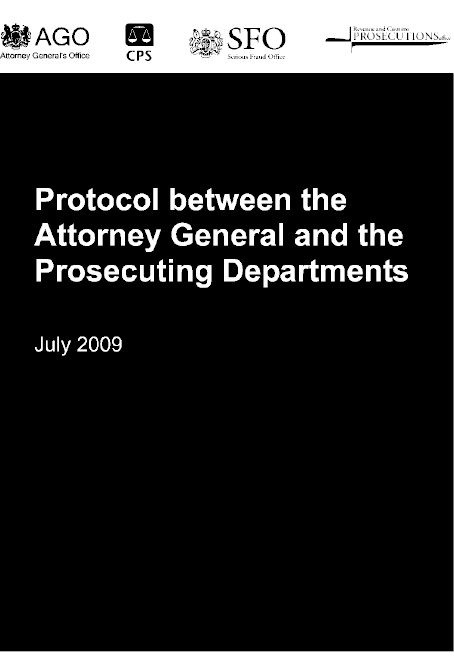
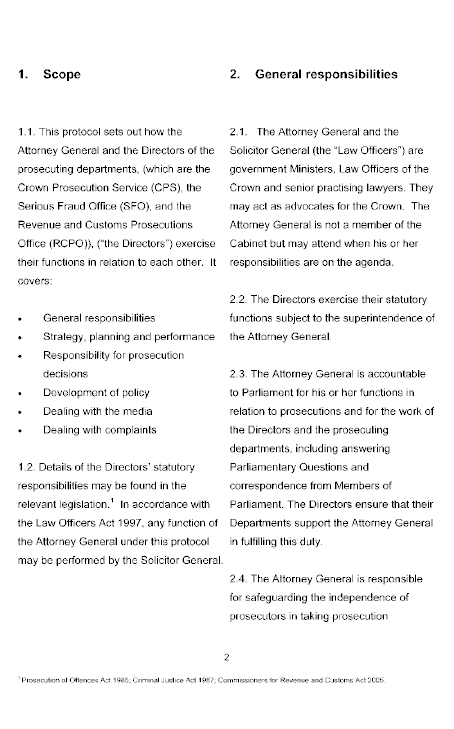
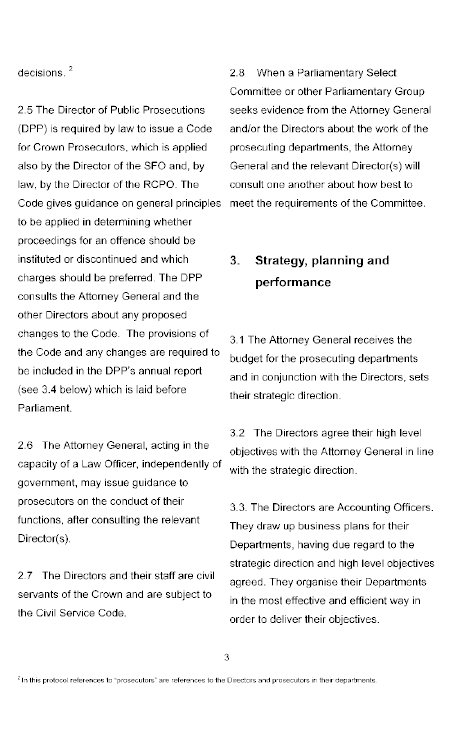
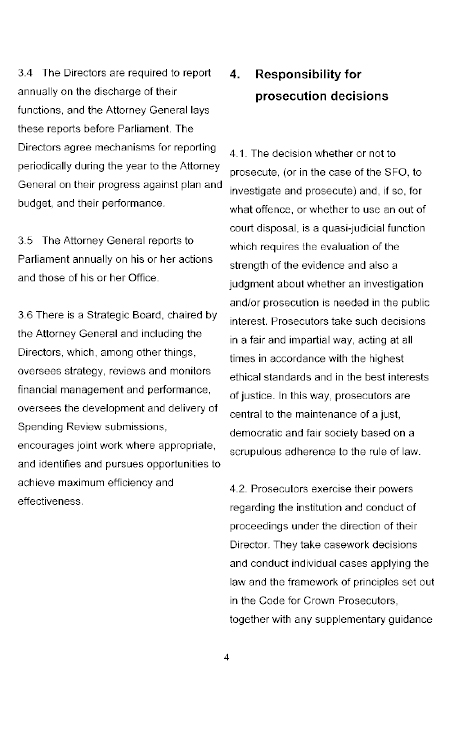
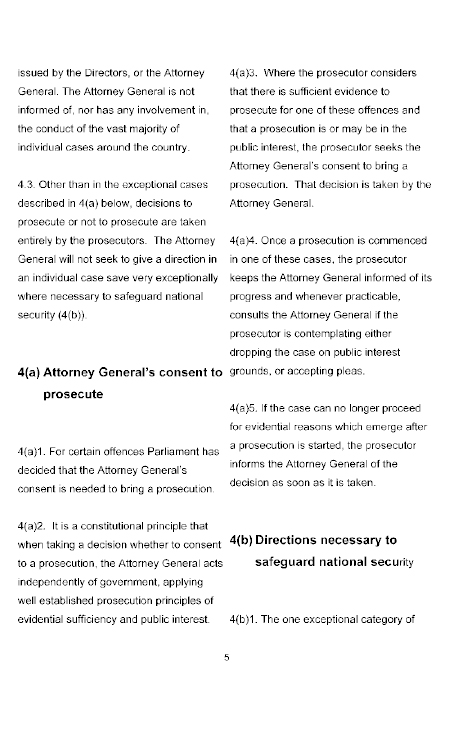
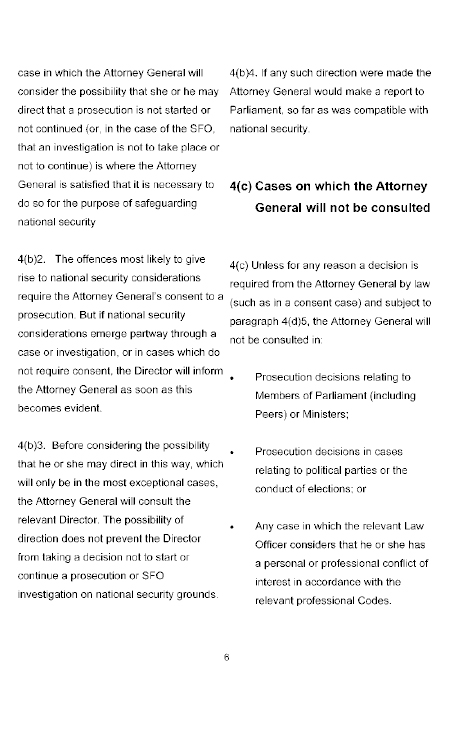
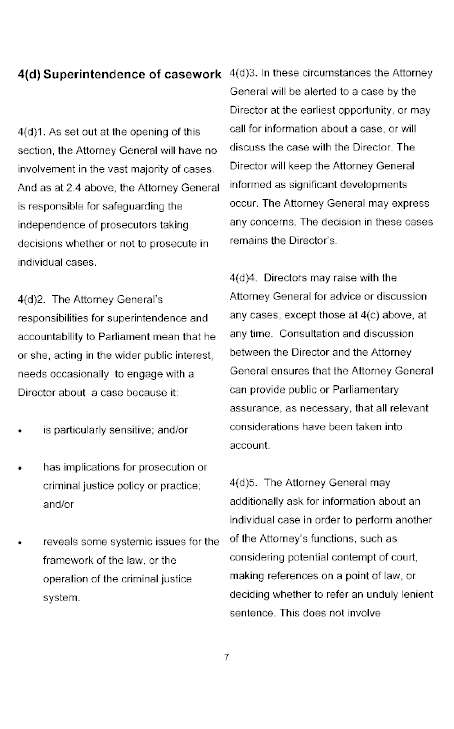
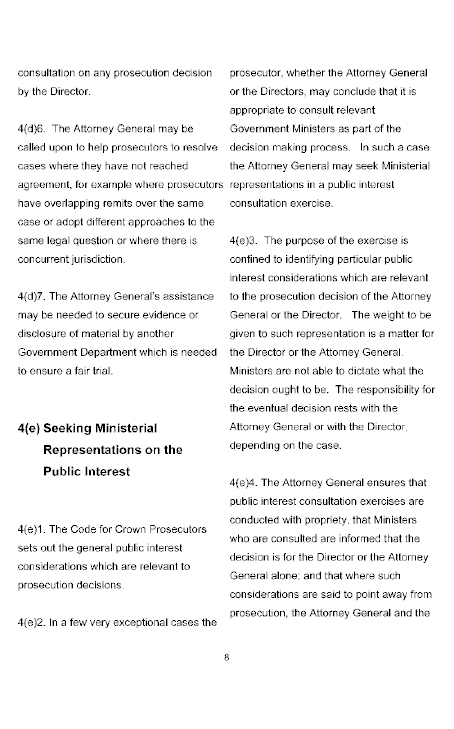
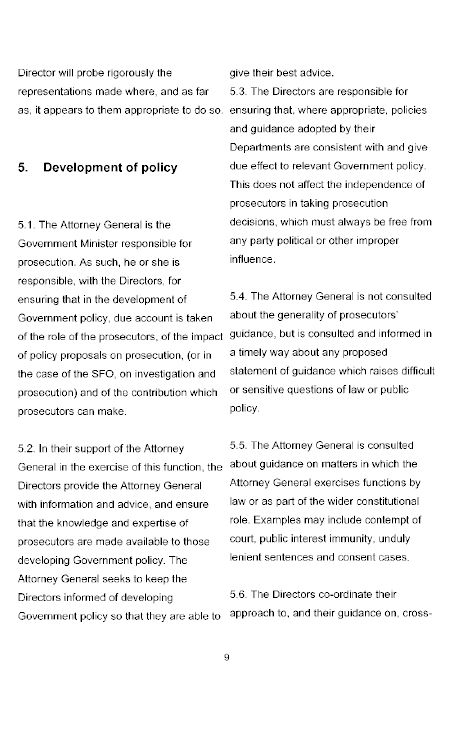
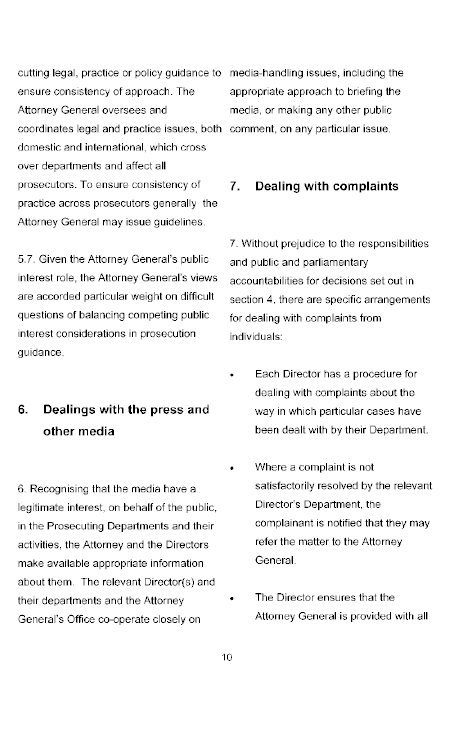
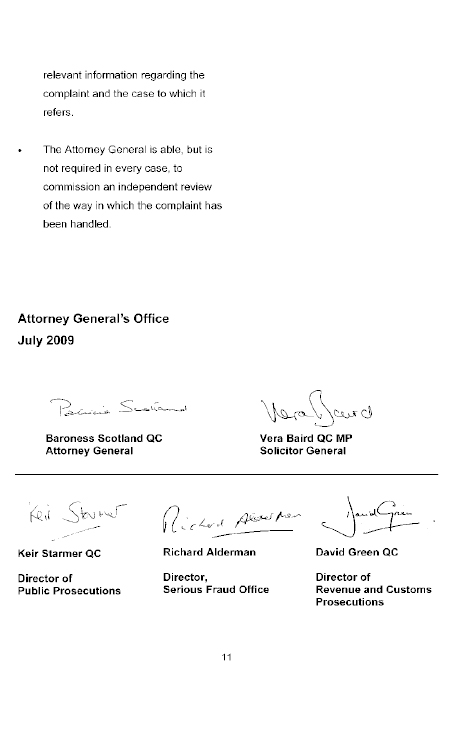
Memoranda of Understanding on Sex Offenders
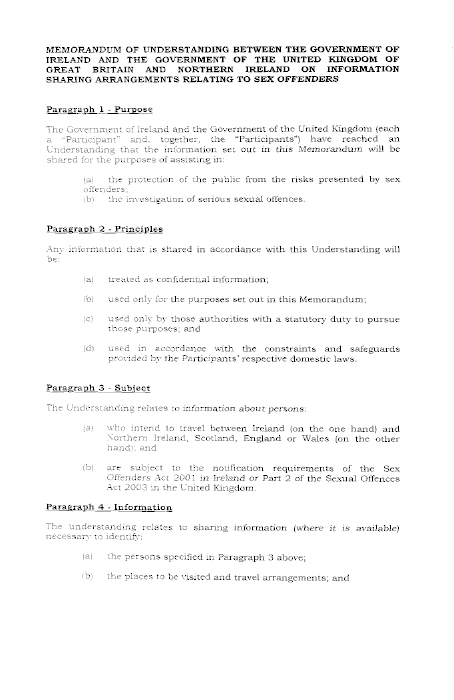
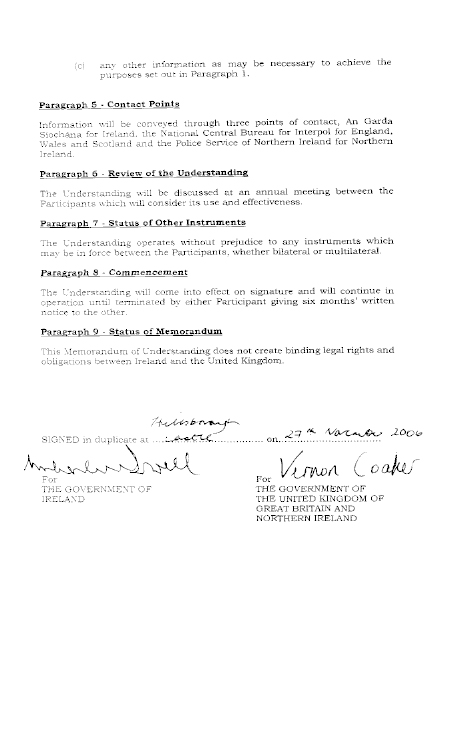
Handling Arrangements for National Security Related Matters after Devolution of Policing and Justice to the Northern Ireland Executive
Introduction
1. After devolution of policing and justice, the Northern Ireland Minister of Justice (hereafter referred to as the Minister of Justice) will be responsible for policing and criminal justice policy[1].The Secretary of State remains responsible for national security matters. The Transfer of Functions Orders set out in more detail what this means in practice in terms of the full range of functions which will devolve and the small number of functions which will remain with the Secretary of State.
2. It is recognised that national security related issues may touch on the responsibilities of the Minister of Justice. This protocol sets out arrangements for managing this issue so as to ensure that the NI Executive and the UK Government can each carry out their respective responsibilities effectively and that national security issues are properly protected.
What is ‘national security’?
3. ‘National security’ relates to the safety and security of the state and its people. ‘The protection of national security, and the carrying out of other related activities in the interests of national security, are in law the functions of the Security and Intelligence Agencies (“SIAs"), accountable to Ministers in the UK Government.
General Principles
4. Constitutionally, national security is an excepted matter under section 4 of and Schedule 2 to the Northern Ireland Act 1998 (“the 1998 Act"). It is not, therefore, among those matters devolved to the Northern Ireland Assembly.
5. Issues will arise within the transferred policing and justice field which have a national security dimension or which touch on national security related issues. Therefore, there will be a need for consultation and the sharing of information between the Secretary of State and the Minister of Justice. It is the responsibility of the UK Government to determine what information pertaining to national security can be shared and on what terms it is provided. Information which, if made public, might hinder the ability of the SIAs to perform their functions, or which might reveal the operations, investigations, sources, techniques or methodologies of the SIAs or of other agencies that use the same techniques or methodologies will not be shared.
6. The attached Annex illustrates the areas where it has been identified there is a national security or other excepted or reserved interface with the responsibilities of the devolved administration.
Consultation
7. The interface between the responsibilities of Minister of Justice and the Secretary of State’s national security responsibilities will be facilitated by regular meetings between the two Ministers or their specified representatives. At these meetings, each Minister will set out any issues likely to be of relevance to the conduct of the other’s responsibilities in accordance with the principles established at paragraph 5 above and each Minister may raise any issue of concern. These formal regular meetings will be supplemented by ad hoc information exchange as and when required. Arrangements will also be put in place for the Chief Constable to brief the Minister of Justice on the security situation in Northern Ireland (as the Chief Constable already briefs the Policing Board). In addition there are statutory responsibilities on each Minister, as set out in the Transfer Orders, to consult the other in certain areas where there is a specific interface between national security and policing and criminal justice policy.
Public Confidence
8. It is important that there is public confidence in the way in which these arrangements operate. Mechanisms to give effect to these arrangements will operate on the basis that:
i. Northern Ireland policing and justice agencies are accountable to the Minister of Justice on all devolved policing and justice matters;
ii. All relevant and appropriate information will be shared between the Minister of Justice and the Secretary of State consistent with the terms of this protocol;
iii. The Minister of Justice and the Secretary of State will consult each other in accordance with para 7 above.
iv. decisions by Minister of Justice and the Secretary of State can be subject to legal challenge;
v. the Secretary of State will declare publicly any occasion on which his powers to prevent national security information from being made public in reports to be issued by HMIC, CJINI, OPONI or Prisoner Ombudsman, has been invoked so that there is public awareness of the decision.
Oversight
9. In addition, Lord Carlile, and any successor, was given the remit following the transfer of primacy for national security matters from PSNI to the Security Service in 2007 to review annually the operation of the arrangements for handling national security matters in Northern Ireland. As part of this role Lord Carlile will in future include an assessment within his annual review of whether the Secretary of State acted reasonably in cases where he has used his statutory responsibilities in respect of national security in Northern Ireland to withhold information from reports that are published by HMIC, CJINI, OPONI or Prisoner Ombudsman. It will be open to the Justice Minister to draw any issues of concern in respect of a particular case to Lord Carlile’s attention and invite him to consider the operation of the arrangements in that instance. Lord Carlile, and any successor, will share his conclusions with the Minister of Justice in accordance with the principles set out in paragraph 5.
NIO historic records
10. All records created by the NIO prior to devolution, whether they are held electronically or on paper files, remain Crown Public Records and continue to be subject to the Public Records Act 1958. The NIO therefore retains ownership of and control of access to all pre-devolution records.
11. To facilitate the smooth operation of the Department of Justice (DOJ), and to ensure good governance, the NIO will provide access for DOJ officials to those pre-devolution NIO records relating to matters that are now devolved that are necessary for them to carry out their post-devolution functions effectively. DOJ officials will have no access to pre-devolution NIO records that relate to matters that remain the responsibility of the UK Government, including records that relate to matters of national security.
12. For the purposes of the Freedom of Information Act 2000 (FOIA), any pre-devolution NIO records that are held by the DOJ will be deemed to be held by the DOJ “on behalf of" the NIO. Under the FOIA, information held by one public authority on behalf of another is considered, for the purposes of the Act, to be held by the originating body, and they are the decision making body. Therefore, when a person requests access to information held on pre-devolution NIO records that are on loan to the DOJ, it will be for the NIO to provide the response to the applicant and apply any exemptions or public interest test that might be necessary.
Dispute resolution
13. This protocol is not legally binding and does not give rise to legal obligations. It is intended to guide the work of the UK Government and the NI Executive. In the event that either the UK Government or the NI Executive believe that the terms of this protocol are not being observed, the issues will be raised with the other party and if necessary may be referred to the machinery of the Joint Ministerial Committee established by the overarching Memorandum of Understanding which sets out the principles that underlie relations between the UK Government and the NI Executive.
Power to vary terms of protocol
14. The UK Government will consider any requests by the NI Executive for changes to this protocol. The UK Government will also review the terms of the protocol from time to time consulting the Minister of Justice in doing so; and will consult with the NI Executive before amending it. Annex
Arrangements for Managing Issues which are National Security Related or Which Have a
National Security Dimension
1 Counter-Terrorism Policy and Legislation
1.1 UK-wide counter-terrorism legislation applies in Northern Ireland and remains the responsibility of the UK Government. In pursuance of that responsibility, the UK Government works with the PSNI and other agencies in the policing and justice field on issues relating to counter terrorism and other reserved or excepted functions.
1.2 The independent reviewer of terrorism legislation, appointed by the UK Government under the Terrorism Act 2006, will continue to require access to PSNI and other devolved bodies, and the provision of statistics about the use of terrorism powers. The reviewer will consult the Minister of Justice in carrying out this work.
1.3 Detailed guidance on the exercise of police powers under counter-terrorism legislation is contained in the Codes of Practice made under the Police and Criminal Evidence (Northern Ireland) Order 1989 (for example, how persons arrested under section 41 of the Terrorism Act 2000 should be treated while held in police custody). This guidance is additional to any safeguards written into counter-terrorism legislation. Although the counter-terrorism powers themselves remain an excepted matter it is for the Minister of Justice to maintain these Codes of Practice, including those aspects of them that provide operational guidance on the use of counter-terrorism powers by the police in Northern Ireland. The Secretary of State will keep devolved Ministers informed of any changes in the law that might require changes to the Codes to be made.
2 Contingency planning and crisis management
2.1 These matters are devolved. Northern Ireland Executive Ministers lead in the planning and government response to any event that does not involve a national security dimension. Where a crisis or public order situation is national security related, it remains the responsibility of the devolved administration to manage the devolved government agencies’ response in close liaison with the NIO which leads on any issues relating to reserved or excepted matters including deployment of the armed forces, co-ordination across national government, UK wide media handling and international implications.
2.2 The police operational response, including any request for military assistance, is a matter for the Chief Constable who has operational responsibility and is independent consistent with the arrangements in place between the Home Secretary and other Chief Constables.
3 Policing
3.1 The Independent Commission[2] on Policing in Northern Ireland recommended that responsibility for policing be devolved to the NI Executive, except for matters of national security. Post devolution of policing and justice, the Chief Constable, while remaining operationally responsible, will be accountable to the Minister of Justice on all aspects of PSNI work save that he or she will continue to be accountable to the Secretary of State (representing the UK Government) for those aspects of the PSNI’s work - past, present or future - that have a national security element or dimension. Where the practical consequences of this impact on the role and responsibilities of the Minister of Justice he/she will be given access to relevant information in accordance with the principles set out in para 5 above including through the arrangements which will be put in place for the Chief Constable to brief the Minister of Justice on the security situation in Northern Ireland. The powers and responsibilities of the Policing Board have not been altered as a result of devolution or of this document.
3.2 The Minister of Justice is responsible for the process of appointing the Police Ombudsman (“PONI") and for sponsoring his/her office (although the appointment is made formally by HM The Queen on the recommendation of the First Minister and deputy First Minister). In relation to all devolved matters PONI reports to the Minister of Justice. In relation to reserved or national security matters, PONI reports to the Secretary of State and the Secretary of State may issue guidance to PONI on matters relating to national security.
4 RIPA.
4.1 Under RIPA, other designated public authorities in NI (such as the Social Security Agency) have powers and, in these cases, the line of accountability is to the devolved administration. Police authorisations under the Regulation of Investigatory Powers Act (“RIPA") and Part III of the Police Act 1997 remain reserved.
5 Treatment of Offenders
5.1 The Minister of Justice is responsible for Prisons. But in so far as the Northern Ireland Prison Service (“NIPS") will continue to have responsibility for the secure, safe and humane custody of offenders whose crimes are national security-related or who pose a threat to national security, NIPS has an operational need for national security related information or intelligence, and may generate such information itself.
5.2 Where the NIPS is involved in or party to any operation conducted on grounds of national security, or where it gathers or receives information that is national security related or that might compromise national security, the Secretary of State, representing the UK Government, retains responsibility for these matters. This includes areas where there is an excepted or reserved interface with the responsibilities of the devolved administration as set out in the transfer legislation.
5.3 To support the Minister of Justice in fulfilling his or her responsibilities for prisons issues he or she will be given access to relevant information in accordance with the principles set out in para 5 above. The Secretary of State, in accordance with Schedule 4 to the Northern Ireland Act 1998 (Devolution of Policing and Justice Functions) Order 2009, will issue a direction in relation to certain prison-related issues for Department of Justice officials to exercise Secretary of State functions when requested to do so. The direction will also clarify that when doing so they are acting under his or her direction and control. Future amendments to the arrangements set out in the direction would be subject to consultation with the Minister of Justice.
5.4 Upon devolution of policing and justice the Parole Commissioners will be accountable to the Minister of Justice while the Sentence Review Commissioners (“SRC") will remain accountable to the Secretary of State. For administrative efficiency, a joint secretariat supports both the Parole Commissioners and SRC.
6 Prisoner Ombudsman
6.1 The Minister of Justice is responsible for the process of appointing the Prisoner Ombudsman and for sponsoring his/her office. In relation to all devolved matters he/she reports to the Minister of Justice. In relation to reserved or national security matters, he/she reports to the Secretary of State and the Secretary of State may issue guidance to the Prisoner Ombudsman on matters relating to national security.
7 Firearms and Explosives
7.1 Although appeals (under Article 74 of the Firearms (Northern Ireland) Order 2004) against decisions of the Chief Constable in firearms licensing cases are to be reserved, it is the intention of the Secretary of State to make administrative arrangements to allow those appeals where national security related information is not a factor to be addressed to the Department of Justice. This will mean that only a small percentage of firearms appeals will be reserved.
7.2 Similarly, applications (under Article 63 (7) of the 2004 Order) for the removal of statutory prohibition on holding firearms will also be reserved but again the majority, which do not involve national security related information, will in practice be referred to the Department of Justice for determination.
7.3 Legislation, policy and statutory functions connected with the health and safety aspects of explosives are devolved, as are all matters relating to fireworks. Those matters connected with national security issues or the security of explosives remain the responsibility of the Secretary of State. The Secretary of State will consult the Minister of Justice on any such matters relating to the security of explosives which may impact on health and safety. Similarly, given the inevitable overlap between health and safety and security in this area, there will be a need for the Minister of Justice to consult the Secretary of State in any instance where the development of policy and/or the making of legislation regarding the health and safety of explosives may impact on the security of explosives.
8 Forensic Science Northern Ireland
8.1 Forensic Science Northern Ireland (“FSNI"), an Executive Agency of Government, carry out work on a wide variety of exhibits in pursuance of their objective and independent function. The Minister of Justice is responsible for FSNI but, as was the case for the NIO, will not have access to any of the individual case material or files held by FSNI
9 Criminal Justice Inspection Northern Ireland
9.1 Criminal Justice Inspection Northern Ireland (“CJINI") falls within the responsibility of the devolved administration and the Chief Inspector of Criminal Justice is appointed by the Minister of Justice. However, in so far as the work of the CJNI touches on national security issues, the Secretary of State will continue to have a consultative role in the development of CJINI’s work programme and CJINI is required to obtain the Secretary of State’s agreement to publish any material in reports that contains national security information.
10 Independent Reviewer of the Justice and Security Act
10.1 The Independent Reviewer, who is appointed by the Secretary of State, under section 40 of the Justice and Security Act 2007, to review the operation of sections 21 to 32 of the Act, and the procedures for receiving, investigating and responding to complaints about the military, will continue to require access to PSNI and other devolved bodies, and the provision of statistics about the use of the powers in order to fulfil his or her responsibilities. The reviewer will also consult with the Minister of Justice in conducting his or her reviews.
11 PSNI Misconduct adjudications and appeals
11.1 There is no Ministerial role in police misconduct adjudications or appeals. Appeals are heard by a panel which in the case of a senior officer is appointed by the Minister of Justice (previously the Secretary of State) and comprises a senior legal figure (as Chair), a member of a Police Authority of the United Kingdom and an Inspector of Constabulary or an ex- Chief Officer of Police of a police force other than the PSNI.
11.2 In the case of a non-senior officer the panel is appointed by the Policing Board and comprises a senior legal figure (as Chair), an ex-Chief Officer of Police of a police force other than the PSNI, a retired police officer and a member of the Policing Board. In the event that a case relies on national security related information, it will be for the UK Government to decide what information can be passed to the panel and, if information is withheld, whether the panel can be informed of that fact.
12 Litigation
12.1 The Secretary of State, through the NIO and the Crown Solicitor, remains responsible for representing the UK Government interest in all litigation that involves matters that have not been devolved or, in so far as Public Interest Immunity (PII) issues are involved, took place prior to the point of devolution.
12.2 In court cases, where PII issues arise in relation to any matter that is excepted or reserved, or any policing or justice matter which would previously have been dealt with by the Secretary of State (prior to devolution of policing and justice) the balancing exercise and the decision is taken by the Secretary of State, who signs any Ministerial certificate. This could happen, for example, where the PSNI or NIPS are considering applying for a PII certificate.
13 Special Advocates
13.1 In proceedings where material cannot be disclosed to one of the parties to the proceedings because it might compromise national security, special advocates (known in criminal cases as special counsel) may be appointed from within a pool of specially vetted counsel to assist the court by representing the party’s interests in their absence. For some types of civil proceedings, where the exclusion of a party from proceedings has a statutory base, there is a corresponding statutory provision for the appointment of a special advocate. In any case in which a party has to be excluded from part of the proceedings for the court to consider matters of national security, the court may seek the appointment of a special advocate even though there is no statutory provision.
13.2 As national security is an excepted matter, the Advocate General appoints special advocates, both where a statutory provision exists and where an extra-statutory request is made by the court.
14 Coroners
14.1 Section 14 of the Coroners Act (NI) 1959 confers a power on the Attorney General to direct a coroner to hold an inquest. In most cases it will be for the Attorney General of Northern Ireland to decide on the issuing of a direction. However, in those cases in which the Secretary of State has certified that there exists potentially relevant material the disclosure of which would risk damaging national security, the case will be transferred to the Advocate General who will exercise the section 14 power.
15 Organised crime
15.1 Organised crime remains a PSNI operational lead and the established procedures for management of national security information govern the passage of information from the SIAs to the PSNI. As in other areas, devolved Ministers will have access to relevant information in accordance with the principles set out in paragraph 5 above to assist them in the effective conduct of their responsibilities.
16 Compensation
16.1 In deciding whether an applicant should be debarred from receiving compensation on the grounds that the applicant is a member of an unlawful organisation or has been involved in terrorist activity, the Compensation Agency relies upon criminal records and on police reports. National security intelligence information is not provided to the Compensation Agency. The Agency’s role and accountability is set out in its framework document. After devolution, the Chief Executive of the Agency will be directly accountable to the Minister of Justice for the Agency’s performance and its handling of public funds.
16.2 As a matter of administrative efficiency, the Compensation Agency continues to administer payment of compensation in respect of patrols and searches conducted by the PSNI and Armed Forces under the Terrorism Act 2000 and Justice and Security (Northern Ireland) Act 2007. The Agency acts on behalf of PSNI and MOD. These Acts remain the responsibility of the NIO.
16.3 In the vast majority of miscarriage of justice cases where the issue of compensation arises, it will be for the Department of Justice to decide the application. In any cases in which the Court of Appeal bases its decision to overturn a conviction in whole or in part on information which has not been disclosed for reasons of national security, the Secretary of State will consider the application and advise the Department accordingly. The Secretary of State will only retain responsibility for a case where national security information is relevant to the application and it is not feasible to provide the Department with the information or a sufficient summary of it. The funding of each approved case will fall to whichever, the Secretary of State or the Department, has decided that an applicant is entitled to compensation.
17 Threat information and protective security advice to the Critical National Infrastructure in NI
17.1 The UK Government is responsible for the Critical National Infrastructure but Northern Ireland Ministers have an interest where critical sites operate within their departmental remit. In such circumstances the Northern Ireland Executive will continue to receive appropriate threat information, protective security advice and vetting in accordance with the principles set out in paragraph 5 above to enable them to fulfil their Ministerial roles and responsibilities.
[1] Except in respect of any reserved matters that the Assembly has not requested should be transferred – eg 50/50 recruitment and parading
[2] The Independent Commission on Policing for Northern Ireland (Patten Commission) was set up and tasked with developing a framework that provides an opportunity for “a new beginning to policing in NI with a police service capable of attracting and sustaining support from the community as a whole."
Agreement at Hillsborough Castle
5 February 2010
Section 1 – Policing and Justice
Section 2 – Parades
Section 3 – Improving Executive Functions
Section 4 – Outstanding Executive Business
Section 5 – Outstanding St Andrews Review
1. This text is an affirmation of our shared belief in the importance of working together in a spirit of partnership to deliver success for the entire community.
2. We wish to see this agreement reflect our willingness to ensure the Executive and the Assembly reflect better this spirit of partnership, mutual respect and equality which remain vital for the success of devolution.
3. We recognise the importance of improving the efficiency of the Executive and greater inclusiveness. The outworking of this agreement will allow the uninterrupted functioning of the Assembly and Executive.
Section 1 - Policing and Justice
Devolution timetable
1. Following community consultation the First Minister and deputy First Minister will table jointly a resolution for a cross-community vote in the Assembly on 9 March. Following affirmation of the resolution they will support all necessary steps in the Assembly to ensure devolution of powers by the 12 April. The Government will set out publicly the Parliamentary schedule for the related transfer orders required to effect devolution. Policing and justice powers will be devolved on that day.
The Department of Justice - Model
2. The Assembly’s Department of Justice Bill, which completed its passage in December, establishes the new Department of Justice and sets out the arrangements for the appointment of the Justice Minister. It provides that there will be a single Justice Minister in charge of the Department of Justice which will be responsible for devolved policing and justice policy and legislation. The Justice Minister will be elected by a cross community vote in the Assembly following a nomination by any MLA.
Identification of Justice Minister
3. On Monday 8 February 2010 the First Minister and deputy First Minister will convene a meeting of party leaders to consider applications of interest for the post of Justice Minister. The purpose of this meeting will be to allow the First Minister and deputy First Minister to identify which candidate they believe is best able to command cross-community support in the Assembly.
Independence of Judiciary and Chief Constable
4. We believe that the independence of the judiciary is essential in a democratic society which supports the rule of law. It is of paramount importance that the judicial function remains independent of Government and immune from any partisan or political interest. Public confidence requires that judicial decisions are taken in a fair, impartial, objective and consistent manner. This confidence can only be maintained if judges are able to act with independence.
5. As part of the devolved policing arrangements the Chief Constable will be operationally responsible for directing and controlling the police. The PSNI will have operational responsibility for policing, and for implementing the policies and objectives set by the Department of Justice and the Policing Board.
Addendum to Programme for Government
6. There will be an addendum to the Programme for Government (PfG) for the Department of Justice which will be drafted by the Justice Minister and brought to the Assembly for approval. We believe that in bringing forward his/her proposals the Justice Minister should give consideration to the following:
- The addendum should be drafted in such a way as to be a seamless fit into the current PfG, conforming to the format of the existing document;
- Some of the work of existing departments touch upon the proposed functions of a new DOJ for example the good relations unit in OFMDFM has a key role in dealing with community relations. The addendum should reflect that ongoing work and be drafted collaboratively with officials from relevant departments;
- Confidence, avoidable delay, rehabilitation, recidivism and the interests of victims and witnesses are key elements of any addendum. Developing policies which support effective policing should also be part of any forward work programme.
7. The necessary actions to support the agreed policies could usefully include, inter alia:
- Building upon the ongoing Tribunal Reform programme;
- Learning from international best practice in matters of criminal justice;
- Full provision of adequate funding and other resources for legal services to the disadvantaged in society, ensuring equality of access to justice for all;
- Establishment of a sentencing guidelines council;
- Review of alternatives to custody;
- Adequate provision of diversionary alternatives to prosecution;
- The powers of the Prisoner Ombudsman to be reviewed in light of experience elsewhere;
- A review of the conditions of detention, management and oversight of all prisons;
- A comprehensive strategy for the management of offenders;
- Consideration of a women’s prison, which is fit for purpose and meets international obligations and best practice;
- Review of how children and young people are processed at all stages of the criminal justice system, including detention, to ensure compliance with international obligations and best practice;
- Development of a Victims Code of Practice setting out a minimum standard of service that criminal justice agencies will be expected to provide to victims of crime; to include the right of victims to be kept informed about all aspects of the progress of their case (including decisions whether or not to prosecute following a complaint, to accept pleas to alternative charges or to discontinue a prosecution); the outcome of court hearings; offenders bail conditions; forthcoming appeals; post-sentence issues; and compensation applications to providing assistance to victims including material, psychological and social assistance through governmental, voluntary and community-based means at all stages of the criminal justice system.
- It is envisaged that there would be a presumption of full and frank disclosure of information by the PPS to a Victim under the Code except where to do so would prejudice the administration of justice or fail a public interest test. Consideration could be given to place all or part of the Code on a statutory footing;
- A miscellaneous provisions bill.
Relationship between Justice Minister and Executive
8. The Justice Minister will have the same status in the Executive as other Ministers – the Justice Minister will have the same standing in terms of attending and voting at the Executive and as with other Ministers the operation of the Department would be subject to his/her direction and control. In this context as with other Ministers the Justice Minister would have responsibility for operational matters within the Department.
9. Having regard to the particular responsibilities of the Justice Minister we have agreed that quasi-judicial decisions shall be made by the Justice Minister without recourse to the Executive.
10. The Justice Minister will bring any proposals he/she believes necessary to the Executive detailing how the Ministerial Code or Procedural Guidance should be amended to ensure effective decision-making in relation to urgent, confidential or other matters in his/her Department which would normally require consideration by the Executive. Pending the implementation of any agreed amendments to the Ministerial code or procedural guidance, the Executive would normally grant retrospective approval to any decisions in which the Minister had acted reasonably. However, the First Minister and deputy First Minister, acting jointly may require any matter to be brought to the Executive for consideration or agree jointly that retrospective approval would not be granted. Notwithstanding the above all issues which cut across the responsibility of two or more ministers, legislative proposals and financial allocations to the Department of Justice would require Executive consideration. It is expected that any new arrangements would be in place by the summer recess.
Additional Financial Settlement –
Letter from the Prime Minister dated 21 October
Dear Peter and Martin,
I promised to write to you setting out the elements of the financial settlement that you agreed to present to your respective parties. Our discussions on the finance have been careful, detailed and considered and I am grateful to you for the time you have given to them. Together we have, I believe, achieved an outcome in which we each have confidence and which will ensure that when policing and justice powers are transferred, the Northern Ireland Justice Department will have a secure financial foundation which we all recognise is important in ensuring confidence in the policing and justice services across the community. I believe the settlement which is outlined below is a good settlement which will meet the needs of a devolved Justice Department.
The key elements of the settlement are:
- The Northern Ireland Executive will have access to the reserve to meet any exceptional security pressures relating to policing and justice. On the same basis, HM Treasury will be prepared to make available up to an additional £37.4 million in 2010/11.
- Capital budgets in the next CSR period will be sufficient to enable the Executive to take forward routine, but necessary work, to maintain the operational capacity of existing assets, to complete the police training college and to come to its own view about the relative priorities for new capital expenditure including Magilligan Prison and other projects in the period ahead.
- The legal aid allocation is a £20 million a year addition to baseline through to the end of 2012/13, after which efficiency savings will be expected to take effect, allowing the baseline increase to be reduced to £14 million a year. To meet additional pressures over the next two years, including other courts pressures, we agree the need on a one-off basis for a further £12 million. If, in the event, pressures turn out to be higher than this, HM Treasury will provide further money from the reserve up to a maximum of £39 million. Until the end of 2012/13 this access to the reserve will not be recouped from future EYF.
- HM Government will gift the four agreed former military bases to the Northern Ireland Executive. It would be anticipated that a portion of the land in Omagh will be used for an educational campus but it would be expected that disposal proceeds from the other sites would be used, on a basis agreed with HM Treasury, to meet exceptional resource pressures (including potentially equal pay claims). HM Treasury will work with the Northern Ireland Executive to help ensure that any timing issues, related to delays in securing these disposal proceeds as a consequence of market conditions, can be addressed on an agreed basis.
- On police pensions, previously identified pressures of £101 million can be fully addressed through technical changes which will include a public expenditure neutral DEL to AME reclassification.
- There are potential pressures (the “long list") of around £15 million in 2010/11 on resources relating to policing, prisons and probation. This should fall to around £10 million a year in the next CSR period. Baselines will need to be sufficient to meet these pressures. In addition £30 million in unallocated EYF and underspends generated in future years will be available to meet pressures.
- Prior to devolution the Secretary of State for Northern Ireland and the head of the PSNI will agree on how front-line policing is protected while ensuring the greatest efficiency.
- Hearing Loss. The Northern Ireland Executive will meet the first £12m of claims in any one year. Any sums incurred above that will be met through access to the reserve, based on annual agreement between the Northern Ireland Executive and HM Treasury on the litigation strategy. To assist the Northern Ireland Executive to meet the expected £12m a year pressure, the Treasury will be prepared to acquire from the Northern Ireland Executive sellable assets worth up to £12 million a year for five years, or £60 million in total. HM Treasury and Northern Ireland Executive will need to agree on the valuation methodology.
I believe that this is a very strong settlement which will ensure that all the people of Northern Ireland continue to have high quality policing and justice services.
Section 2 – Parades
1. The Parades Commission is tasked with regulating and adjudicating on parading. We are committed to a new and improved framework fashioned by all stakeholders and maximising cross community support.
2. The First Minister and deputy First Minister have agreed to set up a co-chaired working group comprising six members, appointed by them, with experience of dealing with parading issues which will bring forward agreed outcomes which they believe are capable of achieving cross community support for the new and improved framework. This work will begin immediately and will be completed within three weeks.
3. We recognise that support from all sides of the community has the potential to create a new improved framework for the management and regulation of public assemblies including parades and related protests. We believe that such a framework should reflect the key principles of:
- Local people providing local solutions;
- Respect for the rights of those who parade, and respect for the rights of those who live in areas through which they seek to parade. This includes the right for everyone to be free from sectarian harassment;
- Recognising that at times there are competing rights;
- Transparency, openness and fairness;
- Independent decision making.
4. The working group has been tasked to take forward work in the following areas, building on the interim report of the Strategic Review of Parading. This will inform the public consultation, as part of the schedule, as set out in the timetable below:
- Procedures relating to the receipt and notification of parades and assemblies; objections relating to them; necessary actions arising from the lodging of objections; and the facilitation of dialogue and mediation;
- In the event of the failure of mediation, recourse to independent adjudications and procedures;
- Adjudication arrangements comprising an appropriate mix of lay and legal expertise with sufficient resources to operate effectively and efficiently;
- A code of conduct which is legally enforceable;
- The right of citizens to freedom from all forms of harassment.
5. The working group by agreement may add to the above points.
6. The First Minister and deputy First Minister will promote and support the agreed outcomes of the working group.
7. We recognise that any improved regulatory framework must be capable of maximising cross community support.
8. Following the completion of the consultation process a Bill will be finalised.
9. The First Minister and deputy First Minister will support all necessary steps in the Assembly to ensure that the Bill completes all stages before the end of 2010. In parallel the First Minister and deputy First Minister will take the necessary steps to enable the reclassification of parades as a transferred matter.
10. Where there is a need, support will be provided to help local communities and those who parade to find local solutions to contentious parades and related protests. This will encourage local accommodation and will take account of lessons to be learnt from successful local models. It is envisaged that in the case of the most difficult situations, additional ongoing support will be provided to encourage resolution of contention.
11. We will promote and support direct dialogue with, and the involvement of, representatives of the Loyal Orders, band parade organisers, local residents’ groups and other stakeholders, as this work is advanced. We will also encourage the participation of local elected representatives in the process of resolution. This work will start as soon as possible.
12. The current adjudication mechanism of the Parades Commission will continue until the new improved arrangements are in place.
Parading - Timetable
Assumes maximum priority in Assembly at all stages.
| FM/dFM appoint working group | 8 February |
| Working group begins work | 9 February |
| Working group completes work and reports on agreed outcomes to FM/dFM | By 23 February |
| Commencement of the drafting of Bill to implement working group agreed outcomes (working group to assist during drafting process to confirm Bill delivers agreed outcomes) | End w/c 22 Feb |
| Draft Bill completed | Late March |
| Assembly assumes responsibility for the parades legislation | Late March/early April |
| Draft Bill published for consultation responses and finalise Bill | Late March/early April |
| Completion of consultation | w/c 8 June |
| Consideration of consultation | w/c 15 June |
| Executive approves introduction of Bill in September | w/c 29 June |
| Assembly summer recess (assuming returns on 6 September) | |
| Text of Bill submitted to Speaker and Speaker fulfils all formal requirements to legislate in the Assembly | w/c 6 September |
| Bill introduced (at least 7 working days after submission to Speaker) | w/c 13 September |
| Second stage | w/c 20 September |
| Committee Stage (30 working days under SO33 – can be shortened with accelerated passage) | w/c 27 September |
| Halloween Recess 1 week | |
| Consideration Stage | w/c 15 November |
| Further Consideration Stage | w/c 22 November |
| Final Stage | w/c 29 November |
| Bill submitted for Royal Assent | w/c 6 December |
| Royal Assent (if urgency procedure can be invoked under s.15(3) of 1998 Act) | w/c 13 December |
Section 3 – Improving Executive Function
and Delivery
1. Party papers have been exchanged during the Talks at Hillsborough Castle making suggestions on how the Executive might function better and how delivery might be improved.
2. The First Minister and deputy First Minister will seek approval from the Executive to set up a Working Group to consider all proposed arrangements and make recommendations.
3. The Working Group, which would comprise representatives from all parties on the Executive, should consider any proposals and make recommendations to the Executive for new and improved processes. Sir Reg Empey and Margaret Ritchie will be asked to co-chair this Working Group and to commence their work by the end of February.
Section 4 – Outstanding Executive Business
1. Junior Ministers will chair a Working Group involving all of the Parties in the Executive and oversee an exercise of trawling for and identifying all Executive papers and decisions which are still pending. They will be tasked to provide a report to the Executive detailing the level of progress made on each outstanding matter and Junior Ministers will make recommendations on whether and how progress could be made on any and all outstanding matters by the end of February. This will include a programme of work detailing how any remaining outstanding issues will be resolved.
Section 5 – Outstanding Issues from St Andrews
1. The First Minister and deputy First Minister will oversee an exercise of examining the St Andrews Agreement and identifying all matters contained within it which have not been faithfully implemented or actioned. The First Minister and deputy First Minister will provide a report to the Executive by the end of February detailing the level of progress made on each outstanding matter.
2. The First Minister and deputy First Minister will seek approval from the Executive to set up a Working Group to make recommendations on how progress could be made on those matters which have not been actioned. Junior Ministers will be asked to chair this Working Group and make an initial report by the end of March.
3. Within four weeks of the Working Group’s initial report the First Minister and deputy First Minister will agree a programme to effect completion of the agreed conclusions of the Working Group.
Appendix 5
Correspondence to,
and from, OFMDFM
Appendix 5
Correspondence to and from OFMDFM
- Letter from First Minister and deputy First Minister – 18 November 2008
- Letter to First Minister and deputy First Minister – 15 January 2009
- Letter to First Minister and deputy First Minister – 30 April 2009
- Letter from OFMDFM – 1 May 2009
- Letter to First Minister and deputy First Minister – 13 May 2009
- Letter from First Minister and deputy First Minister – 27 May 2009
- Letter to First Minister and deputy First Minister – 12 June 2009
- Letter from First Minister and deputy First Minister – 26 June 2009
- Letter to First Minister and deputy First Minister – 7 July 2009
- Letter from First Minister and deputy First Minister to the Chair of the
Committee for OFMDFM – 20 August 2009 - Letter to First Minister and deputy First Minister – 17 September 2009
- Letter from First Minister and deputy First Minister – 29 September 2009
- Letter to First Minister and deputy First Minister – 7 October 2009
- Letter to First Minister and deputy First Minister – 13 October 2009
- Letter to First Minister and deputy First Minister – 20 October 2009
- Letter from First Minister and deputy First Minister – 2 November 2009
- Letter to First Minister and deputy First Minister – 3 November 2009
- Letter to First Minister and deputy First Minister – 9 November 2009
- Letter to First Minister and deputy First Minister – 17 November 2009
- Letter from OFMDFM – 18 November 2009
- Letter to First Minister and deputy First Minister – 19 November 2009
- Letter from OFMDFM – 24 November 2009
- Letter to First Minister and deputy First Minister – 1 December 2009
- Letter from First Minister and deputy First Minister – 2 December 2009
- Letter to First Minister and deputy First Minister – 9 February 2010
- Letter from OFMDFM – 10 February 2010
- Letter to First Minister and deputy First Minister – 18 February 2010
- Letter from First Minister and deputy First Minister – 22 February 2010
- Letter to First Minister and deputy First Minister – 23 February 2010
- Letter from OFMDFM – 24 February 2010
Letter from First Minsiter and Deputy First Minister
18 November 2008
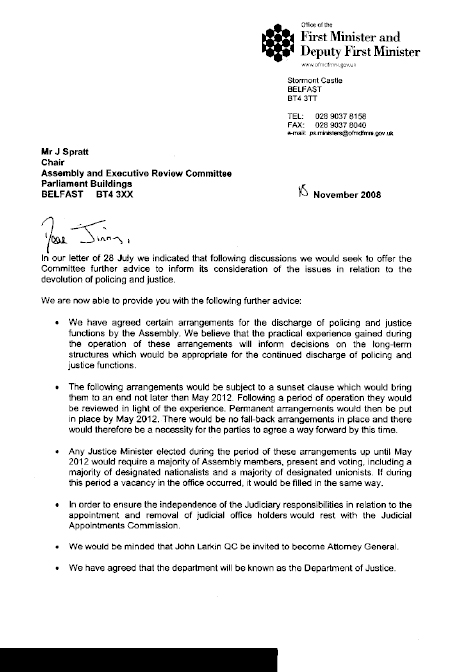
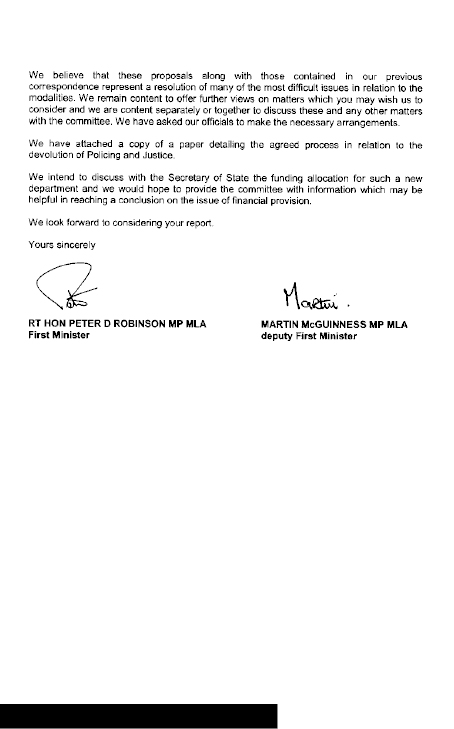
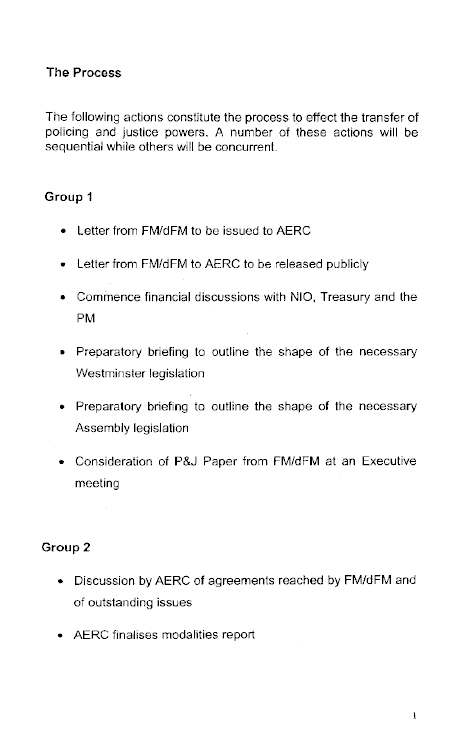
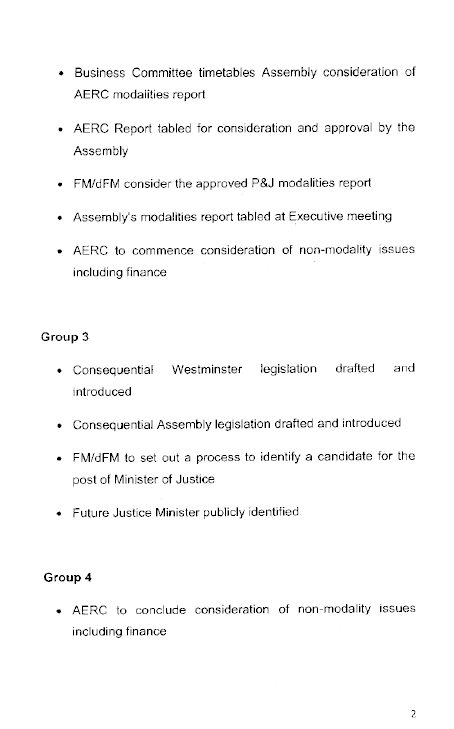
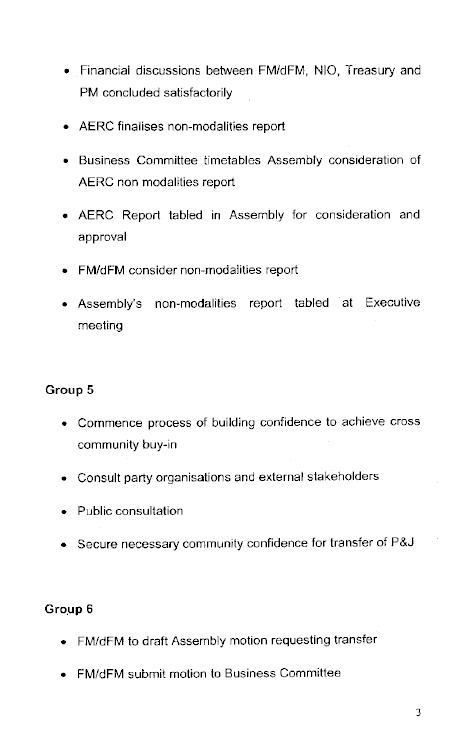
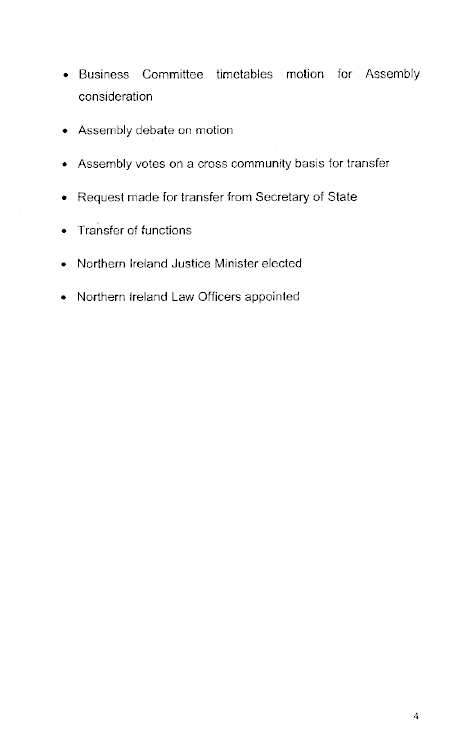
Letter to First Minister and deputy First Minister
15th January 2009
Mr Jimmy Spratt MLA
Chairman of the Assembly and
Executive Review Committee
C/o Room 428
Parliament Buildings
Stormont Estate
Belfast
BT4 3XX
First Minister and deputy First Minister
OFMDFM
Stormont Castle
Belfast
BT4 3TT 15 January 2009
Dear First Minister and deputy First Minister
Devolution of Policing and Justice Matters
The Assembly and Executive Review Committee met on 13 January 2009, to consider, and agree, an initial schedule of meetings at which it will give consideration to the Category Two List of Issues relating to the devolution of policing and justice matters. Three meetings have been arranged as follows:
- 27 January 2009 – Commencement of detailed consideration of the Category Two List of Issues
- 3 February 2009 – Continuation of detailed consideration of the Category Two List of Issues
- 10 February 2009 – Continuation of detailed consideration of the Category Two List of Issues
During the meeting on 13 January 2009, Members agreed that I should write to remind you of the standing invitation which has been extended to you to appear before the Committee and to give you notice to allow you to plan to come before the Committee, during its consideration of the Category Two List of Issues.
You may also be interested to know that Victor Hewitt (Economic Research Institute of Northern Ireland) has been appointed as a Specialist Adviser to the Committee and will provide support to the Committee when it is considering the financial implications of the devolution of policing and justice matters.
I will write to you, again, in due course.
Yours sincerely
Jimmy Spratt
Chairman
Letter to First Minister and deputy First Minister
30 April 2009
Mr Jimmy Spratt MLA
Chairman of the Assembly and
Executive Review Committee
C/o Room 428
Parliament Buildings
Stormont Estate
Belfast
BT4 3XX
First Minister and deputy First Minister
OFMDFM
Stormont Castle
Belfast
BT4 3TT 30 April 2009
Dear First Minister and deputy First Minister
Devolution of Policing and Justice Matters
You are aware, firstly, that the Assembly and Executive Review Committee appointed a Specialist Adviser to assist it in assessing the financial implications of the devolution of a range of policing and justice matters and, secondly, that the Committee called for written submissions, and conducted a series of oral evidence sessions, on this aspect of its work.
At the Committee’s meeting on 28 April 2009, in closed session, the Specialist Adviser gave a presentation to Members on the initial draft of his report on the ‘budgetary pressures’ which had been identified in the evidence which had been submitted. Although the Specialist Adviser has been asked to do some more work on his report, Members agreed, in the meantime, and as a first step, that the initial draft should be considered, promptly, by the 4 political parties represented on the Committee, before there was any further discussion in Committee.
The Committee also agreed that a potential next step might involve a further presentation, by the Specialist Adviser, possibly towards the end of May 2009. In this regard, the Committee considered that you, and the Minister for Finance and Personnel, should be invited to attend that presentation, which would be conducted in closed session.
I would be grateful if you were to consider this invitation and let me know your views.
Yours sincerely
Jimmy Spratt
Chairman
Letter from the
Office of the First Minister and deputy First Minister 1st May 2009
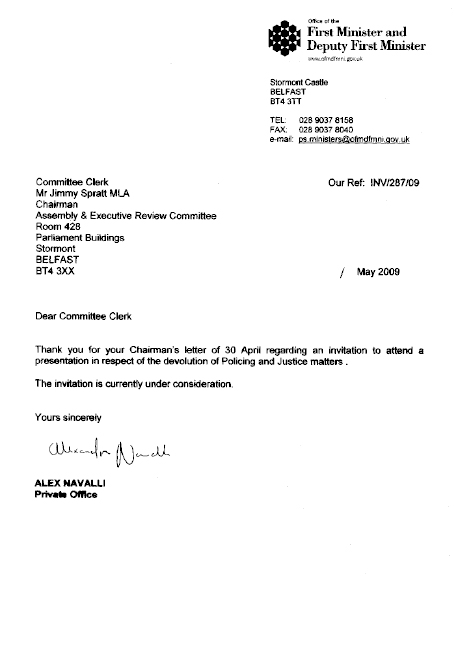
Letter to First Minister and deputy First Minister
13th May 2009
Mr Jimmy Spratt MLA
Chairman of the Assembly and
Executive Review Committee
C/o Room 428
Parliament Buildings
Stormont Estate
Belfast BT4 3XX
First Minister and deputy First Minister
OFMDFM
Stormont Castle
Belfast BT4 3TT
13 May 2009
Dear First Minister and deputy First Minister
Financial Implications of the Devolution if Policing and Justice Matters
I wrote to you recently, and copied my letter to the Minister for Finance and Personnel, to extend an invitation to you all to attend a meeting of the Assembly and Executive Review Committee, in ‘closed session’, and at which the Committee’s Specialist Adviser would present a paper containing an assessment of the financial implications of devolving a range of policing and justice matters.
At the Committee’s meeting yesterday, Members identified 9 June 2009 as the preferred date for the presentation, although I was asked to indicate that, if that proves to be an unsuitable date for you all, then arrangements could be made to hold the meeting on an alternative date, and time, which is more convenient for you. However, if that is the case, I would ask you to bear in mind the Committee’s schedule, as outlined below:
- an initial presentation from the Specialist Adviser on 26 May, exclusively for Members of the Committee;
- no Committee meeting in the week commencing 1 June;
- a Committee visit to Dublin on 10 and 11 June; and
- Committee visits to London and Edinburgh on 16, 17 and 18 June.
You will be aware that the visits to Dublin, London and Edinburgh are related to other aspects of devolution, and which the Committee intends to report to the Assembly on in due course.
I have copied this letter to the Minister for Finance and Personnel and, if you are all interested in my invitation, I would like to suggest it would be helpful if each of your respective Private Offices were consult before contacting the Committee Clerk, Stephen Graham on (028 905 21784) about the detailed arrangements.
Yours sincerely

Jimmy Spratt
Chairman
Letter from First Minister and deputy First Minister
27 May 2009
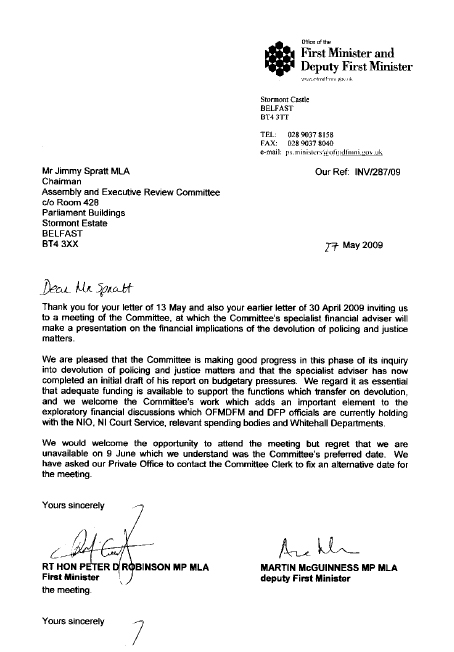
Letter to First Minister and deputy First Minister
12th June 2009
Mr Jimmy Spratt MLA
Chairman to Assembly and
Executive Review Committee
c/o Room 428
Parliament Buildings
Stormont Estate
Belfast
BT4 3XX
12 June 2009
First Minister and deputy First Minister
OFMDFM
Stormont Castle
BELFAST
BT4 3TT
Dear First Minister and deputy First Minister,
DEVOLUTION OF POLICING AND JUSTICE MATTERS
Thank you for your letter of 27 May 2009 which was considered by the Assembly and Executive Review Committee at its meeting on 9 June 2009. Members welcomed your positive response to the invitation to attend a closed session of the Committee, at which the Committee’s Specialist Adviser will give a short presentation on his emerging findings in relation to the financial implications of devolving a range of policing and justice matters, but with a particular emphasis on ‘pressures’. Given our respective diary commitments, arrangements have been made for that meeting to be held in Room 21 at 11.30 hrs on Monday 29 June 2009.
When the Deputy Chairperson and I met with you both on 2 June 2009, to explain the basis for the meeting with the Specialist Adviser, we mentioned the concerns of the Committee about disclosing, fully, the details of his paper to both you, and to the Minister for Finance and Personnel. We did however give you a sense of the headline messages which had been reported to us by Victor Hewitt.
We also explained that, in keeping with the parallel process discussed, and agreed, with the Committee in November 2008, Members were keen to ensure that the meeting would also provide an opportunity for an exchange of views not only on the Specialist Adviser’s analysis of the financial matters, but that you would brief the Committee on your involvement in discussions with the NIO, including the Secretary of State, about the devolution of policing and justice matters, generally, and more specifically on any discussions there may have been with the NIO in relation to the Heywood Report. If time permits, the Committee would also like to hear your views on the role and functions of the Attorney General and how you envisage he will report, and relate, to the Assembly.
The Committee recognises that, in order for the session on 29 June 2009 to be meaningful, it is necessary to provide you, formally, with advance notice of the details of the Specialist Adviser’s emerging findings – Annex A is therefore, referred to you, ‘in confidence’. Equally, Members considered it important that you might reciprocate by letting the Committee have advance sight of a short paper which describes the progress you may have made in your own discussions with the NIO about the devolution of policing and justice matters. It would be helpful, for distribution purposes, if you were to supply such a paper to the Committee Clerk by 25 June 2009.
In keeping with the suggestion you made on 2 June 2009, the Committee has also agreed to supply to, and invite comment, from the Secretary of State on the emerging findings which the Specialist Adviser has conveyed to the Committee. I have written, accordingly, to the Secretary of State, impressing that the information is supplied ‘in confidence’, and asked him to respond, also by 25 June, to allow for his comments to be taken into account during the discussions we plan to have with you, and the Minister for Finance and Personnel, on 29 June 2009.
I have copied this letter, and Annex A, to the Minister for Finance and Personnel. I have also arranged for this letter, without Annex A, to be copied to the Chairperson of the Committee for the Office of the First Minister and deputy First Minister and to the Chairperson of the Finance and Personnel Committee.
I look forward to seeing you, and the Minister for Finance and Personnel, on 29 June.
Yours sincerely

Jimmy Spratt
Chairman
Annex A
Financial Implications of Devolving a Range of Policing and Justice Matters - Emerging Findings
Background
The Assembly and Executive Review Committee (the Committee) appointed a Specialist Adviser (Victor Hewitt, ERINI) to assist with its consideration of the financial implications of devolving a range of policing and justice matters.
During the past few months, the organisations involved in delivering policing and justice services in Northern Ireland made written submissions, and some gave oral evidence, to the Committee. This information has been subject to analysis by the Specialist Adviser and he recently presented a paper, in draft form, to the Committee. His paper concentrates on what are regarded as ‘budgetary pressures’. The Specialist Adviser has emphasised, repeatedly, to the Committee that the figures are generated at a particular point in time and are subject to fluctuation, depending on prevailing circumstances.
At its meeting on 9 June 2009, the Committee took a decision to share details of the ‘emerging findings’ with the Secretary of State, in confidence, and to invite him to comment on them by 25 June 2009 (but without disclosing the ‘draft paper’ in full). Thereafter, on 29 June 2009, in closed session, the Specialist Adviser will make a short presentation to the Committee and the First Minister, the deputy First Minister and the Minister for Finance and Personnel, based on a further draft of his paper, which is still under development.
The ‘emerging findings’ as reflected in this document, have also been provided to the First Minister, the deputy First Minister and the Minister for Finance and Personnel, again in confidence, for the purposes of the discussion planned for 29 June 2009.
Emerging Findings
Information obtained, originally, by way of written and oral evidence, pointed to pressures in CSR07 period, and beyond. Furthermore, and following the oral evidence sessions, the policing and justice organisations were invited to ‘refresh’ the information which they had supplied, previously. This revealed
a number of new pressures, some of which are expected to be met from existing allocations, and others which had not, previously, been quantified. It was also apparent that a number of organisations had re-profiled some pressures into post CSR07 years, especially projects with capital spending implications which, individually, and collectively, are considered to be ‘substantial’.
Based on indications from the Secretary of State, costs associated with ‘Public Inquiries’ are excluded from the ‘pressures’ identified, below.
Aside from the Policing Board, the effects of the ‘equal pay claim’ have not been factored into the ‘pressures’.
The Prison Service recurrent pressures relate to the post CSR07 period and are mixed, in the sense that some are assumed to be capable of being absorbed, whereas others, deal with protection, prisoner growth and inflation and are of the order of £18m.
The Prison Service capital pressures appear to relate to the post CSR07 period. The most up to date assessment of the quantum is described as ‘significant’ and could be of the order of £200m/£250m.
The Probation Board recurrent pressures arise in CSR07 (£2.7m) and beyond (£15.9m) and relate to costs associated with implementing measures arising from the Criminal Justice Order. The Probation Board capital pressures relate to the CSR07 period and amount to £1.3m.
The Legal Services Commission recurrent pressures relate to the CSR07 period (£60m) and beyond (£30m recurring per annum), based on historic trends and a £0.75m capital pressure beyond the CSR period.
The Court Service recurrent pressures in the CSR07 period, and beyond, are £10.4m and £14m respectively. The Court Service capital pressures – which have been re-profiled from earlier evidence - relate to the CSR07 period, and beyond, and are £15m and £85m respectively.
The Public Prosecution Service recurrent pressures amount to £4.3m in the CSR07 period and £0.75 beyond that period. No capital pressures have been identified.
The Compensation Agency expects to absorb any recurrent and capital pressures in the CSR07 period, and beyond.
The Forensic Science Service expects to absorb any recurrent pressures in the CSR07 period, and beyond but a capital pressure of £27m for a new laboratory has been identified in the post CSR07 period.
The Policing Board recurrent pressures in the CSR07 period are £0.45m and £0.075m beyond that period and relate to equal pay costs. No capital pressures have been identified.
The PSNI recurrent pressures in the CSR07 period, and beyond, stand at £421.3m and £160m respectively and relate to Hearing Loss, and Pay Claims. Other acknowledged recurrent pressures in the CSR period are recorded as £20m for back-dated pension commutation and an additional £28.7m for ‘dissident costs’. The PSNI capital pressures in the CSR07 period, and beyond, are £30m and £50m respectively and relate to the new Training College.
The PRTT recurrent and capital pressures are assessed at £0.5m in the CSR period, and beyond. However, if relocation from Maryfield arises, an estimated capital pressure of £5m/£8.5m is anticipated.
The NIO HQ recurrent pressures are £17m in the CSR07 period and relate to ‘efficiency savings’. No related sum has been identified in the post CSR period.
The Police Ombudsman does not anticipate any recurrent, or capital, pressures.
The Parole Commissioner anticipates some, un-quantified, recurrent and capital pressures in CSR07, and beyond.
The Prisoner Ombudsman anticipates ‘de minimis’ recurrent, and capital pressures in CSR07, and beyond.
The George Cross Foundation capital pressures – which have been re-profiled from earlier evidence – relate to the CSR period, and beyond, and amount to £3m and £2.5m respectively. No recurrent pressures are identified.
Letter from First Minister and deputy First Minister
26 June 2009
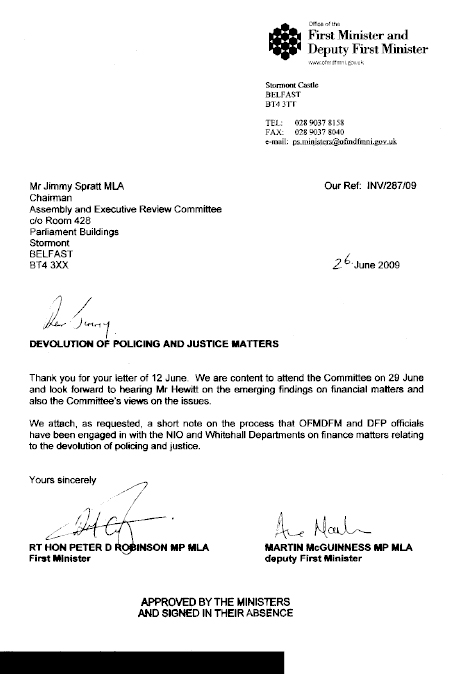
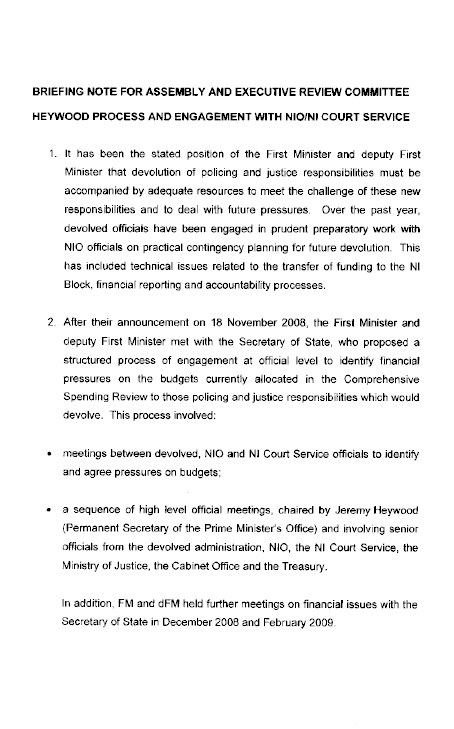
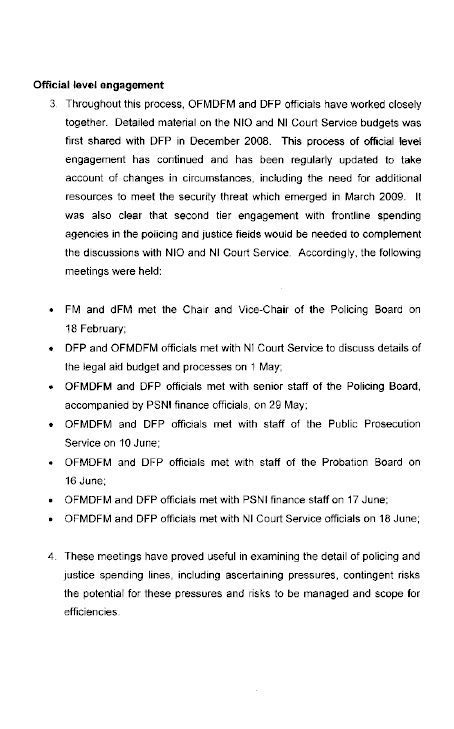
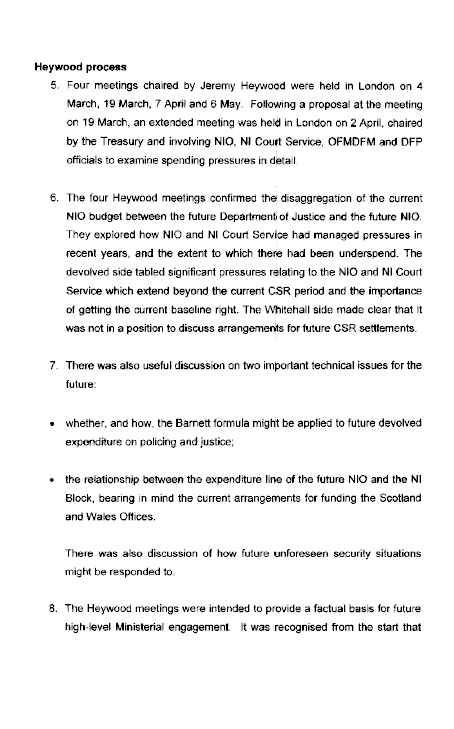

Letter to First Minister and deputy First Minister
7th July 2009
Mr Jimmy Spratt MLA
Chairman of the Assembly and Executive Review Committee
C/o Room 428
Parliament Buildings
Stormont Estate
Belfast
BT4 3XX
First Minister and deputy First Minister
OFMDFM
Stormont Castle
Belfast
BT4 3TT
07 July 2009
Dear First Minister and deputy First Minister
FINANCIAL IMPLICATIONS OF THE DEVOLUTION OF POLICING AND JUSTICE MATTERS
On behalf of the Committee, I would like to thank you for your attendance at the meeting of the Assembly and Executive Review Committee on 29 June 2009. I hope that you will agree that it was a useful and informative exchange of information although it was unfortunate that the Minister for Finance and Personnel was unable to attend.
Members welcome your commitment to continue to engage with the Committee and to provide us with regular reports on political developments relating to the devolution of Policing and Justice matters.
The Committee agreed that the Specialist Adviser would contact officials in your office and in the Department of Finance and Personnel to provide clarity on the figures contained in his paper with a view to arriving at an agreed set of figures for the purposes of negotiations with the NIO and Treasury. It would be helpful if your office, and the office of the Finance and Personnel Minister were to provide contact details of the relevant officials to Stephen Graham, the Committee Clerk, so that he can advise Victor Hewitt accordingly.
I have copied this letter to the Minister for Finance and Personnel and to the Chairpersons of the OFMDFM and Finance and Personnel Committees as well as to Victor Hewitt.
Yours sincerely

Jimmy Spratt
Chairman
Letter from First Minister and deputy First Minister to the Chairperson of the Committee for OFMDFM
27 May 2009
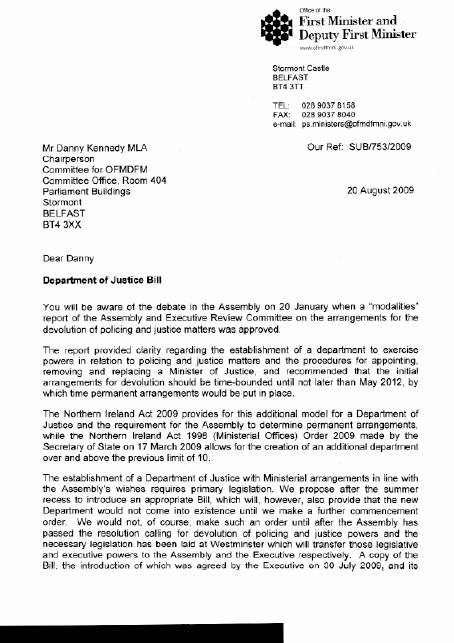
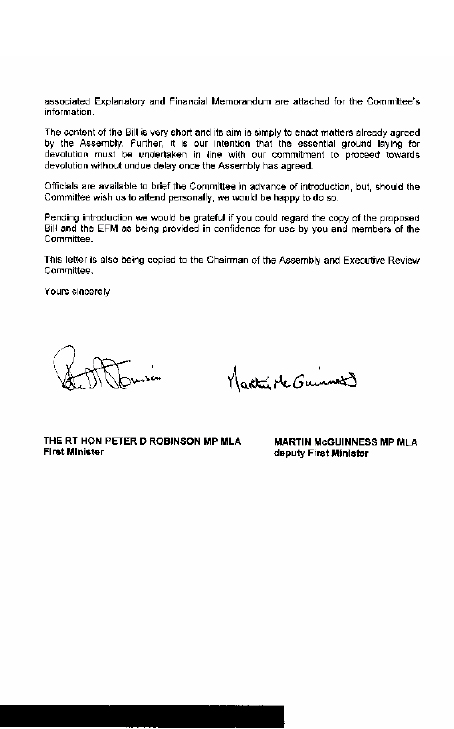

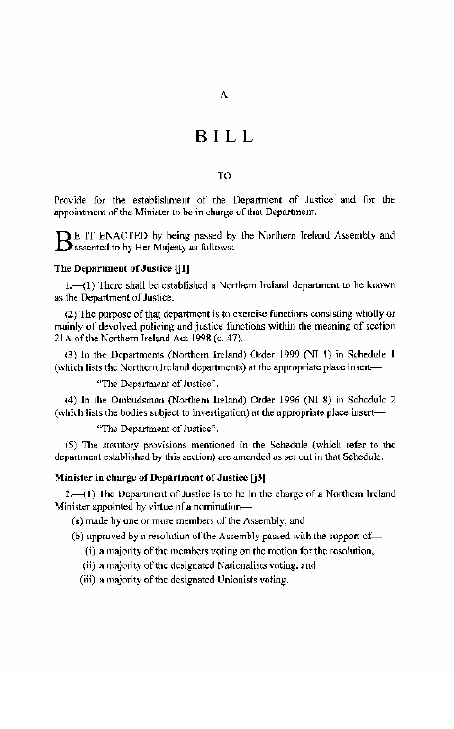

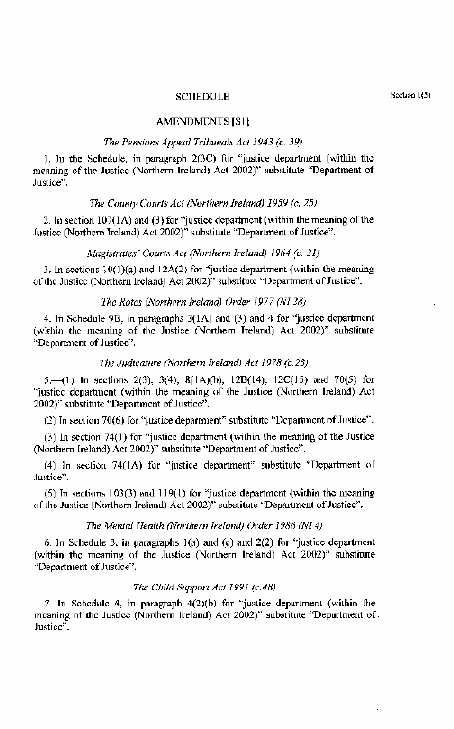
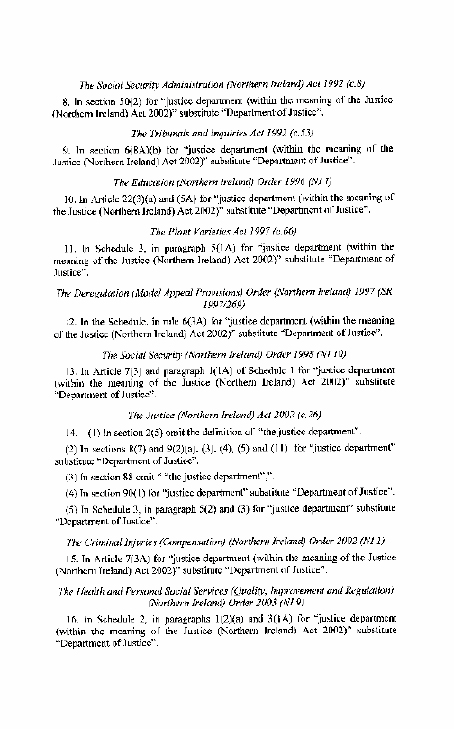
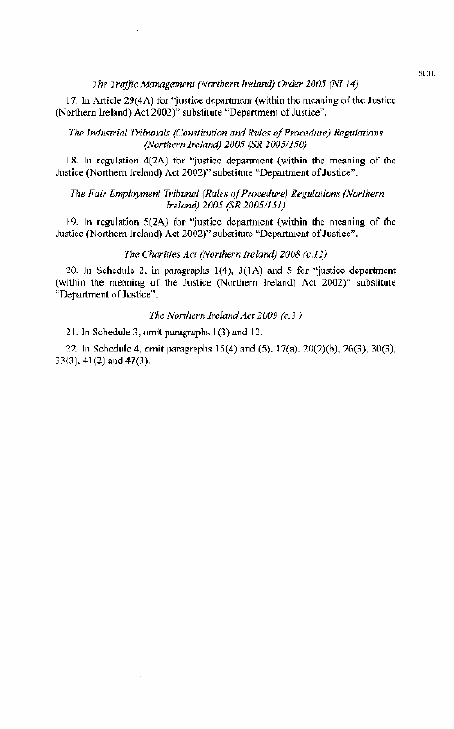
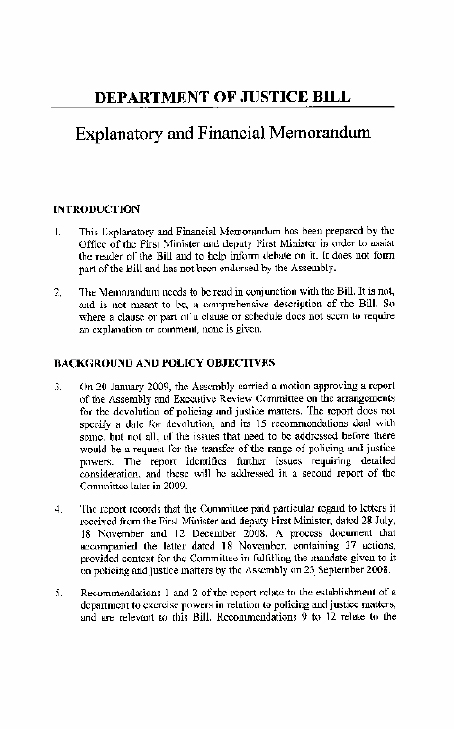
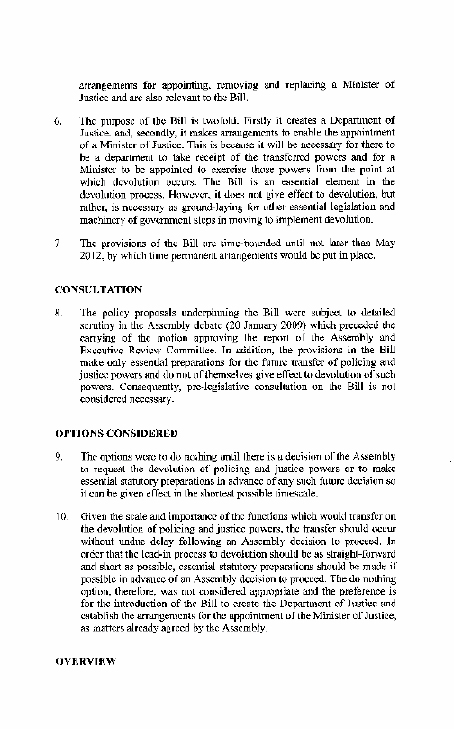
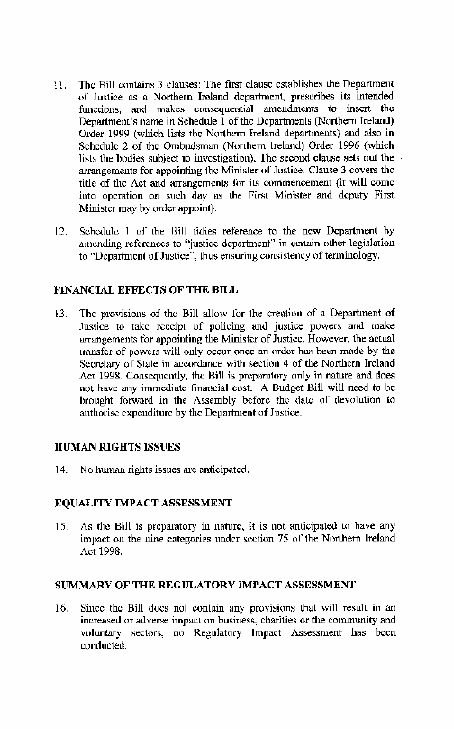

Letter to First Minister and deputy First Minister
17 September 2009
Mr Jimmy Spratt
Chairperson of the Assembly and
Executive Review Committee
c/o Room 428
Northern Ireland Assembly
Parliament Buildings
Stormont Estate
Belfast
BT4 3XX
17 September 2009
Dear First Minister and deputy First Minister,
Devolution of Policing and Justice Matters
When the Assembly and Executive Review Committee met earlier this week, it resumed its consideration of the financial implications associated with the devolution of policing and justice powers and other associated matters which feature on its ‘Category Two List of Issues’. I was asked to write to you on two matters.
Attorney General
During the course of the Committee’s meeting, mention was made of a report which, apparently, the Attorney General had been asked to prepare, and submit to you. Given the Committee’s commitment to report on issues relating to the Attorney General, and other matters, to the Assembly as part of its second report on the arrangements for the devolution of policing and justice matters, Members would be interested in seeing the Attorney General’s report, and hearing your views on it.
Financial Negotiations
Members are due to hear a presentation from the Specialist Adviser on 29 September when Victor Hewitt will update the Committee on his assessment of the revised financial pressures for the transfer of policing and justice functions in the context of reconciliation work he has carried out in conjunction with DFP officials. With that in mind, the Committee is interested in receiving an update from you on your negotiations to secure sufficient funding for the devolution of policing and justice powers.
A reply in advance of the Committee’s meeting on 29 September 2009 would be most helpful.
I have copied this letter to the Minister for Finance and Personnel, to the Chairperson of the Committee for the Office of the first Minister and the Deputy First Minister and the Chairperson of the Committee for Finance and Personnel.
Yours sincerely
Jimmy Spratt
Chairman
Letter from First Minister and deputy First Minister
29 September 2009
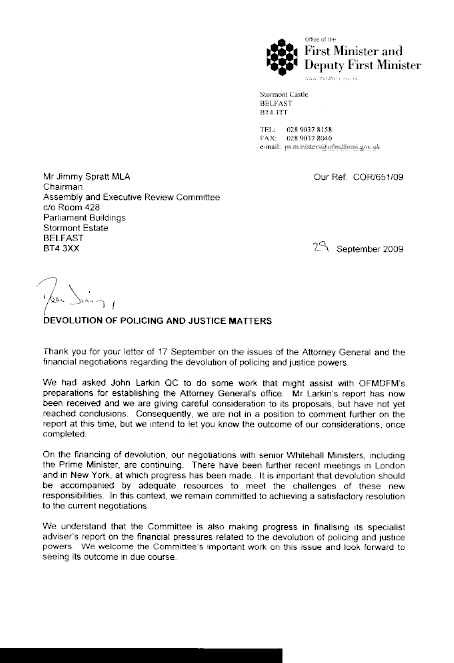

Letter to First Minister and deputy First Minister
7 October 2009
Mr Jimmy Spratt
Chairman
Assembly&Executive Review Committee
c/o Room 428
Parliament Buildings
Stormont Estate
Belfast
BT4 3XX
7 October 2009
Dear First Minister and deputy First Minister,
Devolution of Policing and Justice Matters
When the Assembly and Executive Review Committee met yesterday, it considered outstanding matters on the Category Two List of Issues relating to the devolution of policing and justice powers. Members recalled your interim response of 29 September 2009, to my letter of 17 September 2009, and considered that, given your commitment to appear before the Committee, it might be opportune for you to do so in the next few weeks.
As well as receiving an update from you on the financial negotiations you have been conducting with the Prime Minister, the Committee is interested to hear what you might have to say about the role of the Attorney General, especially since you have now had some time to consider the report by John Larkin, QC. Furthermore, the Committee would welcome the chance to engage with you on the other matters it is addressing in its consideration of the Category Two List of Issues in order that it might make further progress and meet its commitment to present a second report to the Assembly before the end of 2009.
The Committee has two further meetings scheduled before Halloween Recess – on 13 and 20 October 2009, but if neither of these dates are convenient, I am sure a mutually suitable and early alternative can be found. Your views on whether, or not, the meeting should be conducted in public session would be welcome. Members would also find it helpful if you were to provide a paper to the Committee in advance of, or on the day of, the meeting. Perhaps your office would contact the Committee Clerk, as a matter of urgency, so that the necessary arrangements can be made.
Yours sincerely

Jimmy Spratt
Chairman
Letter to First Minister and deputy First Minister
13 October 2009
Mr Jimmy Spratt
Chairman
Assembly&Executive Review Committee
c/o Room 428
Parliament Buildings
Stormont Estate
Belfast
BT4 3XX
13 October 2009
Dear First Minister and deputy First Minister,
Devolution Of Policing And Justice Matters
When the Assembly and Executive Review Committee met today, reference was made to a letter received by you, yesterday, from the Prime Minister, about funding for the devolution of policing and justice matters. The Committee agreed that, given its remit, I should write to you to request that the information shared to you by the Prime Minister be released to the Committee without delay.
I should also be grateful if your officials were to indicate to the Committee Clerk, as soon as possible, when you will be available to appear before the Committee as requested in my letter of 7 October 2009 to you.
Yours sincerely

Jimmy Spratt
Chairman
Letter to First Minister and deputy First Minister
20 October 2009
Mr Jimmy Spratt
Chairman
Assembly&Executive Review Committee
c/o Room 428
Parliament Buildings
Stormont Estate
Belfast
BT4 3XX
20 October 2009
Dear First Minister and deputy First Minister,
Devolution of Policing and Justice Matters
When the Assembly and Executive Review Committee met today, it resumed its consideration of the financial implications associated with the devolution of policing and justice powers and other associated matters which feature on its ‘Category Two List of Issues’. As part of these considerations the Committee considered a letter received on 13 October 2009, from the Secretary of State, and I was asked to forward it to you for information.
Yours sincerely

Jimmy Spratt
Chairman
Letter from First Minister and deputy First Minister
2 November 2009
_fmt.jpeg)
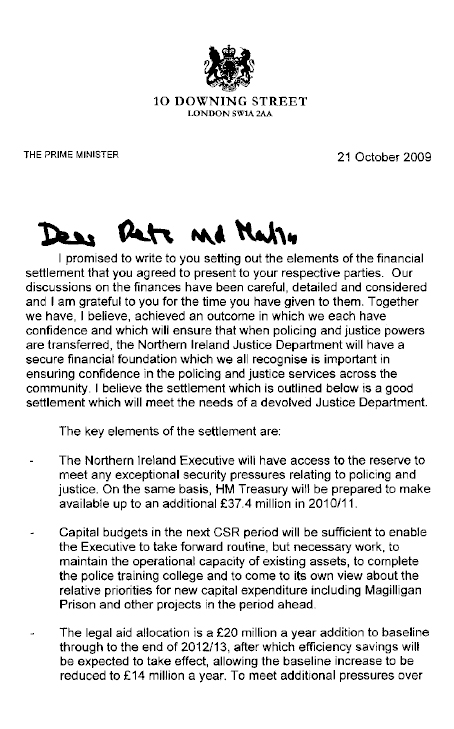
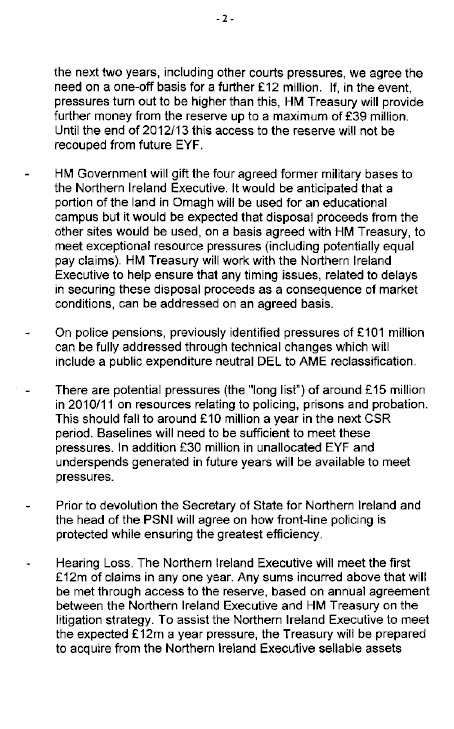

Letter to First Minister and deputy First Minister
3 November 2009
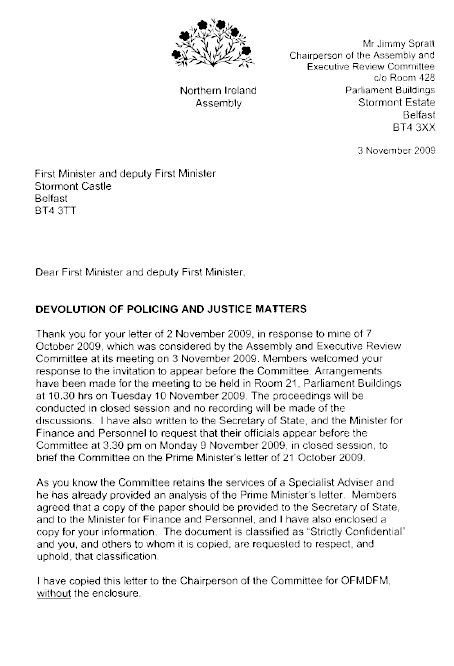

Letter to First Minister and deputy First Minister
9 November 2009
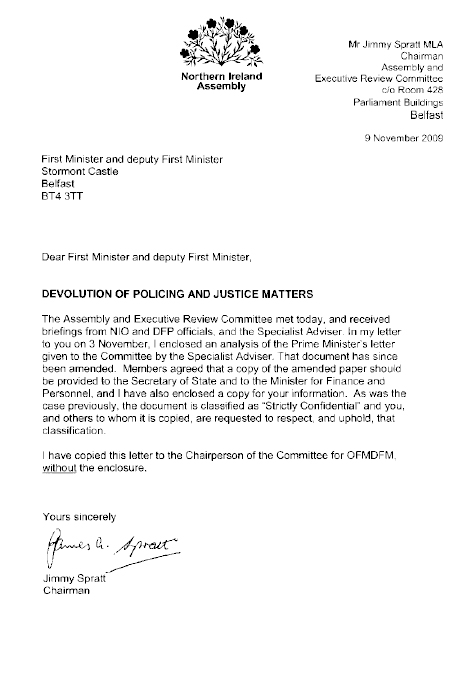
Letter to First Minister and deputy First Minister
17 November 2009
Mr Jimmy Spratt MLA
Chairman
Assembly and
Executive Review Committee
c/o Room 428
Parliament Buildings
Stormont Estate
Belfast
17 November 2009
First Minister and deputy First Minister
OFMDFM
Stormont Castle
Belfast
BT4 3TT
Dear First Minister and deputy First Minister,
Devolution of Policing and Justice Matters
The Assembly and Executive Review Committee met, today, to continue its discussions on the Category Two List of Issues.
Based on information you provided during your appearance before the Committee, on 10 November 2009, in closed session, when you confirmed you were in possession of all the various the Memorandums of Understanding, Protocols and Concordats which will apply at the point of devolution, I plan to write to the Secretary of State to ask why, contrary to an earlier commitment contained in his letter of 31 May 2009 (enclosed), he has not provided these documents to the Committee. However, and before doing so, I undertook to seek clarity from you that you are content for me to disclose that the Committee became aware that you had these documents as a result of your disclosure during the closed session.
I would welcome your reply in time for it to be considered by the Committee when it meets next, on 24 November 2009 at 11.00.
Yours sincerely

Jimmy Spratt
Chairman
Letter from the
Office of the First Minister and deputy First Minister
18 November 2009
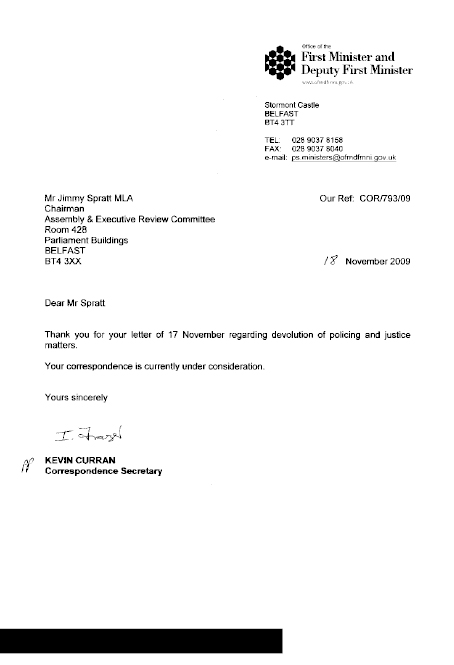
Letter to First Minister and deputy First Minister
19 November 2009
Mr Jimmy Spratt MLA
Chairman
Assembly and
Executive Review Committee
c/o Room 428
Parliament Buildings
Stormont Estate
Belfast
19 November 2009
First Minister and deputy First Minister
OFMDFM
Stormont Castle
Belfast
BT4 3TT
Dear First Minister and deputy First Minister,
Devolution of Policing and Justice Matters
The Assembly and Executive Review Committee met on 17 November 2009, and had further discussions on the Category Two List of Issues. The role of the Attorney General featured as part of these discussions and Members agreed that I should write to you and ask if you were yet in a position to share, with the Committee, the paper submitted to you, sometime ago, by John Larkin QC.
Yours sincerely
Jimmy Spratt
Chairman
Letter from the
Office of the First Minister and deputy First Minister
24 November 2009
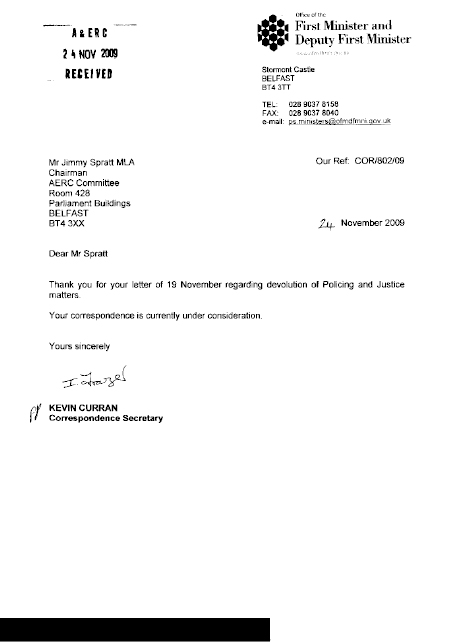
Letter to First Minister and deputy First Minister
1 December 2009
Mr Jimmy Spratt MLA
Chairman
Assembly and
Executive Review Committee
c/o Room 428
Parliament Buildings
Stormont Estate
Belfast
1 December 2009
First Minister and deputy First Minister
OFMDFM
Stormont Castle
Belfast
BT4 3TT
Dear First Minister and deputy First Minister,
Devolution of Policing and Justice Matters
The Assembly and Executive Review Committee met today and had further discussions on some of the Category Two List of Issues. Whilst the Committee is keen to make progress on, for example, the role of the Attorney General, and to include suitable recommendations in its Report, Members consider that, in order to do so, they might benefit from discussions with you and with John Larkin QC, not only on the paper he prepared, and presented to you, but also on the wider issue of the role of the Attorney General and his/her relationship with all the relevant parts of the justice sector, the Justice Minister, the Justice Committee and the NI Assembly. Furthermore, there is a requirement to develop suitable arrangements to allow the Attorney General to report to the Assembly.
You will also be aware that I wrote to John Larkin QC, last month, to invite him to appear before the Committee. At its meeting today, the Committee agreed that the Committee Clerk should make a further approach to Mr Larkin to encourage him to accept that invitation. In that regard, and when you appeared before the Committee on 10 November 2009, you confirmed you had received, and were considering, the paper he submitted, and you went on to give an undertaking to come before the Committee, again, to discuss the Category Two List of Issues and, specifically, the role of the Attorney General. Members are interested to know when you intend to fulfill that commitment, not least because they are aware that officials, in a recent briefing to the Committee for the Office of the First Minister and the Deputy First Minister on the December Monitoring Round, referred to the provision of monies to establish an Attorney General’s office.
The Committee takes the view that it is both proper, and appropriate, to have early discussions with you, and with Mr Larkin, about all the arrangements which might be necessary in relation to the role, relationships and office of the Attorney General and I would be grateful if you were to agree to appear before the Committee at the earliest opportunity. In the meantime, it would be helpful if you were to provide the Committee with a copy of Mr Larkin’s paper.
Yours sincerely

Jimmy Spratt
Chairman
Letter from First Minister and deputy First Minister
2 December 2009
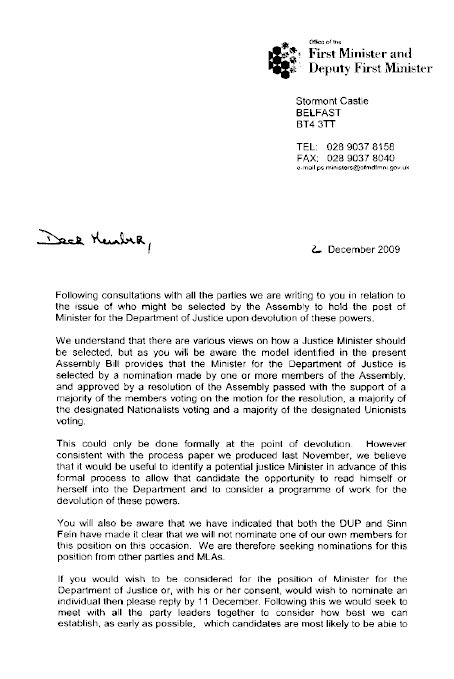
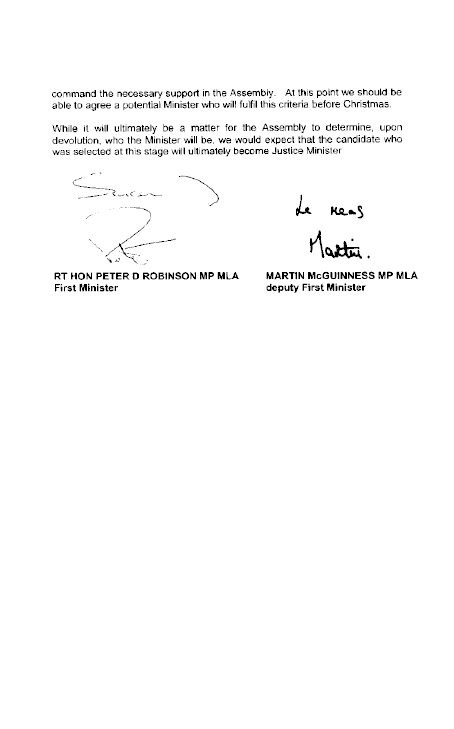
Letter to First Minister and deputy First Minister
9 February 2010
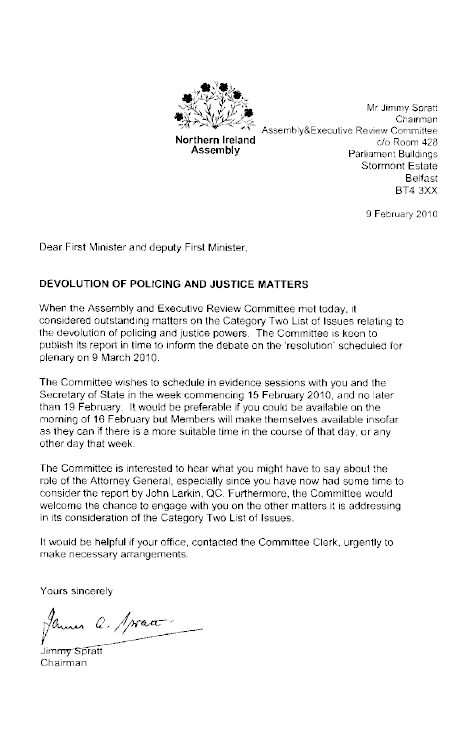
Letter from the
Office of the First Minister and deputy First Minister
10 February 2010
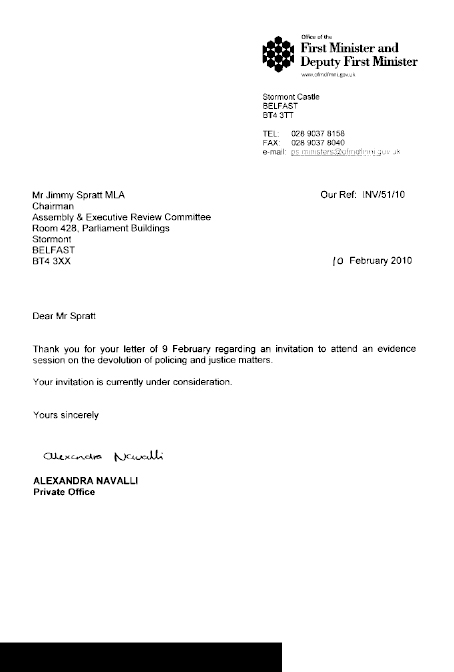
Letter to First Minister and deputy First Minister
18 February 2010
Mr Jimmy Spratt
Chairman
Assembly&Executive Review Committee
c/o Room 428
Parliament Buildings
Stormont Estate
Belfast
BT4 3XX
18 February 2010
Dear First Minister and deputy First Minister,
Devolution of Policing and Justice Matters
On behalf of the Assembly and Executive Review Committee, I would like to thank you for giving evidence to the Committee this afternoon regarding the Category Two List of Issues in relation to the Devolution of Policing and Justice Matters.
During the meeting the deputy First Minister indicated that it might be two weeks before the paper by John Larkin QC, and the OFMDFM response to that paper would be made available to the Committee. The Committee’s timeline for agreeing the terms of the report and ordering it to be printed in time to inform the Resolution debate on 9 March 2010 means that receipt of the paper, and your response to it, in the time frame you envisage, would mean that it would not be possible for the Committee to consider both documents or include any comment on them in the report. The Committee has considered publishing the paper by John Larkin QC and your response to it, as an addendum to its report but this does not appear to be a viable option. However the Committee considers a different solution might be possible; in that your office might wish to publish the document, along with your response to it, and the Committee’s report would simply record the fact that the Committee did not have any opportunity to see the paper or your response to it. Perhaps you would reply by close of play on Monday 22 February 2010 so that the Committee could consider the matter further when it meets again on Tuesday morning 23 February 2010.
Yours sincerely

Jimmy Spratt
Chairman
Letter from the
Office of the First Minister and deputy First Minister
22 February 2010
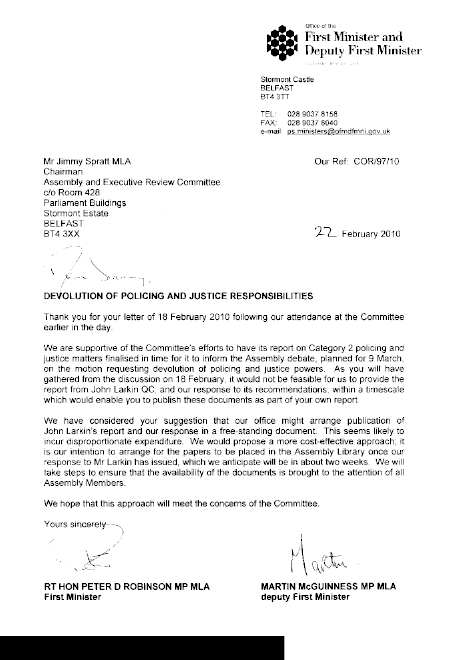
Letter to First Minister and deputy First Minister
23 February 2010
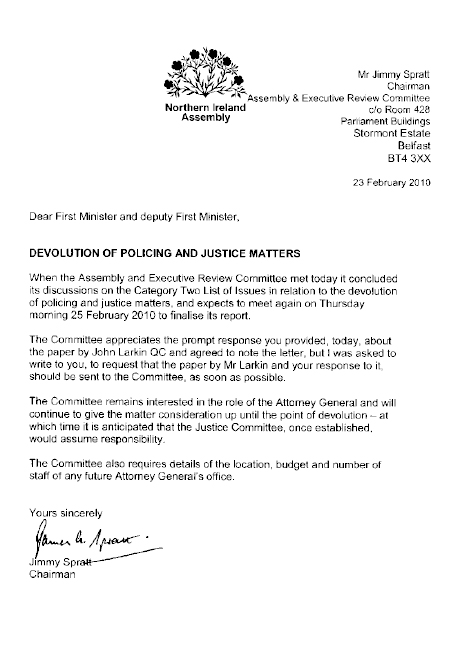
Letter from the
Office of the First Minister and deputy First Minister
24 February 2010
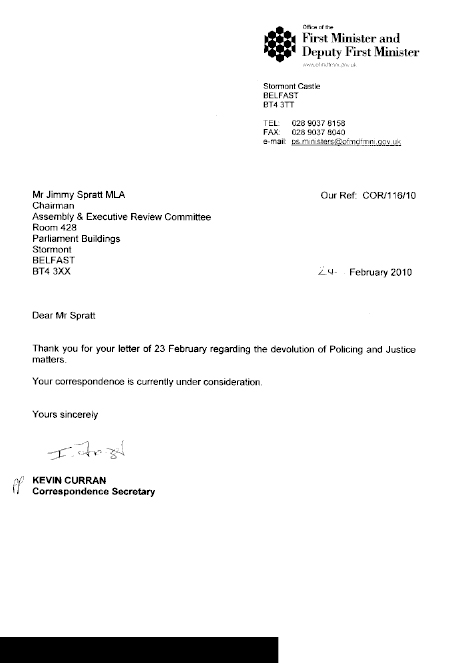
Appendix 6
Correspondence to,
and from, NIO
Appendix 6
Correspondence to and from NIO
- Letter from Secretary of State (for Northern Ireland) – 14 December 2008
- Letter to the Secretary of State (for Northern Ireland) – 8 January 2009
- Letter to Secretary of State (for Northern Ireland) – 12 January 2009
- Letter to the Secretary of State (for Northern Ireland) – 20 January 2009
- Letter from the Secretary of State’s Private Office – 22 January 2009
- Letter from the Secretary of State (for Northern Ireland) – 26 January 2009
- Letter to the Secretary of State (for Northern Ireland) – 28 January 2009
- Letter from the Secretary of State (for Northern Ireland) – 4 February 2009
- Letter to the Secretary of State (for Northern Ireland) – 10 February 2009
- Letter from the Secretary of State (for Northern Ireland) – 12 February 2009
- Letter from the Secretary of State’s Private Office – 19 February 2009
- Letter from the Secretary of State (for Northern Ireland) – 23 February 2009
- Letter to the Secretary of State (for Northern Ireland) – 27 April 2009
- Letter to the Secretary of State (for Northern Ireland) – 7 May 2009
- Letter from the Secretary of State (for Northern Ireland) – 8 May 2009
- Letter to the Secretary of State (for Northern Ireland) – 12 May 2009
- Letter to the Secretary of State (for Northern Ireland) – 14 May 2009
- Letter from the Secretary of State (for Northern Ireland) – 19 May 2009
- Letter from the Secretary of State (for Northern Ireland) – 31 May 2009
- Letter to the Secretary of State (for Northern Ireland) – 12 June 2009
- Letter to the Secretary of State (for Northern Ireland) – 16 June 2009
- Letter from the Secretary of State (for Northern Ireland) – 20 June 2009
- Letter from the Secretary of State (for Northern Ireland) – 22 June 2009
- Letter to the Secretary of State (for Northern Ireland) – 17 September 2009
- Letter to the Secretary of State (for Northern Ireland) – 7 October 2009
- Letter from the Secretary of State (for Northern Ireland) – 12 October 2009
- Letter from the Secretary of State (for Northern Ireland) – 26 October 2009
- Letter to the Secretary of State (for Northern Ireland) – 3 November 2009
- Letter to the Secretary of State (for Northern Ireland) – 5 November 2009
- Letter to the Secretary of State (for Northern Ireland) – 9 November 2009
- Letter from the Secretary of State (for Northern Ireland) – 12 November 2009
- Letter to the Secretary of State (for Northern Ireland) – 19 November 2009
- Letter to the Secretary of State (for Northern Ireland) – 19 November 2009
- Letter from the Secretary of State (for Northern Ireland) – 26 November 2009
- Letter from NIO – 8 December 2009
- Letter from NIO – 10 December 2009
- Letter from NIO – 20 December 2009
- Letter from NIO – 11 January 2010
- Letter to Secretary of State – 19 January 2010
- Letter to Secretary of State (for Northern Ireland) – 9 February 2010
- Letter from NIO – 15 February 2010
- Letter to Secretary of State (for Northern Ireland) – 18 February 2010
- Letter from NIO – 19 February 2010
- Letter to Secretary of State (for Northern Ireland) – 23 February 2010
- Letter from Secretary of State (for Northern Ireland) – 24 February 2010
Letter from Secretary of State
14 December 2008
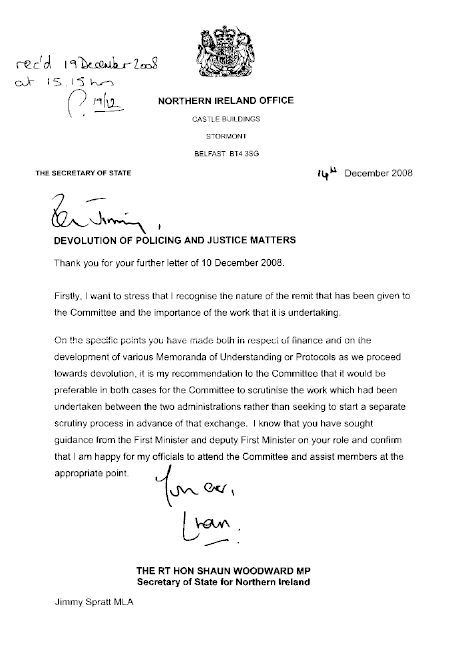
Letter to Secretary of State
8 January 2009
_fmt.jpeg) Mr Jimmy Spratt MLA
Mr Jimmy Spratt MLA
Chairman of the Assembly and
Executive Review Committee
C/o Room 428
Parliament Buildings
Stormont Estate
Belfast
BT4 3XX
Rt. Hon. Shaun Woodward, MP
Secretary of State for Northern Ireland
Block B
Castle Buildings
Stormont Estate
BELFAST
BT4 3SG 8 January 2009
Dear Secretary of State
Devolution of Policing and Justice Matters
Thank you for your letter of 14 December 2008, which I received on 19 December. At its meeting on 6 January 2009, Members of the Assembly and Executive Review Committee noted your response and welcomed your views on NIO officials assisting the Committee in its deliberations.
At the meeting, Members requested that I would write to you to re-iterate that the Committee had no desire, whatsoever, to create a ‘parallel process on finance’, as outlined in my letter of 10 December 2008.
The Committee intends to begin its consideration of the Category Two List of Issues on 13 January, at which point it will write to you and the other bodies associated with policing and justice.
I look forward to hearing from you in due course.
Yours sincerely

Jimmy Spratt
Chairman
Letter to Secretary of State
12 January 2009
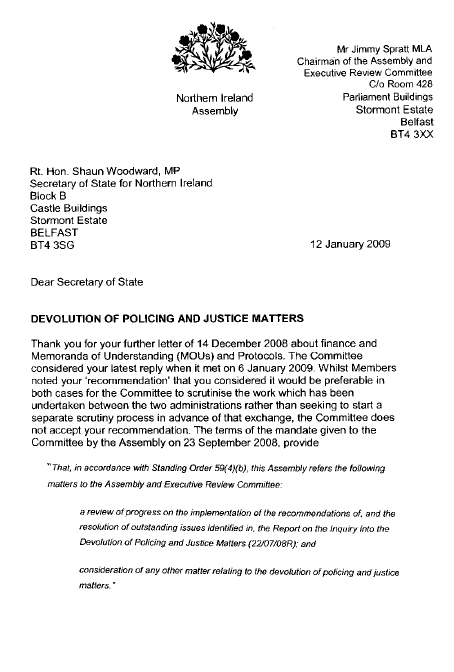
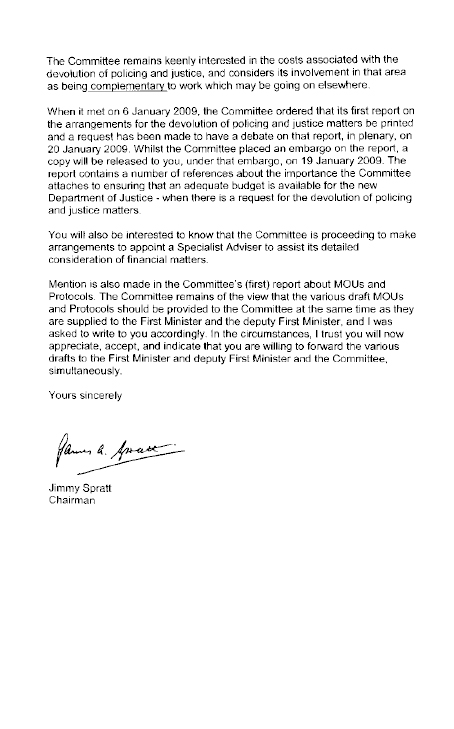
Letter to Secretary of State
20 January 2009
_fmt1.jpeg) Mr Jimmy Spratt MLA
Mr Jimmy Spratt MLA
Chairman of the Assembly and
Executive Review Committee
C/o Room 428
Parliament Buildings
Stormont Estate
Belfast
BT4 3XX
Rt. Hon. Shaun Woodward, MP
Secretary of State for Northern Ireland
Block B
Castle Buildings
Stormont Estate
BELFAST
BT4 3SG
20 January 2009
Dear Secretary of State
As you know, the Assembly and Executive Review Committee of the Northern Ireland Assembly is giving further consideration, presently, to a range of issues relating to the devolution of policing and justice matters.
Whilst all of the issues are considered to be for ‘political resolution’, the Committee has decided to invite views from selected individuals, bodies and organisations, on the financial implications relating to the devolution of policing and justice matters. A list of those to whom this letter has been issued is attached at Appendix 1.
I am writing to ask you to provide a full and complete response to the four questions listed below insofar as it relates to the ‘headquarters’ functions of the NIO.
Questions
Do you consider that the budgetary estimates provided by your organisation, (copy attached), are adequate, and, if not, why not?
What significant, additional, requirements do you envisage, in future years, and could any of these be dealt with through an adjustment to your organisation’s existing plans/priorities?
In the present Comprehensive Spending Review, please provide details of any unsuccessful bids and how you expect to deal with these in the future.
Can you please provide, for each main spending area, the breakdown between Resource and Capital DEL, Annually Managed Expenditure and administration costs for each of the years 2005/06 to 2010/11, that is the outturns for the three years prior to Spending Review 2007 and the plans for the three years of the Review?
The Committee considers that your response will inform its subsequent deliberations.
The Committee invites you to make a written submission on these issues. The deadline for receipt of written submissions is 6 February 2009 and should be made to:
The Committee Clerk, Mr Stephen J Graham, Room 428, Parliament Buildings,
Stormont, BT4 3XX.
Or alternatively by e-mail to
committee.assembly&executivereview@niassembly.gov.uk
Information regarding the Committee can be obtained from the Assembly’s website -
http://archive.niassembly.gov.uk/assem_exec/2007mandate/assem_exec.htm
If you have any queries, please contact the Committee Clerk, Stephen Graham,
on 028 9052 1784.
Yours sincerely
Jimmy Spratt
Chairman
Letter from Secretary of State
22 January 2009
|
Mr Jimmy Spratt MLA |
|
|
Dear Mr Spratt MLA,
This is to acknowledge receipt of your letter dated 20/01/2009 to the Secretary of State for Northern Ireland regarding Devolution of Policing and Justice Matters.
A reply will be forwarded to you as soon as possible.
Yours sincerely
NICHOLA CROWLEY
Secretary of State’s Private Office
Letter from Secretary of State
26 January 2009
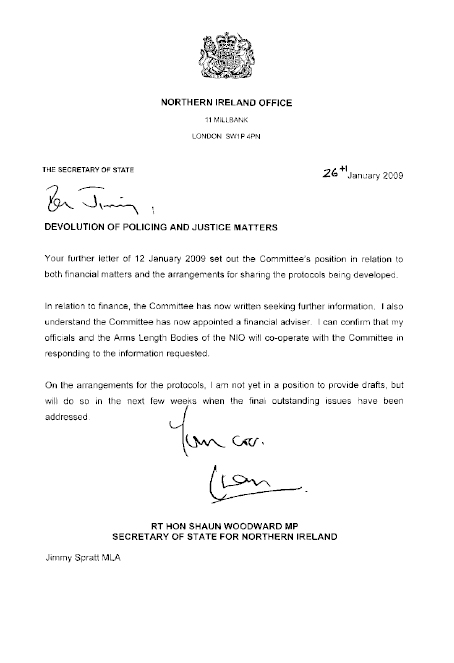
Letter to Secretary of State
28 January 2009
Mr Jimmy Spratt MLA
Chairman of the Assembly and Executive Review Committee
C/o Room 428
Northern Ireland Assembly
Parliament Buildings
Stormont Estate
Belfast
BT4 3XX
Rt. Hon. Shaun Woodward, MP
Secretary of State for Northern Ireland
Block B
Castle Buildings
Stormont Estate
Belfast
BT4 3SG
28 January 2009
Dear Secretary of State
DEVOLUTION OF POLICING AND JUSTICE MATTERS
Further to my letter of 20 January 2009, I am writing to let you know that, at the meeting of the Assembly and Executive Review Committee on 27 January 2009, the Committee commenced its consideration of the Category Two List of Issues relating to the arrangements for the devolution of policing and justice matters.
MEMORANDA OF UNDERSTANDING AND PROTOCOLS
Amongst the items discussed were the various memoranda of understanding and protocols, which the Committee wishes to study. I can confirm that the Committee wishes to see these, as a matter of some urgency. However, and in the meantime, I would be grateful to receive from you, a list of memoranda of understanding and protocols, their legal, or other, status, and whether, or not, they ‘fall’ at the point of devolution. It would also assist the Committee if you were to indicate the extent to which each memoranda of understanding or protocol has been re-drafted in anticipation of devolution of a range of policing and justice matters.
The Committee wishes to receive this information in advance of your officials appearing before the Committee in mid, to late, February, on this issue.
ASHDOWN REPORT ON PARADING
I also want to let you know that I have written to Lord Ashdown, to ask him to indicate when he plans to publish a final version of his report on parading. The Committee considers that any proposals in that report might have financial implications and Members wish to take that into account in their consideration of the wider assessment of the budget for policing and justice, generally.
I have also written to the Chief Constable of the PSNI, to ask him to provide details of the costs associated with ‘policing’ parading over the last five years.
I look forward to hearing from you in due course.
Yours sincerely
Jimmy Spratt
Chairman
Letter from Secretary of State
4 February 2009
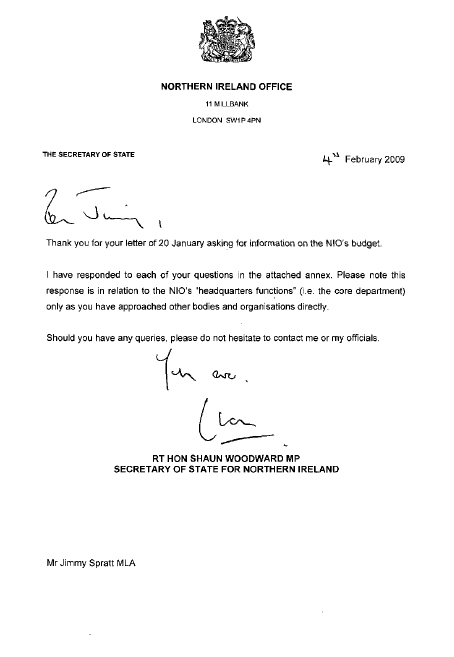
Letter to Secretary of State
10 February 2009
Mr Jimmy Spratt MLA
Chairman of the Assembly and
Executive Review Committee
C/o Room 428
Northern Ireland Assembly
Parliament Buildings
Stormont Estate
Belfast
BT4 3XX
Rt. Hon. Shaun Woodward, MP
Secretary of State for Northern Ireland
Block B
Castle Buildings
Stormont Estate
BELFAST
BT4 3SG
10 February 2009
Dear Secretary of State
Devolution Of Policing And Justice Matters
The Assembly and Executive Review Committee met today to continue its consideration of the devolution of policing and justice matters.
As you know, the Committee has written to you about the various Memoranda of Understanding (MOUs) and Protocols which were being developed.
Previously the Committee also expressed interest in legislative proposals which your Department was developing and I was asked, today, to write to you to request that you provide details of that draft legislation, including your assessment of when it will be introduced in Westminster. The Committee is also particularly interested to know if the draft legislation will contain any provisions relating to the role, or lack of role, which the First Minister and deputy First Minister will have in relation to judicial appointments.
I look forward to hearing from you in due course.
Yours sincerely

Jimmy Spratt
Chairman
Letter from Secretary of State
12 February 2009
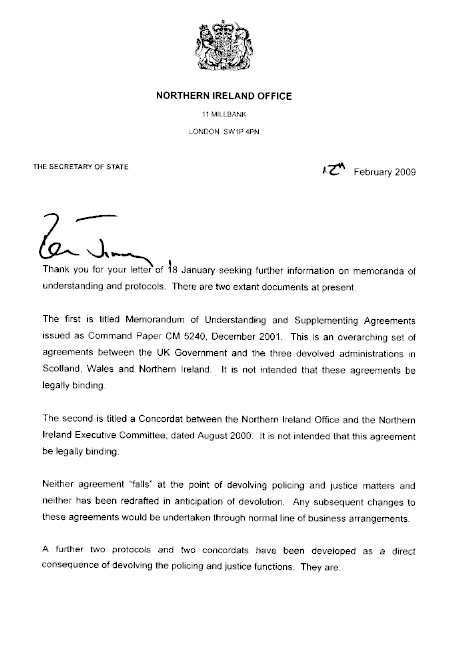
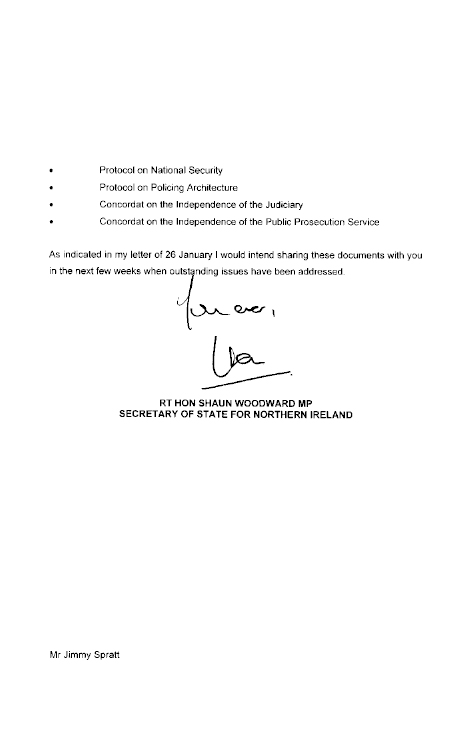
Letter from Secretary of State
19 February 2009
|
Mr Jimmy Spratt MLA |
Your Reference: |
Dear Mr Spratt MLA,
This is to acknowledge receipt of your letter dated 19/02/2009 to the Secretary of State for Northern Ireland regarding The Financial Implications of Devolving Policing and Justice Matters.
A reply will be forwarded to you as soon as possible.
Yours sincerely
NICHOLA CROWLEY
Secretary of State’s Private Office
Letter from Secretary of State
23 February 2009
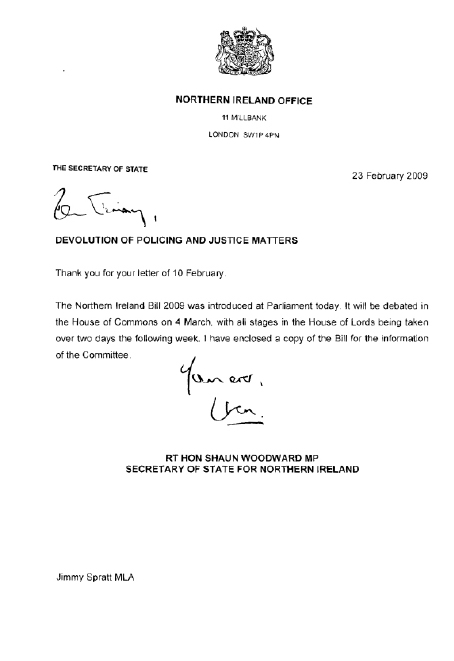
Letter to Secretary of State
27 April 2009
Mr Jimmy Spratt MLA
Chairman to Assembly and
Executive Review Committee
c/o Room 428
Parliament Buildings
Stormont Estate
Belfast
27 April 2009
Dear Secretary of State
Devolution of Policing and Justice Matters
As you know, the Committee is continuing its work on the arrangements for the devolution of policing and justice matters, and, having completed a series of oral evidence sessions on the financial implications of ‘devolution’ immediately before the Easter Recess, the Committee resumed its consideration of the Category Two List of Issues on Tuesday 21 April 2009. During those discussions it became apparent that, in order to make further progress, it would be useful to have some more information, or assistance, from you on the matters listed immediately below. However, and as I indicated to you on 31 March 2009, the Committee also requires answers to a number of finance related questions; these are listed at the end of this letter.
Memoranda of Understanding (MOUs) and Protocols
You will be aware that the Committee has lodged regular requests for sight of the various MOUs and Protocols which are being prepared by your Department in anticipation of a request for devolution. Indeed, when you appeared before the Committee to give oral evidence on 31 March 2009, you indicated that you would be able to share these documents, with this Committee, within weeks. You mentioned two protocols and two concordats, in particular.
It is of concern to at least some Members of the Committee that a number of justice related protections which currently apply between Her Majesty’s Government, or its agencies, and the authorities in the Republic of Ireland, may fall at the point of devolution. The Committee wishes to establish if that is the case, in fact, or if the MOUs/Protocols/Concordats, taken collectively, will ensure that there are no gaps in these type of arrangements at the point of devolution.
Ashdown Report on Parading
You will also be aware that the Committee is concerned about the potential costs of policing ‘parading’. In this regard, the Committee would find it helpful if you were to indicate if, and when, the government commissioned report on parading is to be published.
Visits to other Legislatures
In order to inform its thinking on a number of issues relating to the arrangements for the devolution of policing and justice matters, the Committee is proposing to visit legislatures in London, Edinburgh and Dublin in early/mid June. In terms of the visit to Westminster, I am writing to request meetings with the Lord Chancellor, the Attorney General, the Justice Committee and the Northern Ireland Affairs Committee. It would be helpful if you were to use your influence in order to ensure that the Committee gets to meet with the Lord Chancellor and the Attorney General, in particular.
Finance Questions
- It is the understanding of the Committee that the Court Service is required to make up any shortfall in the provision of judicial salaries. This would seem to be constitutionally improper given the independence of the judiciary and the Committee is interested to know if there are any plans to address this matter?
- It is clear that the costs of policing and justice in Northern Ireland are proportionately much higher than in England, for reasons not easily changed in the short term. What assurance can you give that this will be recognised in future funding settlements, following devolution?
- You mentioned in your oral evidence that there would be differing financial implications arising from the various structural options for the justice sector. Can you elaborate on these?
- Do the estimates for forward years take any account of the further efficiency savings which the Committee understands the Treasury is seeking across all UK departments?
- What do you consider is the scope for a more joined up approach amongst ALL the agencies working in the justice system? Do you envisage ‘efficiency savings’ as a consequence of a more joined up approach, and, if so, what would be the timescale for those efficiencies and how significant would the savings be?
- Are there any other issues you are aware of that could have a material and inescapable consequence for the budget?
Yours sincerely

Jimmy Spratt
Chairman
Letter to Secretary of State
7 May 2009
Mr Jimmy Spratt MLA
Chairman to Assembly and
Executive Review Committee
c/o Room 428
Parliament Buildings
Stormont Estate
Belfast
7 May 2009
Rt. Hon. Shaun Woodward, MP
Secretary of State for Northern Ireland
Block B
Castle Buildings
Stormont Estate
Belfast
BT4 3SG
Dear Secretary of State,
Devolution of Policing and Justice Matters
I wrote to you recently about a number of issues relating to the devolution of policing and justice powers. As you know, the Committee had been concentrating on the financial implications of devolving those powers but it has now turned its attention back to the other matters which feature on the ‘Category Two List of Issues’. During the Committee’s meeting on 5 May 2009, it became evident that, in order for us to make progress on a number of those matters, it is necessary, in particular, to have a reply from you about various Memoranda of Understanding (MOUs) and protocols which the NIO has been drafting. However, a further specific issue was identified during our discussions earlier this week.
The Committee is concerned to ensure that a future Justice Committee will have access to sensitive, or classified, documents, and we would welcome your views on this matter. We are also interested to know if this issue is addressed in the MOUs and protocols which you have agreed to share with us, and when we might expect to receive these.
As you know, the Committee is planning visits to London, Edinburgh and Dublin, to meet with the respective Justice Ministers and Justice Committees in those legislatures. These visits are likely to take place in early/mid June and the Committee takes the view that it will be important for us to have the best possible understanding of the scope and extent of the MOUs and protocols in advance of these proposed meetings. Therefore, I look forward to an early reply from you.
I have copied this letter to the First Minister and the deputy First Minister as I am aware that it is your intention to provide them with the MOUs and protocols at the same time as they are released to this Committee.
Yours sincerely
Jimmy Spratt
Chairman
Letter from Secretary of State
8 May 2009
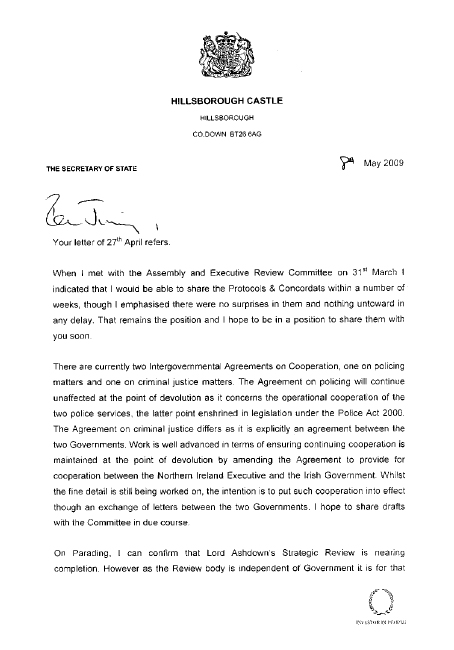
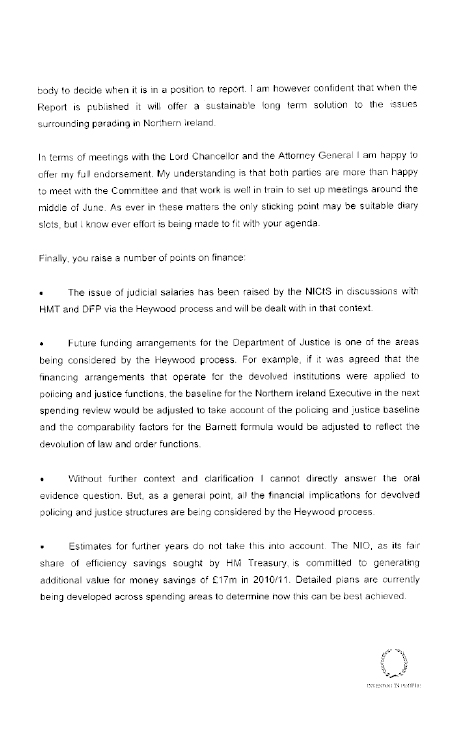
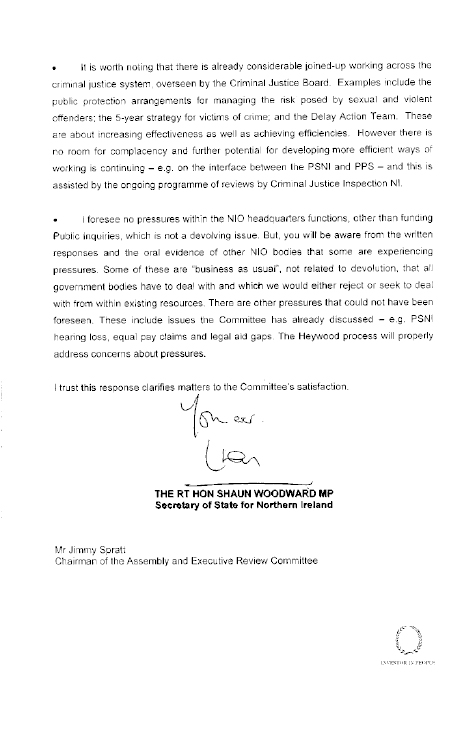
Letter to Secretary of State
12 May 2009
Mr Jimmy Spratt MLA
Chairman to Assembly and
Executive Review Committee
c/o Room 428
Parliament Buildings
Stormont Estate
Belfast
12th May 2009
Rt. Hon. Shaun Woodward
Northern Ireland Office
Block B
Castle Buildings
Stormont Estate
Belfast
BT4 3SG
Dear Secretary of State,
The Financial Implications Relating to the Devolution of Policing and Justice Matters
Thank you for providing a written submission and for appearing before the Assembly and Executive Review Committee to give oral evidence, recently.
The Committee has asked its Specialist Adviser, Victor Hewitt, to do some more work on the information which has been supplied and to present his findings in the form of a paper. In anticipation of this paper, I have written to the First Minister and the deputy First Minister, and the Minister for Finance and Personnel to offer them the opportunity of meeting with the Committee to consider the paper, in closed session, later this month. However, you will recall that, during the oral evidence session, you were asked to indicate if there were any additional financial pressures you wished to identify to the Committee.
My purpose in writing to you again is to give you a further opportunity to confirm that the position you declared in your written, and oral, evidence remains accurate and up to date. You should direct any such confirmation to the e-mail address below by midday, 18 May 2009.
However, if you are unable to provide that confirmation because, for example, you are now aware of any easements, or new pressures, in the current CSR period, or if your spending plans have been re-profiled in any way, including deferrals beyond the current CSR period, you should provide details, electronically, to the Committee Clerk by midday, 18 May 2009 at the following addressstephen.graham@niassembly.gov.uk
Yours sincerely

Jimmy Spratt
Chairman
Letter to Secretary of State
14 May 2009
Mr Jimmy Spratt MLA
Chairman to Assembly and
Executive Review Committee
c/o Room 428
Parliament Buildings
Stormont Estate
Belfast
Rt. Hon. Shaun Woodward, MP
Secretary of State for Northern Ireland
Block B
Castle Buildings
Stormont Estate
BELFAST
BT4 3SG
14 May 2009
Dear Secretary of State
Devolution of Policing and Justice Matters
Your letter of 8 May 2009 was tabled at the Assembly and Executive Review Committee’s meeting on 12 May 2009. It had ‘crossed post’ with my further letter to you, dated 7 May 2009, which is also relevant. Members have undertaken to reflect on the detail of your response between now and the next meeting of the Committee, scheduled for 19 May 2009.
However, and in the continued absence of the drafts you had promised, the Committee would now like to see, urgently –
- an indicative contents list of the justice matters which are to be covered in what you describe as “an exchange of letters between the two Governments." and;
- an indication of who is involved in developing the Memoranda of Understanding, the Protocols and the ‘letters’ referred to above, i.e are these matters which are being addressed exclusively by the two Governments, or is there consultation with, or involvement by, Members of the Northern Ireland Executive/Assembly?
Furthermore, I would like to remind you of the Committee’s interest in the contents of Heywood Report, as expressed during the oral evidence session on 31 March 2009.
Given that Members are, presently, reflecting on the content of your letter of 8 May 2009, it is possible that I will be writing to you again following the Committee’s meeting next week, but I look forward to an early reply to this letter.
Yours sincerely

Jimmy Spratt
Chairman
Letter from Secretary of State
19 May 2009
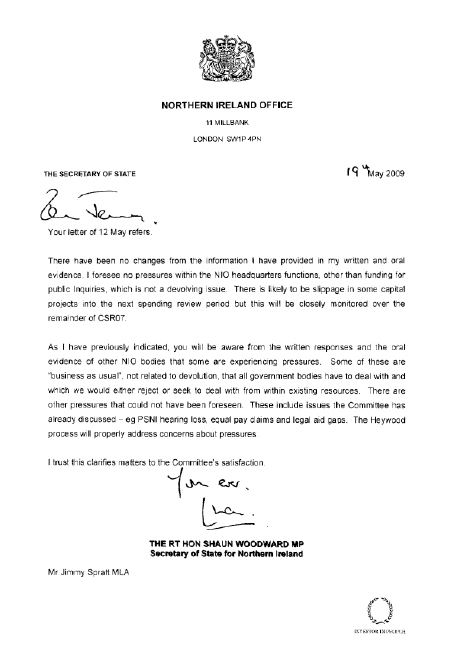
Letter from Secretary of State
31 May 2009
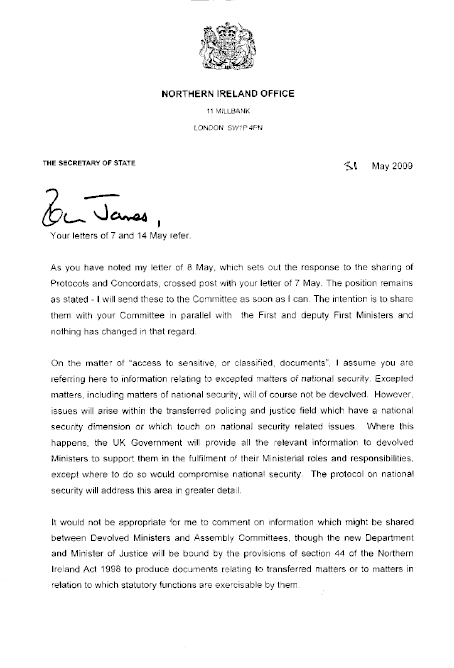
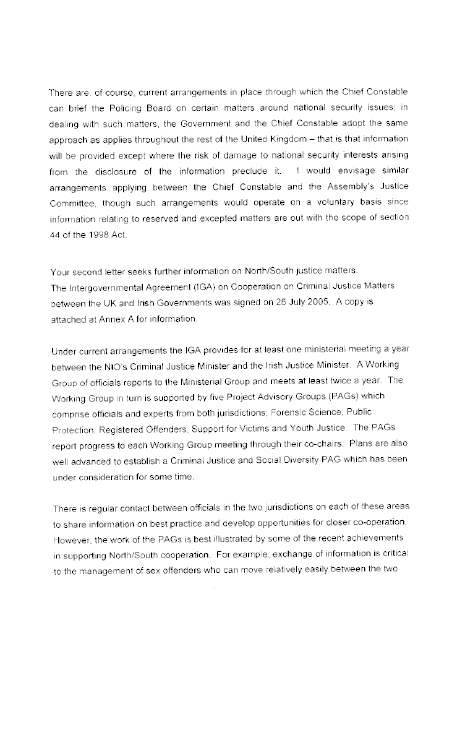
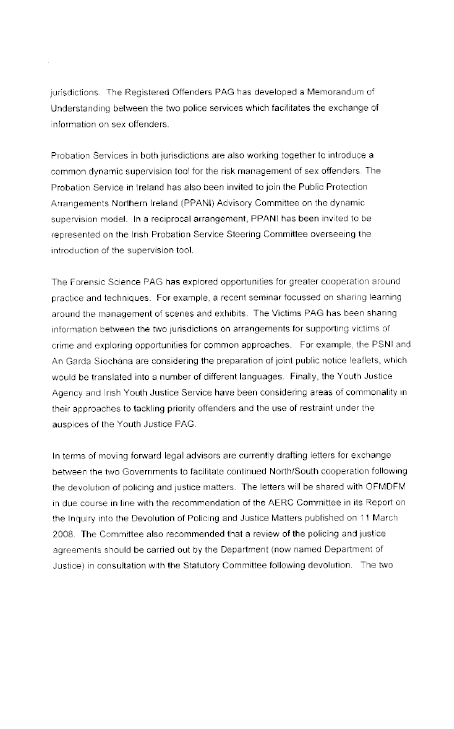
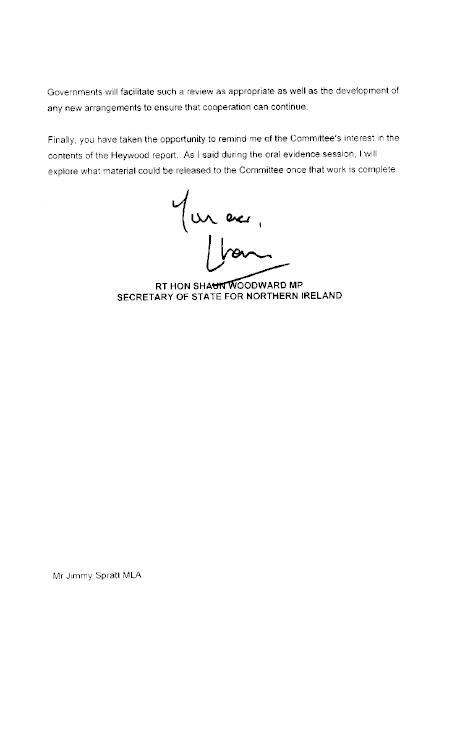
Annex A
Agreement between the Government of the United Kingdom of Great Britain and Northern Ireland and the Government of Ireland on Co-Operation on Criminal Justice Matters
The Government of the United Kingdom of Great Britain and Northern Ireland and the Government of Ireland:
Having regard to the Agreement between the Government of Ireland and the Government of the United Kingdom of Great Britain and Northern Ireland done at Belfast on 10 April 1998 (“the British-Irish Agreement") and to the Multi-Party Agreement reached at Belfast on 10 April 1998 annexed to the aforesaid Agreement;
Having regard to the Agreement between the Government of Ireland and the Government of the United Kingdom of Great Britain and Northern Ireland done at Dublin on 8 March 1999 establishing a British-Irish Intergovernmental Conference;
Considering the report of the Review of the Criminal Justice System in Northern Ireland published in March 2000 (“the Criminal Justice Review"), the Justice (Northern Ireland) Act 2002, which enacts certain recommendations of the Criminal Justice Review, and the Criminal Justice Review Updated Implementation Plan published in June 2003;
Taking into account the progress made on co-operation between the relevant agencies in Ireland and in Northern Ireland (“the two jurisdictions") on policing and security matters;
Taking into account also developments within the European Union in respect of co-operation on criminal justice matters;
Recalling the discussions that took place between the two Governments and the political parties at Hillsborough Castle in March 2003 and the Joint Declaration published by the two Governments on 1st May 2003;
Have agreed as follows:
Article 1
Ministerial Meetings on Criminal Justice Cooperation
(1) The Ministers of the governments of the United Kingdom and Ireland (hereinafter referred to as “the Ministers") responsible for criminal justice matters in the two jurisdictions shall meet at least annually for the purpose of facilitating more effective co-operation and coordination on criminal justice matters, including in combating criminal behaviour, working together in the prevention of crime and on community safety issues, and dealing with offenders after conviction. Such meetings shall be referred to hereinafter as Ministerial Meetings on criminal justice cooperation.
(2) The Ministerial Meetings shall operate under the auspices of, and be accountable to, the British-Irish Intergovernmental Conference. The Ministers shall provide periodic joint reports to the British-Irish Intergovernmental Conference on the Ministerial Meetings.
(3) The Ministerial Meetings shall operate on the basis of the arrangements set out in the Annex, which shall constitute an integral part of this Agreement.
Article 2
Working Group on Criminal Justice Cooperation
(1) A Working Group on Criminal Justice Cooperation comprising officials from the United Kingdom and Ireland shall meet regularly to support the Ministerial Meetings and to take forward work on progressing the relevant recommendations of the Criminal Justice Review, and to identify other areas in which co-operation on criminal justice matters could be enhanced or initiated, as appropriate.
(2) The Working Group shall prepare, seek the agreement of the Ministers to, and implement annual work programmes on co-operation and co-ordination on criminal justice matters. Such work programmes will be published, including in electronic format.
(3) The Working Group shall be accountable to the Ministers, and through the Ministers to the British-Irish Intergovernmental Conference, and shall provide reports on progress to the Ministerial Meetings.
(4) The Working Group shall meet at least twice each year and shall operate on the basis of the arrangements set out in the Annex, which shall constitute an integral part of this Agreement.
Article 3
Protocols
(1) Where appropriate, written Protocols may be drawn up between relevant criminal justice agencies in the two jurisdictions addressing detailed aspects of co-operation agreed between them.
(2) Any such protocols shall be submitted to the Ministers for approval and signature.
(3) Such protocols shall not constitute international agreements and shall not have binding effect on either Government.
Article 4
Relationship with other international agreements
This Agreement shall not affect the rights and obligations of the Parties under other international agreements.
Article 5
Operation and Review of Agreement
(1) This Agreement shall have effect in respect of criminal justice matters to the extent that they are not devolved to the Northern Ireland Assembly.
(2) When the criminal justice matters to which this Agreement relates are devolved to the Northern Ireland Assembly, the operation of the Agreement will be reviewed by the Ministers.
Article 6
Entry into force
Each Government shall notify the other in writing of the completion, so far as it is concerned, of the requirements for entry into force of this Agreement. This Agreement shall enter into force on the date of receipt of the later of the two notifications.
In witness whereof the undersigned, being duly authorised thereto by the respective Governments, have signed this Agreement.
Done in two originals at_________on the_________day of___________2005.
For the Government of the United For the Government of Ireland:
Kingdom of Great Britain and
Northern Ireland:
Arrangements for the Operation of the Ministerial meetings and Working Group Meetings on Criminal Justice Co-Operation
Ministerial Meetings
Terms of Reference
The Ministerial Meetings shall serve as a forum for the Ministers responsible for criminal justice matters in the two jurisdictions to:
- discuss criminal justice matters of mutual interest or concern in the two jurisdictions.
- consider the scope for, and develop plans to achieve, more effective co-operation and co-ordination on criminal justice matters between the two jurisdictions.
- oversee and give direction to the work of the Working Group.
- approve and periodically review progress against the annual work programmes on criminal justice co-operation.
Attendance
The Ministers shall be supported at meetings by the Joint Chairmen of the Working Group or their nominated representatives and by such other officials and representatives from the United Kingdom and Ireland as the Ministers may determine. Both sides shall endeavour to maintain a balance in representation between the two jurisdictions and to keep overall numbers at a manageable level.
Secretariat
Officials from the Northern Ireland Office and officials from the Department of Justice, Equality and Law Reform shall provide administrative support for, and shall produce an agreed record of, all Ministerial Meetings. Any disagreement about the record of a meeting that cannot be resolved through consultation between the two sides shall be referred to the Joint Chairmen and ultimately to the Ministers.
Working Group on Criminal Justice Cooperation
Terms of Reference
The Ministerial Meetings shall be supported by a Working Group comprising officials from the United Kingdom and Ireland who shall meet at least twice a year in order to:
- exchange information and discuss criminal justice matters of mutual interest.
- identify and advise on the opportunities for co-operation on criminal justice matters at government level and between the criminal justice agencies in the two jurisdictions, taking account also of the need for effective co-operation with other parts of these islands.
- prepare and submit annual work programmes on co-ordination and co-operation on criminal justice matters between the two jurisdictions for consideration at Joint Ministerial Meetings, and, where Ministers agree, to take forward the implementation of such programmes.
- take forward consideration of, and where appropriate implement, the recommendations on co-operation on criminal justice matters in the Criminal Justice Review.
- establish and manage projects and initiatives to facilitate and enhance co-operation on criminal justice matters between the two jurisdictions.
- keep under review the effectiveness of the arrangements for facilitating and enhancing co-ordination and co-operation on criminal justice matters between the two jurisdictions, and make appropriate recommendations on these matters to Ministerial Meetings.
- prepare and agree periodic reports for the Ministers on progress in taking forward the Work Programme approved by Ministers.
- prepare and agree reports as appropriate for Ministers to provide to the BIIGC.
Chairmanship
The Working Group shall be chaired jointly by the Director, Criminal Justice of the Northern Ireland Office and the relevant Assistant Secretary from the Department of Justice, Equality and Law Reform, or their nominated representatives.
Meetings of the group shall alternate between the United Kingdom and Ireland. The chairmanship of meetings shall also alternate with their location. The Director, Criminal Justice of the Northern Ireland Office shall take the chair when meetings take place in Northern Ireland, or elsewhere in the United Kingdom. The relevant Assistant Secretary from the Department of Justice, Equality and Law Reform shall take the chair when meetings take place in Ireland.
Membership
Membership of the Working Group shall include such officials and representatives from both jurisdictions as the Joint Chairmen may determine. Both sides shall strive to maintain a balance in representation between the two jurisdictions and to keep overall numbers at a manageable level.
Official support
The Working Group shall be supported by those officials from the DJELR and the NIO who provide administrative support to the Ministerial Meetings.
Records of meetings of the Working Group shall be agreed between the Joint Chairmen.
Letter to Secretary of State
12 June 2009
_fmt2.jpeg) Mr Jimmy Spratt MLA
Mr Jimmy Spratt MLA
Chairman to Assembly and
Executive Review Committee
c/o Room 428
Parliament Buildings
Stormont Estate
Belfast BT4 3XX
12 June 2009
Rt Hon. Shaun Woodward, MP
Secretary of State for Northern Ireland
11 Millbank
LONDON
SW1P 4PN
Dear Secretary of State,
DEVOLUTION OF POLICING AND JUSTICE MATTERS
The Assembly and Executive Review Committee has extended, and the First Minister and deputy First Minister have accepted, an invitation to attend a closed session of the Committee, at which the Committee’s Specialist Adviser will give a short presentation on his emerging findings in relation to the financial implications of devolving a range of policing and justice matters, but with a particular emphasis on ‘pressures’. A similar invitation has been extended to the Minister for Finance and Personnel to attend the meeting which is scheduled to take place in Room 21 at 11.30 hrs. on Monday 29 June 2009.
The Committee recognises that, in order for the session on 29 June 2009 to be meaningful, it is necessary to provide the First Minister and the deputy First Minister (and the Minister for Finance and Personnel) with advance notice of the details of the Specialist Adviser’s emerging findings – on an ‘in confidence’ basis. Also, and in keeping with an earlier suggestion made by the First Minister and deputy First Minister, the Committee agreed to supply you with details of the Specialist Adviser’s emerging findings, again on an ‘in confidence’ basis – see Annex A - and to invite you comment on them.
A reply, by 25 June 2009, would allow your comments to be taken into account at the meeting on 29 June 2009.
You may also be interested to know that Members considered it important to request that the First Minister and deputy First Minister brief the Committee on 29 June 2009, on their involvement in discussions with you, and your officials, about the devolution of policing and justice matters, generally, and more specifically on any discussions there may have been in relation to the Heywood Report.
I look forward to hearing from you by 25 June 2009.
Yours sincerely

Jimmy Spratt
Chairman
Letter to Secretary of State
16 June 2009
Rt Hon. Shaun Woodward, MP
Secretary of State for Northern Ireland
11 Millbank
London
SW1P 4PN
16 June 2009
Dear Secretary of State
DEVOLUTION OF POLICING AND JUSTICE MATTERS
Thank you for your letter of 31 May 2009 which was considered, briefly, by the Assembly and Executive Review Committee at its meeting on 9 June 2009. Unfortunately, Annex A to your letter was not enclosed, but a copy of that document has since been provided by your office. Your letter, and the Annex, will be given further consideration when the Committee meets on 23 June 2009. However, and in the meantime, I have been asked to seek some clarity, and assurances, from you about whether, or not, the exchange of letters between the two governments will have the effect of ensuring that ALL existing policing and justice Memoranda of Understanding, concordats and protocols will continue to apply, in full, at the point of devolution.
Yours sincerely
Jimmy Spratt
Chairman
Letter from Secretary of State
20 June 2009
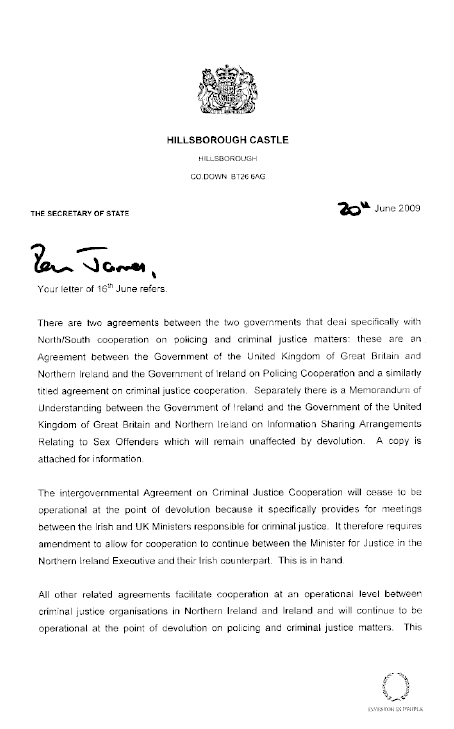
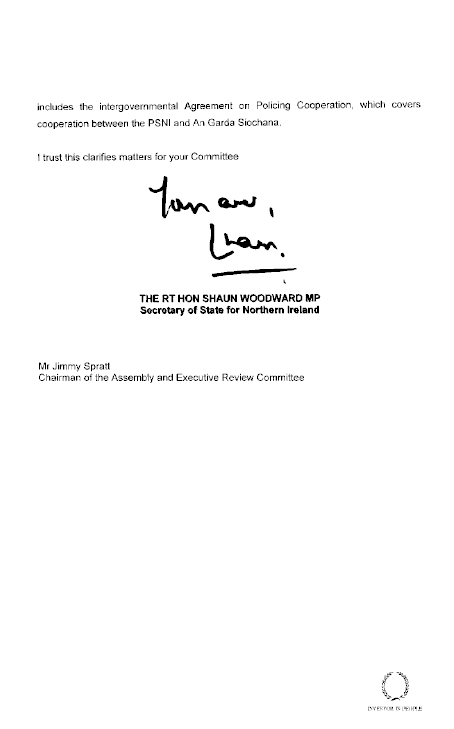
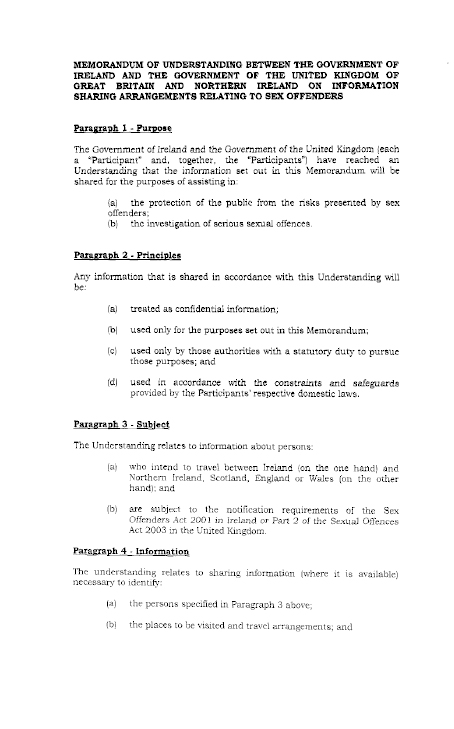
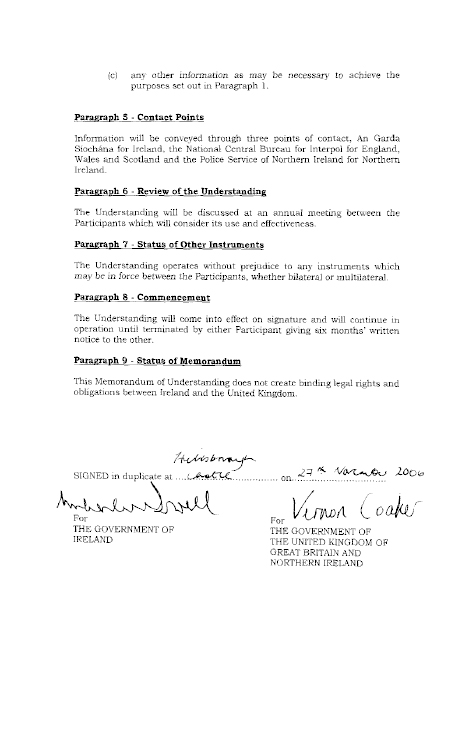
Letter from Secretary of State
22 June 2009
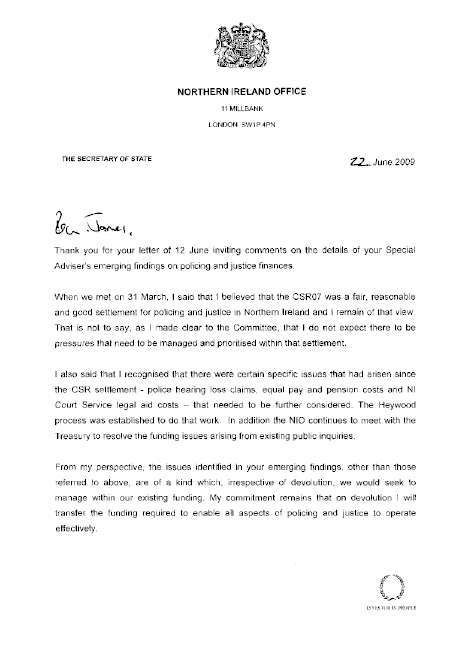
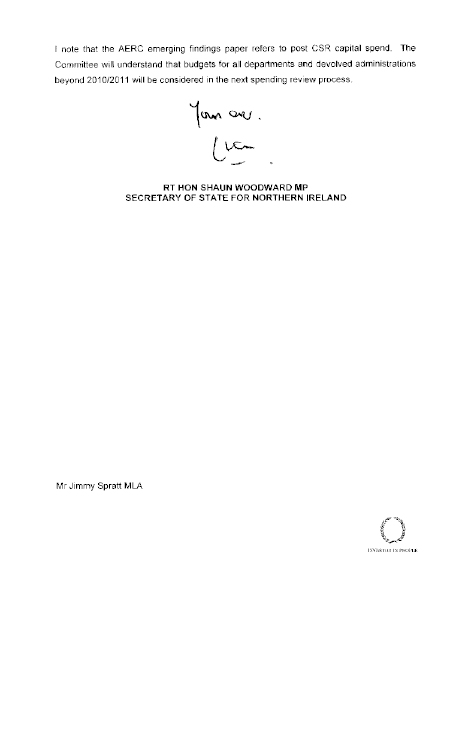
Letter to Secretary of State
17 September 2009
Mr Jimmy Spratt
Chairperson of the Assembly and
Executive Review Committee
c/o Room 428
Northern Ireland Assembly
Parliament Buildings
Stormont Estate
Belfast
BT4 3XX
17 September 2009
Dear Secretary of State,
Devolution of Policing and Justice Matters
When the Assembly and Executive Review Committee met earlier this week, it resumed its consideration of the financial implications associated with the devolution of policing and justice powers and other associated matters which feature on its ‘Category Two List of Issues’. I was asked to write to you on a number of matters.
Heywood Report
As you know, the Committee previously requested sight of the Heywood Report. If this is not possible, Members would find it helpful if you were to give the Committee some indication of the status of the Report, and the key findings and recommendations contained therein.
NIO/DOJ Budget and other resources
Members are conscious that much of the attention about the financial implications of devolving policing and justice has focused on so called ‘additional pressures’. However, the Committee would find it helpful if you were to now set out, in some detail, what proportion of the existing NIO budget would transfer to the proposed Department of Justice, and what proportion would be retained to finance the FNIO; what monies would transfer to the proposed Department of Justice from elsewhere (for example to cover Courts Service expenditure); and what financial provision, if any, there is to ‘set up’ the proposed Department of Justice. It would also be helpful if you were to describe, in some detail, what assets, staff and accommodation will be transferred to the proposed Department, and how this will be achieved.
Ashdown Report
You will also recall the Committee’s interest in the Ashdown Report. Again, it would be helpful if you were to give the Committee some indication of the status of the Report, and the key findings and recommendations contained therein, particularly those which may have financial implications for policing ‘parading’.
Memoranda of Understanding
Further to your letter of 20 June 2009, the Committee would welcome an update on the work, which you indicated was in hand, in relation to the Agreement on Criminal Justice cooperation.
I look forward to an early reply.
Yours sincerely
Jimmy Spratt
Chairman
Letter to Secretary of State
7 October 2009
Mr Jimmy Spratt
Chairman
Assembly&Executive Review Committee
c/o Room 428
Parliament Buildings
Stormont Estate
Belfast
BT4 3XX
7 October 2009
Dear Secretary of State,
Devolution of Policing and Justice Matters
When the Assembly and Executive Review Committee met yesterday, it considered outstanding matters on the Category Two List of Issues relating to the devolution of policing and justice powers. The Committee is concerned to have urgent replies to the letters sent to you on 17 September 2009 and 30 September 2009 (attached) in order that it might make progress on resolving these issues.
Should you consider it more appropriate to appear before the Committee, in person, to respond to these matters perhaps your office would contact the Committee Clerk to make the necessary arrangements. Equally if you consider it would be more helpful and/or more convenient for your officials to attend, early contact with the Committee Clerk would be appreciated.
Yours sincerely

Jimmy Spratt
Chairman
Letter from Secretary of State
12 October 2009
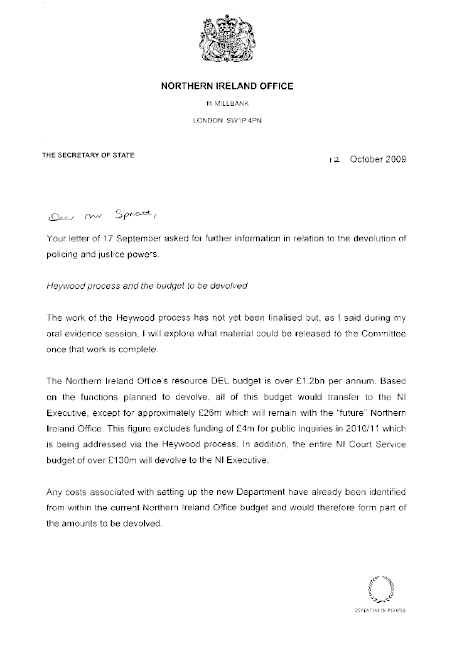
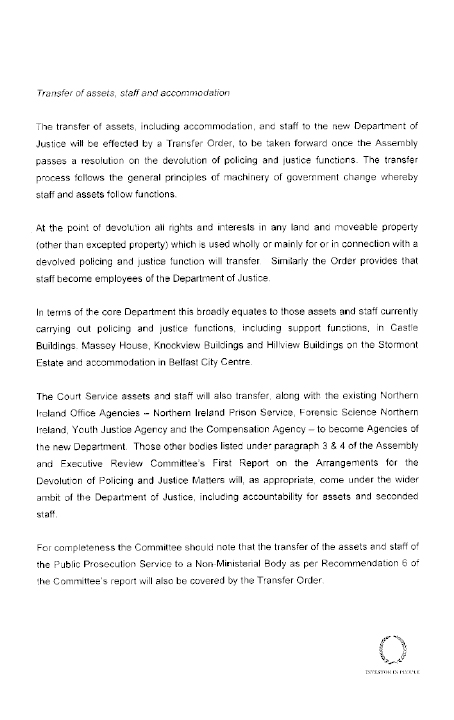
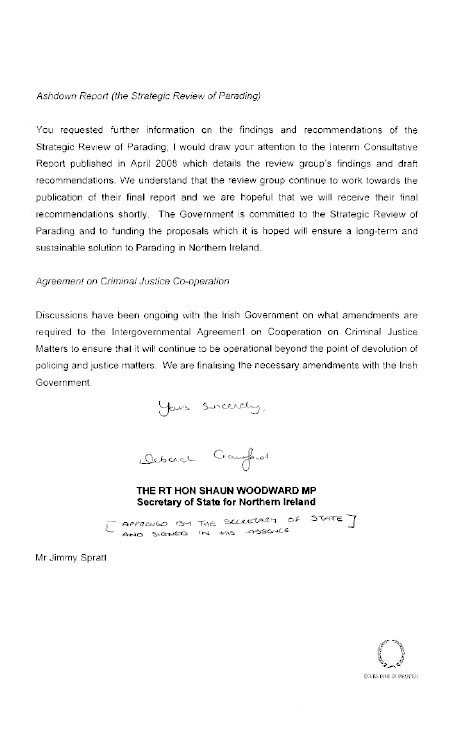
Letter from Secretary of State
26 October 2009
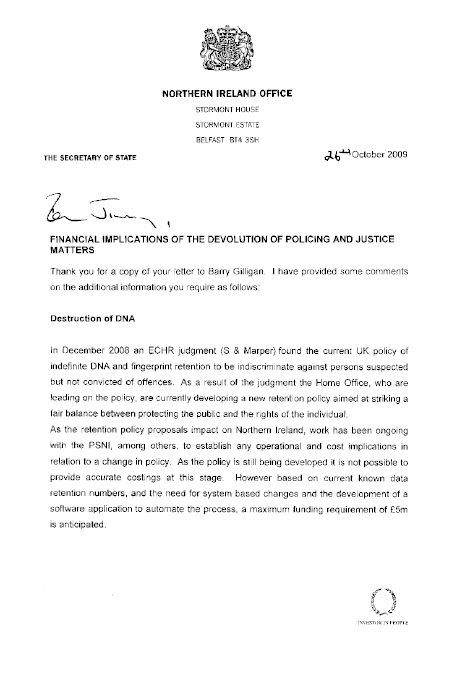
Letter to Secretary of State
3 November 2009
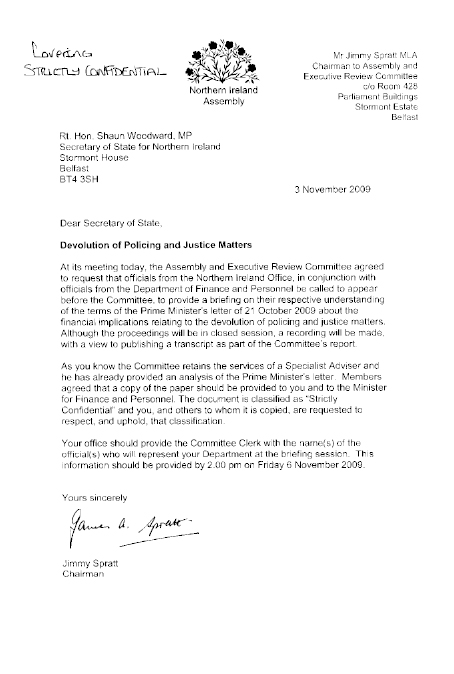
Letter from Secretary of State
5 November 2009
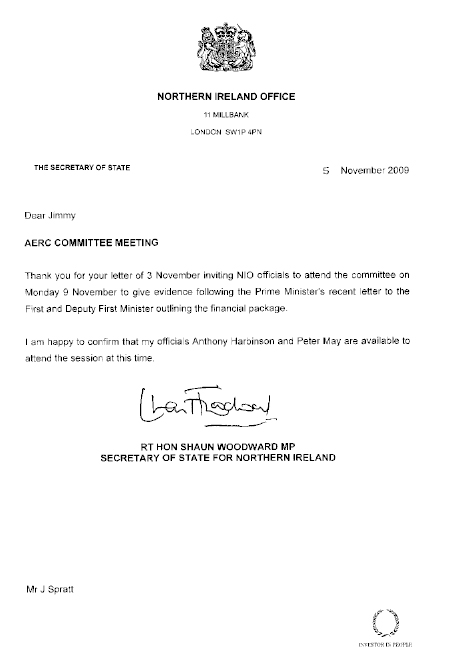
Letter to Secretary of State
5 November 2009
Mr Jimmy Spratt MLA
Chairman
Assembly and
Executive Review Committee
c/o Room 428
Parliament Buildings
Stormont Estate
Belfast
Rt. Hon. Shaun Woodward, MP
Secretary of State for Northern Ireland
Stormont House
Belfast
BT4 3SH
5 November 2009
Dear Secretary of State,
Devolution of Policing and Justice Matters
As you will be aware, the Assembly and Executive Review Committee, at its meeting on 3 November 2009, agreed that I should write to Lord Ashdown to invite him to appear before the Committee to provide an update on the Strategic Review of Parading in Northern Ireland. In this regard, and in the context of your letter of 12 October 2009, to the Committee, Members also agreed that I should write, to you, to request that you clarify your up to date position on the Strategic Review of Parading.
Yours sincerely

Jimmy Spratt
Chairman
Letter to Secretary of State
9 November 2009
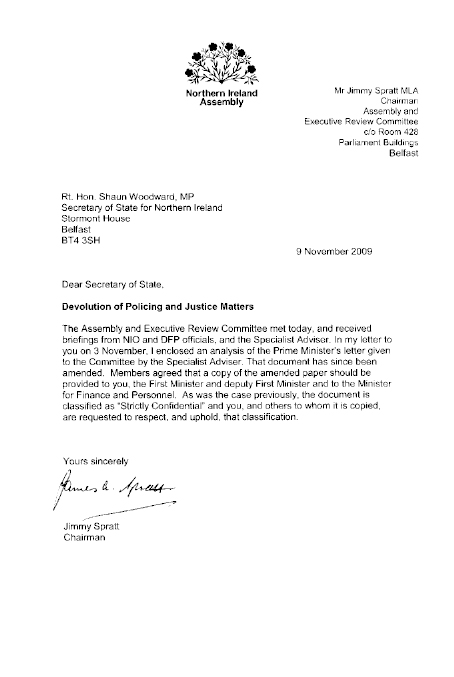
Letter from Secretary of State
12 November 2009
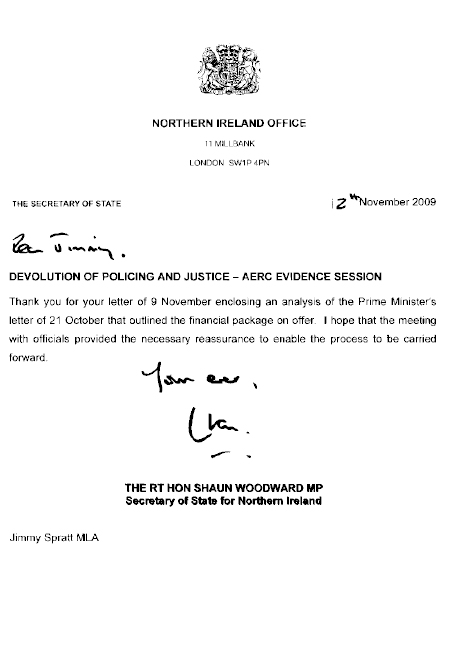
Letter to Secretary of State
19 November 2009
Mr Jimmy Spratt
Chairman
Assembly and
Executive Review Committee
c/o Room 428
Parliament Buildings
Stormont Estate
Belfast
BT4 3XX
19 November 2009
Rt. Hon. Shaun Woodward, MP
Secretary of State for Northern Ireland
Stormont House
Belfast
BT4 3SH
Dear Secretary of State,
Devolution of Policing and Justice Matters
When the Assembly and Executive Review Committee met on 17 November 2009, it was agreed that I should write to you and enquire if you are yet in a position to provide the updated version of the Intergovernmental Agreement on Cooperation on Criminal Justice Matters. Earlier exchanges of correspondence refer, and copies are enclosed.
Yours sincerely
Jimmy Spratt
Chairman
Letter to Secretary of State
19 November 2009
Mr Jimmy Spratt
Chairman
Assembly and
Executive Review Committee
c/o Room 428
Parliament Buildings
Stormont Estate
Belfast
BT4 3XX
19 November 2009
Rt. Hon. Shaun Woodward, MP
Secretary of State for Northern Ireland
Stormont House
Belfast
BT4 3SH
Dear Secretary of State,
Devolution of Policing and Justice Matters
Please find enclosed a copy of a letter from Lord Ashdown, dated 12 November 2009, which was considered by the Committee at its meeting on 17 November 2009.
Members agreed that this letter should be forwarded to you for information.
Yours sincerely
Jimmy Spratt
Chairman
Letter from Secretary of State
26 November 2009
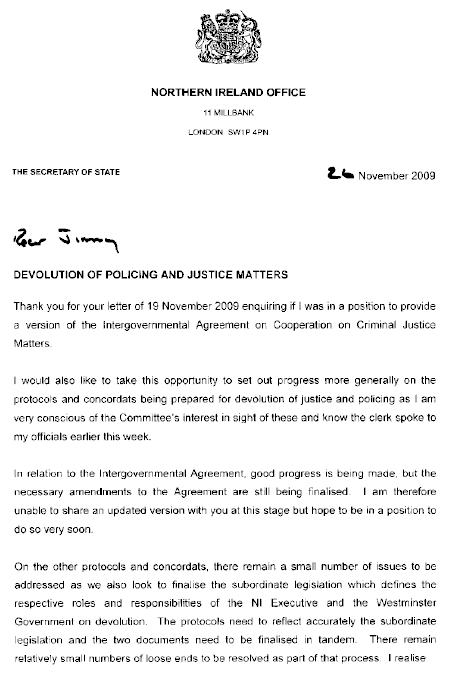

Letter from Mr David Lennox, NIO
8 December 2009
Mr Stephen Graham,
Clerk, Assembly & Executive Review Committee
Parliament Buildings
[Sent by email]
8 December 2009
Dear Stephen,
Intergovernmental Agreement on Criminal Justice Cooperation
I am grateful to the Committee for the opportunity to attend this morning’s meeting to discuss the proposed amendments to the above Intergovernmental Agreement.
I indicated at the meeting that the First Minister’s and deputy First Minister’s Special Advisors were content with the amendments to the Intergovernmental Agreement. However, on returning to the office I was made aware that I mis-interpreted correspondence around the agreement of the First Minister’s SpAds and they have not formally indicated that they are content with the amendments at this stage. Apologies for causing confusion but I should be grateful if you could advise the Committee accordingly.
I can confirm that the deputy First Minister’s Special Advisors are content with the proposed amendments.
Yours sincerely,
[signed]
David Lennox
Letter from Mr Peter May, NIO
10 December 2009
Stephen Graham
Clerk to Assembly & Executive Review Committee
Room 428
Parliament Buildings
Belfast
BT4 3XX
10 December 2009
Dear Stephen
Further to our conversation yesterday afternoon, I am attaching copies of the draft protocols on the Policing Architecture and Judicial Independence for the Committee to consider.
The judicial independence protocol was developed to underpin statutory provisions on judicial independence contained in the Justice (Northern Ireland) Act 2002 and the Constitutional Reform Act 2005 and to reinforce public confidence. It is envisaged this document would be agreed by the First Minister and Deputy First Minister on behalf of the Northern Ireland Executive and by the Secretary of State for Northern Ireland and the Lord Chancellor for the British Government.
The Policing Architecture protocol is intended as guidance for the Committee on how the respective roles and responsibilities of the Department of Justice, the Assembly Statutory Committee, the Chief Constable and the Policing Board might operate in practice. It is envisaged that it is a document which would be for the Minister for Justice and Assembly statutory Committee to agree.
Moira Doherty from the NIO will be present to brief the Committee on the Policing Architecture protocol, and Laurence McAlpine from the Northern Ireland Court Service will be present to brief on the Judicial Independence protocol. They will be in touch with you about the arrangements.
(signed)
Peter May
Director, Policing and Security
Letter from Minister of State, NIO
20 December 2009
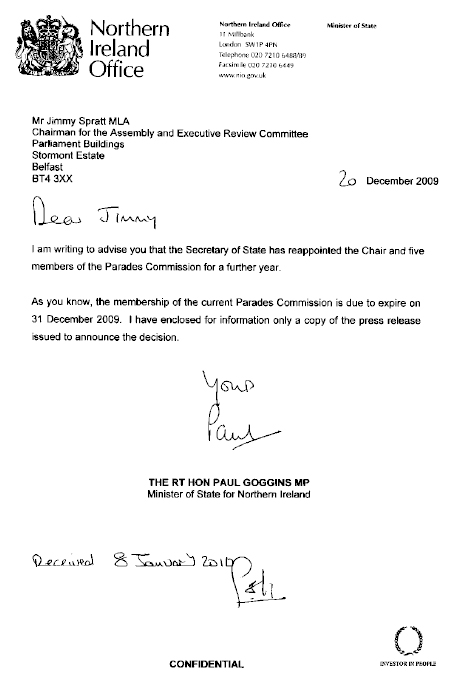
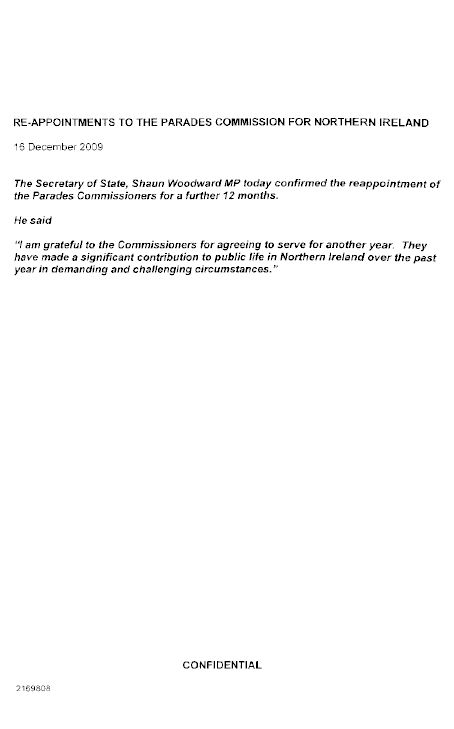
Letter from Northern Ireland Office
11 January 2010
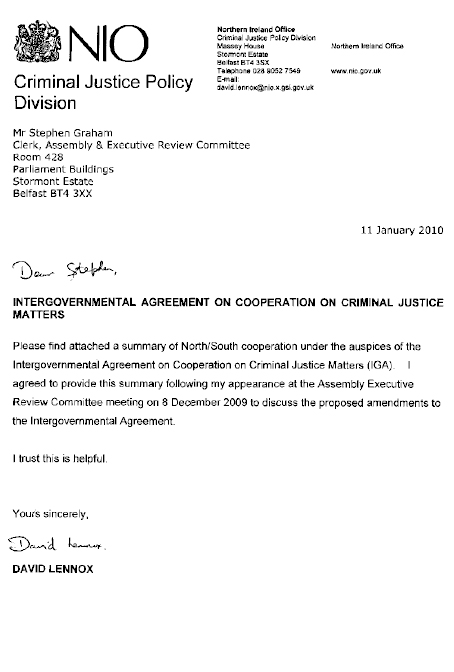
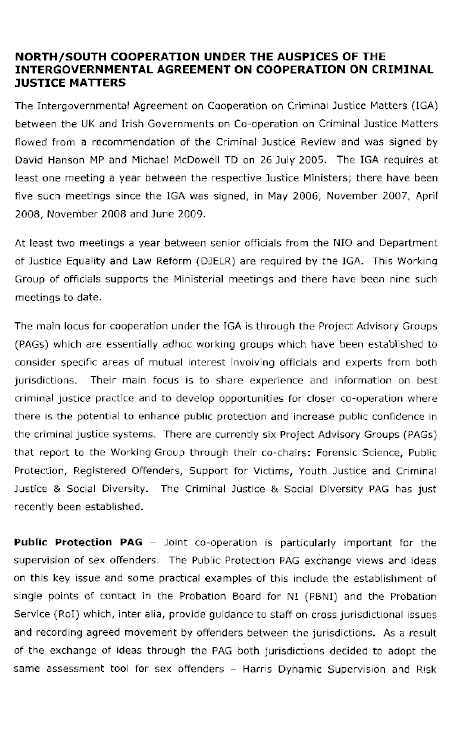
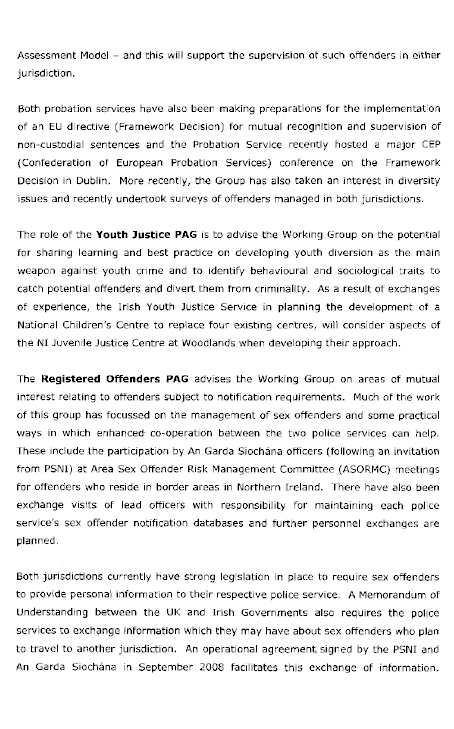
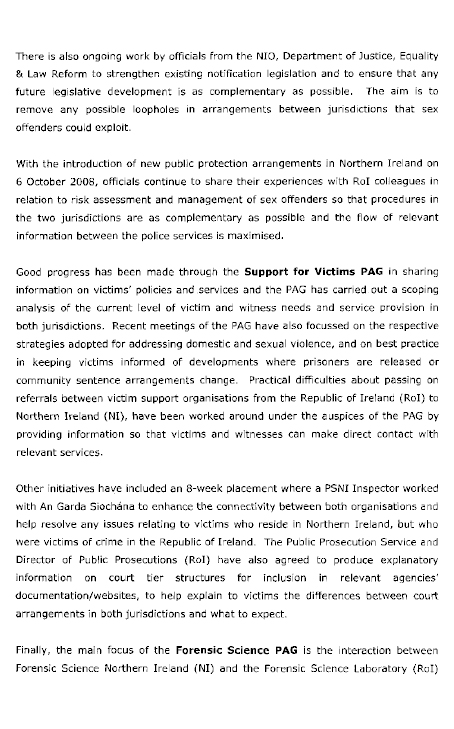

Letter to Secretary of State
19 January 2010
Mr Jimmy Spratt
Chairperson of the Assembly and
Executive Review Committee
c/o Room 428
Parliament Buildings
Stormont Estate
Belfast
BT4 3XX
19 January 2010
Dear Secretary of State,
Devolution of Policing and Justice Matters
When the Assembly and Executive Review Committee met today to consider outstanding matters on the Category Two List of Issues relating to the devolution of policing and justice matters, Members agreed to call on you to provide the Committee with all outstanding drafts and redrafts of policing and justice related Memoranda of Understanding, Protocols and Concordats, including the Handling Arrangements for National Security related matters, and to invite you to appear before the Committee to discuss these documents and other matters issues associated with the devolution of policing and justice powers.
It would be helpful if your office, contacted the Committee Clerk, urgently to make necessary arrangements.
Yours sincerely
Jimmy Spratt
Chairman
Letter to Secretary of State
9 February 2010
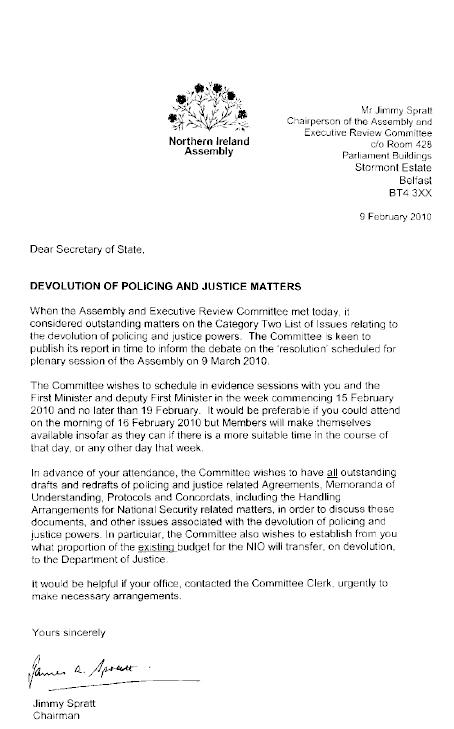
Letter from Northern Ireland Office
15 February 2010
Mr Stephen Graham
Clerk to Assembly and Executive Review Committee
Room 428
Parliament Buildings
Stormont Estate
Belfast
BT4 3XX
15 February 2010
Dear Stephen
Sharing of Protocols, Concordats and related material with the Assembly and
Executive Review Committee
This letter addresses the above matter. Six papers have been issued to you under separate cover. They are:
- The Intergovernmental Agreement on Criminal Justice;
- The Intergovernmental Agreement on Policing;
- MoU between the two Governments on sharing information on Sex Offenders;
- Concordat on Prosecutorial Independence;
- Concordat on Judicial Independence;
- Protocol on Policing Architecture.
The Protocol on National Security will issue tomorrow. On the substance of papers already sent you will wish to note the detailed comments as set out below.
Intergovernmental Agreement on Criminal Justice
The IGA on Criminal Justice was presented to the Committee on 8th December 2009. The Committee was content with the Agreement but requested detailed material on the outworking of the Agreement: this issued as an official letter and was taken at the meeting of 12th January.
Intergovernmental Agreement on Policing
The IGA on Policing was presented to the Committee on 12th January 2010. No changes have been made to the text.
The Committee will wish to note additional clarification. Following the devolution of policing to the Assembly, the subject matter of the Agreement will be devolved. The Agreement itself, which is between the two sovereign governments, will remain in place, as will the protocols agreed under the terms of the Agreement. Ministers have said that the UK Government would be willing to make amendments to the Agreement in conjunction with the Irish Government to give effect to the wishes of the two responsible Ministers, for instance in extending the terms of the Agreement beyond the current scope. In doing so it would want to be assured that the responsible Northern Ireland Executive Minister had secured the agreement of the Northern Ireland Executive.
In the Committee session, a number of members stressed that there ought to be provision for the devolved Minister to have a role in the event the Chief Constable and the Garda Commissioner propose to put in place further protocols between the two services under the Agreement. In light of the points made by the Committee, Ministers are considering the role of the Minister of Justice with respect to any further operational protocols between the PSNI and the Garda Siochana.
MoU between the two Governments on sharing information on Sex Offenders
The Mou was provided to the Committee for information purposes only. It is not a devolution specific issue and will remain in place after devolution.
Concordat on Prosecutorial Independence
The Prosecutorial Concordat was presented to the Committee on 12th January 2010. The Committee asked that a drafting note be included in the Concordat to clarify the funding assumptions as the Committee had not reached a settled view on wider “sponsorship" arrangements (para 4, bullet 6). Otherwise as drafted the Concordat confirms the position of the PPS as a NMD in line with recommendation 24 of the Committee’s report as debated and agreed by the Assembly on 11 March ‘08. An essential feature of NMD status is that the body should be funded by monies appropriated to its own vote. In essence this means funded by monies voted in the Assembly- in practice then routed through DFP supply side - with the body having its own ambit against which it would prepare estimates and annual accounts. If funding is sponsored by another department, then the status of the body becomes that of an NDPB and this implies a policy responsibility for the departmental minister.
A query was raised about what arrangements are in place in England & Wales governing the relationship between the Attorney General and the Crown Prosecution Service, particularly in the context of how a future Attorney General for Northern Ireland would respond in the Assembly about issues relating to the operation of the prosecution of offences.
You will appreciate that the arrangements in England & Wales (as well as those in Scotland) are significantly different from what will operate in Northern Ireland following the devolution of policing and justice matters. However you may wish to note that a protocol was agreed in July 2009 between the Attorney General and the Prosecuting Departments. This includes the Crown Prosecution Service, the Serious Fraud Office and the Revenue and Customs Prosecutions Office.
A copy of the protocol is available from: http://www.lslo.gov.uk/Publications/Pages/CriminalJusticeReports.aspx which you may find helpful as background. It sets out how the Attorney General and Directors of the prosecuting departments exercise their functions in relation to each other and covers:
- general responsibilities;
- strategy, planning and performance;
- responsibility for prosecution decisions;
- development of policy;
- dealing with the media; and,
- dealing with complaints.
Concordat on Judicial Independence
The Judicial Concordat was presented to the Committee on 15th December 2009. The Committee asked that mechanisms be put in place to ensure the Justice Minister was informed on the setting up of any removals tribunal. Additional clarification has been inserted (para 7.12).
Protocol on Policing Architecture
The Policing Protocol was shared with the Committee on 15th December 2009. Following comments from the Committee the Protocol has been amended to express more clearly the Minister’s role (para 2.2) and the role of a new Justice Committee has also been clarified (para 2.5). The Committee also commented on the reference to the Chief Constable as the Minister’s “chief professional advisor" but this has not been varied.
The Committee will wish to note that the Protocol has been shared with the Policing Board and the PSNI, with the Board now seeking legal advice to ensure the Protocol does not diminish its role post-devolution; the Board may make further comments on the document at a future point. On foot of PSNI comments it has been clarified that governance arrangements are captured in a framework document in line with DFP requirements (para 2.2) and for consistency reference to the Board’s framework document is also recorded (para 3.2).
The Committee will also wish to note the NIO position that the Protocol is offered only as a template for future policing architecture and that any new Justice Minister and the Assembly will wish to take a view in due course.
I trust this provides updated clarification on the material now shared with the Committee and would be grateful if you could bring this detail to the attention of the Chairman and members.
Yours sincerely
Alan Tipping
Letter to Secretary of State
18 February 2010
Mr Jimmy Spratt
Chairperson of the Assembly and Executive Review Committee
c/o Room 428
Parliament Buildings
Stormont Estate
Belfast BT4 3XX
18 February 2010
Dear Secretary of State,
Devolution of Policing and Justice Matters
On behalf of the Assembly and Executive Review Committee, I would like to thank you for giving evidence to the Committee this morning not only in relation to the financial implications of the devolution of policing and justice matters but also on the seven main Agreements, Concordats, Protocols and Memoranda of Understanding.
You gave an undertaking to provide the Committee with a detailed breakdown of the £1.328 billion which is the sum to be transferred from the budgets of the NIO and the Lord Chancellor’s Department to the Department of Justice, if there was to be a request for Policing and Justice Powers to be devolved. You also agreed to provide clarity on the status of each of the seven Agreements, Concordats, Protocols and Memoranda of Understanding. Given the timetable the Committee is working, to this information should be provided to the Committee Clerk by 5:00 pm on Friday 19 February 2010.
Yours sincerely
Jimmy Spratt
Chairman
Letter from Northern Ireland Office
19 February 2010
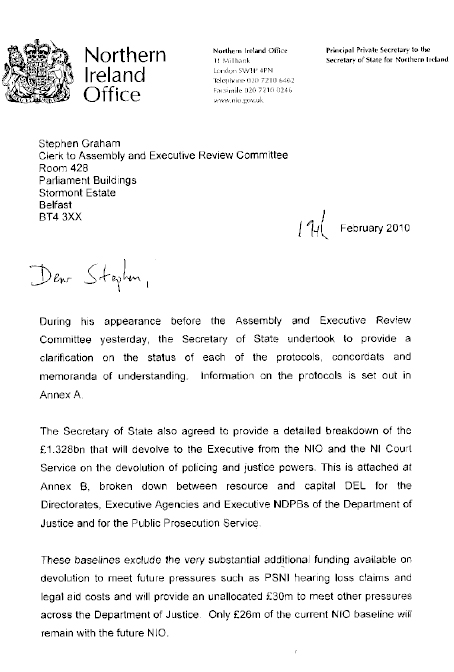
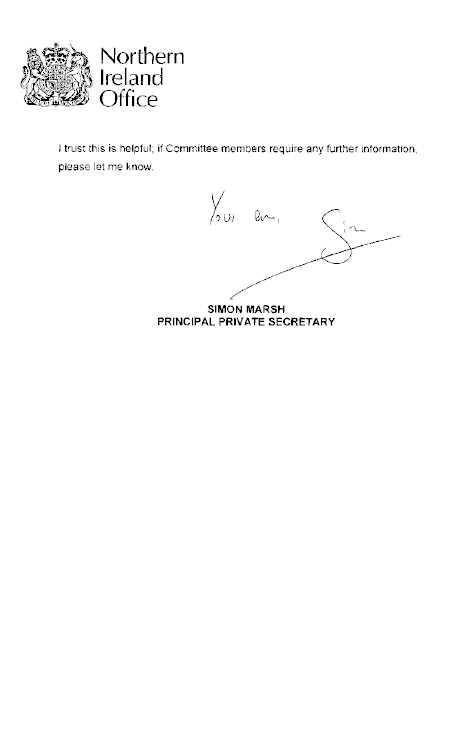
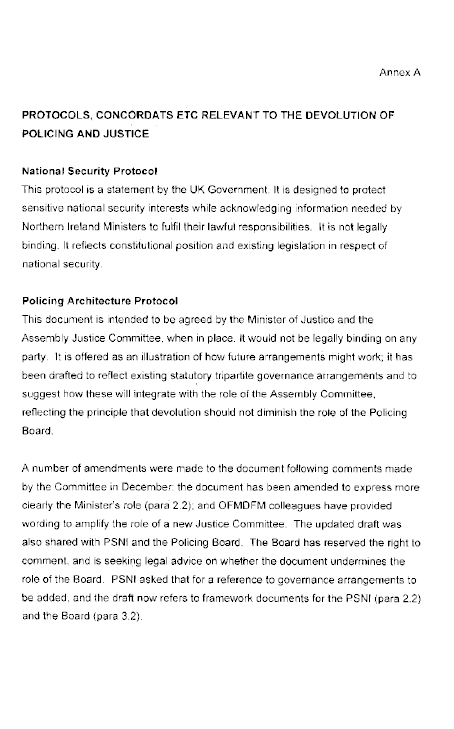
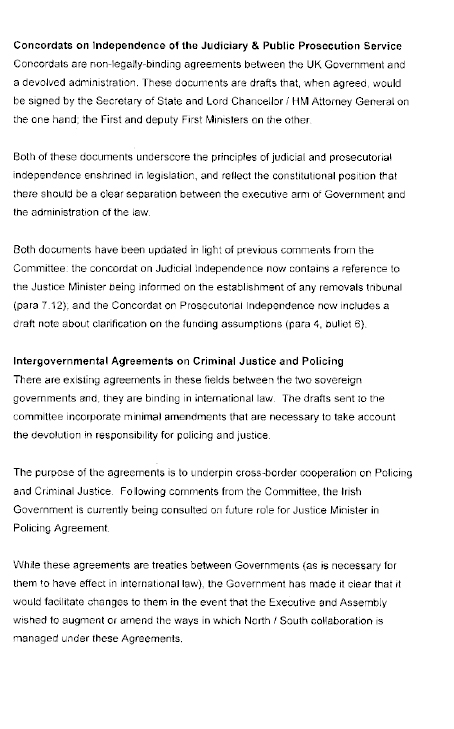

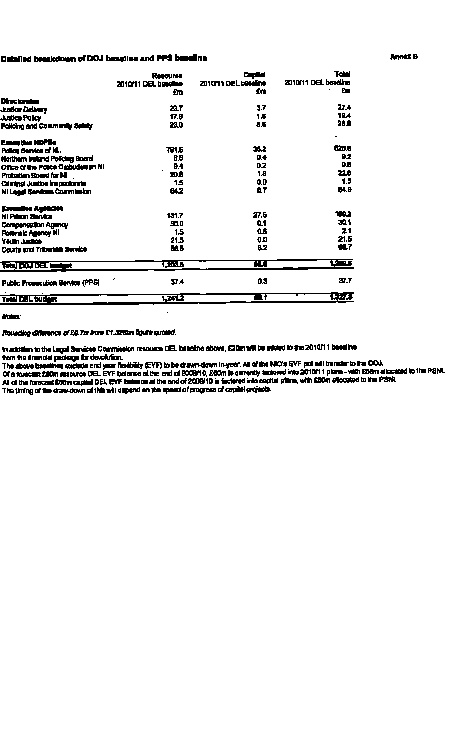
Letter to Secretary of State
23 February 2010
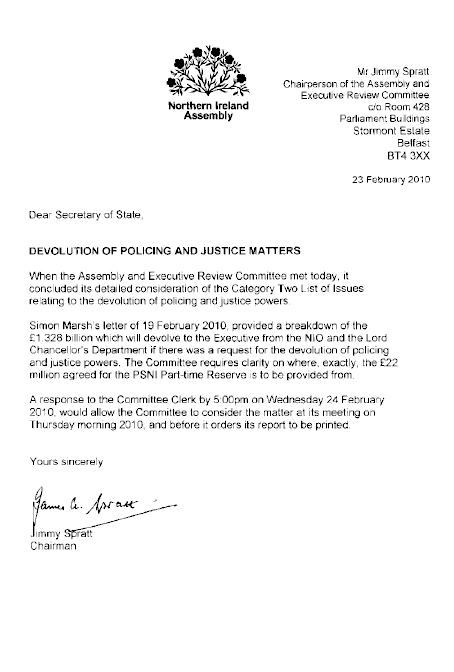
Letter from Northern Ireland Office
25 February 2010
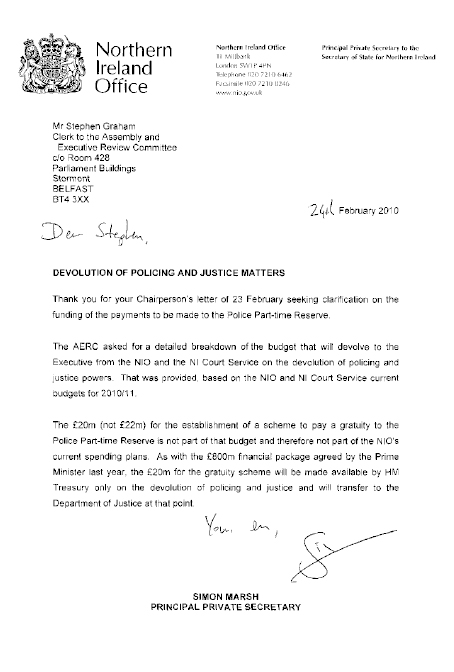
Appendix 7
Other Correspondence
Appendix 7
Other Correspondence
- Letter to Green Party – 15 January 2009
- Letter to Independent Health Coalition – 15 January 2009
- Letter to Progressive Unionist Party – 15 January 2009
- Letter to Alliance Party – 15 January 2009
- Letter to Rt. Hon. Lord Ashdown – 28 January 2009
- Letter to Justice Minsiter, Dublin – 2 February 2009
- Letter to Director General, NI Assembly – 10 February 2009
- Letter from Director General, NI Assembly – 18 February 2009
- Letter to Director General, NI Assembly – 26 February 2009
- Letter to Rt. Hon. Jack Straw, MP, Lord Chancellor – 24 April 2009
- Letter to Justice Committee, Westminster – 24 April 2009
- Letter to Justice Committee, Scotland – 24 April 2009
- Letter to Rt. Hon. Elish Angiolini, QC, Lord Advocate – 24 April 2009
- Letter to Justice Minister, Scotland – 24 April 2009
- Letter to NI Affairs Committee, Westminster – 24 April 2009
- Letter to Justice Minister, Dublin – 29 April 2009
- Letter to Justice Committee, Dublin – 29 April 2009
- Letter to Garda Commissioner – 29 April 2009
- Letter from Chief Constable of Police Service for Northern Ireland Private Office –
6 May 2009 - Letter to Justice Committee, Scotland – 19 June 2009
- Letter to Rt. Hon. Jack Straw, MP, Lord Chancellor – 19 June 2009
- Letter to Justice Committee, Westminster – 19 June 2009
- Letter to Justice Minister, Scotland – 19 June 2009
- Letter to Solicitor General – 19 June 2009
- Letter to Minister for Foreign Affairs, Dublin – 29 June 2009
- Letter to Garda Commissioner – 29 June 2009
- Letter to Justice Committee, Dublin – 29 June 2009
- Letter to Mr Dermot Ahern, TD, Justice Minister – 29 June 2009
- Letter to Mr Richard Barrett – 29 June 2009
- Letter from Justice Minister, Dublin – 20 August 2009
- Memo from Committee on Procedures – 21 September 2009
- Letter to Committee on Procedures – 22 September 2009
- Letter to NI Policing Board – 30 September 2009
- Letter to NI Policing Board – 7 October 2009
- Letter from James H Allister, QC, TUV Leader – 7 October 2009
- Letter from NI Policing Board – 9 October 2009
- Letter from NI Policing Board – 14 October 2009
- Letter from The Bar Council – 13 October 2009
- Memo from Committee on Procedures – 19 October 2009
- Letter to Economic Research Institute, Northern Ireland – 20 October 2009
- Letter to The Bar Council – 26 October 2009
- Letter to NI Policing Board – 26 October 2009
- Letter to First Minister and deputy First Minister from Northern Ireland Policing Board –
26 October 2009 - Letter to Committee on Procedures – 26 October 2009
- Letter to Minister for Finance and Personnel – 3 November 2009
- Letter to Mr John Larkin, QC – 4 November 2009
- Letter to Rt. Hon. Lord Ashdown – 4 November 2009
- Letter to Minister for Finance and Personnel – 9 November 2009
- Letter from Rt. Hon. Lord Ashdown – 12 November 2009
- Memo from Clerk to the Committee for Finance and Personnel – 20 November 2009
- Letter from Mr John Larkin, QC – 30 November 2009
- Letter to Committee for Finance and Personnel – 1 December 2009
- Letter from Mr John Larkin, QC – 7 December 2009
- Letter from NI Affairs Committee, Westminster – 16 December 2009
- Memo to Committee on Procedures – 13 January 2010
- Memo from Committee on Procedures – 14 January 2010
- Letter from Lord Ashdown – 28 January 2010
- Letter to Committee on Procedures – 9 February 2010
- Memo to Committee on Procedures – 18 February 2010
Letter to Green Party
15 January 2009
Mr Jimmy Spratt
Chairman of Assembly and Executive Review Committee
c/o Room 428
Northern Ireland Assembly
Parliament Buildings
Stormont Estate
Belfast
BT4 3XX
Tel: (0)28 9052 1784
Fax: (0)28 9052 5917
Email:stephen.graham@niassembly.gov.uk
15 January 2009
Mr. Brian Wilson
Green Party Leader
Room 252
Parliament Buildings
Belfast
BT4 3XX
Dear Mr Wilson,
DEVOLUTION OF POLICING AND JUSTICE MATTERS - FUTURE MEETINGS OF THE ASSEMBLY AND EXECUTIVE REVIEW COMMITTEE
At the meeting of the Assembly and Executive Review Committee on Tuesday, 14 October 2008, the Members agreed to extend observer status to political parties represented in the Assembly, but not represented on the Assembly and Executive Review Committee, to sessions at which the devolution of policing and justice would be discussed.
The Committee has now completed its consideration of the Category One List of Issues and is preparing to turn its attention to the Category Two List.
For the duration of the consideration of the Category Two List of Issues, the Committee has, again, agreed to extend observer status to those parties represented in the Assembly, but not represented on the Committee. A proposed schedule for forthcoming meetings of the Committee has been considered, and agreed, subject to refinement, and I am writing to give you advance notice of the proposed, short term, forward work plan.
Tuesday, 27 January – 11 a.m. onwards (Room 21)
Tuesday, 3 February – 11 a.m. onwards (to be confirmed)
Tuesday, 10 February from 11 a.m. onwards (to be confirmed)
Copies of relevant papers will be forwarded to you in due course.
Yours sincerely
Jimmy Spratt
Chairman
Assembly and Executive Review Committee
Letter to Independent Health Coalition
15 January 2009
Mr Jimmy Spratt
Chairman of Assembly and Executive Review Committee
c/o Room 428
Northern Ireland Assembly
Parliament Buildings
Stormont Estate
Belfast
BT4 3XX
Tel: (0)28 9052 1784
Fax: (0)28 9052 5917
Email:stephen.graham@niassembly.gov.uk
15 January 2009
Dr. Kieran Deeney
Party Leader
Independent Health Coalition
51 Market Street
Omagh
BT78 1EL
Dear Dr Deeney,
DEVOLUTION OF POLICING AND JUSTICE MATTERS - FUTURE MEETINGS OF THE ASSEMBLY AND EXECUTIVE REVIEW COMMITTEE
At the meeting of the Assembly and Executive Review Committee on Tuesday, 14 October 2008, the Members agreed to extend observer status to political parties represented in the Assembly, but not represented on the Assembly and Executive Review Committee, to sessions at which the devolution of policing and justice would be discussed.
The Committee has now completed its consideration of the Category One List of Issues and is preparing to turn its attention to the Category Two List.
For the duration of the consideration of the Category Two List of Issues, the Committee has, again, agreed to extend observer status to those parties represented in the Assembly, but not represented on the Committee. A proposed schedule for forthcoming meetings of the Committee has been considered, and agreed, subject to refinement, and I am writing to give you advance notice of the proposed, short term, forward work plan.
Tuesday, 27 January - 11 a.m. onwards (Room 21)
Tuesday, 3 February – 11a.m. onwards (to be confirmed)
Tuesday, 10 February from 11 a.m. onwards (to be confirmed)
Copies of relevant papers will be forwarded to you in due course.
Yours sincerely
Jimmy Spratt
Chairman
Assembly and Executive Review Committee Letter to Dawn Purvis
15 January 2009
Letter to Progressive Unionist Party
15 January 2009
Mr Jimmy Spratt
Chairman of Assembly and Executive Review Committee
c/o Room 428
Northern Ireland Assembly
Parliament Buildings
Stormont Estate
Belfast
BT4 3XX
Tel: (0)28 9052 1784
Fax: (0)28 9052 5917
Email:stephen.graham@niassembly.gov.uk
15 January 2009
Ms. Dawn Purvis
Progressive Unionist Party Leader
Room 258
Parliament Buildings
Belfast
BT4 3XX
Dear Ms Purvis,
DEVOLUTION OF POLICING AND JUSTICE MATTERS - FUTURE MEETINGS OF THE ASSEMBLY AND EXECUTIVE REVIEW COMMITTEE
At the meeting of the Assembly and Executive Review Committee on Tuesday, 14 October 2008, the Members agreed to extend observer status to political parties represented in the Assembly, but not represented on the Assembly and Executive Review Committee, to sessions at which the devolution of policing and justice would be discussed.
The Committee has now completed its consideration of the Category One List of Issues and is preparing to turn its attention to the Category Two List.
For the duration of the consideration of the Category Two List of Issues, the Committee has, again, agreed to extend observer status to those parties represented in the Assembly, but not represented on the Committee. A proposed schedule for forthcoming meetings of the Committee has been considered, and agreed, subject to refinement, and I am writing to give you advance notice of the proposed, short term, forward work plan.
Tuesday, 27 January - 11 a.m. onwards (Room 21)
Tuesday, 3 February – 11a.m. onwards (to be confirmed)
Tuesday, 10 February from 11 a.m. onwards (to be confirmed)
Copies of relevant papers will be forwarded to you in due course.
Yours sincerely
Jimmy Spratt
Chairman
Assembly and Executive Review Committee
Letter to Alliance Party
15 January 2009
Mr Jimmy Spratt
Chairman of Assembly and Executive Review Committee
c/o Room 428
Northern Ireland Assembly
Parliament Buildings
Stormont Estate
Belfast
BT4 3XX
Tel: (0)28 9052 1784
Fax: (0)28 9052 5917
Email:stephen.graham@niassembly.gov.uk
15 January 2009
Mr. David Ford
Alliance Party Leader
Room 221
Parliament Buildings
Belfast
BT4 3XX
Dear Mr Ford,
DEVOLUTION OF POLICING AND JUSTICE MATTERS - FUTURE MEETINGS OF THE ASSEMBLY AND EXECUTIVE REVIEW COMMITTEE
At the meeting of the Assembly and Executive Review Committee on Tuesday, 14 October 2008, the Members agreed to extend observer status to political parties represented in the Assembly, but not represented on the Assembly and Executive Review Committee, to sessions at which the devolution of policing and justice would be discussed.
The Committee has now completed its consideration of the Category One List of Issues and is preparing to turn its attention to the Category Two List.
For the duration of the consideration of the Category Two List of Issues, the Committee has, again, agreed to extend observer status to those parties represented in the Assembly, but not represented on the Committee. A proposed schedule for forthcoming meetings of the Committee has been considered, and agreed, subject to refinement, and I am writing to give you advance notice of the proposed, short term, forward work plan.
Tuesday, 27 January - 11 a.m. onwards (Room 21)
Tuesday, 3 February – 11a.m. onwards (to be confirmed)
Tuesday, 10 February from 11 a.m. onwards (to be confirmed)
Copies of relevant papers will be forwarded to you in due course.
Yours sincerely
Jimmy Spratt
Chairman
Assembly and Executive Review Committee
Letter to Rt. Hon. Lord Ashdown
28 January 2009
Northern Ireland Assembly
Rt. Hon. Lord Ashdown of Norton-Sub-Hamdon, KBE
House of Lords
London
FW1A OPW
28 January 2009
Dear Lord Ashdown,
DEVOLUTION OF POLICING AND JUSTICE MATTERS
The Assembly and Executive Review Committee of the Northern Ireland Assembly is currently considering a range of financial, and other, issues relating to the devolution of policing and justice matters.
As part of its consideration of these issues, the Committee wishes to know when you anticipate your final report on parading in Northern Ireland will be published. You will also be interested to know that the Chief Constable of the PSNI has been asked to provide, to the Committee, details of the costs of ‘policing’ parading in Northern Ireland for the last five years, up to 2007/2008.
I look forward to hearing from you soon.
Yours sincerely
Jimmy Spratt
Chairman
Letter to Justice Minister, Dublin
2 February 2009
Mr Jimmy Spratt MLA
Chairman of the Assembly and
Executive Review Committee
C/o Room 428
Northern Ireland Assembly
Parliament Buildings
Stormont Estate
Belfast
BT4 3XX
Dermot Ahern TD
Minister for Justice, Equality, Defence and Women’s Rights
Dail Eireann
Leinster House
Kildare Street
Dublin 2
February 2009
Dear Mr Ahern
Devolution of Policing and Justice Matters
The Assembly and Executive Review Committee is currently giving consideration to a range of Memoranda of Understanding and Protocols that might exist in relation to policing and justice matters and which will have a North/South aspect to them.
Whilst the Committee will wish to raise these matters with the Northern Ireland Office first, it is interested to know if your officials would be happy to appear before the Committee to give Members an understanding of what arrangements exist currently, and if they envisage that these arrangements will be different when policing and justice matters devolve in Northern Ireland.
Yours sincerely
Jimmy Spratt
Chairman
Letter to Director General, Northern Ireland Assembly
10 February 2009
Stephen J Graham
Clerk to the Assembly and
Executive Review Committee
c/o Room 428
Northern Ireland Assembly
Parliament Buildings
Stormont
Belfast
BT4 3XX
10 February 2009
Mr Trevor Reaney,
Clerk/Director General
Northern Ireland Assembly
Room 23
Parliament Buildings
Stormont
Belfast
BT4 3XX
Dear Clerk/Director General,
Devolution of Policing and Justice Matters
The Assembly and Executive Review Committee met today to continue its consideration of issues relating to the devolution of policing and justice matters. During the meeting, there was some discussion on the issue of arrangements which the Assembly Secretariat might be making in preparation for any request for devolution.
The Committee would find it useful if you were to provide a report on the matter and I look forward to hearing from you in due course.
Yours sincerely
Stephen J Graham
Committee Clerk
Letter from Director General Northern Ireland Assembly
18 February 2009
Clerk to the Assembly/Director General
Parliament Buildings, Belfast BT4 3XX
Tel: +44 (0)28 9052 1199
Fax: +44 (0)28 9052 1960
email: trevor.reaney@niassembly.gov.uk
Mr Stephen J Graham
Committee Clerk
Executive Review Committee
C/o Room 428
Parliament Buildings
Stormont
BELFAST 18 February 2009
BT4 3XX
Dear Stephen
Devolution of Policing and Justice Matters
Thank you for your letter dated 10 February 2009 regarding the issue of arrangements which the Assembly Secretariat are making in preparation for any request for devolution.
Please find attached a report giving some background information on the work that has been completed so far by the Project Group and work that is still ongoing. I hope that your Committee finds this useful.
Yours sincerely

TREVOR REANEY
Clerk to the Assembly/Director General
Enc
Background
Work completed so far
1. The Assembly and Executive Review Committee has delivered its initial report to the Assembly on the issues that have been resolved in relation to devolution of policing and justice. These include the name of the Department, (the Department of Justice), the fact that the Department should be headed by a single Minister and preliminary arrangements for the appointment of the Minister. The Committee also agreed there should be no ‘shadowing’ arrangements prior to establishing the new Department.
2. A project group was established on 29 September 2008. It is chaired by John Stewart and has representatives from each directorate (see Appendix 1 for full membership).
3. The Secretariat project group last met on 12 December 2008. It reported to the Director General that preparations were in hand and that the group would reconvene once a timetable for devolution became clearer.
4. The project group has considered the following issues:
- Capital Funding: The NI Civil Service will be responsible for the provision of ICT equipment to the Minister and his/her Private Office. No other capital expenditure is forecast.
- Staffing: A bid for an additional committee team has been agreed in this year’s budget submission from the Clerking and Reporting side. An existing researcher is assisting the Assembly and Executive Review Committee in its current work and a bid will be made for an increased research resource nearer to devolution. No other staffing implications have been identified for the Secretariat.
- Accommodation: The Properties Directorate will factor the additional accommodation requirements into their accommodation audit. The need for an additional Ministerial suite has been identified as has the need for accommodation for a committee team. The scrutiny committee may be in receipt of sensitive information which may have implications for security of information (an Assembly protective marking scheme is being developed) and shared accommodation. The Attorney General may require an Assembly Pass analogous to that held by the Comptroller and Auditor General. There may also be an additional requirement for a higher level of security clearance for staff working in this section.
- Compatibility and Security of ICT Systems: The Information Assurance Review, headed by Internal Audit, will bring the internal information handling processes into line with public sector best practice including provision of a network to handle ‘restricted’ material. The Assembly IS office has spoken to counterparts in the NIO about ICT requirements (to handle ‘confidential’ material) for the Justice Minister when working in Parliament Buildings. An office location has been agreed with Properties Directorate that will be suitable for the cabling etc that will be required. Minor amendments to internal systems have been identified to accommodate a new Minister and Committee.
- Compliance: Current Freedom of Information and Data Protection legislation will apply.
5. A subgroup was set up chaired by the Clerk Assistant and consisting of Clerks of Business, the secretary to the main project group, the Clerk to the Procedures Committee and a representative from Legal Services. The group has trawled through the relevant legislation and identified the changes that may be necessary to Standing Orders and procedures. The work has progressed as far as possible at present. In terms of events to be held in Plenary such as the passage of legislation and the running of d’Hondt no new arrangements are necessary.
Ongoing Work
6. Liaison with OFMdFM and NIO continues at official level.
7. The Procedures Committee is preparing necessary Standing Orders. Correspondence is ongoing between the two committees as to how the Attorney General might report to the Assembly.
John Stewart
Director of Clerking and Reporting
21327
Appendix 1
Project Group
Administrative Preparations for Devolution of Policing
and Justice Members
Mr John Stewart Chair
Ms Nuala Dunwoody Project Manager
Ms Aoibhinn Treanor Secretary
Mr Hugh Widdis Director of Legal Services
Ms Pat Neeson Facilities Manager
Mr John Power Head of Research and Library Services
Ms Stella McArdle Clerk - Committee on Procedures
Ms Loretta Gordon Clerk – Business Office
Mr Brendan O’Neill Head of Information Systems Office
Ms Christine MacGiffin Personnel Division
Letter to Director General Northern Ireland Assembly
26 February 2009
Stephen J Graham
Clerk to the Assembly and
Executive Review Committee
c/o Room 428
Parliament Buildings
Stormont
Belfast
BT4 3XX
26 February 2009
Mr Trevor Reaney
Clerk/Director General
Northern Ireland Assembly
Room 23
Parliament Buildings
Stormont
Belfast
BT4 3XX
Dear Trevor,
Devolution of Policing and Justice Matters
Thank you for your response of 18 February 2009, which the Assembly and Executive Review Committee considered at its meeting on 24 February 2009.
Members requested that you, or John Stewart, Director of Clerking, should appear before the Committee to provide an update on the arrangements which the Assembly Secretariat is making in anticipation of any request for the devolution of policing and justice matters.
However, the Committee wishes to concentrate on completing its series of oral evidence sessions and it is likely that you will not be required to appear before the Committee until the 31 March 2009 at the earliest.
You will wish to note that a number of Members picked up on the reference to “….a possible additional requirement for a higher level of security clearance for staff…" at the third bullet point of paragraph four of the Background Note. It is likely that the Committee will wish to explore that particular point in some more detail with you or John Stewart.
Yours sincerely
Stephen J Graham
Committee Clerk
Letter to Rt. Hon. Jack Straw, MP, Lord Chancellor
24 April 2009
Mr Jimmy Spratt MLA
Chairperson of the Assembly and
Executive Review Committee
c/o Room 428
Parliament Buildings
Stormont Estate
Belfast
BT4 3XX
Rt Hon Jack Straw MP
Lord Chancellor
102 Petty France
London
SW1H 9AJ Tel: (0)28 9052 1784
Fax: (0)28 9052 5917
24 April 2009
Dear Lord Chancellor,
Devolution of Policing and Justice Matters
I am writing to you in my capacity as Chairman of the Assembly and Executive Review Committee, which has been charged, by the Northern Ireland Assembly, with conducting a review of progress on the implementation of the recommendations of, and the resolution of outstanding issues identified in, the Report on the Inquiry into the Devolution of Policing and Justice Matters; and consideration of any other matters relating to the devolution of policing and justice matters.
As part of this review, the Committee plans to visit the legislatures in London, Edinburgh and Dublin in early/mid June 2009. Members of the Committee have expressed an interest in meetings with you, as well as the Attorney General, and Members of the Justice and Northern Ireland Affairs Committees at Westminster.
I would be grateful if you were to let me know if you are willing to meet with us, and when might be most convenient. It would also be helpful if your office were to liaise with the Attorney General’s office about mutually convenient dates and times for these meetings.
Should your office require any additional information, Stephen Graham, who is the Committee Clerk, may be contacted on 02890 521784, or by email at stephen.graham@niassembly.gov.uk.
For your information, I have written, in similar terms, to Baroness Scotland and the Chairs of the Justice and Northern Ireland Affairs Committees.
Yours sincerely
JIMMY SPRATT
Chairman
Assembly and Executive Review Committee
Letter to Justice Committee, Westminster
24 April 2009
Mr Jimmy Spratt MLA
Chairperson of the Assembly and
Executive Review Committee
c/o Room 428
Parliament Buildings
Stormont Estate
Belfast
BT4 3XX
Rt Hon Sir Alan Beith MP
Chairman
Justice Committee
House of Commons
London
SW1A 0AA Tel: (0)28 9052 1784
Fax: (0)28 9052 5917
24 April 2009
Dear Sir Alan,
I am writing to you in my capacity as Chairman of the Assembly and Executive Review Committee, which has been charged, by the Northern Ireland Assembly, with conducting a review of progress on the implementation of the recommendations of, and the resolution of outstanding issues identified in, the Report on the Inquiry into the Devolution of Policing and Justice Matters; and consideration of any other matters relating to the devolution of policing and justice matters.
As part of this review, the Committee plans to visit the legislatures in London, Edinburgh and Dublin in early/mid June 2009. Members of the Committee have expressed an interest in meetings with you and the Members of your Committee, as well as the Lord Chancellor, the Attorney General and Members of the Northern Ireland Affairs Committee at Westminster.
I would be grateful if you were to let me know if you are willing to meet with us, and when might be most convenient. It would also be helpful if your office were to liaise with the Attorney General’s office and the Lord Chancellors’ office about mutually convenient dates and times for these meetings.
Should your office require any additional information, Stephen Graham, who is the Committee Clerk, may be contacted on 02890 521784, or by email at stephen.graham@niassembly.gov.uk.
For your information, I have written, in similar terms, to the Lord Chancellor and the Chairs of the Justice and Northern Ireland Affairs Committees.
Yours sincerely
JIMMY SPRATT
Chairman
Assembly and Executive Review Committee
Letter to Justice Committee, Scotland
24 April 2009
Mr JimmySpratt MLA
Chairperson of the Assembly and
Executive Review Committee
c/o Room 428
Parliament Buildings
Stormont Estate
Belfast
BT4 3XX
Bill Aitken MSP
Chairperson
Justice Committee
The Scottish Parliament
Edinburgh
EH99 1SP Tel: (0)28 9052 1784
Fax: (0)28 9052 5917
24 April 2009
Dear Mr Aitken,
I am writing to you in my capacity as Chairman of the Assembly and Executive Review Committee, which has been charged, by the Northern Ireland Assembly, with conducting a review of progress on the implementation of the recommendations of, and the resolution of outstanding issues identified in, the Report on the Inquiry into the Devolution of Policing and Justice Matters; and consideration of any other matters relating to the devolution of policing and justice matters.
As part of this review, the Committee plans to visit the legislatures in London, Edinburgh and Dublin in early/mid June 2009. Members of the Committee have expressed an interest in meetings with you and the Justice Minister, as well as the Lord Advocate, the Rt Hon Elish Angiolini, QC.
I would be grateful if you were to let me know if you are willing to meet with us, and when might be most convenient. It would also be helpful if your office were to liaise with the offices of the Justice Minister and the Lord Advocate about mutually convenient dates and times for these meetings.
Should your office require any additional information, Stephen Graham, who is the Committee Clerk, may be contacted on 02890 521784, or by email at stephen.graham@niassembly.gov.uk.
For your information, I have written, in similar terms, to the Justice Minister and the Lord Advocate.
Yours sincerely
JIMMY SPRATT
Chairman
Assembly and Executive Review Committee
Letter to Rt. Hon. Elish Angiolini QC, Lord Advocate
24 April 2009
Mr Jimmy Spratt MLA
Chairperson of the Assembly and
Executive Review Committee
c/o Room 428
Parliament Buildings
Stormont Estate
Belfast
BT4 3XX
Rt Hon Elish Angiolini QC
Lord Advocate
Crown Office
25 Chambers Street
Edinburgh
EH1 1LA Tel: (0)28 9052 1784
Fax: (0)28 9052 5917
24 April 2009
Dear Lord Advocate,
I am writing to you in my capacity as Chairman of the Assembly and Executive Review Committee, which has been charged, by the Northern Ireland Assembly, with conducting a review of progress on the implementation of the recommendations of, and the resolution of outstanding issues identified in, the Report on the Inquiry into the Devolution of Policing and Justice Matters; and consideration of any other matters relating to the devolution of policing and justice matters.
As part of this review, the Committee plans to visit the legislatures in London, Edinburgh and Dublin in early/mid June 2009. Members of the Committee have expressed an interest in meetings with you and the Justice Minister, as well as the Members of the Justice Committee.
I would be grateful if you were to let me know if you are willing to meet with us, and when might be most convenient. It would also be helpful if your office were to liaise with the Justice Ministers’ office about mutually convenient dates and times for these meetings.
Should your office require any additional information, Stephen Graham, who is the Committee Clerk, may be contacted on 02890 521784, or by email at stephen.graham@niassembly.gov.uk.
For your information, I have written, in similar terms, to the Justice Minister and the Chair of the Justice Committee.
Yours sincerely
JIMMY SPRATT
Chairman
Assembly and Executive Review Committee
Letter to Justice Minister, Scotland
24 April 2009
Mr Jimmy Spratt MLA
Chairperson of the Assembly and
Executive Review Committee
c/o Room 428
Parliament Buildings
Stormont Estate
Belfast
BT4 3XX
Kenny MacAskill MSP
Minister for Justice The Scottish Parliament
Edinburgh
EH99 1SP
Tel: (0)28 9052 1784
Fax: (0)28 9052 5917
24 April 2009
Dear Mr MacAskill,
I am writing to you in my capacity as Chairman of the Assembly and Executive Review Committee, which has been charged, by the Northern Ireland Assembly, with conducting a review of progress on the implementation of the recommendations of, and the resolution of outstanding issues identified in, the Report on the Inquiry into the Devolution of Policing and Justice Matters; and consideration of any other matters relating to the devolution of policing and justice matters.
As part of this review, the Committee plans to visit the legislatures in London, Edinburgh and Dublin in early/mid June 2009. Members of the Committee have expressed an interest in meetings with you and the Members of the Justice Committee, as well as the Lord Advocate, the Rt Hon Elish Angiolini QC.
I would be grateful if you were to let me know if you are willing to meet with us, and when might be most convenient. It would also be helpful if your office were to liaise with the Lord Advocate’s office about mutually convenient dates and times for these meetings.
Should your office require any additional information, Stephen Graham, who is the Committee Clerk, may be contacted on 02890 521784, or by email at stephen.graham@niassembly.gov.uk.
For your information, I have written, in similar terms, to the Lord Advocate and the Chair of the Justice Committee.
Yours sincerely
Jimmy Spratt
Chairman
Assembly and Executive Review Committee
Letter to NI Affairs Committee, Westminster
24 April 2009
Mr Jimmy Spratt MLA
Chairperson of the Assembly and
Executive Review Committee
c/o Room 428
Parliament Buildings
Stormont Estate
Belfast
BT4 3XX
Sir Patrick Cormack
Chairman
Northern Ireland Affairs Committee
Committee Office
7 Millbank
LONDON
SWIP3JA
24 April 2009
Dear Sir Patrick,
I am writing to you in my capacity as Chairman of the Assembly and Executive Review Committee, which has been charged, by the Northern Ireland Assembly, with conducting a review of progress on the implementation of the recommendations of, and the resolution of outstanding issues identified in, the Report on the Inquiry into the Devolution of Policing and Justice Matters; and consideration of any other matters relating to the devolution of policing and justice matters.
As part of this review, the Committee plans to visit the legislatures in London, Edinburgh and Dublin in early/mid June 2009. Members of the Committee have expressed an interest in meetings with you and Members of your Committee, as well as the Lord Chancellor, the Attorney General and Members of the Justice Committee at Westminster.
I would be grateful if you were to let me know if you are willing to meet with us, and when might be most convenient. It would also be helpful if your office were to liaise with the Lord Chancellor’s office and the Attorney General’s office about mutually convenient dates and times for these meetings.
Should your office require any additional information, Stephen Graham, who is the Committee Clerk, may be contacted on 02890 521784, or by email at stephen.graham@niassembly.gov.uk.
For your information, I have written, in similar terms, to the Lord Chancellor, the Attorney General and the Chair of the Justice Committee.
Yours sincerely
Jimmy Spratt
Chairman
Assembly and Executive Review Committee
Letter to Justice Minister, Dublin
29 April 2009
Mr Jimmy Spratt MLA
Chairperson of the Assembly and
Executive Review Committee
c/o Room 428
Parliament Buildings
Stormont Estate
Belfast
BT4 3XX
Dermot Ahern TD
Dáil Office
Dáil Éireann
Leinster House
Kildare Street
Dublin 2
Tel: (0)28 9052 1784
Fax: (0)28 9052 5917
29 April 2009
Dear Mr Ahern,
I am writing to you in my capacity as Chairman of the Assembly and Executive Review Committee, which has been charged, by the Northern Ireland Assembly, with conducting a review of progress on the implementation of the recommendations of, and the resolution of outstanding issues identified in, the Report on the Inquiry into the Devolution of Policing and Justice Matters; and consideration of any other matters relating to the devolution of policing and justice matters.
As part of this review, the Committee plans to visit the legislatures in Dublin, Edinburgh and London in late May and/or early/mid June 2009. Members of the Committee have expressed an interest in meetings with you, the Chairman and Members of the Justice, Equality, Defence and Women’s Rights Committee and the Garda Commissioner.
I would be grateful if you were to let me know if you are willing to meet with us, and when might be most convenient. It would also be helpful if your office were to liaise with the Justice Committee’s office about mutually convenient dates and times for these meetings.
Should your office require any additional information, Stephen Graham, who is the Committee Clerk, may be contacted on 02890 521784, or by email at stephen.graham@niassembly.gov.uk.
For your information, I have written, in similar terms, Fachtna Murphy, the Garda Commissoner and Ronan Lenihan, the Chair of the Justice, Equality, Defence and Women’s Rights Committee.
Yours sincerely
JIMMY SPRATT
Chairman
Assembly and Executive Review Committee
Letter to Justice Committee, Dublin
29 April 2009
Mr Jimmy Spratt MLA
Chairperson of the Assembly and
Executive Review Committee
c/o Room 428
Parliament Buildings
Stormont Estate
Belfast
BT4 3XX
Mr. Ronan Lenihan
House of the Oireachtas
Leinster House
Kildare Street
Dublin 2
Tel: (0)28 9052 1784
Fax: (0)28 9052 5917
29 April 2009
Dear Mr Lenihan,
I am writing to you in my capacity as Chairman of the Assembly and Executive Review Committee, which has been charged, by the Northern Ireland Assembly, with conducting a review of progress on the implementation of the recommendations of, and the resolution of outstanding issues identified in, the Report on the Inquiry into the Devolution of Policing and Justice Matters; and consideration of any other matters relating to the devolution of policing and justice matters.
As part of this review, the Committee plans to visit the legislatures in Dublin, Edinburgh and London in late May and/or early/mid June 2009. Members of the Committee have expressed an interest in meetings with you, and the Members of the Justice, Equality, Defence and Women’s Rights Committee, and the Justice Minister and the Garda Commissioner.
I would be grateful if you were to let me know if you are willing to meet with us, and when might be most convenient. It would also be helpful if your office were to liaise with the Justice Ministers’ office about mutually convenient dates and times for these meetings.
Should your office require any additional information, Stephen Graham, who is the Committee Clerk, may be contacted on 02890 521784, or by email at stephen.graham@niassembly.gov.uk.
For your information, I have written, in similar terms, to Dermot Ahern TD, the Justice Minister and Fachtna Murphy, the Garda Commissioner.
Yours sincerely
Jimmy Spratt
Chairman
Assembly and Executive Review Committee
Letter to Garda Commissioner
29 April 2009
Mr Jimmy Spratt MLA
Chairperson of the Assembly and
Executive Review Committee
c/o Room 428
Parliament Buildings
Stormont Estate
Belfast
BT4 3XX
Fachtna Murphy
Garda Commissioner
Garda Headquarters
Phoenix Park,
Dublin 8
Tel: (0)28 9052 1784
Fax: (0)28 9052 5917
29 April 2009
Dear Commissioner,
I am writing to you in my capacity as Chairman of the Assembly and Executive Review Committee, which has been charged, by the Northern Ireland Assembly, with conducting a review of progress on the implementation of the recommendations of, and the resolution of outstanding issues identified in, the Report on the Inquiry into the Devolution of Policing and Justice Matters; and consideration of any other matters relating to the devolution of policing and justice matters.
As part of this review, the Committee plans to visit the legislatures in Dublin, Edinburgh and London in late May and/or early/mid June 2009. Members of the Committee have expressed an interest in meetings with you and the Justice Minister, as well as the Chairman and Members of the Justice, Equality, Defence and Women’s Rights Committee.
I would be grateful if you were to let me know if you are willing to meet with us, and when might be most convenient.
Should your office require any additional information, Stephen Graham, who is the Committee Clerk, may be contacted on 02890 521784, or by email at stephen.graham@niassembly.gov.uk.
For your information, I have written, in similar terms, to Dermot Ahern TD, the Justice Minister and Ronan Lenihan, the Chair of the Justice, Equality, Defence and Women’s Rights Committee.
Yours sincerely
Jimmy Spratt
Chairman
Assembly and Executive Review Committee
Letter from Chief Constable of Police Service for Northern Ireland Private Office
6 May 2009
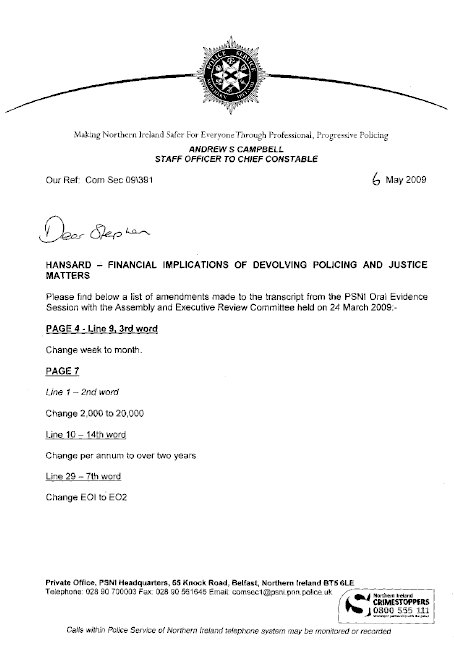
Letter to Justice Committee, Scotland
19 June 2009
Mr Jimmy Spratt MLA
Chairman to Assembly and
Executive Review Committee
c/o Room 428
Parliament Buildings
Stormont Estate
Belfast
BT4 3XX
Bill Aitken MSP
Chairperson
Justice Committee
The Scottish Parliament
Edinburgh
EH99 1SP
19 June 2009
Dear Mr Aitken,
Devolution of Policing and Justice Matters
I am writing to thank you and the Members of your Committee for meeting with the Assembly and Executive Review Committee on 17 June 2009.
The information you have been able to provide to the Committee will be of great assistance to us in our deliberations.
Yours sincerely
Jimmy Spratt
Chairman
Letter to Rt. Hon. Jack Straw, MP, Lord Chancellor
19 June 2009
Mr Jimmy Spratt MLA
Chairman to Assembly and
Executive Review Committee
c/o Room 428
Parliament Buildings
Stormont Estate
Belfast
BT4 3XX
Rt Hon Jack Straw MP
Lord Chancellor
102 Petty France
London
SW1H 9AJ
19 June 2009
Dear Rt Hon Jack Straw,
Devolution of Policing and Justice Matters
I am writing to thank you for meeting with the Assembly and Executive Review Committee on 16 June 2009.
The information you have been able to provide to the Committee will be of great assistance to us in our deliberations.
Yours sincerely
Jimmy Spratt
Chairman
Letter to Justice Committee, Westminister
19 June 2009
Mr Jimmy Spratt MLA
Chairman to Assembly and
Executive Review Committee
c/o Room 428
Parliament Buildings
Stormont Estate
Belfast
BT4 3XX
Rt Hon Sir Alan Beith MP
Chairman
Justice Committee
House of Commons
London
SW1A 0AA
19 June 2009
Dear Hon Sir Alan Beith,
Devolution of Policing and Justice Matters
I am writing to thank you and the Members of your Committee for meeting with the Assembly and Executive Review Committee on 16 June 2009.
The information you have been able to provide to the Committee will be of great assistance to us in our deliberations.
Yours sincerely
Jimmy Spratt
Chairman
Letter to Justice Minister, Scotland
19 June 2009
Mr Jimmy Spratt MLA
Chairman to Assembly and
Executive Review Committee
c/o Room 428
Parliament Buildings
Stormont Estate
Belfast
BT4 3XX
Kenny MacAskill MSP
Minister for Justice
The Scottish Parliament
Edinburgh
EH99 1SP
19 June 2009
Dear Mr MacAskill,
Devolution of Policing and Justice Matters
I am writing to thank you and for meeting with the Assembly and Executive Review Committee on 18 June 2009.
The information you have been able to provide to the Committee will be of great assistance to us in our deliberations.
Yours sincerely
Jimmy Spratt
Chairman
Letter to Solicitor General
19 June 2009
Mr Jimmy Spratt MLA
Chairman to Assembly and
Executive Review Committee
c/o Room 428
Parliament Buildings
Stormont Estate
Belfast
BT4 3XX
Mr Frank Mullholland
Solicitor General
The Crown Office
Edinburgh
EH99 1SP
19 June 2009
Dear Mr Mullholland,
Devolution of Policing and Justice Matters
I am writing to thank you for meeting with the Assembly and Executive Review Committee on 18 June 2009.
The information you have been able to provide to the Committee will be of great assistance to us in our deliberations.
Yours sincerely
Jimmy Spratt
Chairman
Letter to Garda Commissioner
29 June 2009
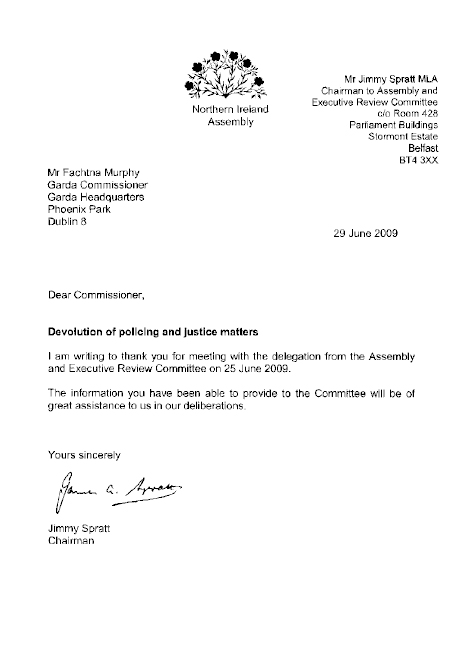
Letter to Justice Committee, Dublin
29 June 2009
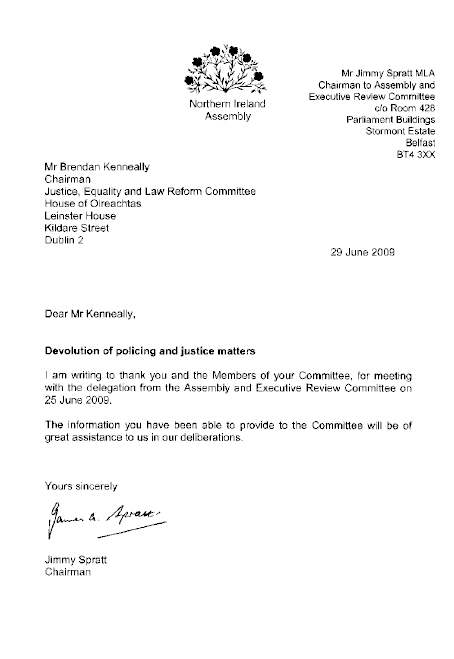
Letter to Justice Minister, Dublin
29 June 2009
Mr Jimmy Spratt MLA
Chairman to Assembly and
Executive Review Committee
c/o Room 428
Parliament Buildings
Stormont Estate
Belfast
BT4 3XX
Mr Dermot Ahern TD
Dáil Office
Dáil Éireann
Leinster House
Kildare Street
Dublin 2
29 June 2009
Dear Mr Ahern,
Devolution of Policing and Justice Matters
I am writing to thank you for meeting with the Assembly and Executive Review Committee on 25 June 2009, it was most informative.
In our meeting the issue of why the Justice Committee does not scrutinize security matters was raised and whether this was based on legislation, standing orders or some other convention. The Committee would appreciate it if you were able to clarify this point.
The information you were able to provide to the Committee will be of great assistance to us in our deliberations.
Yours sincerely
Jimmy Spratt
Chairman
Letter to Mr Richard Barrett
29 June 2009
Mr Jimmy Spratt MLA
Chairman to Assembly and
Executive Review Committee
c/o Room 428
Parliament Buildings
Stormont Estate
Belfast
BT4 3XX
Mr Richard Barrett
Office of the Attorney General
Merrion Street
Dublin 2
29 June 2009
Dear Mr Barrett,
Devolution of Policing and Justice Matters
I am writing to thank you for meeting with the delegation from the Assembly and Executive Review Committee on 25 June 2009.
The information you have been able to provide to the Committee will be of great assistance to us in our deliberations.
Yours sincerely
Jimmy Spratt
Chairman
Letter from Justice Minister, Dublin
20 August 2009
20 August 2009
Mr Jimmy Spratt MLA
Chairman
Assembly and Executive Review Committee
c/o Romm 428
Parliament Buildings
Stormont Estate
Belfast
BT4 3XX
Dear Mr Spratt,
I write in reply to your recent letter, following the meeting the Garda Commissioner and I held with your Committee on 25 June 2009. I hope the Committee found its visit to be a useful exercise. For my part I was delighted to be able to engage with it on matters of mutual interest.
Among the various issues raised by your Committee colleagues was the question of Oireachtas Committee scrutiny of justice and policing matters and the questioning in this regard of me as Minister and of the Garda Commissioner. As discussed in our meeting, the Commissioner and I normally meet separately with the Joint Committee on Justice, Equality, Defence and Women’s Rights (the Justice Committee), to discuss issues relevant our respective roles.
The principal functions of the Justice Committee are to consider Bills, Estimates for Public Services, the terms of any relevant international agreements and related matters. Naturally the members of the Committee will take the opportunity of the Minister’s or Commissioner’s presence to explore wider issues within the justice area.
In relation to the specific issue of national security, I can confirm that it is not normal for Oireachtas Committees to question closely either the Commissioner or myself on the detail of such matters. While the handling of such matters is not specifically dealt with by the Committee’s terms of reference (copy enclosed), these do state that the Committee “shall refrain from inquiring into in public session, or publishing confidential information regarding, any such matter if so requested either by the body concerned or by the Minister for Justice, Equality and Law Reform or the Minister for Defence." In reality the Committee, aware of the very sensitive nature of some of the areas of responsibility assigned to the Garda Commissioner and Minister for Justice, Equality and Law Reform, avoid detailed questioning on such matters. Operational matters are, understandably, exclusively within the competence of the Garda Commissioner and policy decisions are for the Minister (and the Government) to take. Having said this, it would of course not be unusual, where a pressing matter of national security arises, to provide, confidentially, some briefing to the leaders or Justice spokespersons of the main opposition parties on the matter.
I hope you find this helpful and wish you every success in your deliberations. I am very much looking forward to working with a Northern Ireland Minister of Justice in the near future.
With kind regards,
Yours sincerely,
Mr Dermot Ahern TD
Minister for Justice, Equality and Law Reform
Letter from Rt. Hon. Lord Ashdown
12 September 2009
The Strategic Review of Parading
Enterprise House
55-59 Adelaide Street
Belfast
BT2 8FE
028 9072 6136
Email: mark.mccaffrey@srpb.org.uk
Mr Jimmy Spratt MLA
Chairman of the Assembly and
Executive Review Committee
c/o Room 428
Parliament Buildings
Stormont Estate
Belfast
12 November 2009
Dear Mr. Spratt,
Thank you very much for your kind invitation to appear before the Assembly and Executive Review Committee. I am very pleased to be asked to attend the Committee, though it does place me in a rather difficult position as I have tried to outline below.
Firstly, as I know you are aware, in this matter I would be giving views not as an individual, but on behalf of the Strategic Review of Parading Body, as its Chairman. I would therefore feel obliged to take the views of the members of the Body before giving a substantive reply to your kind invitation.
The issue of parading is, as you know, very complex and sensitive and the Review Body has therefore followed the principle of having a very wide consultation in its work. As part of that consultation the Review Body also published an Interim Report outlining some of the thinking within the Group. Our work has taken the form of two formal rounds of consultation and many bi-lateral meetings with interested parties across Northern Ireland. It has also included, of course, all the political parties represented in the Assembly, who have therefore, I believe, been kept very well up to date with our progress and are fully aware of the details of our likely proposals.
Secondly, we are now at a crucial stage in the review process as the members discuss and finalise the recommendations in our report. Until those discussions have been completed I would not be able to give detailed answers to the Committee. This would leave me in the position, as the Review Body’s Chairman, where, in most cases I would have to respond to questions with “I fear that at the moment, there is no agreed answer to that question", or words to that effect. My worry, as I am sure you will appreciate, is that this would not only prove unhelpful to your Committee, but also might be irksome to them and could even be taken by some to be an indication of lack of respect for the very important function that the Committee carries out – and I would not wish this to happen.
However, I will take the views of the Review Body, who may be able to offer ways round this dilemma and will write to you again in the near future as soon as I have done this.
Please thank your Committee for their kind invitation.
Yours sincerely,

Lord Ashdown
Memo from Committee on Procedures
21 September 2009
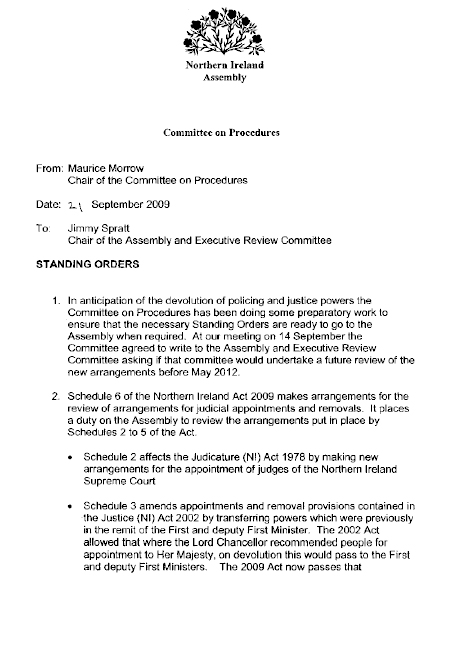
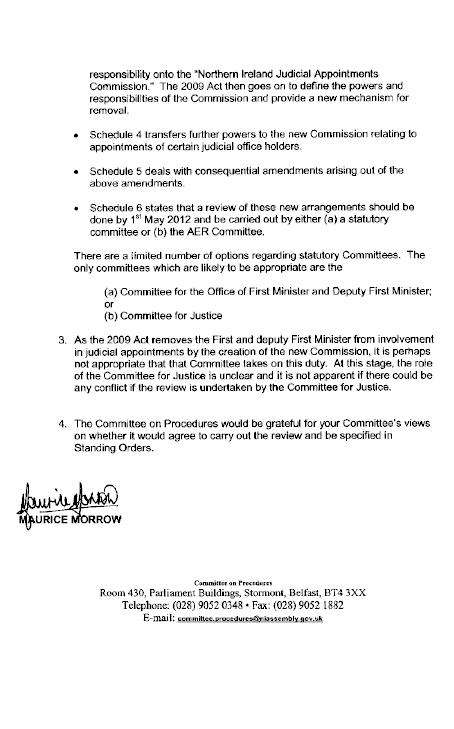
Letter to Committee on Procedures
22 September 2009
Mr Jimmy Spratt
Chairperson of the Assembly and
Executive Review Committee
c/o Room 428
Northern Ireland Assembly
Parliament Buildings
Stormont Estate
Belfast
BT4 3XX
22 September 2009
Dear Lord Morrow,
Thank you for your memo of 21 September 2009, which was given initial consideration by the Assembly and Executive Review Committee when it met on 22 September 2009. Members agreed to reflect on your request and discuss the matter further on 29 September 2009.
Your memo prompted Members to ask that I write to you to suggest it would be helpful if you were to provide an update on the development of relevant Standing Orders which would be required in circumstances where the Assembly agreed that the First Minister and deputy First Minister should request the transfer of a range of policing and justice powers.
Yours sincerely,
Mr Jimmy Spratt
Chairman
Letter to NI Policing Board
30 September 2009
Mr Jimmy Spratt
Chairperson of the Assembly and
Executive Review Committee
c/o Room 428
Northern Ireland Assembly
Parliament Buildings
Stormont Estate
Belfast
BT4 3XX
Mr Barry Gilligan
Chairman
NI Policing Board
Waterside Tower
31 Clarendon Road
Clarendon Dock
Belfast
BT1 3BG
30 September 2009
Dear Barry,
Financial Implications of the Devolution of Policing and Justice Matters
As you know, the Assembly and Executive Review Committee appointed a Specialist Adviser to assist with its consideration of the financial implications of the devolution of policing and justice matters. At a meeting, in ‘closed session’ yesterday, Victor Hewitt presented an updated paper on ‘financial pressures’ to the Committee. The revised paper results from work done, in conjunction with DFP, to reconcile figures.
During the presentation, Members identified the need for further information on two particular pressures, and which relate to the policing budget. In this regard, the Committee agreed that I should write to you, and the Secretary of State, to seek additional information and clarity on these pressures.
Destruction of DNA
The Specialist Adviser identifies an inescapable pressure of some £11m in the current CSR period, and a further £3m in the period beyond, which is considered to be required as a consequence of a ruling by the European Court. The Committee would welcome confirmation as to the accuracy of this figure, together with details of how DNA is to be destroyed and how the cost of achieving this has been calculated.
Training College
As is the case with the destruction of DNA, the Committee acknowledges the difficulties in speculating on pressures outside the current CSR period. Nevertheless Members are keenly interested to know if a £72m pressure for a Training College – in the post CSR period - is accurate; whether, or not, that is the total capital and recurrent figure required for the policing element of the contribution (and, if so, how that is broken down); or if the figure represents only the overall total capital cost of the project and, if that is the case, what would be the projected capital costs, and what would be the projected running costs to be apportioned to the policing budget.
As well as copying this letter to the Secretary of State, for the purposes of asking him for his observations and comments, I have copied it to the Office of the First Minister and the Deputy First Minister for information.
Given the sensitivities surrounding the financial implications of devolution, I would ask you, and others, to respect the confidential nature of this letter. However, I should point out that it, and any responses, may be declassified, and published, in due course, as part of the Committee’s Second Report on the Arrangements for the Devolution of Policing and Justice Matters.
I appreciate that you may find it necessary to consult with the Chief Constable and, should that be the case, I would be grateful if you were to highlight the confidential nature of this issue to him.
Yours sincerely

Jimmy Spratt
Chairman
Letter to NI Policing Board
7 October 2009
Mr Jimmy Spratt
Chairperson of the Assembly and
Executive Review Committee
c/o Room 428
Northern Ireland Assembly
Parliament Buildings
Stormont Estate
Belfast
BT4 3XX
Mr Barry Gilligan
Chairman
NI Policing Board
Waterside Tower
31 Clarendon Road
Clarendon Dock
Belfast
BT1 3BG
7 October 2009
Dear Barry,
Financial Implications of the Devolution of Policing and Justice Matters
The Assembly and Executive Review Committee met yesterday, to continue its consideration of the devolution of policing and justice matters and I was asked to request an urgent response to my letter of 30 September 2009 (attached) in order to allow the Committee to conclude its consideration of the financial implications of devolving and policing and justice powers.
Yours sincerely
Jimmy Spratt
Chairman
Letter from James H Allister QC
7 October 2009

Ref: JA/SM/Gen/4456
Mr Stephen Graham
Committee Clerk
Assembly and Executive Review Committee
Room 428
Parliament Buildings
Stormont
Belfast
BT4 3XX
7th October 2009
Dear Mr Graham,
By way of response to the Department of Justice Bill, Traditional Unionist Voice (TUV) makes it clear that we reject the devolution of policing and justice powers to an Executive and Assembly in which IRA/Sinn Fein holds sway. Sinn Fein’s IRA murdered hundreds of policemen and several members of the judiciary. Sinn Fein has yet to repudiate or denounce any of those murders, or assist in bringing the perpetrators to justice; rather it regularly wallows in the glorification of such brutal terrorism. Thus devolving policing and justice powers to an Executive and Assembly in which the party of the IRA, which still retains the wicked Army Council which sanctioned those murders, is obscene.
Given that every cross-cutting issue requires Executive approval Sinn Fein will exercise a veto on every key policing and justice decision of that nature, which includes every decision with financial implications. Thus, de facto, Sinn Fein will have the capacity to meddle in policing and justice issues. This falls far short of the promise of the DUP that such powers would be perpetually ring fenced from the malevolent reach of IRA/Sinn Fein.
In consequence TUV rejects this Bill, recognising it as the product of a shabby deal between the DUP and Sinn Fein which advances the key republican objective of wrenching policing and justice from British control.
Moreover, the 2012 sunset clause arising from the Northern Ireland Act 2009 both imbues the interim department with instability and proffers IRA/Sinn Fein another opportunity to extract more concessions on this vital subject. In consequence this is ‘sticky plaster’ legislation motivated to ease the crisis of the moment but with no contribution to the stability of the future.
Finally, given the utter failure and non-delivery of the dysfunctional Executive, bestowing more powers on such a failed entity as Belfast Agreement devolution is utter folly, particularly powers as sensitive and significant as control over policing and justice.
Yours sincerely,

James H Allister QC,
TUV leader
139 Holywood Road
Belfast
BT4 3BE
T: (028) 9065 5011
F: (028) 9065 4314
E: info@tuv.org.uk
Letter from NI Policing Board
9 October 2009
Barry Gilligan
Chairman
Date: 9 October 2009
Mr Jimmy Spratt MLA
Chairman
Assembly & Executive Review Committee
c/o Room 428
Parliament Buildings
Stormont Estate
Belfast
Dear Jimmy
Financial Implications of the Devolution of Policing and Justice Matters
Thank you for your letter dated 7 October 2009. Since receiving your previous letter dated 30 September 2009, Board and PSNI officials have been liaising in order to provide you with the information requested. You will appreciate from our point of view that we need to take time to consider this matter properly to ensure that the information provided is accurate.
The Chief Executive has informed me that, having consulted with the PSNI, we should be in a position to respond to you around the middle of next week.
I hope that this is timely enough for you, and I appreciate the urgent need for the information.
Yours sincerely

B C GILLIGAN
Chairman
cc: Chief Executive
Director of Corporate Services
Letter from NI Policing Board
14 October 2009
Barry Gilligan
Chairman
Date: 14 October 2009
CONFIDENTIAL
Mr Jimmy Spratt MLA
Chairman
Assembly & Executive Review Committee
c/o Room 428
Parliament Buildings
Stormont Estate
Belfast
Dear Chairman
FINANCIAL IMPLICATIONS OF THE DEVOLUTION OF POLICING AND JUSTICE MATTERS
Thank you for your letter dated 30 September 2009. Having considered the issues you have raised, I would respond as follows:
Destruction of DNA
You have outlined that your Specialist Advisor identified an inescapable pressure of some £11m in the current CSR period, and a further £3m in the period beyond, which is considered to be required as a consequence of a ruling by the European Court, and you have requested confirmation as to the accuracy of this figure, together with details of how DNA is to be destroyed and how the cost of achieving this has been achieved.
I am advised by the Acting Assistant Chief Constable responsible for the PSNI’s Criminal Justice Department that responsibility for taking this issue forward does not lie solely with the PSNI, but also with the Government. Once the Government makes a decision as to the policy regarding DNA and fingerprint retention, the PSNI will move forward to implement any changes. It is not possible to be specific about costs at this time, but I am certain that implementation will have a significant cost associated with it, both in financial and staffing terms. The scale of the costs will relate directly to the scope of the destruction and retention policy approved by the Government.
I am unable to comment on the figures identified by your Specialist Advisor. It is my understanding that these figures were estimated by the NIO on the basis that the policy is still being determined and they may be able to advise further.
Training College Budget
The original budget for the then Police Service College was £90m. The Government, at that time, had undertaken to ring-fence the total amount. The project subsequently widened and became a Public Services College, including the Fire & Rescue Service and the Prison Service. The budget commitment from each was estimated as:
- PSNI – £90m
- Fire & Rescue Service – £30m
- Prison Service – £10m
Two years ago, during the submission’s process relating to the current CSR period, the Government informed PSNI that £38m of the original budget of £90m would have to be applied for as part of the next CSR period, commencing 2011. Thus, PSNI made a submission of £38m capital, plus a £7m potential shortfall in disposal receipts relating to Garnerville and Steeple training complexes, amounting to a total of £45m in capital. Subsequent professional advice has valued the potential shortfall in disposal receipts at £8m, given the current market decline in property values. In addition, an estimated revenue running cost of £5m per annum was submitted for the years 2011/12, 2012/13 and 2013/14, totalling £15m revenue.
PSNI has worked on the assumption that the capital budget of £52m (£90m-£38m) in the current CSR period can be carried forward into the new CSR period, if required. The position is as follows:
- Bid in next CSR period – £38m
- Capital shortfall in receipts – £8m
- Revenue – £15m
Total: £61m
Any capital underspend in the current CSR period which is carried forward should also be added. The estimated capital spend for 2009/10 is £3m, and for 2010/11 is £15m, leaving an estimated carry forward of £34m (£52m - £18m). If the capital spend of £15m for 2010/11 was delayed, the carry forward required will be £49m (£34m plus £15m).
In summary, the total potential bid is either £95m (£61m plus £34m carry forward), if the project moves forward according to plan, or up to £110m (£61m plus £49m carry forward) if capital spend for 2010/11 is delayed and an increased carry forward is required.
I hope that this provides the Committee with the further information that they require in relation to the two particular pressures on the policing budget. If you have any further questions or require further clarification on any point, please contact me.
Yours sincerely

B C GILLIGAN
Chairman
Letter from The Bar Council
13 October 2009
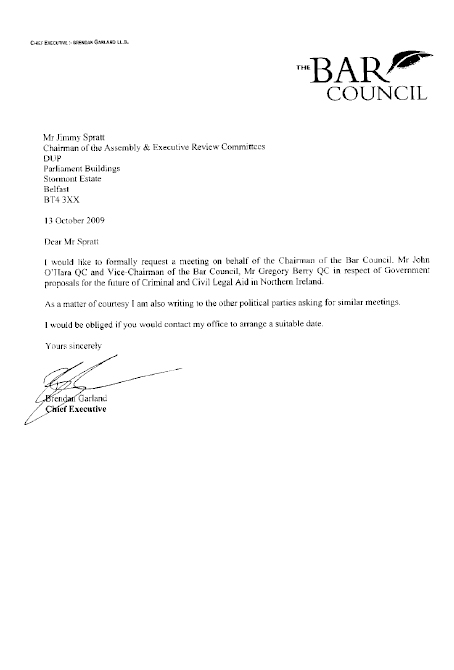
Memo from Committee on Procedures
19 October 2009
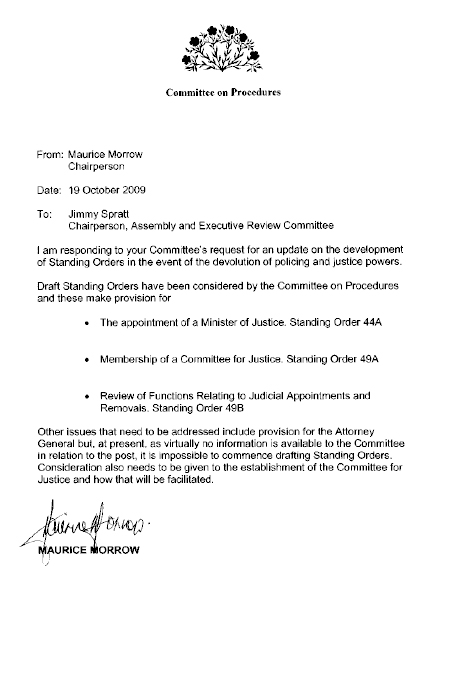
Letter to
Economic Research Institute, Northern Ireland
20 October 2009
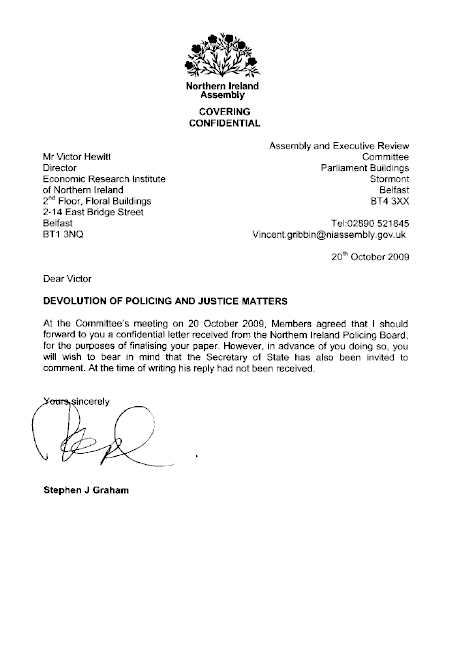
Letter to The Bar Council
26 October 2009
Mr Jimmy Spratt MLA
Chairman to Assembly and
Executive Review Committee
c/o Room 428
Parliament Buildings
Stormont Estate
Belfast
BT4 3XX
26 October 2009
Dear Mr O’Hara,
I refer to your letter of 13 October 2009. At its meeting of 20 October 2009, the Assembly and Executive Review Committee considered your request for a meeting to discuss Criminal and Civil Legal Aid. The Committee took the view that your request was more suited to consideration by individual Political Parties and therefore, the Committee, have decided not to arrange a meeting with you at this time.
Yours sincerely,

Mr Jimmy Spratt
Chairman
Letter to NI Policing Board
26 October 2009
Mr Jimmy Spratt MLA
Chairman to Assembly and
Executive Review Committee
c/o Room 428
Parliament Buildings
Stormont Estate
Belfast
BT4 3XX
26 October 2009
Mr Barry Gilligan
Chairman
NI Policing Board
Waterside Tower
31 Clarendon Road
Clarendon Dock
Belfast
BT1 3BG
Dear Barry,
Financial Implictions of the Devolution of Policing and Justice Matters
Thank you for your letter dated 14 October 2009.
The information that you have been able to provide will be of great assistance to the Committee as it continues its deliberations into the financial implications of the devolution of policing and justice matters.
Yours sincerely

Jimmy Spratt
Chairman
Letter to the First Minister and deputy First Minister
26 October 2009
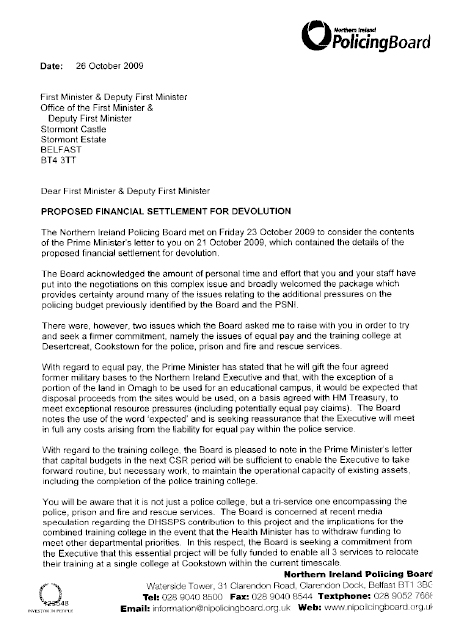

Letter to Committee on Procedures
26 October 2009
Mr Jimmy Spratt MLA
Chairman to Assembly and
Executive Review Committee
c/o Room 428
Parliament Buildings
Stormont Estate
Belfast
BT4 3XX
26 October 2009
Dear Lord Morrow,
Thank you for your memo of 19 October 2009, which was noted by the Assembly and Executive Review Committee when it met on 20 October 2009.
Yours sincerely,

Jimmy Spratt
Chairman
Letter to Minister for Finance and Personnel
3 November 2009
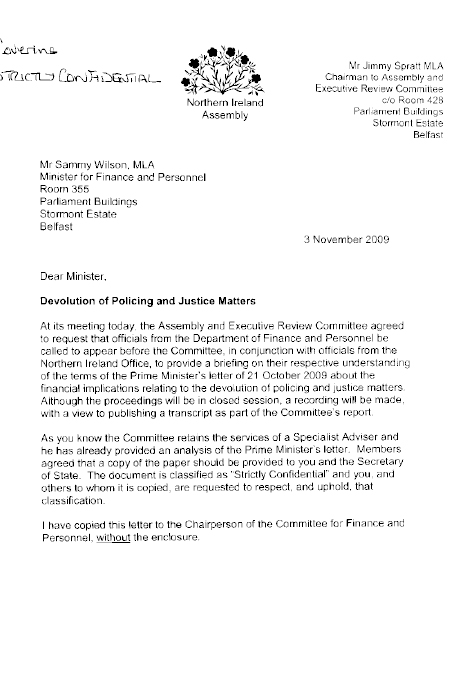

Letter to John Larkin, QC
4 November 2009
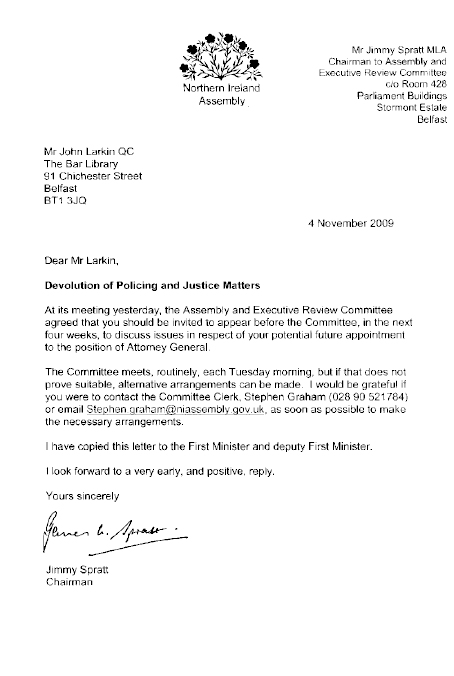
Letter to Rt. Hon. Lord Ashdown
4 November 2009
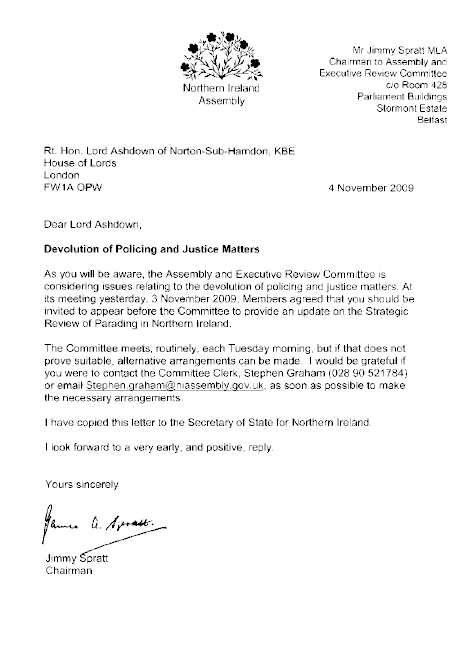
Letter to Minister for Finance and Personnel
9 November 2009
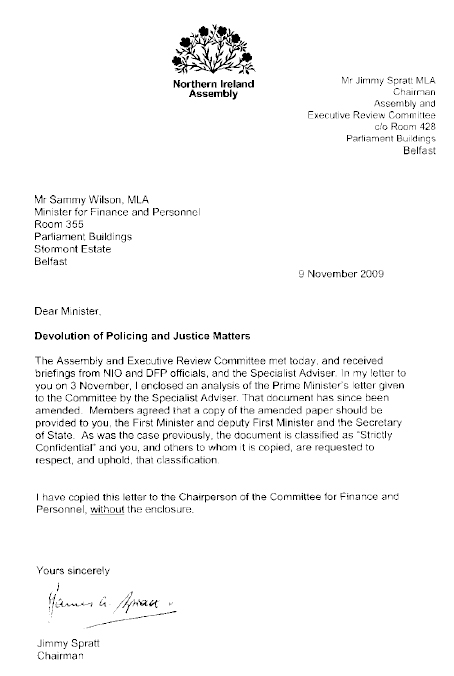
Memo from
Clerk to the Committee for Finance & Personnel
20 November 2009
Committee for Finance and Personnel
Room 419
Parliament Buildings
Tel: 028 9052 1843
From: Shane McAteer, Clerk to the Committee for Finance and Personnel
Date: 20 November 2009
To: Stephen Graham
Clerk to the Assembly and Executive Review Committee
Budgetary Considerations and the Devolution of Policing and Justice
At its meeting on 18 November 2009, the Committee for Finance and Personnel agreed to seek clarification as to the remit of the Assembly and Executive Review Committee in respect of financial matters relating to the devolution of policing and justice powers to the Assembly and also to request an update on work being undertaken in this regard.
I would be grateful if you could bring this request to the Committee.
Shane McAteer
Tel: 21843
Letter from John Larkin QC
30 November 2009
John F Larkin QC
Bar Library
91 Chichester Street
Belfast BT1 3JQ
Jimmy Spratt Esq MLA
Chairman
Assembly and Executive Review Committee
Room 428
Parliament Buildings
Stormont
BELFAST
BT4 3XX 30 November 2009
Devolution of Policing and Justice Matters
Thank you for your letter of 4 November in which you invited me to attend the Committee to discuss my potential future role as Attorney General for Northern Ireland.
I am willing to give the Committee every assistance. Earlier this year I was commissioned to scope the role of the Attorney and his Office by the First Minister and deputy First Minister. What I should want to say to the Committee would be based on the accepted recommendations in that report, but I feel I need to wait until the First Minister and deputy First Minister have had an opportunity to feed back on those recommendations, since the report was commissioned by and addressed to them.
Having said that, I do expect to hear from OFMDFM shortly. I shall keep in touch with the Clerk to the Committee about developments, with a view to attending the Committee at the earliest opportunity at which I can give it a meaningful picture of the implications of the appointment of a local Attorney General.
John F Larkin QC
Memo to the
Committee for Finance and Personnel
1 December 2009
To: Shane McAteer, Clerk to the Committee for Finance and Personnel
From: Stephen J Graham
Committee Clerk
Date: 1 December 2009
Tel: (905)21784 or 07767 271401
Budgetary considerations and the devolution of policing and justice
Introduction
Thank you your memo of 20 November 2009, requesting clarification on the remit of the Assembly and Executive Review Committee’s consideration of the financial implications of the devolution of policing and justice matters and for an update on its progress. I have set out below, the genesis of the Committee’s remit for this work; the work carried out and the Committee’s current position.
Summary
The Committee’s remit for looking at budgetary considerations is part of a wider remit to report to the Assembly on the further arrangements for the devolution of policing and justice matters.
The Committee’s Remit
Section 18 (1) of the Northern Ireland (St Andrews Agreement) Act 2006[1] required the Northern Ireland Assembly to make a report, to the Secretary of State, before 27 March 2008. On 22 May 2007, the Assembly and Executive Review Committee agreed to table a motion seeking the agreement of the Assembly for the Committee to undertake the work of preparing a report on progress towards devolution of policing and justice matters. This was agreed by the Assembly on 4 June 2007.
The subsequent report was debated in a plenary session of the Assembly on Tuesday 11 March 2008.
On 23 September 2008, the Assembly resolved:[2]
“That, in accordance with Standing Order 59(4)(b), this Assembly refers the following matters to the Assembly and Executive Review Committee: a review of progress on the implementation of the recommendations of, and the resolution of outstanding issues identified in, the Report on the Inquiry into the Devolution of Policing and Justice Matters (22/07/08R); and consideration of any other matter relating to the devolution of policing and justice matters."
Progress on the Consideration of Financial Implications
In its First Report on the Arrangements for the Devolution of Policing and Justice Matters, published and debated on 20 January 2009, the Committee indicated that it proposed to report on the financial implications of devolving policing and justice matters in a second report.
On 13 January 2009, and after a tendering exercise was finalised, the Committee appointed Mr Victor Hewitt, Director of the Economic Research Institute of Northern Ireland (ERINI) as a Specialist Adviser who would assist the Committee with its work on financial related matters.
The Committee sought written submissions, and called on a number of organisations to provide oral evidence. After the evidence sessions and follow up questions from the Committee, the Specialist Adviser, at the Committee’s meeting on 28 April 2009, presented his analysis of the written and oral evidence structured as follows:
- Outline of the resource budgets of the organisations;
- Highlighting budget pressures;
- Assessment of the budget pressures in terms of their priority; and
- The effect of the Barnett formula on the resources available for policing and Justice in future years and the potential to use the Regional Rate as a source of resource.
Over the months of May and June, the Committee continued to consider the financial issues, providing further information to the Specialist Adviser and presenting the work of the Specialist Adviser to the First Minister and deputy First Minister in closed session on 29 June 2009. At this meeting the Committee agreed with the First Minister and deputy First Minister that the Specialist Adviser should corroborate his figures with those of the NIO and the Department of Finance and Personnel.
After the Summer Recess, the Committee considered revised analyses from the Specialist Adviser as a result of his engagement with the NIO and the Department of Finance and Personnel. The letter from the Prime Minister to the First Minister and deputy First Minister regarding the Financial Settlement on Policing and Justice in Northern Ireland, dated 21 October 2009, sets out details of the financial package.
Current Position
The Committee is of the opinion that it has collated, reviewed and analysed all the relevant financial information needed for its Second Report. The next stage is to include reference to this work in a report to the Assembly.
Stephen J Graham
Committee Clerk
[1] http://archive.niassembly.gov.uk/transitional/info_office/Act.pdf
[2] Northern Ireland Assembly, 23 September 2009.
Letter from John Larkin QC
7 December 2009
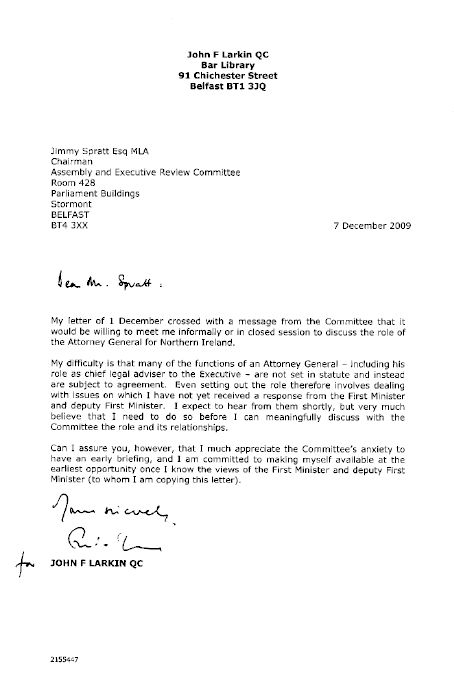
Letter from NI Affairs Committee
16 December 2009
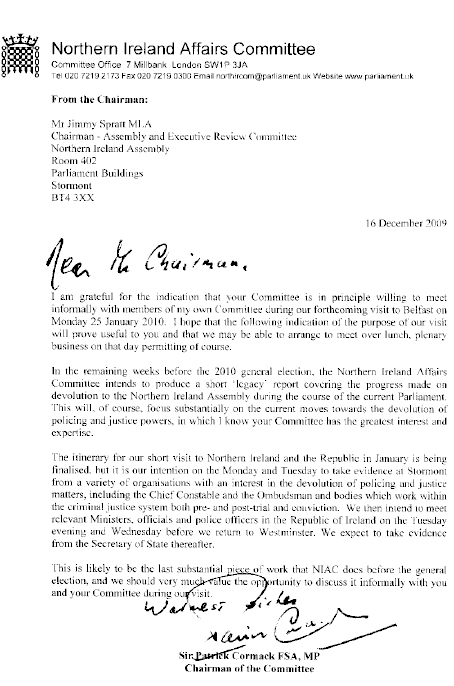
Memo to Committee on Procedures
13 January 2010
To: Mairead Mageean
Clerk, Committee on Procedures
From: Stephen J Graham
Clerk, Assembly and Executive Review Committee
Date: 13 January 2010
Tel: 21784
Devolution of Policing and Justice Matters
The Assembly and Executive Review Committee met yesterday to continue its consideration of matters relating to the devolution of policing and justice.
At the meeting, Members were briefed by NIO officials on the draft Concordat between Her Majesty’s Government and the Northern Ireland Executive on the Independence of the Public Prosecution Service. Members agreed that this document should be referred to the Committee on Procedures for information.
NIO officials undertook to consider comments made by Members of the Assembly and Executive Review Committee and a revised draft of the Concordat will be submitted for further consideration in due course.
Stephen J Graham
Committee Clerk
Memo from Committee on Procedures
14 January 2010
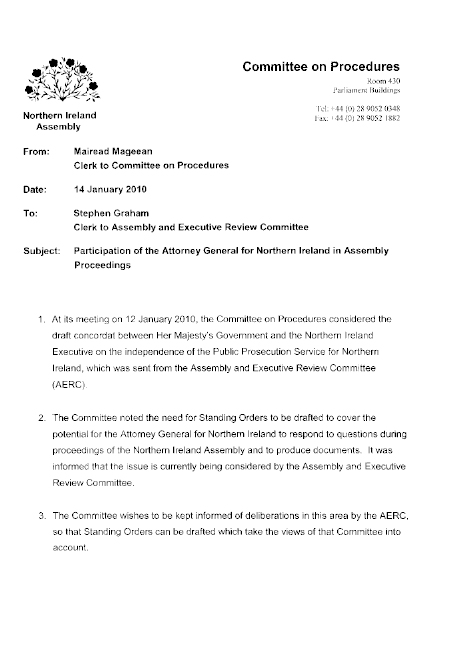

Letter from Rt. Hon. Lord Ashdown
28 Janaury 2010
|
Mr Jimmy Spratt MLA |
The Strategic Review of Parading 028 9072 6136 |
28th January 2010
Dear Mr. Spratt,
In my letter dated, 12 November 2009, I promised to write to you after I had taken the views of the Review Body members regarding your kind invitation
to appear before the Assembly and Executive Review Committee.
As I explained in my previous correspondence, as Chairman of the Strategic Review of Parading Body, I felt obliged to take the views of the members before giving a substantive reply. I have now had the opportunity to correspond with the members.
At present work on our final report is continuing and a key aspect of that work is that the Review Body have adopted the principle that nothing is agreed until everything is agreed – which means, of course, that, at this moment nothing is agreed. Therefore were I to accept your invitation to appear before the Committee I would have to adopt this key principle which would mean my responses to your questions , as the Review Body’s Chairman, would be “I fear that at the moment, there is no agreed answer to that question", or words to that effect.
As outlined in my previous letter my worry, as I am sure you will appreciate, is that this would not only prove unhelpful to your Committee, but also might be irksome to them and could even be taken by some to be an indication of lack of respect for the very important function that the Committee carries out – and I would not wish this to happen.
I would like to thank you and the Committee for your kind invitation but, at this time, I must respectfully decline your offer.
Yours sincerely,

Lord Ashdown
Letter to Committee on Procedures
9 February 2010
Mr Jimmy Spratt MLA
Chairman to Assembly and
Executive Review Committee
c/o Room 428
Parliament Buildings
Stormont Estate
Belfast BT4 3XX
9 February 2010
Dear Lord Morrow,
The Assembly and Executive Review Committee met today and discussed the Category Two List of Issues in relation to the Devolution of Policing and Justice Matters.
I have attached the Category Two List of Issues at Appendix 1, and would be grateful if you could let me know what work the Committee on Procedures plan to take forward in relation to any or all of these matters.
Yours sincerely
Jimmy Spratt
Chairman
Memo to Committee on Procedures
18 February 2010
To: Mairead Mageean
Clerk, Committee on Procedures
From: Stephen J Graham
Clerk, Assembly and Executive Review Committee
Date: 18 February 2010
Tel: 21784
Devolution of Policing and Justice Matters
Further to your enquiry about draft standing order 49A, which has been developed as a consequence of a recommendation by the Assembly and Executive Review Committee in relation to the arrangements for the devolution of policing and justice matters, I am writing to confirm that at its meeting yesterday the Committee agreed, for completeness, that the provisions of the draft standing order should be extended to prevent members of the Belfast District Policing Partnerships Sub-Groups from holding simultaneous membership of the Justice Committee.
Stephen J Graham
Committee Clerk
Appendix 8
Recommendations from the Report on the Inquiry into the Devolution of Policing and Justice Matters – 22/07/08R
Summary of Recommendations
Recommendation 1
The Committee recommends that the matters specified in the NIO Discussion Paper (February 2006) be regarded as the policing and justice matters which are currently reserved matters under Schedule 3 of the Northern Ireland Act 1998.
Recommendation 2
The Committee recommends that those matters in paragraphs 9(a) & (b) of Schedule 3 to the Northern Ireland Act 1998 be transferred.
Recommendation 3
The Committee recommends that those matters in paragraph 9(c) of Schedule 3 to the Northern Ireland Act 1998 be transferred.
Recommendation 4
The Committee recommends that those matters in paragraph 9(d) of Schedule 3 to the Northern Ireland Act 1998 be transferred.
Recommendation 5
The Committee recommends that those matters in paragraph 9(e) of Schedule 3 to the Northern Ireland Act 1998 be transferred.
Recommendation 6
The Committee recommends that those matters in paragraph 9(g) of Schedule 3 to the Northern Ireland Act 1998 be transferred.
Recommendation 7
The Committee recommends that those matters in paragraph 9(h) of Schedule 3 to the Northern Ireland Act 1998 be transferred.
Recommendation 8
The Committee recommends that those matters in paragraph 9A of Schedule 3 to the Northern Ireland Act 1998 be transferred.
Recommendation 9
The Committee recommends that either before, or following, devolution of the range of policing and justice matters identified in this report, the Assembly should conduct a review of those matters relating to the ‘Public Processions (Northern Ireland) Act 1998’, and having regard to the outcome of the ‘Strategic Review of Parading’, should consider if, and when, they should be transferred.
Recommendation 10
The Committee recommends that those matters in Paragraph 10 of Schedule 3 to the Northern Ireland Act 1998, other than those relating to the Public Processions (Northern Ireland) Act 1998, be transferred.
Recommendation 11
The Committee recommends that those matters in paragraph 11 of Schedule 3 to the Northern Ireland Act 1998, other than those relating to ‘50:50 temporary recruitment provisions’, be transferred.
Recommendation 12
The Committee recommends that either before, or following, the devolution of the range of policing and justice matters identified in this report, those matters relating to ‘50:50 temporary recruitment provisions’ should be reviewed to determine if, and when, they should be transferred.
Recommendation 13
The Committee recommends that those matters in paragraph 12 of Schedule 3 to the Northern Ireland Act 1998, relating to health and safety aspects of explosives, and policy development, legislation and general oversight of ‘non-prohibited’ firearms be transferred.
Recommendation 14
The Committee recommends that those matters in paragraphs 14A, 15 and 17 of Schedule 3 to the Northern Ireland Act 1998 be transferred.
Recommendation 15
The Committee recommends that those matters in paragraph 15A of Schedule 3 to the Northern Ireland Act 1998 be transferred.
Recommendation 16
The Committee recommends that those matters in paragraph 11A of Schedule 3 to the Northern Ireland Act 1998 be transferred.
Recommendation 17
The Committee recommends that particular administrative arrangements relating to extradition and mutual legal assistance should be exercised by the Northern Ireland Minister/s.
Recommendation 18
The Committee recommends that there should be a single department that will exercise powers in relation to policing and justice matters.
Recommendation 19
The Committee recommends that the political parties commit to further discussions to produce recommendations on the ministerial model to be adopted and the method by which the Assembly would make the ministerial appointment/s and that it will be necessary for these discussions to take place before the devolution of policing and justice matters.
Recommendation 20
The Committee recommends that the political parties commit to further discussions to produce recommendations on how any new department, which will exercise responsibility for policing and justice powers, might be accommodated in the Executive and that it will be necessary for these discussions to take place before the devolution of policing and justice matters.
Recommendation 21
The Committee recommends that preparations for the appointment of an Attorney General for Northern Ireland should be taken forward by the First Minister and deputy First Minister before the devolution of policing and justice matters.
Recommendation 22
The Committee recommends that the post of Attorney General should be a full time role, at least initially.
Recommendation 23
The Committee recommends that the following organisations should transfer, as proposed, to the new Department, on a without prejudice basis.
- Northern Ireland Prison Service (as an Agency)
- Forensic Science Northern Ireland (as an Agency)
- Youth Justice Agency (as an Agency)
- Compensation Agency (as an Agency)
- Police Service of Northern Ireland
- Northern Ireland Police Fund (as an Executive NDPB and Company Limited by Guarantee)
- RUC George Cross Foundation (as an Executive NDPB)
- Independent Assessor for PSNI Recruitment Applications (as an Advisory NDPB)
- Criminal Injuries Compensation Appeals Panel (as a Tribunal NDPB)
- Police Rehabilitation and Training Trust (as a Company limited by guarantee)
- Independent Monitoring Boards (Maghaberry, Magilligan and Hydebank Wood) (Independent Monitoring Boards)
- Prisoner Ombudsman (as an Independent Statutory Office holder)
- Life Sentence Review Commissioners (as Independent Statutory Office holders)[1]
- Commissioner for Hearings under Prison Rule 109B (Loss of Remission Commissioner)(as an Independent non-Statutory Office holder)
- The State Pathologist (employed by the Department)
- Medical Appeals Tribunal (Ad hoc Tribunal)
- Judicial Appointments Ombudsman (as an Independent Statutory Office holder)[2]
Recommendation 24
The Committee recommends that the organisations listed below should transfer as proposed, on a without prejudice basis.
- Public Prosecution Service (as a Non-Ministerial Department)
- Northern Ireland Policing Board (as an Executive NDPB)
- Office of the Police Ombudsman (as an Executive NDPB)
- Criminal Justice Inspection Northern Ireland (as an Executive NDPB)
- Probation Board (as an Executive NDPB)
- NI Law Commission (as an Advisory NDPB)
- Northern Ireland Court Service (as an Agency)
- NI Legal Services Commission (as an Executive NDPB)
- Judicial Appointments Commission (as an Executive NDPB)
Recommendation 25
The Committee recommends the need for the Assembly to develop, and approve, in due course, a Standing Order that will require, and allow, the Attorney General to report to the Assembly.
Recommendation 26
The Committee recommends that the Assembly should review whether there is merit in the Public Prosecution Service being attached to the Department with responsibility for policing and justice matters, and should consider what the implications would be for the structure of the Public Prosecution Service.
Recommendation 27
The Committee recommends that the independence of the PPS and its accountability to the Assembly should be examined before, and following, the devolution of policing and justice matters to produce recommendations which would, in turn, be considered by the Assembly.
Recommendation 28
The Committee recommends that members of the Statutory Committee for any new department which would exercise functions relating to policing and justice matters, should not sit, simultaneously, on either the Policing Board or any District Policing Partnership.
Recommendation 29
The Committee recommends that the matters relating to appointments to the Policing Board should be examined further after the devolution of policing and justice matters.
Recommendation 30
The Committee recommends that the matters relating to appointments to the Office of the Police Ombudsman should be examined by the political parties, initially, before the devolution of policing and justice matters.
Recommendation 31
The Committee recommends that the NIO should make arrangements to have draft reports of the Criminal Justice Inspection submitted to the Assembly, and that the other matters raised by Criminal Justice Inspection Northern Ireland should be examined, initially, before the devolution of policing and justice matters.
Recommendation 32
The Committee recommends that the matters relating to the future status of the Probation Board should be examined further after the devolution of policing and justice matters.
Recommendation 33
The Committee recommends that the matters raised by the NI Law Commission should be examined further after the devolution of policing and justice matters.
Recommendation 34
The Committee recommends that the matters raised by the NI Legal Services Commission should be examined further after the devolution of policing and justice matters.
Recommendation 35
The Committee recommends that matters relating to the independence, governance and accountability of the Court Service be examined further, as a matter of priority, after the devolution of policing and justice matters.
Recommendation 36
The Committee recommends that policy advice and legislative support in relation to legal aid should be transferred from the Court Service to the new Department which will exercise responsibility for policing and justice matters.
Recommendation 37
The Committee recommends that a protocol should be put in place between the Judicial Appointments Commission and the Office of the First Minister and deputy First Minister regarding judicial appointments.
Recommendation 38
The Committee recommends that the NIO and OFMdFM should take forward work to ensure that current agreements should remain in place at the point of devolution and that these should be reviewed by the Department and the Statutory Committee following devolution.
Recommendation 39
The Committee recommends the development of Memoranda of Understanding between SOCA and the Security Services respectively, with the Minister/s, the Department which would have responsibility for policing and justice matters and the Assembly, to provide for an appropriate sharing of information.
Recommendation 40
The Committee recommends that detailed discussions should take place between the political parties, the NIO, the Court Service and the Policing Board, before devolution, in order to attempt to finalise the financial provisions for policing and justice.
Recommendation 41
The Committee recommends that the political parties commit to further discussions to agree when a request might be made for the devolution of policing and justice matters.
[1] The Committee noted that the draft Criminal Justice Order will introduce a new system of ‘Parole Commissioners’ which will replace the current ‘Life Sentence Review Commissioners’
[2] The Committee noted that the Judicial Appointments Ombudsman will now transfer to the Department having responsibility for policing and justice and not OFMdFM as proposed in the NIO letter of 15 October 2007.
Appendix 9
Recommendations from the First Report on the Arrangements for the Devolution of Policing and Justice Matters – 22/08/09R
Summary of Recommendations
Recommendation 1
The Committee recommends that the department which will exercise powers in relation to policing and justice matters should be created as an additional department to the existing eleven departments which go to make up the Northern Ireland Executive. (Paragraph 21)
Recommendation 2
The Committee recommends that the department which will exercise powers in relation to policing and justice matters should be known as the Department of Justice. (Paragraph 22)
Recommendation 3
The Committee recommends that the following organisations should be the responsibility of, and be attached and accountable to, the Department of Justice:-
- Northern Ireland Prison Service (as an Agency)
- Forensic Science Northern Ireland (as an Agency)
- Youth Justice Agency (as an Agency)
- Compensation Agency (as an Agency)
- Police Service of Northern Ireland
- Northern Ireland Police Fund (as an Executive NDPB and Company Limited by Guarantee)
- RUC George Cross Foundation (as an Executive NDPB)
- Independent Assessor for PSNI Recruitment Applications (as an Advisory NDPB)
- Criminal Injuries Compensation Appeals Panel (as a Tribunal NDPB)
- Police Rehabilitation and Training Trust (as a Company limited by guarantee)
- Independent Monitoring Boards (Maghaberry, Magilligan and Hydebank Wood) (Independent Monitoring Boards)
- Prisoner Ombudsman (as an Independent Statutory Office holder)
- Life Sentence Review Commissioners (as Independent Statutory Office holders)
- Commissioner for Hearings under Prison Rule 109B (Loss of Remission Commissioner) (as an Independent non-Statutory Office holder)
- The State Pathologist (employed by the Department)
- Medical Appeals Tribunal (Ad hoc Tribunal)
- Judicial Appointments Ombudsman (as an Independent Statutory Office holder)
(Paragraph 24)
Recommendation 4
The Committee further recommends that the following organisations should be the responsibility of, and be attached and accountable to, the Department of Justice:-
- Northern Ireland Policing Board (as an Executive NDPB)
- Office of the Police Ombudsman (as an Executive NDPB)
- Criminal Justice Inspection Northern Ireland (as an Executive NDPB)
- Probation Board (as an Executive NDPB)
- NI Law Commission (as an Advisory NDPB)
- Northern Ireland Court Service (as an Agency)
- NI Legal Services Commission (as an Executive NDPB) (Paragraph 25)
Recommendation 5
The Committee recommends that the Judicial Appointments Commission (as an Executive NDPB) should be the responsibility of, and be attached and accountable to, the Office of the First Minister and the deputy First Minister. (Paragraph 26)
Recommendation 6
The Committee recommends that the Public Prosecution Service should be a Non-Ministerial Department. (Paragraph 27)
Recommendation 7
The Committee recommends that, for the purposes of this report, only those reserved matters identified in Recommendations 2 – 17 of its original Report into the Devolution of Policing and Justice Matters should cease to be reserved matters. (Paragraph 30)
Recommendation 8
The Committee recommends that the matters mentioned in Recommendations 2 – 17 of its original Report into the Devolution of Policing and Justice Matters should cease to be reserved matters, at the point of devolution. (Paragraph 34)
Recommendation 9
The Committee recommends that the following, interim, arrangements should apply in relation to the appointment of a Minister of Justice:-
- Any Member elected as the Minister of Justice, up until May 2012, would require a majority of Assembly Members, present and voting, including a majority of designated nationalists and a majority of designated unionists
- These arrangements would be subject to a sunset clause which would bring them to an end not later than May 2012
- Following a period of operation, and prior to May 2012, the arrangements would be reviewed
- Permanent arrangements would be put in place by May 2012, and there would be no fall back arrangements. This will require the political parties to agree a way forward, by this time.
- For the duration of the interim arrangements, i.e. up until May 2012, the DUP and Sinn Féin will not nominate any Member, from their respective parties, as the Minister of Justice. (Paragraph 36)
Recommendation 10
The Committee recommends that the following, interim, arrangements should apply in relation to the appointment of the Minister of Justice, up until May 2012:-
- The appointment of the Minister of Justice would require a majority of Assembly Members, present and voting, including a majority of designated nationalists and a majority of designated unionists. (Paragraph 38)
Recommendation 11
The Committee recommends that the following, interim, arrangements should apply in relation to the removal of the Minister of Justice, up until May 2012:-
- The removal of the Minister of Justice would require a majority of Assembly Members, present and voting, including a majority of designated nationalists and a majority of designated unionists. (Paragraph 39)
Recommendation 12
The Committee recommends that the following, interim, arrangements should apply in relation to the replacement of a Minister for Justice, up until May 2012:-
- The replacement of the Minister of Justice would require a majority of Assembly Members, present and voting, including a majority of designated nationalists and a majority of designated unionists. (Paragraph 40)
Recommendation 13
The Committee recommends that there is no requirement to have a ‘shadow Minister’, a ‘shadow department’ and a ‘shadow Statutory Committee’. (Paragraph 43)
Recommendation 14
The Committee recommends that there should be a convention, which would be respected by the political parties, and which would ensure that, at the point of devolution, and beyond, Members of the Northern Ireland Policing Board, or any District Policing Partnership could not sit, simultaneously, on the Statutory Committee of Justice. (Paragraph 44)
Recommendation 15
The Committee recommends that, in order to bring certainty to the convention outlined in Recommendation 14, the Committee on Procedures should consider introducing a Standing Order to that effect. (Paragraph 45)


